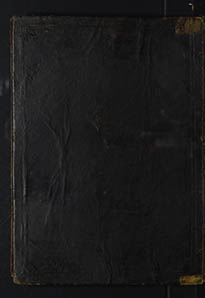 Psevdo-
Psevdo-
Martyr.
Wherein
Ovt of Certaine
Propositions and Gradations, This
Conclusion is euicted.
That those which are
of the Romane Religion in this Kingdome,
may and ought to take the Oath of
Allegeance.
Devt. 32.15.
But he that should haue beene vpright, when he waxed fatte, spurned with his heele:
Thou art fat, thou art grosse, thou art laden with fatnesse.
Iob. 11.5.
But oh that God would speake and open his lips against thee, that he might shew thee the
secrets of wisedome, how thou hast deserued double according to right.
2. Chro. 28.22.
In the time of his tribulation, did he yet trespasse more against the Lord, for he sacrificed
vnto the gods of Damascus, which plagued him.
London
Printed by W. Stansby for Walter Burre.
1610.

 To the High and
To the High and
Mightie Prince Iames, by the Grace
of God, King of Great Britaine, France
and Ireland, defender of the
Faith. Most mightie and sacred Soueraigne. ASAs Temporall armies
consist of Press'd
men, and volunta-
ries, so doe they also
in this warfare, in
which your Maie-
stie hath appear'd by
your Bookes. And not only your strong
and full Garisons, which are your Clear-
gie, and your Vniuersities, but also ob-
scure Villages can minister Souldiours.
For, the equall interest, which all your A2 Sub-
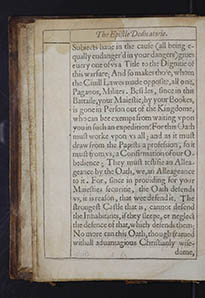 The Epistle Dedicatorie.
The Epistle Dedicatorie.
Subiects haue in the cause (all being e-
qually endanger'd in your dangers) giues
euery one of vs a Title to the Dignitie of
this warfare; And so makes those, whom
the Ciuill Lawes made opposite, all one,
Paganos, Milites. Besides, since in this
Battaile, your Maiestie, by your Bookes,
is gone in Person out of the Kingdome,
who can bee exempt from waiting vpon
you in such an expedition? For this Oath
must worke vpon vs all; and as it must
draw from the Papists a profession, so it
must from vs, a Confirmation of our O-
bedience; They must testifie an Allea-
geance by the Oath, we, an Alleageance
to it. For, since in prouiding for your
Maiesties securitie, the Oath defends
vs, it is reason, that wee defend it. The
strongest Castle that is, cannot defend
the Inhabitants, if they sleepe, or neglect
the defence of that, which defends them;
No more can this Oath, though framed
withall aduantagious Christianly wise-
dome,
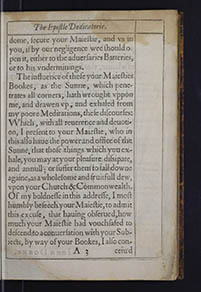 The Epistle Dedicatorie.
dome, secure your Maiestie, and vs in
The Epistle Dedicatorie.
dome, secure your Maiestie, and vs in
you, if by our negligence wee should o-
pen it, either to the aduersaries Batteries,
or to his vnderminings. The influence of those your Maiesties
Bookes, as the Sunne, which pene-
trates all corners, hath wrought vppon -
me, and drawen vp, and exhaled from
my poore Meditations, these discourses:
Which, with all reuerence and deuoti-
on, I present to your Maiestie, who in
this also haue the power and office of the
Sunne, that those things which you ex-
hale, you may at your pleasure dissipate,
and annull; or suffer them to fall downe
againe, as a wholesome and fruitfull dew,
vpon your Church & Commonwealth.
Of my boldnesse in this addresse, I most
humbly beseech your Maiestie, to admit
this excuse, that hauing obserued, how
much your Maiestie had vouchsafed to
descend to a conuersation with your Sub
iects, by way of your Bookes, I also con-
A3 ceiu'd
 The Epistle Dedicatorie.
ceiu'd an ambition, of ascending to your
The Epistle Dedicatorie.
ceiu'd an ambition, of ascending to your
presence, by the same way, and of parti
cipating, by this meanes, their happinesse,
of whome, that saying of the Queene of
Sheba, may bee vsurp'd: Happie are thy
men, and happie are those thy Seruants,
which stand before thee alwayes, and
heare thy wisedome. For, in this, I make
account, that I haue performed a duetie,
by expressing in an exterior, and (by
your Maiesties permission) a publicke
Act, the same desire, which God heares
in my daily prayers, That your Maie-
stie may very long gouerne vs
in your Person, and euer, in
your Race and
Progenie.
Your Maiesties most
humble and loyall
Subiect:
Iohn Donne.
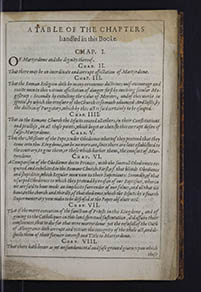 A Table of the Chapters
A Table of the Chapters
handled in this Booke. Chap. I.
OFOf Martyrdome and the dignity thereof.
Chap. II.
That there may be an inordinate and corrupt affectation of Martyrdome.
Chap. III.
That the Roman Religion doth by many erroneous doctrines mis-encourage and
excite men to this vitious affectation of danger: first by inciting secular Ma-
gistracy: Secondly by extolling the value of Merites, and of this worke in
special, by which the treasure of the Church is so much aduanced: And lastly, by
the doctrin of Purgatory, which by this act is said certainly to be escaped.
Chap. IIII.
That in the Romane Church the Iesuits exceed all others, in their Constitutions
and practise, in all those points, which beget or cherish this corrupt desire of
false-Martyrdome.
Chap. V.
That the Missions of the Pope, vnder Obedience whereof they pretend that they
come into this Kingdome, can be no warrant, since there are laws established to
the contrary, to giue them, or those which harbor them, the comfort of Mar-
tyredome.
Chap. VI.
A Comparison of the Obedience due to Princes, with the seuerall Obediences re-
quired and exhibited in the Romane Church: First, of that blinde Obedience
and stupiditie, which Regular men vow to their Superiours: Secondly, of that
vsurped Obedience to which they pretend by reason of our Baptisme, wherin
we are said to haue made an implicite surrender of our selues, and all that we
haue, to the church: and thirdly, of that obedience, which the Iesuits by a fourth
Supernumerary vow make to be disposed at the Popes absolute will.
Chap. VII.
That if the meere execution of the function of Priests in this Kingdome, and of
giuing to the Catholiques in this land, spiritual sustentation, did assure their
consciences, that to dye for that were martyrdome: yet the refusall of the Oath
of Alleageance doth corrupt and vitiate the integrity of the whole act, and di-
spoile them of their former interest and Title to Martyrdome.
Chap. VIII.
That there hath beene as yet no fundamental and safe ground giuen, vpon which those
 A Table
those which haue the faculties to heare Confessions, should informe their owne
A Table
those which haue the faculties to heare Confessions, should informe their owne
Consciences, or instruct their Penitents: that they are bound to aduenture the
heauy and capitall penalties of this law, for refusall of this Oath. And that if
any man haue receiued a scruple against this Oath, which he cannot depose and
cast off, the Rules of their own Casuists, as this case stands, incline, and warrant
them, to the taking therof.
Chap. IX.
That the authority which is imagined to be in the Pope, as he is spiritual Prince
of the monarchy of the Church, cannot lay this Obligation vpon their Con-
sciences: First because the Doctrine it selfe is not certaine, nor presented as
matter of faith: Secondly because the way by which it is conueyed to them, is
suspitious and dangerous, being but by Cardinall Bellarmine, who is various
in himselfe, and reproued by other Catholiques of equall dignity, and esti-
mation.
Chap. X.
That the Canons can giue them no warrant, to aduenture these dangers, for this
refusall: And that the Reuerend name of Canons, is falsly and cautelously
insinuated, and stolne vpon the whole body of the Canon law, with a breefe
Consideration vpon all the bookes thereof: and a particular suruay, of all those
Canons, which are ordinarily cyted by those Authours, which maintaine
this temporall Iurisdiction in the Pope.
Chap. XI.
That the two Breues of Paulus the fift, cannot giue this assurance to this Consci-
ence; First, for the generall infirmities, to which all Rescripts of Popes are
obnoxious: And then for certaine insufficiencies in these.
Chap. XII.
That nothing requir'd in this Oath, violates the Popes spirituall Iurisdiction;
And that the clauses of swearing that Doctrine to bee Hereticall, is no v-
surping vpon his spirituall right, either by preiudicating his future defini-
tion, or offending any former Decree.
Chap. XIII.
That all which his Maiesty requires by this Oath, is exhibited to the Kings of
Fraunce, And not by vertue of any Indult, or Concordate, but by the inhærent
right of the Crowne.
Chap. XIIII.
Lastly, That no pretence, eyther of Conuersion at first, Assistance in the Conquest,
or Acceptation of any Surrender from any of our Kings, can giue the Pope a-
ny more right ouer the Kingdome of England, then ouer any other free State
whatsoeuer.
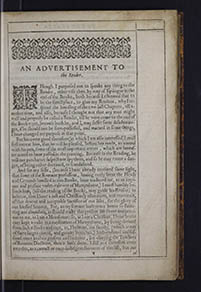 An Advertisement to
An Advertisement to
the Reader. THoughThough I purposed not to speake any thing to the
Reader, otherwise then by way of Epilogue in the
end of the Booke, both because I esteemed that to
be the fittest place, to giue my Reasons, why I re-
spited the handling of the two last Chapters, till a-
nother time, and also, because I thought not that any man might
well and properly be called a Reader, till he were come to the end of
the Booke: yet, because both he, and I, may suffer some disaduanta-
ges, if he should not be fore-possessed, and warned in some things,
I haue changed my purpose in that point. For his owne good therefore(in which I am also interessed)I must
first intreat him, that he will be pleased, before hee reade, to amend
with his pen, some of the most important errors, which are hereaf-
ter noted to haue passed in the printing. Because in the Reading, he
will not perchance suspect nor spy them, and so he may runne a dan-
ger, of being either deceiued, or scandalized. And for my selfe, (because I haue already receiued some light,
that some of the Romane profession, hauing onely seene the Heads
and Grounds handled in this Booke, haue traduced me, as an impi-
ous and profane vnder-valewer of Martyrdome,) I most humbly be-
seech him, (till the reading of the Booke, may guide his Reason) to
beleeue, that I haue a iust and Christianly estimation, and reuerence,
of that deuout and acceptable Sacrifice of our lifes, for the glory of
our blessed Sauiour. For, as my fortune hath neuer beene so flatte-
ring nor abundant, as should make this present life sweet and preci-
ous to me, as I am a Moral man: so, as I am a Christian, I haue beene
euer kept awake in a meditation of Martyrdome, by being deriued
from such a stocke and race, as, I beleeue, no family, (which is not
of farre larger extent, and greater branches,) hath endured and suf-
fered more in their persons and fortunes, for obeying the Teachers
of Romane Doctrine, then it hath done. I did not therefore enter
into this, as a carnall or ouer-indulgent fauourer of this life, but out ¶ of
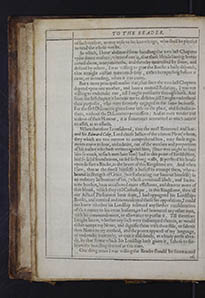 To the Reader
To the Reader
of such reasons, as may arise to his knowledge, who shall be pleased
to read the whole worke. In which, I haue abstained from handling the two last Chapters
vpon diuers reasons; whereof one is, that these Heads hauing beene
caried about, many moneths, and thereby quarrelled by some, and
desired by others, I was willing to giue the Booke a hasty dispatch,
that it might cost no man much time, either in expecting before it
came, or in reading, when it was come. But a more principall reason was, that since the two last Chapters
depend vpon one another, and haue a mutuall Relation, I was not
willing to vndertake one, till I might perseuere through both. And
from the last chapter it became me to abstaine, till I might vnderstand
their purposes, who were formerly engaged in the same businesse.
For the first Discouerie giues some title to the place, and secludes o-
thers, without the Discouerers permission; And in men tender and
iealous of their Honour, it is sometimes accounted as much iniurie
to assist, as to assault. When therefore I considered, that the most Reuerend and lear-
ned Sir Edward Coke, Lord chiefe Iustice of the cómon Pleas(whom,
they which are too narrow to comprehend him, may finde argu-
ments enow to loue, and admire, out of the measure and proportion
of his malice who hath written against him, (since wee ought to loue
him so much, as such men hate him) had in this point of Iurisdiction,
laid so solid foundations, raised so strong walls, & perfited his house
vpon so sure a Rocke, as the lawes of this Kingdome are. And when
I saw, that as the diuell himselfe is busiest to attempt them, who a-
bound in strength of Grace, (not forbearing our Sauiour himselfe) so
an ordinary Instrument of his, (whose continuall libels, and Incita-
torie bookes, haue occasioned more afflictions, and drawne more of
that bloud, which they call Catholique, in this Kingdome, then all
our Acts of Parliament haue done,) had oppugned his Lordships
Booke, and iterated and inconculcated those his oppositions, I could
not know whether his Lordship reserued any farther consideration
of that matter to his owne leasures, or had honoured any other man,
with his commandement, or allowance to pursue it. Till therefore
I might know, whether any such were embarqued therein, as would
either accept my Notes, and dignifie them with their stile, or submit
their Notes to my method, and the poore apparell of my language,
or vndertake it entirely, or quit it absolutely, as a body perfit alrea-
dy, by that forme which his Lordship hath giuen it, I chose to for-
beare the handling thereof at this time. One thing more I was willing the Reader should be forewarned of;
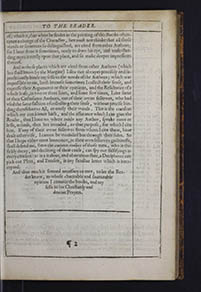 To the Reader
of; which is, that when he findes in the printing of this Booke often-
To the Reader
of; which is, that when he findes in the printing of this Booke often-
times a change of the Character, hee must not thinke that all those
words or sentences so distinguished, are cited from other Authors;
for I haue done it sometimes, onely to draw his eye, and vnderstan-
ding more intensly vpon that place, and so make deeper impressions
thereof. And in those places which are cited from other Authors (which
hee shall know by the Margine) I doe not alwayes precisely and su-
perstitiously binde my selfe to the words of the Authors; which was
impossible to me, both because sometimes I collect their sense, and
expresse their Arguments or their opinions, and the Resultance of a
whole leafe, in two or three lines, and some few times, I cite some
of their Catholique Authors, out of their owne fellowes, who had
vsed the same fashion of collecting their sense, without precise bin
ding themselues to All, or onely their words. This is the comfort
which my conscience hath, and the assurance which I can giue the
Reader, that I haue no where made any Author, speake more or
lesse, in sense, then hee intended, to that purpose, for which I cite
him. If any of their owne fellowes from whom I cite them, haue
dealt otherwise, I cannot be wounded but through their sides. So
that I hope either mine Innocence, or their own fellowes guiltinesse,
shall defend me, from the curious malice of those men, who in this
sickly decay, and declining of their cause, can spy out falsifyings in
euery citation: as in a iealous, and obnoxious state, a Decipherer can
pick out Plots, and Treason, in any familiar letter which is inter-
cepted. And thus much it seemed necessary to mee, to let the Rea-
der know, to whose charitable and fauourable
opinion I commit the booke, and my
selfe to his Christianly and
deuout Prayers. ¶2
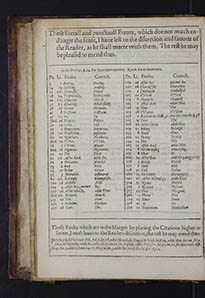
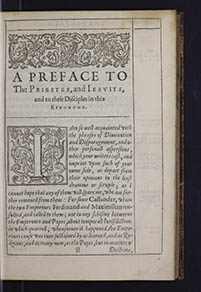 A Preface to
A Preface to
The Preistes, and Iesvits,
and to their Disciples in this
Kingdome. II Amam so well acquainted with
the phrases of Diminution
and Disparagement, and o-
ther personall aspersions,
which your writers cast, and
imprint vpon such of your
owne side, as depart from
their opinions in the least
dramme or scruple; as I
cannot hope that any of them will spare me, who am fur-
ther remoued from them: For since Cassander, whom
the two Emperours Ferdinand and Maximilian con-
sulted, and called to them; not in any schisme betweene
the Emperours and Popes, about temporall Iurisdiction:
in which quarrell, whensoeuer it happened, the Empe-
rours cause was euer sustained by as learned, and as Re-
ligious, and as many men, as the Popes, but in matters of B Doctrine,
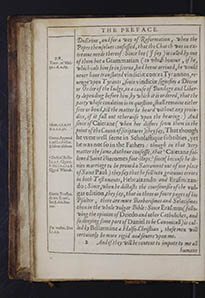 Doctrine, and for a way of Reformation, when the
Doctrine, and for a way of Reformation, when the
Popes themselues confessed, that the Church was in ex-
treame neede thereof: P. R.
Treat. of Miti-
ga. 6. n. 67. Since hee (I say) is called by one
of them but a Grammarian (to which honour, if he,
which cals him so in scorne, had beene arriued, he would
neuer haue translated vindiciæ contra Tyrannos, re-
uenge vpon Tyrants, since vindiciæ signifies a Decree
or Order of the Iudge, in a cause of Bondage and Liber-
ty depending before him, by which it is ordered, that the
party whose condition is in question, shall remaine either
free or bond, till the matter be heard without any preiu-
dice, if it fall out otherwise vpon the hearing:) And
since of Caietane (when hee differs from them in the Idem. c. 1. n. 11
&. c. 5. n. 30.
point of the Canon of scriptures) they say, That though
he were well seene in Scholastique subtilties, Gretz. Append
1. ad l. 1. Bellar.
§. Idem dictum yet
he was not so in the Fathers: though in that very
matter the same Authour confesse, that a Caietane fol-
lowed Saint Hieromes a Defens. Bella.
l. 1. c. 7. Quare. foot-steps: b since (because he de-
nies marriage to be proued a Sacrament out of one place
of Saint Paul) b Ibi. l. 2. c. 14. §
Quod Whitak. they say that he fell into grieuous errors
in both Testaments, Hebraizando and Erasmizan-
do: Since, when he distasts the coursenesse of the vul-
gar edition, Gretz. Tractat.
de no. Trans-
lat. §. Ait. Six-
tus. they say, that in three or foure pages of his
Psalter, there are more Barbarismes and Solæcismes
then in the whole vulgar Bible: Since Erasmus (follo-
wing the opinion of Driedo and other Catholickes, and
so denying some part of Daniel to be Canonicall) is cal-
led by Bellarmine a Halfe-Christian, De verbo. Dei
l. 1. c. 9. these men will
certainely be more rigid and seuere vpon me. 2 And if they will be content to impute to me all humane
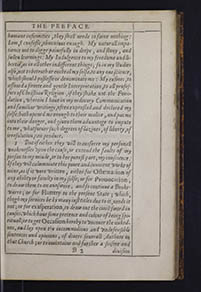 The Preface
The Preface
humane infirmities, they shall neede to faine nothing:
I am, I confesse, obnoxious enough. My naturall impa-
tience not to digge painefully in deepe, and stony, and
sullen learnings: My Indulgence to my freedome and li-
bertie, as in all other indifferent things, so in my studies
also, not to betroth or enthral my selfe, to any one science,
which should possesse or denominate me: My easines, to
affoord a sweete and gentle Interpretation, to all profes-
sors of Christian Religion, if they shake not the Foun-
dation, wherein I haue in my ordinary Communication
and familiar writings, often expressed and declared my
selfe: hath opened me enough to their malice, and put me
into their danger, and giuen them aduantage to impute
to me, whatsoeuer such degrees of lazines, of liberty, of
irresolution, can produce. 3 But if either they will transferre my personall
weakenesses vpon the cause, or extend the faults of my
person to my minde, or to her purest part, my conscience:
If they will calumniate this poore and innocent worke of
mine, as if it were written, either for Ostentation of
any ability or faculty in my selfe; or for Prouocation,
to draw them to an aunswere, and so continue a Booke-
warre; or for Flattery to the present State; which,
thogh my seruices be by many iust titles due to it, needs it
not; or for exasperation, to draw out the ciuill sword in
causes, which haue some pretence and colour of being spi-
rituall; or to get Occasion hereby to vncouer the naked-
nes, and lay open the incommodious and vndefensible
sentences and opinions, of diuers seuerall Authors in
that Church; or to maintaine and further a scisme and B2 diuision
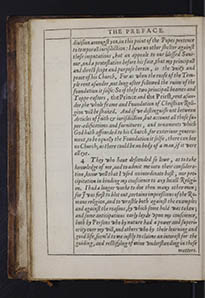 The Preface
The Preface
diuision amongst you, in this point of the Popes pretence
to temporall iurisdiction: I haue no other shelter against
these imputations, but an appeale to our blessed Saui-
our, and a protestation before his face, that my principall
and direct scope and purpose herein, is the vnity and
peace of his Church. For as when the roofe of the Tem-
ple rent asunder, not long after followed the ruine of the
foundation it selfe: So if these two principall beames and
Toppe-rafters, the Prince and the Priest, rent asun
der, the whole frame and Foundation of Christian Reli-
gion will be shaked. And if we distinguish not between
Articles of faith & iurisdiction, but account all those su-
per-edifications and furnitures, and ornaments which
God hath affoorded to his Church, for exteriour gouern-
ment, to be equally the Foundation it selfe, there can bee
no Church; as there could be no body of a man, if it were
all eye. 4 They who haue descended so lowe, as to take
knowledge of me, and to admit me into their considera-
tion, know well that I vsed no inordinate hast, nor pre-
cipitation in binding my conscience to any locall Religi-
on. I had a longer worke to doe then many other men;
for I was first to blot out, certaine impressions of the Ro-
mane religion, and to wrastle both against the examples
and against the reasons, by which some hold was taken;
and some anticipations early layde vpon my conscience,
both by Persons who by nature had a power and superi-
ority ouer my will, and others who by their learning and
good life, seem'd to me iustly to claime an interest for the
guiding, and rectifying of mine vnderstanding in these matters.
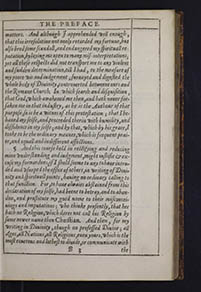 The Preface
The Preface
matters. And although I apprehended well enough,
that this irresolution not onely retarded my fortune, but
also bred some scandall, and endangered my spirituall re-
putation, by laying me open to many mis-interpretations;
yet all these respects did not transport me to any violent
and sudden determination, till I had, to the measure of
my poore wit and iudgement, suruayed and digested the
whole body of Diuinity, controuerted betweene ours and
the Romane Church. In which search and disquisition,
that God, which awakened me then, and hath neuer for-
saken me in that industry, as he is the Authour of that
purpose, so is he a witnes of this protestation; that I be-
haued my selfe, and proceeded therin with humility, and
diffidence in my selfe; and by that, which by his grace, I
tooke to be the ordinary meanes, which is frequent prai-
er, and equall and indifferent affections. 5 And this course held in rectifying and reducing
mine vnderstanding and iudgment, might iustifie & ex-
cuse my forwardnes; if I shold seeme to any to haue intru-
ded and vsurped the office of others, in writing of Diui-
nity and spirituall points, hauing no ordinary calling to
that function. For, to haue alwaies abstained from this
declaration of my selfe, had beene to betray, and to aban
don, and prostitute my good name to their misconcei-
uings and imputations; who thinke presently, that hee
hath no Religion, which dares not call his Religion by
some newer name then Christian. And then, for my
writing in Diuinity, though no professed Diuine; all
Ages, all Nations, all Religions, euen yours, which is the
most couetous and lothest to diuide, or communicate with B3 the
 The Preface
the Layety, any of the honours reserued to the Clergie,
The Preface
the Layety, any of the honours reserued to the Clergie,
affoord me abundantly examples, and authorities for
such an vndertaking. 6 But for this poore worke of mine, I need no such
Aduocates, nor Apologizers; for it is not of Diuinity,
but meerely of temporall matters, that I write. And you
may as iustly accuse Vitruuius, who writ of the fashi-
on of building Churches, or those Authors which haue
written of the nature of Bees and vse of Waxe, or of
Painting, or of Musique, to haue vsurped vpon the of-
fice of Diuines, and to haue written of Diuinity, because
all these are ingredients into your propitiatory medicine,
the Masse, and conduce to spirituall and diuine worship:
as you may impute to any, which writes of ciuil obedience
to the Prince, that he meddles with Diuinity: not that
this obedience is not safely grounded in Diuinity, or that
it is not an act of Religion, but that it is so well en-
grau'd in our hearts, and naturally obuious to euery vn-
derstanding, that men of all conditions haue a sense and
apprehension, and assurednes of that obligation. 7 The cause therefore is reduced to a narrow issue,
and contracted to a strict point, when the differences
betweene vs are brought to this; Whether a Subiect may
not obey his Prince, if the Turk or any other man forbid
it? And as his Maiestie in his Kingdomes, is Religious-
ly and prudently watchfull, to preserue that Crowne,
which his Predecessors had redeemed from the rust, and
drosse, wherewith forraine vsurpation had infected it;
so is it easie to be obserued, that all the other Princes of
Christendome, beginne to shake off those fetters, which insensibly
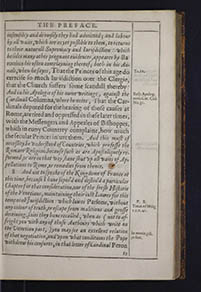 The Preface
The Preface
insensibly and drowsily they had admitted; and labour
by all waies, which are as yet possible to them, to returne
to their naturall Supremacy and Iurisdiction: which
besides many other pregnant euidences, appeares by Ba-
ronius his often complayning thereof; both in his An-
nals, when he sayes, To. 11. That the Princes of this age do
exercise so much Iurisdiction ouer the Clergie,
that the Church suffers some scandall thereby:
And in his Apologie of his owne writings, Resp. Apolog.
cont. Car. Col.
Nu. 31. against the
Cardinall Columna, where he notes, That the Car-
dinals deputed for the hearing of those causes at
Rome, are tired and oppressed in these later times,
with the Messengers and Appeales of Bishoppes,
which in euery Countrey complaine, how much
the secular Princes iniure them. And this must of
necessity be vnderstood of Countries, which professe the
Romane Religion, because such as are Apostoliquely re-
formed, or are in that way, haue shut vp all waies of Ap-
pellations to Rome, or remedies from thence. 8 And not to speake of the Kingdome of France at
this time, because I haue sepos'd and destin'd a particular
Chapter for that consideration, nor of the fresh Historie
of the Venetians, maintaining their iust Lawes for this P. R.
Treat. of Mitig
c. 5. n. 41.
temporall Iurisdiction: which lawes Parsons, without
any colour of truth, or escape from malitious and grosse
deceiuing, saies they haue recalled, when as (not to af-
fright you with any of those Authours which write on
the Venetian part,) In monit. pili.
in fine. you may see an excellent relation
of that negotiation, and vpon what conditions the Pope
withdrew his censures, in that letter of Cardinall Peron to
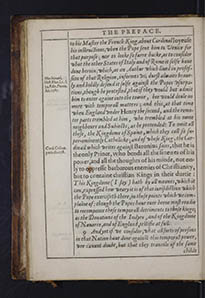 The Preface
to his Master the French King, about Cardinal Ioyeuse
The Preface
to his Master the French King, about Cardinal Ioyeuse
his instructions, when the Pope sent him to Venice for
that purpose; nor to looke so farre backe, as to consider
what the other States of Italy and of Rome it selfe haue
done herein, which, as an Author which liued in profes-
sion of that Religion, Machiauel.
Hist. Flor. l. I. f.
34. Edit. Picen.
An. 1587. informes vs; durst alwaies braue-
ly and boldly defend it selfe against the Popes vsurpa-
tions, though he protested, that if they would but admit
him to enter againe into the towne, hee would deale no
more with temporall matters; and this, at that time
when England vnder Henry the second, and the remo-
ter parts trembled at him, who trembled at his owne
neighbours and Subiects, as he pretended: To omit all
these, the Kingdome of Spaine, which they call so su-
per-eminently Catholicke; and of whose King, the Car-
dinall which writes against Baronius saies, Card. Colum.
paris. fo. 158. that he is
the only Prince, who bends all the sinewes of his
power, and all the thoughts of his minde, not on-
ly to oppresse barbarous enemies of Christianity,
but to containe christian Kings in their duetie:
This Kingdome (I say) hath by all meanes, which it
can, expressed how weary it is of that iurisdiction which
the Pope exerciseth there, in these points which we com-
plaine of: though the Popes haue euer beene most readie
to recompence these temporall detriments to those kings;
as the Donations of the Indyes, and of the Kingdome
of Nauarre, and of England, testifie at full. 9 And yet if we consider, what all sorts of persons
in that Nation haue done against this temporall power,
wee cannot doubt, but that they trauaile of the same childe
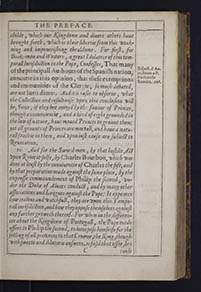 The Preface
childe, which our Kingdome and diuers others haue
The Preface
childe, which our Kingdome and diuers others haue
brought forth, which is their libertie from this weak-
ning and impouerishing thraldome. For first, for
Booke-men and Writers, a great Idolatrer of this tem-
porall Iurisdiction in the Pope, Confesses, Rispost. d' An-
to. Bouio a P.
Paulonella
Rauolta. .. 196. That many
of the principall Authours of the Spanish nation,
concurre in this opinion, that these exemptions
and immunities of the Clergie, so much debated,
are not Iuris diuini. And it is easie to obserue, what
the Collection and resultanse vpon this conclusion will
be; Since, if they bee enioyd by the fauour of Princes,
though a conueniencie, and a kind of right grounded in
the law of nature, haue moued Princes to graunt them:
yet all graunts of Princes are mortall, and haue a natu-
rall frailtie in them, and vpon iust cause are subiect to
Reuocation. 10 And for the Sword-men, by that hostile Act
vpon Rome it-selfe, by Charles Bourbon, which was
done at least by the conniuencie of Charles the fift; and
by that preparation made against the same place, by the
expresse commaundement of Philip the second, vn-
der the Duke of Aluaes conduct, and by many other
associations and Leagues against the Pope: It appeares
how iealous and watchfull, they are vpon this Tempo-
rall iurisdiction, and how they oppose themselues against
any farther groweth thereof. For when in the differen-
ces about the Kingdome of Portugall, the Pope made
offers to Philip the second, to interpose himselfe for the
setling of all pretences to that Crowne, the King, though
with sweete and dilatorie answers, refusd that offer, be-
C cause
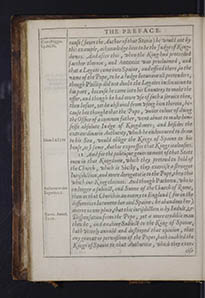 The Preface
The Preface
Conestaggio.
l. 3. fol. 82. cause (sayes the Author of that Storie) he would not by
this example, acknowledge him to be the Iudge of King-
domes. And after this, when the King had proceeded
farther therein, and Antonie was proclaimed, and
that a Legate came into Spaine, and offred there, in the
name of the Pope, to be a Iudge betweene all pretenders,
though Philip did not doubt the Legates inclination to
his part, because he came into his Countrey to make the
offer, and though he had more vse of such a seruice then,
then before, yet he abstaind from vsing him therein, be-
cause hee thought that the Pope, vnder colour of doing
the Office of a common father, went about to make him-
selfe absolute Iudge of Kingdomes; and besides the
extraordinarie Authority, which he endeuoured to draw
to his Sea, Idem. l. 6. f. 155 would oblige the Kings of Spaine to his
house, as ye same Author expresses that Kings iealousies. 11 And for the politique gouernement of that State
euen in that Kingdome, which they pretend to hold of
the Church, which is Sicily, they exercise a stronger
Iurisdiction, and more derogatorie to the Pope, then this
which our King claimes. And though Parsons who is
no longer a subiect, Answere to the
Reports. c. 5. and Sonne of the Church of Rome,
then as that Church is an enemy to England (for in the
differences betweene her and Spaine, he abandons her)
auerre in one place, that this iurisdiction is by Indult, &
Dispensation from the Pope, Baron. Annal.
To. 11. yet a more credible man
then he, and a natiue Subiect to the King of Spaine,
hath vtterly annuld and destroyed that opinion, that
any graunt or permission of the Popes, hath enabled the
Kings of Spaine to that Authoritie, which they exer-
cise
 The Preface
The Preface
cise there. And he hath not onely told his brother Car-
dinall Columna, that the matter it-selfe, Is a point
of the Catholicke faith, Epist. Apolog.
nu. 21. but in his Epistle to King
Philip the third, hee extols and magnifies that Booke,
in which he had deliuered that Doctrine, so authentical-
ly, as if he meant to draw it into the Canon of the Scrip-
tures: for do these words import any lesse? Epist. ad Phi-
lip. 3. The Booke
issued frõ the very Chaire of S. Peter, by the com-
mandement of S. Peter, and is confirmed by S. Pe-
ter, and shal without doubt endure for euer. And
he addes this Commination, speaking to the King, Let
them which resist these writings take heede, least
they stumble, In hanc Petram, and least they bee
vtterly trode in pieces, Ab ipsa, ab alto ruente Pe-
tra. But of Baronius his detestation of Monarchie,
and ill behauiour towards all Kings, as well as his owne
Soueraigne, I haue another occasion to speake. All
which I purpose to euict here, was, that if Parsons
haue spoken so heretically, in saying, that this is done by
vertue of the Popes Indult; that remaines true, which
I said before, that that Kingdome of Spaine, endeuours
by all wayes it can, to redeeme it-selfe from these vsurpa-
tions, and re-inuest it-selfe in her originall Supremacie. 12 For as in one of the Greeke States when Ny-
cippus sheepe brought forth a Lyon, Aelian l. 1. c. 29. it was iustly
concluded that, that portended a Tyrannie, and change
of the State, from a peaceable to a bloody Gouernement:
so since the Spirituall principalitie hath produced a
Temporall, since this mild and Apostolique sheepe hath
brought forth this Lyon, which seekes whom hee may C2 deuoure,
 The Preface
deuour: as by his first Iurisdiction, he would make in
The Preface
deuour: as by his first Iurisdiction, he would make in
this Kingdome a spirituall shambles of your soules, by
corrupt Doctrines: so by the latter, he labours to make
a Temporall shambles and market of your bodies, by sel-
ling you for nothing, and thrusting you vpon the Ciuill
sword, Numb. 35.33. which it is a sinne to sheath, when the Law com-
maunds to draw it, in so dangerous cases of polluting
the Land. And though it be pretended by you, and for
you; that the Popes haue laide both a spirituall and tem-
porall Obligation vpon you: Because, besides their
care for instructing your soules; they haue also with
charge erected and endowed some Colledges for your
Temporall sustentation, Ælian. l. 2. c. 17. who come into those parts:
yet, as the wisemen of Persia, being set to obserue the
first actions of their new King Ochus, when they mar-
ked that be reachd out his hand at the Table to Bread,
and to a Knife, presumd by that, that his time would be
plentifull and bloody, and faild not in their coniecture:
So since the Pope reaches out to you, with his small Col-
legiate pittance, the Doctrine of the materiall and tem-
porall sword, howsoeuer hee may seeme to relieue your
miserie and penurie, which you drawe vpon your
selues, yet it is accompanied with the presage of much
blood, since either his purposes must be executed vpon vs
by you, or our iust Lawes for preuention thereof be Ex-
ecuted vpon you. Bosquier. Con-
cio. Quadrag.
Conci. 6. 14 One of your owne Authors relates, that Anasta-
tius a Monke, had a hundred Diuels appointed to vexe
and tempt him for foure yeares, and after hee had ouer-
come that trouble, and tamed them, he set them on work to
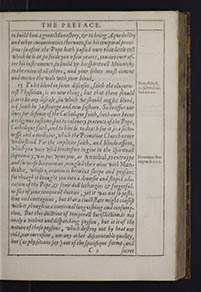 The Preface
to build him a great Monastery, & to bring Aqueducts,
The Preface
to build him a great Monastery, & to bring Aqueducts,
and other conueniencies therunto, for his temporal proui-
sion: so after the Pope hath passed ouer that little cost
which he is at, to feede you a few yeares, you are euer af-
ter his instruments, to build vp his spirituall Monarchy
to the ruine of all others, and your selues must ciment
and morter the wals with your blood. 15 To let blood in some diseases, Sent. Select.
ex Corn. Cel-
so. l. 2. n. 12. saith the eloquen-
test Physitian, is no new thing; but that there should
scarce be any disease, in which we should not let blood,
is (saith he) a strange and new fashion: So to offer our
liues for defence of the Catholique faith, hath euer beene
a religious custome; but to cal euery pretence of the Pope,
Catholique faith, and to bleede to death for it, is a sicke
nesse and a medicine, which the Primitiue Church neuer
vnderstood. For the implicite faith, and blinde assent,
which you were vsed heretofore to giue to the spirituall
supremacy, was put vpon you, as Annibal, Frontinus stra-
tagem. li. 2. c. 5. to entrappe
and surprise his enemies, mingled their wine with Man-
drake, whose operation is betwixt sleepe and poyson:
for though it brought you into a drowsie and stupid ado-
ration of the Pope, & some dull lethargies & forgetful-
nesses of your temporall dueties, yet it was not so pesti-
lent and contagious, but that a ciuill state might consist
with it, though in a continual languishing and consump-
tion. But this doctrine of temporall Iurisdiction, is not
onely a violent and dispatching poyson, but it is of the
nature of those poysons, which destroy not by heat nor
cold, nor corrosion, nor any other discerneable quality,
but (as physitians say) out of the specifique forme, and C3 secret
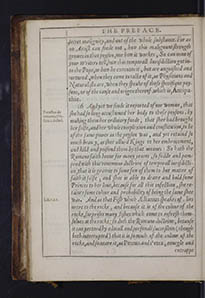 The Preface
The Preface
secret malignity, and out of the whole substance. For as
no Artist can finde out, how this malignant strength
growes in that poyson, nor how it workes, So can none of
your Writers tell, how this temporall Iurisdiction got in-
to the Pope, or how he executes it, but are anguished and
tortured, when they come to talke of it, as Physitians and
Naturalists are, when they speake of these specifique poy-
sons, or of the cause and origen thereof, which is, Antipa-
thie. 16 And yet we finde it reported of one woman, that
she had so long accustomed her body to these poysons, Forestus de
venenis. Ob-
seru. 1. Schol. by
making them her ordinary foode, that shee had brought
her selfe, and her whole complexion and constitution, to be
of the same power as the poyson was, and yet retaind so
much beauty, as shee allurd Kings to her embracement,
and kild and poisond them by that meanes: So hath the
Romane faith beene for many yeares, so fedde and pam-
pred with this venemous doctrine of temporall iurisdicti-
on, that it is growne to some few of them to bee matter of
faith it selfe; and shee is able to drawe and hold some
Princes to her loue, because for all this infection, she re-
taines some colour and probability of being the same shee
was. Lib. 1. c. 1. And as that Fish which Aelianus speakes of, lies
neere to the rocke, and because it is of the colour of the
rocke, surprises many fishes which come to refresh them-
selues at the rocke: so doth the Romane doctrine, because
it can pretend by a locall and personall succession (though
both interrupted) that it is so much of the colour of the
rocke, and so neare it, as Petrus and Petra, enuegle and entrappe
 The Preface
The Preface
entrappe many credulous persons, who haue a zealous de-
sire to build vpon the rocke it selfe. 17 It is an Aphorisme of an auncient Physitian, Hippocrates. l.
1. Apho. 22.
that we must not purge raw humours, but such
as are matur'd and concocted, except they be stir-
red and moued with their owne violence. Such a
patience and moderation this State vsed towards profes-
sors of your Religion; and onely prouiding some better
lawes, to haue them in a readinesse in occasions of much
necessity; the rest of the Statutes were onely medicinall
and preparatory, to lead them to Church sometimes, and
so to mollifie their obduratenes, by making diuine seruice
their physicke, since they would not admit it for their or-
dinary dyet; and so in time to draine them, and deliuer
them from those inundations of errours, which the Sea of
Rome had degorged vpon them. And though it might
seeme vnseasonable, by any sharper meanes to haue wrast-
led or contended with them at beginning, because euerie
sudden remoue, euen into a better ayre, is vnwholsome,
and the worse, the purer the aire is; yet now it is time to
worke vpon you, being of better experience, since you
may haue obserued the birth and prosperous growth of this
Reformation; and seene, that though diseases affect and
corrupt suddenly and violently, and the cures thereof are
orderly and long in accomplishing; yet this Reformation
spent lesse time then the corruption, and the Church hath
recouered more health in one age, then she had lost in anie
two: In so firme and constant a state of health, did the A-
postles and their followers, especially the first Bishoppes of
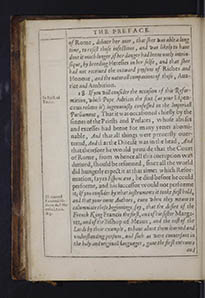 The Preface
The Preface
of Rome, deliuer her ouer, that shee was able a long
time, to resist those infectious, and was likely to haue
done it much longer, if her danger had beene onely intrin-
sique, by breeding Heresies in her selfe, and that shee
had not receiued the outward poysons of Riches and
Honour, and the naturall companions of those, Aua-
rice and Ambition. 18 If you will consider the occasion of this Refor-
mation, In Epist. ad
Tit. c. 1. which Pope Adrian the sixt (as your Espen-
cæus relates it) ingenuously confessed in the Imperiall
Parliament, That it was occasioned chiefly by the
sinnes of the Priests and Prelates, whose abuses
and excesses had beene for many yeeres abomi-
nable, And that all things were peruersly ouer-
turnd, And that the Disease was in the head, And
that therefore he would prouide that the Court
of Rome, from whence all this corruption was
deriued, should be reformed, since all the world
did hungerly expect it at that time: which Refor-
mation, sayes Espencaeus, he died before he could
performe, and his successor would not performe
it; Florimond
Remond Hi-
storie de l'He-
resie. l.7. c.2.
& 3. If you consider by what instruments it tooke first hold,
and that your owne Authors, euen when they meane to
calumniate these beginnings, say, that the desire of the
French King Francis the first, and of his sister Marga-
ret, and of the Bishop of Meaux, and the rest of the
Lords by their example, to haue about them learned and
vnderstanding persons, and such as were conuersant in
the holy and originall languages, gaue the first entrance and
 The Preface
The Preface
and way to this Reformation: If you consider with
what prosperity and blessing Almightie God hath ad-
uanced it; and that in a few yeares it hath produced so
many excellent authors in the Artes, and in Diuinity,
that neither our Schooles nor our Pulpits neede bee be-
holding to them, who deliuer no golde without some
drosse. and that for temporall blessings hee hath made
vs as numerous, and as potent as his aduersaries, the ad-
uerse partie: If you consider the good health and sound
constitution of the Reformed Religion, and that it is in
all likelyhood long-liued, because it neither admits vn-
wholesome and putrifying Traditions, and Postscripts,
after the holy Ghost had perfited his writings; which
Additions enuenome the pure blood inwardly: nor is it
outwardly in her practise deformed with the leprosies
and vlcers of admitting Iewes and Stewes: nor proposes
and iustifies any such books, as your Taxa Cameræ A-
postolicæ is, In Epist. ad
Tit. c. 1. in which (saies your Espencaeus) a man
may learne more sinne, then in all the Summists
and Casuists: and in which the price of all sinnes are
taxed; so that one may know before hand, what an A-
dultery, an Incest, a Parricide, or any other enormious
sinne will stand him in, before he resolue to doe it: If you
consider how peaceable and compatible it is with secular
Magistracy, by this experience, that more Catholique
Princes admit toleration of the reformed Religion, then
princes of our profession, admit yours; out of an assu-
rance of the turbulency, and tempestuousnesse naturally
venting out of the grounds of the Iesuits: you will then
perceiue how blinde a prognosticator that Dutch-man Prognosticon
Windecki. D is,
 The Preface
The Preface
is, who vpon two and fortie vaine and imaginary rea-
sons, hath grownded a prophecy of the imminent ruine of
this Religion; and how hasty that abortion, and preci-
pitation was in the French-man, Florimond. Re-
mond Histoire
del. Heresie. who hath written the
history of the actuall ruine of this profession, whilst it is
yet in her growing estate, and by the mercy of our Saui-
our, euery day more and more aduanced. 19 And if you will suffer these things to enter
your vnderstanding and iudgement, I cannot doubt of
your will to conforme your selues: For it is truely said,
Nothing is so contrarie to the will and consent,
as Errour: Dig. l.2. Tit. I.
l. Si per erroré. And whatsoeuer appeares true to the Iudg-
ment, seemes good to our will, and begets a desire to doe
it. But if you shut vp that dore, and so expose your
selues, that men may possesse your Will, without entring
by your Iudgement, they enter like Theeues at the win-
dow, and in the night. For, though the will bee as a win-
dow, somewhat capable of light, yet your selues benight
your whole house, by drawing these Curtaines vpon your
iudgement. And in all afflictions drawne vpon your
selues by this will or wilfulnes, when you shall say to God,
as his people did by Esay, Wherefore haue we fasted,
and thou seest it not? Esay 58.3. we haue punished our selues,
and thou regard'st it not: God will answere, as he did
then; Beholde, in the day of your fasts you seeke
your will: That is, you pursue your owne stubborne
determinations, and haue humane and corrupt respects
in all your tribulations. Ælian. l.2. c.37. 20 There was a law amongst some Grecians, that
if a sicke man drunke wine without aduise of his Physi-
tian. tian.;
 The Preface
The Preface
tian; though that saued his life, he should be put to death,
for doing it before he was commaunded. O what bitter
punishment must then attend your presumption, who in-
stead of their wine, take Gall and poyson, and instead of
their recouery, endanger your selues to a double perish-
ing; and are so farre from hauing any direct commande-
ment for it, that you haue expresse and iust inhibitions a-
gainst it? O what spirituall Calenture possesses you, to
make this hard shift to destroy your selues? If you be fi-
shers of men, why dooth hee which sends you, first raise
stormes and tempests of Treason, and scandall; and expose
you to a certaine shipwracke? It is a note which one of
your famous Preachers hath giuen; Bosquiet. conc.
Quadrag. That fish will not
be taken with a bloody Nette; and yet your Fisher-
men are sent with no other nets, then such as must be stai-
ned with our blood, if they can get it, or if they misse it,
with yours and their owne. 21 They are content to teach in other places, That
the Pope cannot binde a man to impossible
things; Dist. 61.
Catinensis. and to extend the worde Impossible to any
thing, which cannot iustly, honestly, or conueniently bee
done; they are content to teach, That the Pope cannot
command somethings, Nauar. Manual
c. 23 n 38 though they be naturally
good and meritorious, as to iterate a Confession
after it is once made: Onely to you they are so rigid
and sowre, that a Breue which you are not sure was sent,
and you are sure that it ought not to haue beene sent, must
binde you to an obedience in these Capitall dangers; and
like Pythagoras schollers, Diog. Laertius
l.8. you must suffer your selues to D2 be
 The Preface
The Preface
be slaine, rather then stirre your foote, and tread downe
a Beane. 22 And what is your recompence? You shall bee
Martyrs; and yet Baronius himselfe, who is liberall
enough of Martyrdome, speakes of your case somewhat
inconstantly and irresolutely, when he sayes of English
and French Martyrs, Martyrolog. c. 8 Scimus eos esse in Cælo, vt
par est credere, We know they are in heauen, as it is fit
for vs to beleeue. Ælian. l.14. c.4 But as he which died of the bite of a
Weasell, lamented because it was not a Lyon: So consi-
der, it is not the Catholicke faith, which you smart for,
but an vniust vsurpation, and that it is not the Lyon
of Iuda, for whose seruice and honour your liues were
well giuen, but it is for a Weasell, which crept in at a
litle hole, and since is growne so full and pamperd, that
men will rather die, then beleeue that he got in at so lit-
tle an entrance. 23 How hungerie of poyson, how Ambitious of
ruine, how peruious and penetrable to all meanes of
destruction are you, vpon whom your Iesuits and other
Confessors, haue not onely the force of those men, who
are said to haue beene able to kill men by looking vpon Gellius l.9. c.4.
them in anger, but of those also, which can bewitch by
faire words, and can prayse a man to death? For as the
angrie eye of the first sort slew some: So doe the commi-
nations and terrors of these Breues, thrust some of you
into these dangers. And as, if the men of the second
sort (whereof there were whole families in Afrique)
did but commend Trees, Corne, Cattell, or Children,
they prosperd no farther, but perish'd presently: So, af-
ter
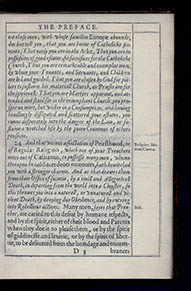 The Preface
The Preface
ter these men, with whose families Europe abounds,
doe but tell you, that you are borne of Catholicke pa-
rents, That onely you are in the Arke, That you are in
possession of good estates, fit sacrifices for the Catholicke
Church, That tyou are remarkeable and exemplar men,
by whom your Tenants, and Seruants, and Children
are led and guided; That you are chosen by God for pil-
lars to sustaine his materiall Church, as Priests are for
the spirituall: That you are Martyrs apparant, and at-
tended and staid for in the triumphant Church: you pro -
sper no more, but wither in a Consumption, and hauing
headlongly dissipated and scattered your estates, you
runne desperately into the danger of the Law, or su-
staine a wretched life by the poore Crummes of others
pensions. 24 And that vicious affectation of Priesthood, Bosquier. Mo-
nom. Conc. 4. or
of Regular Religion, which one of your Preachers
notes out of Cassianus, to possesse many men, whome
therupon he cals Sacerdotes nonentes, hath bewitched
you with a stronger charme. And as that drawes them
from their Office of societie, by a ciuill and Allegoricall
Death, in departing from the world into a Cloyster, so
this throwes you into a naturall, or vnnaturall and vi-
olent Death,by denying due Obedience, and by entring
into Rebellious actions. Ibid. Many men, sayes that Prea-
cher, are caried to this desire by humane respects,
and by the spirit, either of their blood and Parents
when they doe it to please them, or by the spirit
of giddinesse and leuitie, or by the spirit of liber-
tie, to be deliuered from the bondage and encom-
D3 brances
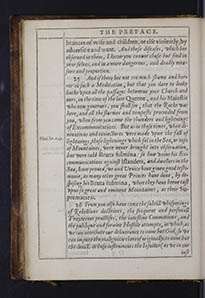 The Preface
The Preface
brances of wife and childen, or else violently, by
aduersitie and want. And these diseases, which hee
obserued in them, I know you cannot chuse but find in
your selues, and in a more dangerous, and deadly mea-
sure and proportion. 25 And if there bee not too much shame and hor-
ror in such a Meditation, but that you dare to looke
backe vpon all the passages betweene your Church and
ours, in the time of the late Queene, and his Maiestie
who now gouernes, you shall see, that the Rocke was
here, and all the stormes and tempests proceeded from
you, when from you came the thunders and lightnings
of Excommunications. But as in those times, when di-
uinations and coniectures were made vpon the fall of
lightnings, Plini. l.2 c.43. those lightnings which fel in the Sea,
or tops of Mountaines, were neuer brought into obseruation,
but were cald Bruta fulmina: so how vaine his Ex-
communications against Islanders, and dwellers in the
Sea, haue proued, we and Venice haue giuen good testi-
monie, as many other great Princes haue done, by de-
spising hisBruta fulmina, when they haue beene cast
vpon so great and eminent Mountaines, as their Su-
premacieis. 26From you also haue come the subtill whisperings
of Rebellious doctrines, the frequent and personall
Trayterous practises, the intestine Commotions, and
the publique and foraine Hostile attempts, in which, as
we can attribute our deliuerance to none but God, so we
can impute the malignitie thereof originally, to none but
the deuill. Whose instruments the Iesuites (as we in our iust
 The Preface
The Preface
iust warres haue giuen ouer long bowes for Artillerie) be-
ing men of rounder dispatch, then the Church had before,
impatient of the long Circuit and Litigiousnes of excom-
munications, haue attempted a readier waie: and as the
inuention of Gun-powder is attributed to a contemplatiue
Monke; so these practique Monkes thought it belonged
to them, to put it into vse and execution, to the destructi-
on of a State and a Church; through which nimblenesse
and dangerous actiuitie, they haue corrupted the two
noble Inuentions of these later ages, Printing and Artil-
lery by filling the world with their Libels, and Mas-
sacres. 27 It becomes not me to say, that the Romane Reli-
gion begets Treason; but I may say, that within one ge-
neration it degenerates into it: for if the temporall iuris-
diction (which is the immediate parent of Treason) be the
childe of the Romane faith, and begot by it, treason is
the Grand-childe. Annotat. in
Hilarium. But as Erasmus said of that Church in
his time, Syllogismi nunc sustinent Ecclesiam, wee
may iustlie say, that this Doctrine of temporall Iuri-
sdiction, is sustained but by Syllogismes, and those weake, and
impotent, and deceiueable. And as it cannot appeare out
of all the Authors, which speake of Saint Peters remain-
ing at Rome, whether his body be there, or onely his ashes:
So can it not be cleare to you, that the body of Christian
Religion is there, since it is oppressed with such heapes of
ashes, and dead Doctrine, as this of temporall Iurisdi-
ction; so that diuers other Churches, which perchance were
kindled at that, may burne more clearely and feruently, then
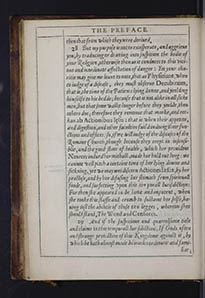 The Preface
The Preface
then that from which they were deriued. 28 But my purpose is not to exasperate, and aggrieue
you, by traducing or drawing into suspition the bodie of
your Religion, otherwise then as it conduces to this vic-
ious and inordinate affectation of danger: Yet your char-
itie may giue me leaue to note, that as Physitians, when
to iudge of a disease, they must obserue Decubitum,
that is, the time of the Patients lying downe, and yeelding
himselfe to his bedde; because that is not alike in all sicke
men, but that some walke longer before they yeelde, then
others doe; therefore they remooue that marke, and rec-
kon ab Actionibus laesis: that is, when their appetite,
and digestion, and other faculties fail'd in doing their fun-
ctions and offices: so, if we will iudge of the diseases of the
Romane Church, though because they crept in insensi-
blie, and the good state of health, which her prouident
Nources indued her withall, made her hold out long; we
cannot well pitch a certaine time of her lying downe and
sickning, yet we may wel discern Actiones laesas, by her
practise, and by her disusing her stomach from spirituall
foode, and surfetting vpon this temporall Iurisdiction:
For then she appeared to be lame and impotent, when
she tooke this staffe and crouch to sustaine her selfe, hau-
ing lost the abilitie of those two legges, whereon shee
should stand, The Word and Censures. 29 And if the suspicious and quarrelsome title
and claime to this temporall Iurisdiction; If Gods often
and strange protection of this Kingdome against it, by
which he hath almost made Miracles ordinarie and fami-
liar;
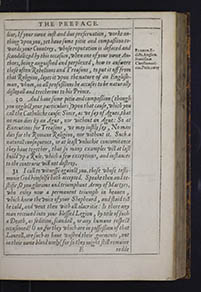 The Preface
The Preface
liar, If your owne iust and due preseruation, worke no-
thing vpon you, yet haue some pitie and compassion to-
wards your Countrey, Examen. E-
dicti. Anglica.
Stanislaus
Christianoni-
cus. Paris. 1607. whose reputation is defaced an
scandalized by this occasion, when one of your owne Au -
thors, being anguished and perplexed, how to answere
these often Rebellions and Treasons, to put it off from
that Religion, layes it vpon the nature of an English-
man, whom, in all professions he accuses to be naturally
disloyall and trecherous ot his Prince. 30 And haue some pitie and compassion (though
you neglect your particulars) vpon that cause, which you
call the Catholicke cause: Since, as we say of Agues, that
no man dies by an Ague, nor without an Ague: So at
Executions for Treasons, we may iustly say, No man
dies for the Romane Religion, nor without it. Such a
naturall consequence, or at least vnluckie concomitance
they haue together, that so many examples will at last
build vp a Rule, which a few exceptions, and instances
to the contrarie will not destroy. 31 I call to witnesse against you, those whose testi-
monie God himselfe hath accepted. Speake then and te-
stifie, O you glorious and triumphant Army of Martyrs,
who enioy now a permanent triumph in heauen,
which knew the voice of your Shepheard, and staid till
he cald, and went then with all alacritie: Is there any
man receiued into your blessed Legion, by title of such
a Death, as sedition, scandall, or any humane respect
occasioned? O no, for they which are in possession of that
Laurell, are such as haue washed their garments, not
in their owne blood onely (for so they might still remaine E redde
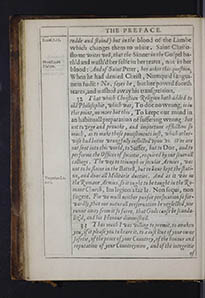 The Preface
The Preface
redde and staind) but in the blood of the Lambe Reuel. 7.15.
which changes them to white. Saint Chriso-
stome writes well, that the Sinner in the Gospel ba-
th'd and wash'd her selfe in her teares, Homil. 2. in
Psal. 50. not in her
blood: And of Saint Peter, hee askes this question;
When he had denied Christ, Numquid sangui-
nem fudit? No, sayes he, but hee powrd foorth
teares, and washed away his transgression. 32 That which Christian Religion hath added to
old Philosophie, which was, To doe no wrong, is in
this point, no more but this, To keepe our mind in
an habituall preparation of suffering wrong: but
not to vrge and prouoke, and importune affliction so
much, as to make those punishments iust, which other-
wise had beene wrongfully inflicted vpon vs. Wee are
not sent into this world, to Suffer, but to Doe, and to
performe the Offices of societie, required by our seuer all
callings. The way to triumph in secular Armies, was
not to be slaine in the Battell, but to haue kept the stati-
on, and done all Militarie dueties. Vegetius. l.2. -
c. 17. And as it was in
the Romane Armies, so it ought to be taught in the Ro-
mane Church, Ius legionis facile: Non sequi, non
fugere. For we must neither pursue persecution so for-
wardly, that our naturall preseruation be neglected, nor
runne away from it so farre, that Gods cause be scanda-
liz'd, and his Honour diminished. 33 Thus much I was willing to premit, to awaken
you, if it please you to heare it, to a iust love of your owne
safetie, of the peace of your Countrey, of the honour and
reputation of your Countreymen, and of the integritie of
 The Preface
The Preface
of that, which you call the Catholicke cause; and to ac-
quaint you so farre, with my disposition and temper, as
that you neede not be afraid to reade my poore writings,
who ioyne you with mine owne Soule in my Prayers,
that your Obedience here, may prepare your admission
into the heauenly Hierusalem, and that by the same
Obedience, Exod. 20. Your dayes may bee long in the
land, which the Lord your God
hath giuen you.
Amen.
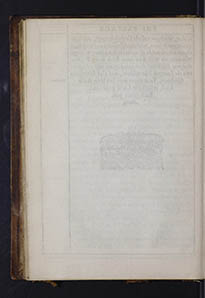 001
001 1
Chap. 1.
Psevdo-
1
Chap. 1.
Psevdo-
Martyr. Chap. I. Of Martyrdome and the dignitie thereof.
ASAs a Depositarie to whose I
trust some pretious thing
were committed, is not
onely encombred and
anxious, to defend it
from the violencies and
subtleties of outward at-
tempters, but feeles with-
in himselfe some inter-
ruptions ons of his peace, and some inuasions vpon
his honesty, by a corrupt desire, and temptation to
possesse it, and to employ vpon his owne plea-
sure or profit, that of which he is no Proprietary:
and neuer returnes to his security, out of these
watchfulnesses against other, and reluctations E3 with 002
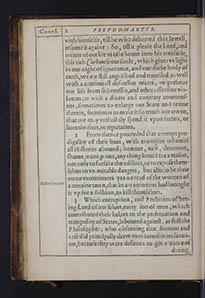 Chap. 1.
2
PSEVDO-MARTYR.
Chap. 1.
2
PSEVDO-MARTYR.
with himselfe; till he who deliuered this Iewell,
resume it againe: So, till it please the Lord, and
owner of our life to take home into his treasurie,
this rich Carbuncle our soule, which giues vs light
in our night of ignorance, and our darke body of
earth, we are still anguished and trauelled, as well
with a continuall defensiue warre, to preserue
our life from sickenesses, and other offensiue vio-
lences; as with a diuers and contrary couetous-
nes, sometimes to enlarge our State and terme
therein, somtimes to make it so much our owne,
that we may vnthriftily spend it vpon surfets, or
licentiousnes, or reputation. 2 From thence proceeded that corrupt pro-
digality of their liues, with examples whereof
all Histories abound; honour, ease, deuotion,
shame, want, paine, any thing serued for a reason,
not only to forsake themselues, or to expose them-
selues to vn-euitable dangers, but also to be their
owne executioners; yea we read of the women of
a certaine town, Gellius l. 15. c. 10 that in a wantonnes had brought
it vp for a fashion, to kill themselues. 3 Which corruption, and Ambition of bee-
ing Lord of our selues, euery sort of men, which
contributed their helpes to the preseruation and
tranquility of States, laboured against: as first the
Philosopher, who obseruing that honour and
ase did principally draw men into this inclinati-
on, because they were desirous to get a name of during, 003
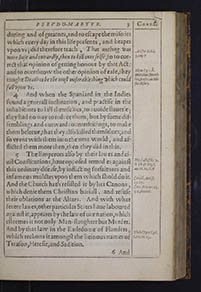 PSEVDO-MARTYR.
3
Chap. 2.
PSEVDO-MARTYR.
3
Chap. 2.
during, and of greatnes, and to escape the miseries
which euery day in this life presents, and heapes
vpon vs; did therefore teach, Aristot.. Eth. l.
3. cap. 7 That nothing was
more base and cowardly, then to kill ones selfe, so to cor-
rect that opinion of getting honour by that Act:
and to ouerthrow the other opinion of ease, Idem l. 3 c. 6.
Maetalius Metel-
lus, prefat. in Hi-
stor. Osorij. they
taught Death to be the most miserable thing which could
fall vpon vs. 4 And when the Spaniard in the Indies
found a generall inclination, and practise in the
inhabitants to kill themselues, to auoide slauere;
they had no way to reduce them, but by some dis-
semblings and outward counterfeitings, to make
them beleeue, that they also killed themselues, and
so went with them into the next world, and af-
flicted them more then, then they did in this. 5. The Emperors also by their lawes Dig. l. 48. Tit. 9.
le 38. & Dig. l.
49. tit.Tit. 10. le. 6 and ci-
uil Constitutions, haue opposed remedes against
this ordinary disease, by inflicting forfaitures and
infamous mulctes vpon them which shold do it. Concil. Antisi.
ca. 17.
And the Church hath resisted it by her Canons,
which denie them Christian buriall, and refuse Conc. Bracar. 23.
q. 5. placuit.
their oblations at the Altars. And with what
seuere lawes, other particular States haue laboured
against it, appeares by the law of our nation, which
esteemes it not only Man-slaughter but Murder.
And by that law in the Earledome of Flanders,
which reckons it amongst the heinous names of Tholos. Synt. l. 36.
c. 22. nu. 13.
Treason, Heresie, and Sedition. 6 And 004
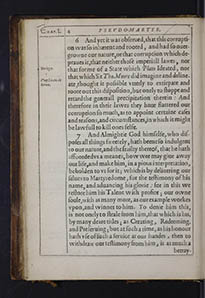 Chap. 1.
4
PSEVDO-MARTYR.
6 And yet it was obserued, that this corrupti-
Chap. 1.
4
PSEVDO-MARTYR.
6 And yet it was obserued, that this corrupti-on was so inhærent and rooted, and had so ouer-
growne our nature, or that corruption which de-
praues it, that neither those imperiall lawes, nor
that forme of a State which Plato Ideated, De leg. 9. nor
that which Sir Tho. Moore did imagine and deline-
ate, thought it possible vtterly to extirpate and
roote out this disposition, but onely to stoppe and Vtop. l. 2. ca. de
Serius.
retard the generall precipitation therein: And
therefore in their lawes they haue flattered our
corruption so much, as to appoint certaine cases
and reasons, and circumstances, in which it might
be lawfull to kill ones selfe. 7 And Almightie God himselfe, who dis-
poses all things sweetely, hath beene so indulgent
to our nature, and the frailty thereof, that he hath
affoorded vs a meanes, how wee may giue away
our life, and make him, in a pious interpretation,
beholden to vs for it; which is by deliuering our
selues to Martyredome, for the testimony of his
name, and aduancing his glorie for in this we
restore him his Talent with profite; our owne
soule, with as many more, as our example workes
vpon, and winnes to him. To denie him this,
is not onely to steale from him, that which is his,
by many deare titles; as Creating, Redeeming,
and Preseruing; but at such a time, as his honour
hath vse of such a seruice at our handes, then to
withdraw our testimony from him, is as much a betray- 005
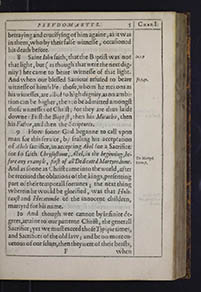 PSEVDO-MARTYR.
5
Chap. 1.
PSEVDO-MARTYR.
5
Chap. 1.
betraying and crucifying of him againe, as it was
in them, who by their false witnesse, occasioned
his death before. 8 Saint Iohn saith, Io. 1. 7. that the Baptist was not
that light, but (as though that were the next dig-
nity) hee came to beare witnesse of that light.
And when our blessed Sauiour reused to beare
witnesse of himselfe; Jo. 5. 3r1. those, whom he reckons as
his witnesses, are all of so high dignity, as no ambi-
tion can be higher, then to be admitted amongst
those witnesses of Christ; for they are thus laide
downe; First the Baptist, then his Miracles, then
his Father, and then the Scriptures. 9 How soone God beganne to call vpon
man for this seruice, by sealing his acceptation
of Abels sacifice, in accepting Abel for a Sacrifice
for so saith Chrysostome, Abel, in the beginning, be-
fore any example, first of all Dedicated Martyredome. De Martyri
Serm. 7.
And as soone as Christ came into the world, after
he receiued the oblations of the kings, presenting
part of their temporall fortunes; the next thing
wherein he would be glorified, was that Holo-
caust and Hecatombe of the innocent children,
martyrd for his name. 10 And though wee cannot by infinite de-
grees, attaine to our patterne Christ, the generall
Sacrifice; yet we must exceed those Typique times,
and Sacrifices of the old law; and be no more co-
uetous of our selues, then they were of their beasts, F when 006
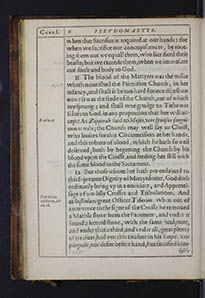 Chap. 1.
6
PSEVDO-MARTYR.
Chap. 1.
6
PSEVDO-MARTYR.
when that Sacrifice is required at our hands: for
when we sacrifice our concupiscences, by root-
ing them out we equall them, who sacrificed their
beasts; but we exceede them, when we immolate
our soule and body to God. 11 The blood of the Martyres was the milke
which nourished the Primitiue Church, in her
infancy, and shall it be too hard for our digestion
now? It was the seede of the Church, out of which
we sprung; and shall wee grudge to Tithe our
selues to God, in any proportion that hee will ac-
cept? As Zipporah said to Moses, Exod. 4,. 25.vere sponsus sangui-
num es mihi; the Church may well say to Christ,
who lookes for this Circumcision at her hands,
and this tribute of blood, which he hath so well
deserued; both by begetting the Church by his
blood vpon the Crosse, and feeding her still with
the same blood in the Sacrament. 12 But those whom hee hath pre-ordained to
this supreame Dignity of Martyrdome, God doth
ordinarily bring vp in a nouitiate, and Apprenti-
sage of worldly Crosses and Tribulations. And
as Iustinians great Officer Tiberius, Paul. Diaco.
ad Eutrop. Ad-
dit. 18. when out of
a reuerence to the signe of the Crosse, he remoued
a Marble stone from the Pauement, and vnder it
found a second stone, with the same Sculpture,
and vnder that a third, and vnder all, great plenty
of treasure, had not this treasure in his hope, nor
purpose, nor desire before hand, but satisfied him-
selfe 007
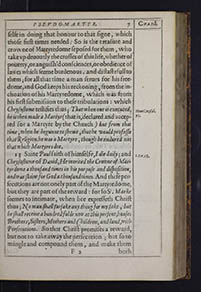 PSEVDO-MARTYR.
7
Chap. 1.
PSEVDO-MARTYR.
7
Chap. 1.
selfe in doing that honour to that signe, which
those first times needed: So is the treasure and
crowne of Martyredome seposed for them, who
take vp deuoutly the crosses of this life, whether of
pouerty, or anguish'd consciences, or obedience of
lawes which seeme burdenous, and distastefull to
them; for all that time a man serues for his free-
dome, and God keeps his reckoning, from the in-
choation of his Martyredome, which was from
his first submission to these tribulations: which
Chrysostome testifies thus; Homil. in psal.
95.That when one is executed,
he is then made a Martyr (that is, declared and accep-
ted for a Martyre by the Church) but from that
time, when he begunne to shewe, that he would professe
that Religion, he was a Martyre, though he endured not
that which Martyres doe. 13 Saint Paul saith of himselfe, I die daily; 1. Cor. 15. and
Chrysostome of Dauid, He merited the Crowne of Mar-
tyrdome a thousand times in his purpose and disposition,
and was slaine for God a thousand times. And these per-
secutions are not onely part of the Martyredome,
but they are part of the reward: for so St. Marke
seemes to intimate, when hee expresseth Christ
thus; No man shall forsake any thing for my sake, but
he shall receiue a hundred folde now at this present, houses
Brothers, Sisters, Mothers and Children, and land, with
Persecutions. So that Christ promises a reward,
but not to take away the persecution; but so to
mingle and compound them, and make them F2 both 008
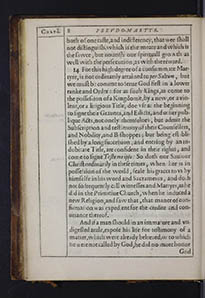 Chap. 1.
8
PSEVDO-MARTYR.
Chap. 1.
8
PSEVDO-MARTYR.
both of one taste, and indifferency, that wee shall
not distinguish, which is the meate and which is
the sawce, but nourish our spirituall growth as
well with the persecution, as with the reward. 14 For this high degree of a consummate Mar-
tyre, is not ordinarily attained to per Saltum, but
we must be content to serue God first in a lower
ranke and Order: for as much Kings, as come to
the possession of a Kingdome, by a new, or a vio-
lent, or a litigious Title, doe vse at the beginning
to signe their Graunts, and Edicts, and other pub-
lique Acts, not onely themselues, but admit the
Subscription and testimony of their Counsellers,
and Nobility, and Bishoppes; but being establi-
shed by a long succession, and entring by an in-
dubitate Title, are confident in their rights, and
come to signe Teste me ipso: So doth our Sauiour
Christ ordinarily in these times, when hee is in
possession of the world, seale his graces to vs by
himselfe in his word and Sacraments, and doth
not so frequently call witnesses and Martyrs, as he
did in the Primitiue Church, when he induced a
new Religion, and saw that, that maner of con-
firmation was expedient for the credite and con-
ueiance thereof. And if a man should in an immature and vn-
digested zeale, expose his life for testimony of a
matter, which were already beleeued, or to which
he were not called by God, he did no more honor God 009
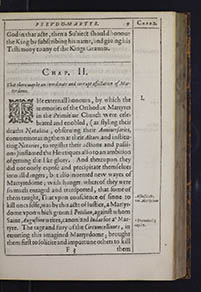 PSEVDO-MARTYR.
9
Chap. 2.
PSEVDO-MARTYR.
9
Chap. 2.
God in that acte, then a Subiect should honour
the King by subscribing his name, and giuing his
Testimony to any of the Kings Graunts. Chap. II.
That there may be an inordinate and corrupt affectation of Mar-
tyrdome.
THeThe externall honours, by which the I.
memories of the Orthodox Martyres
in the Primitiue Church were cele-
brated and enobled, (as styling their
deaths Natalitia, obseruing their Anniuersaries,
commemorating them at their Altars, and institu-
ting Notaries, to register their actions and passi-
ons) inflamed the Heretiques also to an ambition
of getting the like glory. And thereupon they
did not onely expose and precipitate themselues
into all dangers, but also inuented new wayes of
Martyredome; with hunger whereof they were
so much enraged and transported, that some of
them taught, Alfons. Castr.
ver. Martyrium That vpon conscience of sinne to
kill ones selfe, was by this acte of Iustice, a Martyr-
dome: vpon which ground Petilian, against whom
Saint Augustine writes, canonized Iudas for ax xPrateolus l. 3
cap. 19. Mar-
tyre. The rage and fury of the Circumcelliones, in
extorting this imagined Martyrdome; brought
them first to solicite and importune others to kill F3 them 010
 Chap. 2.
10
PSEVDO-MARTYR.
Chap. 2.
10
PSEVDO-MARTYR.
them; and if they fail'd in that suite, they did it
themselues. And another Sect prospered so farre
in heaping vp numbers of Martyres, Epipha. Hæres. 80 that their
whole sect was called Martyriani. 2 And a zealous scorne to be ouertaken, and
equal'd in this honor, prouoked sometimes those
who write the Actes of the Orthodoxe Martyrs,
to insert into their Histories some particulars
which were not true, and some which were not
iustifiable: Cap. 2 for of the first sort of these insertions,
which proceeded (as he saith) out of too much
loue to the Martyrs, Baronius in his Martyrologe com-
plaines; Dist. 15.
Sancta Romana and by the Canon which forbids these
Histories to be reade publiquely in the Romane
Church, it seems they were careful that the people
should not thereby be taught and encouraged, to
bring such actions into consequence and imitati-
on, as, (if the immediate instinct of Gods spirit,
did not iustifie them) would seeme indiscreete and
intemperate. Nor were they onely, which cor-
rupted the stories in fault, but out of Binius, the
last compiler of the Councels, we may perceiue,
that euen they which were Orthodoxe professors,
had some tincture of this ouer-vehement affecta-
tion of Martyredome: for he saies, that the sixe-
teth Canon of the Eliberitane councell (by which
it is enacted, To. 1. fo. 248 That those Christians which attempted to
breake the Idols of the Gentiles, and were slaine by them,
should not be numbred amongst the Martyrs) was made to 011
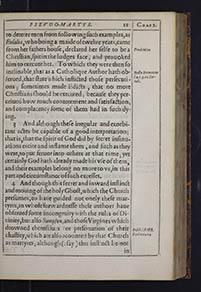 PSEVDO-MARTYR.
11
Chap. 2.
PSEVDO-MARTYR.
11
Chap. 2.
to deterre men from following such examples, as
Eulalia, who being a maide of twelue years, came
from her fathers house, Prudentius declared her selfe to be a
Christian, spit in the Iudges face, and prouoked
him to execute her. To which they were then so
inclinable, Bodin Dæmonom
l. 4. c. 3. ex Ter-
tull.that as a Catholique Author hath ob-
serued, that state which inflicted those persecuti-
ons; sometimes made Edicts, that no more
Christians should be executed, because they per-
ceiued how much contentment and satisfaction,
and complacency some of them had in such dy-
ing. 3 And although these irregular and exorbi-
tant actes be capable of a good interpretation;
that is, that the spirit of God did by secret insinu-
ations excite and inflame them, and such as they
were, to put feruor into others at that time; yet
certainly God hath already made his vse of them,
and their examples belong no more to vs, in this
part and circumstance of such excesses. 4 And though this secret and inward instinct
and mouing of the holy Ghost, which the Church
presumes, to haue guided not onely these mar-
tyres, in whose forwardnesse these authors haue
obserued some incongruity with the rules of Di-
uinity, but also Sampson, and those Virgines which
drowned themselues for preseruation of their
chastity, Euseb. l. 8 Hist.
Eccles. ca. 24 which are also acounted by that Church
as martyres; although (I say) this instinct lie not in 012
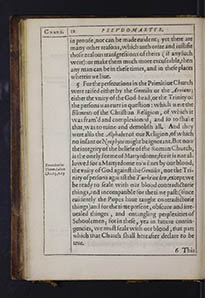 Chap. 2.
12
PSEVDO-MARTYR.
Chap. 2.
12
PSEVDO-MARTYR.
in proofe, nor can be made euident; yet there are
many other reasons, which authorize and iustifie
those zealous transgressions of theirs (if any such
were): or make them much more excuseable, then
any man can be in these times, and in these places
wherein we liue. 5 For the persecutions in the Primitiue Church
were raised either by the Gentiles or the Arrians;
either the vnity of the God-head, or the Trinity of
the persons was euer in question: which were the
Elements of the Christian Religion, of which it
was fram'd and complexioned; and so to shake
that, was to ruine and demolish all. And they
were also the Alphabet of our Religion, of which
no infant or Neophyte might be ignorant. But now
the integrity of the beliefe of the Roman Church,
is the onely forme of Martyrdome; for it is not al-
lowed for a Martyrdome to witnes by our blood, Feuardentius
Theom. Caluin
l. 8. c. 13. n. 13.
the vnity of God against the Gentiles, nor the Tri-
nity of persons against the Turke or Iew, except we
be ready to seale with our blood contradictorie
things, and incompatible for the time past: (since
euidently the Popes haue taught contradictorie
things) and for the time present, obscure and irre-
uealed thinges, and entangling perplexities of
Schoolemen; for in these, yea in future contin-
gencies, we must seale with our blood, that part
which that Church shall hereafter declare to be
true. 6 This 013
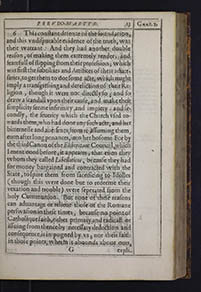 PSEVDO-MARTYR.
13
Chap. 2.
6 This constant defence of the foundation,
PSEVDO-MARTYR.
13
Chap. 2.
6 This constant defence of the foundation,
and this vndisputable euidence of the truth, was
their warrant: And they had another double
reason, of making them extremely tender, and
fearefull of slipping from their profession; which
was first the subtilties and Artifices of their aduer-
saries, to get them to doe some acte, which might
imply a transgressing and dereliction of their Re-
ligion, though it were not directly so; and so
draw a scandall vpon their cause, and make their
simplicity seeme infirmity, and impiety: and se-
condly, the seuerity which the Church vsed to-
wards them, who had done any such acte, and her
bitternesse and auersenes, from re-assuming them,
euen after long penances, into her bosome. For by
the third Canon of the Eliberitane Councel, which
I mentioned before, it appeares, that euen they
whom they called Libellaticos, because they had
for money bargained and contracted with the
State, to spare them from sacrificing to Idolles
(though this were done but to redeeme their
vexation and trouble) were seperated from the
holy Communion. But none of these reasons
can aduantage or relieue those of the Romane
perswasion in these times, because no point of
Catholique faith, either primary and radicall, or
issuing from thence by necessary deduction and
consequence, is impugned by vs; nor their faith
in those points, wherin it abounds aboue ours, G expli- 014
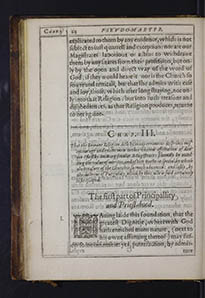 Chap. 2.
14
PSEVDO-MARTYR.
Chap. 2.
14
PSEVDO-MARTYR.
explicated to them by any euidence, which is not
subiect to iust quarrell and exception; nor are our
Magistrates laborious or actiue to withdrawe
them by any snares from their profession, but on-
ly by the open and direct way of the word of
God, if they would heare it nor is the Church so
sowre and tetricall, but that she admits with ease
and ioy, those, which after long straying, not on-
ly into that Religion, but into such treasons and
disobediences, as that Religion produces, returne
to her againe. Chap. III. That the Romane Religion doth by many erroneous doctrines mis-
encourage and excite men to this vicious affectation of dan-
ger: first by inciting secular Magistracy: secondly by extol-
ling the value of merites, and of this worke in special, by which
the treasure of the Church is so much aduanced: and lastly, by
the doctrine of Purgatory, which by this acte is said certainely
to be escaped. The first part of Principallity
and Priest-hood. HAuingHauing laide this foundation, that the I.
greatest Dignitie, wherewith God
hath enriched mans nature, (next to
his owne assuming thereof) may suf-
fer some infirmitie: yea, putrefaction, by admix-
ture 015
 PSEVDO-MARTYR.
15
Chap. 3.
ture of humane and passionate respects, if when
PSEVDO-MARTYR.
15
Chap. 3.
ture of humane and passionate respects, if when
we are admitted to bee witnesses of Gods ho-
nour, we loue our owne glory too much, or the
Authoritie by which this benefit is deriu'd vpon
vs, too little, which is the function of secular Ma-
gistracie: We are next to consider, by what in-
ducements, and prouocations, the Doctrine and
practise of the Romane Church doth put forward,
and precipitate our slipperie disposition into this
vicious and inordinate affection, and dangerous
selfe-flatterie. 2 In three things especially they seeme to me,
to aduance and foment this corrupt inclination.
First, by abasing, and auiling the Dignitie and
persons of secular Magistrates, by extolling Ec-
clesiasticke immunities and priuiledges: Secondly,
by dignifying and ouer-valewing our merits
and satisfactions, and teaching that the treasure
of the Church, is by this expence of our blood in-
creased. And thirdly, by the Doctrine of Purga-
torie, the torments whereof are by this suffering
said to be escaped and auoided. 3 And in the first point, which is a dis-estima-
tion of Magistracie, they offend two wayes. Com-
paratiuely, when they compare together that and
Priest-hood, and Positiuely, when not bringing
the Priestly function into the ballance, or disputa-
tion, they giue the Pope authority as Supreame spi-
rituall Princesse, ouer all Princes. G2 4 When 016
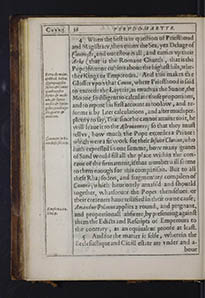 Chap. 3.
16
PSEVDO-MARTYR.
4 When the first is in question of Priesthood
Chap. 3.
16
PSEVDO-MARTYR.
4 When the first is in question of Priesthood
and Magistracy, then enters the Sea, yea Deluge of
Canonists, and ouerflowes all, and carries vp their
Arke (that is the Romane Church, that is the
Pope) fifteene cubites aboue the highest hils, whe-
ther Kings or Emperours. Extra. de maior.
& Obed. Solitæ.
Quinquagesies
septies & Centies
quadragesies
septies & medi-
um & septies
mesies & septin-
gesies, quadrage-
sies, quater &
medium. And this makes the
Glosser vpon that Canon, where Priesthood is said
to exceede the Layetie, as much as the Sunne, the
Moone, so diligent to calculate those proportions,
and to repent his first account as too low, and re-
forme it by later calculations, and after much per-
plexity to say, That since he cannot attaine to it, he
will leaue it to the Astronomers; so that they must
tell vs, how much the Pope exceedes a Prince:
which were a fit work for their Iesuite Clauius, Comment. in Sa-
cro. Bosc. fol. 219. who
hath expressed in one summe, how many granes
of Sand would fill all the place within the con-
caue of the firmament, if that number will seeme
to them enough for this comparison. But to all
these Rhapsoders, and fragmentary compilers of
Canons, which haue onely amass'd and shoueld
together, whatsoeuer the Popes themselues or
their creatures haue testified in their owne cause;
Amandus Polanus applies a round, Simphon. c. 24.
Thes. 9. and pregnant,
and proportionall answere, by presenting against
them the Edicts and Rescripts of Emperours to
the contrary, as an equiualent proofe at least. 5 And for the matter it selfe, wherein the
Ecclesiastique and Ciuill estate are vnder and a-
boue 017
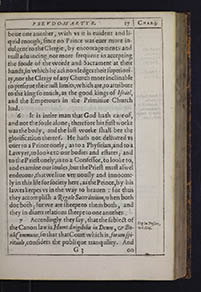 PSEVDO-MARTYR.
17
Chap. 3.
boue one another, with vs it is euident and li-
PSEVDO-MARTYR.
17
Chap. 3.
boue one another, with vs it is euident and li-quid enough, since no Prince was euer more in-
dulgent to the Clergie, by encouragements and
reall aduancing, nor more frequent in accepting
the foode of the worde and Sacrament at their
hands, in which he acknowledges their superiori-
ty, nor the Clergy of any Church more inclinable
to preserue their iust limits; which are, to attribute
to the king so much, as the good kings of Israel,
and the Emperours in the Primitiue Church
had. 6 It is intire man that God hath care of,
and not the soule alone; therefore his first worke
was the body, and the last worke shall bee the
glorification thereof. He hath not deliuered vs
ouer to a Prince onely, as to a Physitian, and to a
Lawyer, to looke to our bodies and estates; and
to the Priest onely, as to a Confessor, to looke to,
and examine our soules, but the Priest must aswel
endeuour, that we liue vertuously and innocent-
ly in this life for society here, as the Prince, by his
lawes keepes vs in the way to heauen: for thus
they accomplish a Regale Sacerdotium; when both
doe both; for we are sheepe to them both, and
they in diuers relations sheepe to one another. 7 Accordingly they say, that the subiect of Reg. Iu. Possore,
in 6. Glos.
the Canon law is Homo dirigibilis in Deum, & Bo-
nū Commune; so that that Court which is, forum spi-
rituale, considers the publique tranquility. And G3 on 018
 Chap. 3.
18
PSEVDO-MARTYR.
Chap. 3.
18
PSEVDO-MARTYR.
on the other side Charles the great, to establish a
meane course between those two a Constantin.
Ann. 754. extreame Coun-
cels, of which a one had vtterly destroyed the vse
of Images in bb Nicenum 2.
Anno 787. Churches: the other had induced
their adoration, takes it to belong to his care and
function, not onely to call a cc Francofur.
Anno 794. Synode to determine
herein, but to write the booke of that important
and intricate point, to Adrian then Pope; which
dd Donat. Constant
l. 2. nu. 60. Steuchius saith, remaines yet to be seene in Biblio-
theca Palatina, and vrges and presses that booke
for the Popes aduantage. And in the preface of
that booke, the Emperour hath these wordes:
ee Haimius Fel-
dius Decretu.
Impp. de Imagi-
nibus. fo. 91. In sinu Regni Ecclesiæ gubernacula suscepimus; and to
proceede, that not only he, to whom the Church
is committed, ad regendum, in those stormy
times, but they also which are Enutriti ab vberibus
must ioine with him in that care: and therefore
he addes, That he vndertooke this worke, Cum
Conhibentia Sacerdotum in regno suo; neither would
this Emperour (of so pious affections towards
that Sea, expressed in profuse liberalities) haue v-
surped any part of Iurisdiction, which had not
orderly deuolued to him, and which he had not
knowne to haue beene duely executed by his pre-
decessors. 8 Whose authoritie, in disposing of Church
matters, and direction in matters of Doctrine,
together with the Bishops, appeares abundantly
and euidently out of their owne Lawes, and out of 019
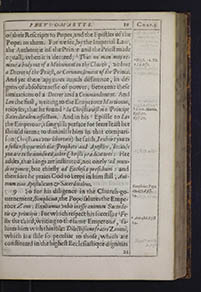 PSEVDO-MARTYR.
19
Chap. 3.
PSEVDO-MARTYR.
19
Chap. 3.
of their Rescripts to Popes, and the Epistles of the
Popes to them. For we see, by the Imperial Law,
the Authoritie of the Prince and the Priest made
equall, when it is decreed, a a Dig. li. 11. Tit.
7. l. 8. Ossa. That no man may re-
moue a body out of a Monument in the Church, without
a Decree of the Priest, or Commandement of the Prince.
And yet there appeares much difference, in de-
grees of absolutenesse of power, betweene these
limitations of a Decree and a Commandement. And
Leo the first, writing to the Emperour Martianus,
reioyses, that he found b b Leo 1. Martia. In Christianissmo Principe
Sacerdotalem affectum. And in his c c Epist. 70.
Epist. 75. Epistle to Leo
the Emperour, vsing this preface for feare least hee
should seeme to diminish him in that compari-
son (Christiana vtor libertate) he saith, I exhort you to
a fellowshippe with the Prophets and Apostles, because
you are to be numbred inter Christi prædicatores: Hee
addes, that kings are instituted, not onely ad mun-
di regimen, but chiefly ad Ecclesiæ presidium: and
therefore he praies God to keepe in him still, Ani
mum eius Apostolicum & Sacerdotalem. 9 So for his diligence in the d Simplicius Papa
An. 471. Epist.
14. Church-go-
uernement, Simplicius, d the Pope salutes the Empe-
rour Zeno. Exultamus vobis inesse animum Sacerdo-
tis & principis: For which respect his successor a a Ann 486. Epist
14. Fe-
lix the third, writing to the same Emperour, sa-
lutes him with his stile: Dilectissimo fratri Zenoni,
which is a stile so peculiar to those, which are
constituted in the highest Ecclesiastique dignities as 020
 Chap. 3.
20
PSEVDO-MARTYR.
Chap. 3.
20
PSEVDO-MARTYR.
as Bishoppes and Patriarches, bb Extra. de Re-
script. Ad audi-
entiam.g os.verb
manifestum. that if the Pope
should write to any of them by the name of Sons,
which is his ordinary stile to secular princes, it vi-
tiates the whole Diplome, and makes it false. 10 And a cc Conc. Aurelian.
1. Clodu. regi. c. 2 Synodicall letter from a whole
Councell to a King of France, acknowledges this
Priestly care in the king, thus, Quia Sacerdotali men-
tis affectu, you haue commaunded your Priests to gather
together, &c. which right of general superintenden-
cie ouer the whole Church, d d Habetur in
Binio To. 2. f. 320.
Anno. 516. Anastasius the Em-
perour dissembled not, when writing to the Se-
nate of Rome to compose dissentions there, hee
called Hormisda the pope, Papam Almæ vrbis Romæ,
but in the Inscription of the Letter, amongst his
owne Titles, he writes Pontifex inclitus. 11 e e Li. 4. Epist. 32. Gregory himselfe (though his times to some
tastes, seeme a little brackish, and deflected from
vpright obedience to princes) saith of the Empe-
rours That no man can rightly gouerne earthly matters,
except he know also how to handle Diuine. And in the
weakest estate, and most dangerous fitt that euer
secular Magistrate suffered and endured, Greg. 7. Duci Sue
uiæSue-
uiæ l. 1. Epist. 19. Gregory
the seuenth denied not, that these two dignities
were as the two eyes of the body, which gouernd the bodie
of the Church in spirituall light; which is more, then
the Comparisons of Soule and Body, and of
Golde and Leade, as they are now vsurped and de-
torted, can affoord. And the euidence of this Binius To. 1. fol.
831. A.
truth hath extorted from Binius (a seuere and hea-
uie 021
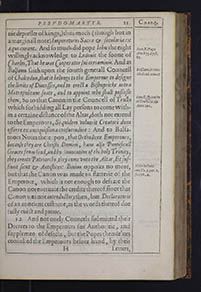 PSEVDO-MARTYR.
21
Chap. 3.
uie depresser of kings,) thus much (though but in
PSEVDO-MARTYR.
21
Chap. 3.
uie depresser of kings,) thus much (though but in
a marginall note) Imperatores Sacra & secularia ex
æ quo curant. Ioan. 8. Papa
Ann. 873. Epist.
87. And so much did pope Iohn the eight
willingly acknowledge to Lodouic the sonne of
Charles, That he was Cooperator sui certaminis. And as
Balsamo saith upon the fourth generall Councell
of Chalcedon, Balsamo. in Conc
Chalced. cana. 17 that it belongs to the Emperour to designe
the limits of Diocesses, and to erect a Bishopricke into a
Metrapolitane seate, and to appoint who shall possesse
them, Concil. Quinosen
in Trullo. ca. 69.
Anno 692. So to that Canon in the Councell of Trullo
which forbidding all Lay persons to come with-
in a certaine distance of the Altar, doth not extend
to the Emperours, Si quidem voluerit Creatori dona
offerre ex antiquissima consuetudine: And to Balsa-
moes Notes thereupon, that Orthodoxe Emperours,
because they are Christi Domini, haue also Pontificall
Graces from God, and by Inuocation of the holy Trinity,
they create Patriarchs, they come vnto the Altar, Et suf-
ficiunt sicut & Antistites: Notæ in hunc
can. To. 3. par. 1.
fo. 156. A. Binius opposes no more,
but that the Canon was made in flatterie of the
Emperour, which is not enough to defeate the
Canon, nor eneruate the credite thereof, since that
Canon was not introductory then, but Declaratorie
of an auncient custome, as the words thereof doe
fully euict and proue. 12 And not onely Councels submitted their
Decrees to the Emperours for Authoritie, and
supplemensupplement of defects, but the Popes themselues
consulted the Emperours before hand, by their H Letters, 022
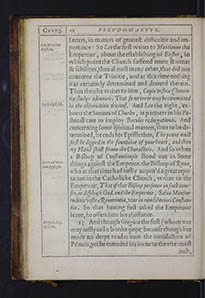 Chap. 3.
22
PSEVDO-MARTYR.
Chap. 3.
22
PSEVDO-MARTYR.
Letters, in matters of greatest difficultie and im-
portance: So Leo the first writes to Martianus the
Emperour, Leo, Martiano
Epist. 64. about the establishing of Easter, in
which point the Church suffered more stormes
& schismes, then almost in any other, that did not
concerne the Trinitie, and at this time nothing
was certainely determined and decreed therein.
Thus then he writes to him, Cupio vestræ Clemen-
tiæ studijs adiuuari, That so no error may be committed
in the obseruation thereof. And Leo the eight, Leo 8. Epist. 87. ex-
horts the Sonnes of Charles, as partners in his Pa-
storall care to imploy Baculos redargutionis. And
concerning some spiritual matters, then to be de-
termined, he ends his Epistle thus, The penne must
first be dipped in the fountaine of your heart, and then
my Hand shall frame the Characters. And so when
a Bishop of Constantinople stood out in some
things against the Emperor, Leo 1. ad Mar-
tian. Epist. 70. the Bishop of Rome,
who at that time had iustly acquir'd a great repu-
tation in the Catholicke Church, writes to the
Emperour, That if that Bishop perseuer in such cour-
ses, as displease God, and the Emperour, Salua Mansue-
tudinis vestræ Reuerentia, vtar in eum liberiori Constan-
tia. So that hauing first asked the Emperour
leaue, he offers him his assistance. Grego. 1. li. 3.
Epist. 20. 13 And though Gregorie the first (whom wee
may iustly call a border-pope, because though hee
made no deepe roades into the iurisdiction of
Princes, yet he extended his owne to the vttermost inch, 023
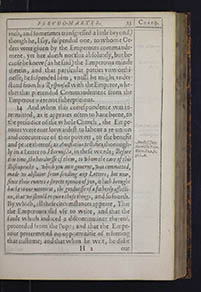 PSEVDO-MARTYR.
23
Chap. 3.
PSEVDO-MARTYR.
23
Chap. 3.
inch, and sometimes transgressed a little beyond)
though he, I say, suspended one, to whome Or-
ders were giuen by the Emperours commande-
ment, yet hee doeth not this absolutely, but be-
cause he knew (as he said) the Emperours minde
therein, and that particular parties vnworthi-
nesse; he suspended him, vntill he might vnder-
stand from his Responsall with the Emperor, whe-
ther that pretended Commandement from the
Emperour were not subreptitious. 14 And when this correspondence was in-
termitted, as it appeares often to haue beene, to
the preiudice of the whole Church, the Empe-
rours were euer forwardest to labour a re-union
and concurrence of their powers, to the benefit
and peace thereof; Anastas. Imp.
Hormisdæ Papæ.
Binius. To. 2. fo.
315. A. as Anastatius testifies thorough-
ly in a Letter to Hormisda, in these words; Before
this time, the hardnesse of them, to whom the care of this
Bishopricke, which you now gouerne, was committed,
made vs abstaine from sending any Letters; but now,
since their runnes a sweete opinion of you, it hath brought
backe to our memorie, the goodnesse of a fatherly affecti-
on, that we should require those things, and so foorth.
By which, all these circumstances appeare, That
the Emperours did vse to write, and that the
fault which induced a discontinuance thereof,
proceeded from the Pope; and that the Empe-
rour pretermitted no opportunitie of resuming
that custome; and that where he writ, he did it H2 out 024
 Chap. 3.
24
PSEVDO-MARTYR.
Chap. 3.
24
PSEVDO-MARTYR.
out of a fatherly care, and by the way of requiring.
And how much ioy Hormisda conceiued by this
Letter, Hormisda Epist.
2. appeares by his phrase of expressing it, Sa-
cros affatus congrua veneratione accepimus. Binius To. 2. fo.
335. B. 15 With like care Iustinus the Emperour ex-
horts the same Pope, to a Peace and Vnion with
the Easterne Church, by his Letters which hee
cals Diuinos Apices. And scarse by any one thing
doth this care of Princes, and obsequiousnesse of
Popes appeare more, then by the Letter of Pela-
gius the first (who was little aboue 550. yeares
from Christ) to Childebert King of France, in these
words. Pelagius 1. Epist.
16. & 25. q. 1,
Satagendum. We must endeuour, for the taking away of all
scandall of suspition, to present the obsequiousnesse of our
Confession, vnto Kings, to whom the holy Scriptures
command euen vs to bee subiect. For Ruffinus, your
Excellencies Ambassadour, asked from vs confidently, as
became him, that either we should signifie to you, that
we did obserue in all points the Faith, which Leo had de-
scribed, or send a Confession of our Faith in our owne
words. And so accordingly he performes both,
as well binding himselfe to the Faith of his pre-
decessours, as exhibiting to the King another
forme of the same Faith, compos'd and digested
by himselfe; which, if the Bishops of that Sea
would accept now, I doe not perceiue wherein
there could be any Schisme. 16 And as the Emperours were carefull assi-
stants of the Popes, that that mother Church, at whose 025
 PSEVDO-MARTYR.
25
Chap. 3.
PSEVDO-MARTYR.
25
Chap. 3.
whose breast most of the Westerne Churches suc-
ked their spirituall nourishment, should be infe-
cted with no poison, because it might easily be de-
riued from thence to the other members; so did
they not attend the leisure of that Churches reso-
lution, nor the incommodity of Generall Coun-
cels, but vsed their owne power to gouerne their
Churches, by constitutions of their owne; for so
a a Cod. l. 1. Tit. 3. l.
vltim. in fine. Iustinian the Emperour sayes of his owne lawe,
by which he priuiledges certain religious houses;
We offer vp this Diuine law as a faire and conuenient sa-
crifice to Christ. So that eyther that attribute Diui-
num was then affoorded to ciuill Constitutions,
or the Emperour made Ecclesiastique lawes, if
that word belong onely to such. bb Cod. l. 1. Tit. 2.
le. 3. The Empe-
rours tooke it into their care, to dispose of their e-
states which entred into Monasteries; cc Cod. l. 1. Tit. 3. l.
20. And of
theirs also which dyed in Monasteries; so that
neither the purpose of entring, nor the acte, nor
the habite, and perseuerance deuested the Empe-
rour of his right, or hindred the working of the
Law. aa Cod. l. 1. Tit.
3. l. 4. & 27. The Emperours also by their lawes ap-
pointed which of their subiects might not take
Orders, bb Ibid. le. 9. and at what age Orders might be con-
fer'd; and that no woman after a second marriage
might be Diaconissa; c c Ibid. §. Dia-
conissa. which was, to make a law
of Bigamy. 17 Yea they commanded and instructed in
matter of Faith; for so dd Cod, li. 1. Tit. 1
l. 6. Iustinian saies of himselfe, H3 we 026
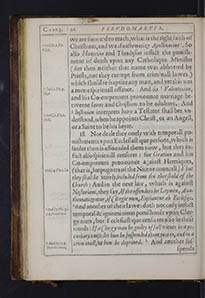 Chap. 3.
26
PSEVDO-MARTYR.
Chap. 3.
26
PSEVDO-MARTYR.
we are forward to teach, what is the right faith of
Christians, and we Anathematize Apollinariuse. e Cod. lib. 1. Tit.
6. l. 2. So
also Honorius and Theodosius inflict the punish-
ment of death vpon any Catholique Minister
(for then neither that name was abhorred by
Priests, nor they exempt from criminall lawes)
which shold re-baptize any man; and yet this was
a meere spirituall offence. And so ff Cod. l. 1. Tit. 9.
lib. 6. Valentinian,
and his Co-emperours pronounce marriage be-
tweene Iewes and Christians to be adultery. And
gg Cod. l. 1. Tit. 2.
l. vlt. Iustinian interprets how a Testator shall bee vn-
derstood, when he appoints Christ, or an Angell,
or a Saint to be his heyre. 18 Nor deale they onely with temporall pu-
nishments vpon Ecclesiastique persons, which is
farder then is affoorded them now, but they in-
flict also spirituall censures: for Gratian and his
Co-emperours pronounce against Heretiques,
(that is, hh Cod. l. 1. Tit. 1. l. 2 Impugners of the Nicene councell) That
they shall be vtterly secluded from the threshold of the
Church: And in the next law, which is against
Nestorians, they say, If the offenders be Laymen, Ana-
thematizentur, if Clergie men, Eijciantur ab Ecclesijs.
a a Cod. l. 1. Tit. 3. l.
7. § Presbiteri. And another of their lawes doth not only inflict
temporal & ignominious punishmēent vpon Cler-
gy men, but Ecclesiastique censures also in these
words: If a Clergy man be guilty of fals witnes in a pe-
cuniary cause let him be suspended three yeares, and in a
criminall, let him be depriued.bb Ibidde. 17. §.
Interdicimus. And another sus-
spends 027
 PSEVDO-MARTYR.
27
Chap. 3.
spends for three yeares, euen Sanctissimos & vene-
PSEVDO-MARTYR.
27
Chap. 3.
spends for three yeares, euen Sanctissimos & vene-rabiles Episcopos; if they doe but looke vpon players
at Tables: and that law authorizes him, vnder
whose power that offender is, if he appeare peni-
tent, to abbreuiate his punishment; cc Ibid. l. 19. and of Bi-
shoppes which will not forsake women, it pro-
nounces thus; Abiiciantur Episcopatibus. And in
the matter of establishing and ordering Sanctua-
ries, dd Simancha. de
Repub. l. 8. c. 40. one of the writers of the Romane parte
hath presented ciuill constitutions enow, to teach
vs, that that was within the care and Iurisdiction
of secular Princes. 19 ee Simplicius Ze-
noni. Ep. 14. And when an Emperour had created a
Bishop of Antioch, contrary to the forme prescrib'd
in the Nicene Councell, of an intire obseruation,
whereof the christian Church was extremly zea-
lous, the Pope proceedes not by anullings and
vociferations, but writes thus to the Emperour:
We may not dissallow that which you haue done holily and
religiously out of a loue to peace and quietnes; by which
we see that Canons of Councels, though they
were Directions, yet they were not Obligations vpon
Princes for their gouernement. By all which it
appeares, that those Christian and Orthodoxe
Emperors, iustifying their inherent right, by these
frequent and vn-interrupted matters of fact, ap-
prehended not this vast and incomprehensible
distance betweene secular and ecclesiastique po-
wer, but that they were compatible enough, and H condu- 028
 Chap. 3.
28
PSEVDO-MARTYR.
Chap. 3.
28
PSEVDO-MARTYR.
conduced, and concurred to one perfection, and
harmony of the whole state. 20 And it is related by a a Espencæus.
Com. in Tim. l. 2.
pag. 275. an Author of great e-
stimation in the Romane profession, that Gregory
the seuenth was author of a new scisme, diuiding
and tearing priesthood and principality. bb Index Expur.
Belg. fo. 15. And it
is euident that Bertram a priest vnder Carolus Cal-
uus, almost eight hundred yeares since, writing of
that Diuine and abstruse mysterie, De corpore Do-
mini, submits his opinion to the iudgement of the
King and his Counsaile, as competent Iudges of
that question: and cc Prefatio in Hi-
stor. de act. &
Script. Lutheri. Cochlaeus saith, that Luthers
doctrine was condemned for hereticall by an e-
dict of the Emperours, with the common assent
of the Princes and the States. And the holy Ghost
had well intimated the concurrence of their two
powers in dd Deut. 17.11. Deuter. if those wordes which are in
the Text, Nolens obedire sacerdotis Imperio, & De-
creto Iudici, moriatur; were not chaunged by the
vulgate edition, into Ex Decreto; and thereby on-
ly the priest made Iudge of the controuersies, and
the Magistrate onely executioner of his Senten-
ces. 21 For certainely these two functions are not
in their nature so distinct, and Diametrically op-
posed, but that they may meete in one matter, yea
sometimes in one man, and one man may doe
both: for amongst the Gentiles, it was so for the
most part: and sometimes amongst the Israelites. And 029
 PSEVDO-MARTYR.
29
Chap. 3.
PSEVDO-MARTYR.
29
Chap. 3.
And in late times a a Epist. Maxi-
milli. ad Baro.
Leichtensteni
Habetur. in
Monit. polit. edit
Franct. Ann.
1609. fo. 33. Maximilian the first, a Catho-
lique Emperour, thought it belonged to the Em-
pire, to haue also the Papacy vnited to it: and ther-
fore when Iulius the second lay desperately sicke,
he endeuoured to bring to execution, that which
he had often meditated, and consulted, and recei-
ued as approued from some great persons of dig-
nity in that Church, which was to bee elected
Pope in the next Conclaue, and to restore the Pa-
pacy (as he thought or pretended) to the Empe-
riall Crowne. 22 bb Ceremoniæ
Sacræ. Cap. de
Ordinatione. And if a Lay-man be elected Pope, he need
not presently be made Priest, but he may, if hee
will, stay in Subdiaconatu. And to that degree they
seeme to admit the Emperour, when he comes to
be crowned at Rome; cc Idem. ca. de
Coronat. for at the Communion he
administers to the Pope in the place of Subdea-
con. And this in the Primitiue Church was not
(as dd Alfon. Alua-
res specul. vtri-
usque Dig. c. 10.
nu. 3. themselues confesse) Ordo Sacer: though of
late it be growne to be such a perplexed case, whe-
ther it were or no, that of those commissioners,
which two Popes made to suruay the Decretals,
one company expunged, the other re-assumed
ee Extra de bi-
gam. non Ordin.
Super eis. glos.
verbo Sacros. one place in that book, which denies this to haue
beene amongst holy Orders. 23 The Emperour also puts on a Surplis, and
is admitted as a Canonick not only of Saint Peters
Church, but of Saint Iohn Laterane; to which
particular Churches (of which the Pope is Par-
I son, 030
 Chap. 3.
30
PSEVDO-MARTYR.
son, as he is Bishoppe of Rome, Metropolitane of
Chap. 3.
30
PSEVDO-MARTYR.
son, as he is Bishoppe of Rome, Metropolitane of
Italy, patriarch of the West, and pope of the world,
all those blessings and priuiledges which are or-
dinarily spoken of the Catholique Church are a Aluares specu.
vtri. Digni.
ca. 1. nu. 40.
said by a some to bee irremoueably annexed and
appropriate: hereupon some of their owne law-
yers say, bb Cassanæus par.
5. consid. 24. art.
59. & 181. That all kings are clergie men; and that
therefore it is sacriledge to dispute of the authori-
ty of a King. 24 But howsoeuer these two functions, since
the establing of Christianity, haue for the most
part beene preserued distinct, and ought so to be;
yet they are at most, but so distinct as our Bo-
dy and Soule: and though our Soule can contem-
plate God of herself, yet she can produce no exte-
rior act without the body. Nothing in the world
is more spirituall and delicate, and tender then
the conscience of a man; yet by good consent of
Diuines, otherwise diuersly perswaded in Religi-
on, the ciuill lawes of Princes doe binde our con-
sciences: and shall the persons of any men, or
their temporal goods, be thought to be of so sub-
limed, and spirituall a nature, that the ciuill con-
stitutions of Princes cannot worke vpon them?
Nor doe we therfore decline the comparison, so
much vrged by the Romanes, Bellar. de Pont.
Ro l. 5, c. 6. §. Est
igitur. Ex Nazi-
anz. that the Clergie ex-
ceede the Laiety as much as the body the soule,
when it is so conditioned and qualified, as the au-
thors thereof intended it; That is, that the seales and 031
 PSEVDO-MARTYR.
31
Chap. 3.
PSEVDO-MARTYR.
31
Chap. 3.
instruments of Gods grace, the Sacraments, are in
the dispensing of the Clergy, as temporall bles-
sings are in the Prince and his lawes, strictly and
properly, though concurrently both in both, (for
the execution of the most spirituall function of
the priest, as it is circumstanced with time and
place; and such, is ordinarily from the Prince): But
we are a litle affraid, that by a literall and punctu-
all acceptation of this comparison, we may giue
way to that Supremacy, which they affect ouer
Princes; because their Sepulueda saith, Sepulueda de
regn. & reg. Hu.
l. 1. That the
soule doth exercise ouer the body, Herile Imperium, vt
Dominus in seruum: and so by this insinuation
should the pope doe ouer the prince. 25 Howsoeuer in their first institution Popes
were meere Soules, and purely spirituall, yet as
the purest Soule becomes stain'd and corrupt
with sinne, assooneas soone as it touches the body: so
haue they by entring into secular businesse, con-
tracted all the corruptions and deformities there-
of, and now transferre this originall disease into
their successours. Concil. Nice. 2.
Actio 5. And as in the second Nicene
Councell, when the Bishop of Thessalonica a-
uerr'd it to be the opinion of Basil, Athanasius,
and Methodius, and the Vniuersall Church, that
Angels, and Soules were not meerely incorporeall,
but had bodies: The Councell in a prudent con-
niuencie, forbore to oppose any thing against
that asseueration, because it facilitated their pur-
I2 pose 032
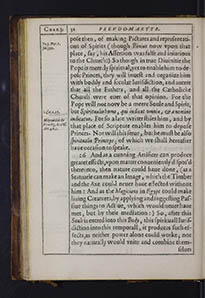 Chap. 3.
32
PSEVDO-MARTYR.
pose then, of making Pictures and representati-
Chap. 3.
32
PSEVDO-MARTYR.
pose then, of making Pictures and representati-ons of Spirits (though Binius now vpon that
place, To. 3. Par. 1.
fol. 399. say, his Assertion was false and iniurious
to the Church:) So though in true Diuinitie the
Pope is meerely spiritual, yet to enable him to de-
pose Princes, they will inuest and organize him
with bodily and secular Iurisdiction, and auerre
that all the Fathers, and all the Catholicke
Church were euer of that opinion. For the
Pope will not now be a meere Soule and Spirit,
but Spiritualis homo,1. Cor. 2.15. qui iudicat omnia, & a nemine
iudicatur. Maynardus de
Priuileg. Eccles.
Art. 9. n. 1. For so a late writer stiles him, and by
that place of Scripture enables him to depose
Princes. Nor will this serue, but he must be also
spiritualis Princeps; of which we shall hereafter
haue occasion to speake. 26 And as a cunning Artificer can produce
greater effects, vpon matter conueniently dispos'd
thereunto, then nature could haue done, (as a
Statuarie can make an Image, which the Timber
and the Axe could neuer haue effected without
him: And as the Magicians in Egypt could make
liuing Creatures, by applying and suggesting Pas-
siue things to Actiue, which would neuer haue
met, but by their mediation:) So, after this
Soule is entred into this Body, this spirituall Iuris-
diction into this temporall, it produces such ef-
fects, as neither power alone could worke, nor
they naturally would vnite and combine them-
selues 033
 PSEVDO-MARTYR.
33
Chap. 3.
selues to that end, if they were not thus compres-
PSEVDO-MARTYR.
33
Chap. 3.
selues to that end, if they were not thus compres-sed, and throng'd together like wind in a Caue.
Such are the thunders of vniust Excommunicati-
ons, and the great Earthquakes of transferring
Kingdomes. 27 And these vsurpations of your Priests
haue deseru'd, that that stygmaticall note should
still lie vpon them, which your Canons retaine, a Dist. 50. Et
Purgabit. glos.
verb. Domo.
a That all euill proceedes from Priests. For though
b Manriqe whom Sixtus the fift employ'd, had re-
mooued b Index. Expur.
Belg. fol. 306. that glosse, yet Faber to whom Gregorie
the thirteenth committed the suruey of the Ca-
nons, retaines it still. 24. q. 3. Trans-
ferunt. And (if the Text be of bet-
ter credit then the glosse) the Text hath auerred
Saint Hieromes words, That searching ancient Hi-
stories, he cannot find, that any did rent the Church, and
seduce the people from the house of God, but those which
were placed by God, as Priests, and Prophets, that is,
Ouerseers; for these are turnd into winding Snares, and
lay scandals in euery place. 28 Euen the Name of King, presents vs an ar-
gument of pure, and absolute, and independant
Authoritie; for it expresses immediatly, and radi-
cally his Office of gouerning, whereas the name of
Bishop hath a metaphoricall, and similitudinarie
deriuation, and being before Christianitie appli-
ed to Officers, which had the ouerseeing of o-
thers, but yet with relation to Superiours, to
whom they were to giue an account, deuolu'd I3 con- 034
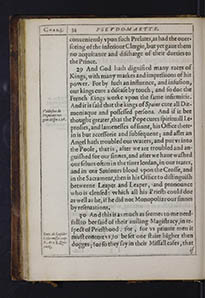 Chap. 3.
34
PSEVDO-MARTYR.
Chap. 3.
34
PSEVDO-MARTYR.
conueniently vpon such Prelates, as had the ouer-
seeing of the inferiour Clergie, but yet gaue them
no acquitance and discharge of their dueties to
the Prince. 29 And God hath dignified many races of
Kings, with many markes and impressions of his
power. For by such an influence, and infusion,
our kings cure a disease by touch, and so doe the
French Kings worke vpon the same infirmitie.
And it is said that the kings of Spaine cure all Dæ-
moniaque and possessed persons. Valdesius de
Dignitate re-
gum Hispa c. 16. And if it bee
thought greater, that the Pope cures spirituall Le-
prosies, and lamenesses of sinne, his Office there-
in is but accessorie and subsequent; and after an
Angel hath troubled our waters, and put vs into
the Poole, that is, after we are troubled and an-
guished for our sinnes, and after we haue washed
our selues often in the riuer Iordan, in our teares,
and in our Sauiours blood vpon the Crosse, and
in the Sacrament, then is his Office to distinguish
betweene Leaper and Leaper, and pronounce
who is clensed: which all his Priests could doe
as well as he, if he did not Monopolize our sinnes
by reseruations. 30 And this is as much as seemes to me need-
full to bee said of their auiling Magistracy, in re-
spect Ioan. de Lapide
Casus missal. cap.
6. Ar. 5 §. Quo-
cunque of Priesthood: for, for vs priuate men it
must content vs, to be set one staire higher then
dogges; for so they say in their Missall cases, that if 035
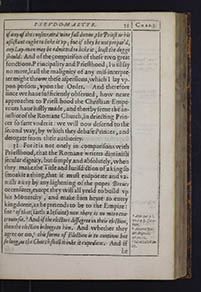 PSEVDO-MARTYR.
35
Chap. 3.
PSEVDO-MARTYR.
35
Chap. 3.
if any of the consecrated wine fall downe, the Priest or his
assistant ought to licke it vp; but if they be not prepar'd,
any Lay-man may be admitted to licke it, least the dogge
should. And of the comparison of these two great
functions, Principality and Priesthood, I will say
no more, least the malignity of any mis-interpre-
ter might throw these aspersions, which I lay vp-
pon persons, vpon the Order. And therefore
since we haue sufficiently obserued, how neare
approaches to Priest hood the Christian Empe-
rours haue iustly made, and thereby seene the in-
iustice of the Romane Church, in deiecting Prin-
ces so farre vnder it: we will now descend to the
second way, by which they debase Princes, and
derogate from their authority. 31 For it is not onely in comparisons with
Priesthood, that the Romane writers diminish
secular dignity, but simply and absolutely, when
they make the Title and Iurisdiction of a king so
smoakie a thing, that it must euaporate and va-
nish away by any lightning of the popes Breues
or censures, except they will all yeeld to build vp
his Monarchy, and make him heyre to euery a Azor. par. 2 l.
10. c. 9. §. Cæte-
rum.
kingdome, as he pretends to be to the Empire:
for a of that (saith a Iesuite) now there is no more con-
trouersie. bb Aluares spec-
utr. Dign. ca.
56. nu. 12. And if the electors dissagree in their election,
then the election belongs to him. And whether they
agree or no, c this forme of Election is to continue but
so long, as the Church shall thinke it expedient. And if c Idem. ca. 16 nu
15. he 036
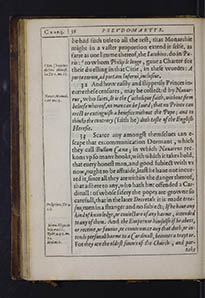 Chap. 3.
36
PSEVDO-MARTYR.
Chap. 3.
36
PSEVDO-MARTYR.
he had such title to all the rest, that Monarchie
might in a vaster proportion extend it selfe, as
farre as one limme thereof, the Iacobins, do in Pa-
ris: dd Ren. Choppinus
de Iure Monast.
l. 1. Tit 1. nu. 15. to whom Philip le longe, gaue a Charter for
their dwelling in that Citie, in these wordes: A
porta eorum, ad portam Inferni, inclusiue. 32 And how easily and slipperily Princes in-
curre these censures, may be collected by Nauar-
rus, who saies, Nauar. Manual.
c. 27 nu. 13. It is the Catholique faith, without firm
beleefe whereof, no man can be saued; that no Prince can
erect or extinguish a benefice without the Pope; and to
thinke the contrary (saith he) doth taste of the English
Heresie. 33 Scarce any amongst themselues can e-
scape that excommunication Dormant, which
they call Bullam Cænœ; in which Nauarrus rec-
kons vp so many hooks, with which it takes hold,
that euery honest man, and good subiect with vs
now, ought to be affraide, least he haue not incur-
red it, since all they are within the danger thereof,
that adhere to any, who hath but offended a Car-
dinall: of whose safety the popes are growne so
carefull, that in the later Decretals it is made In septimo. Tit 4.
c. 3. trea-
son, euen in a stranger and no subiect; If he haue any
kind of knowledge, or coniecture of any harme, intended Hiero. Gigas de
læsa ma. l. 1.
to any of them. And the Emperour himselfe if he abett,
or receiue, or fauour, or countenance any that doth, Rubr. 4. q. 5. nu.
10. or in-
tends personall harme to a Cardinall, becomes a traytor.
For they are the eldest sonnes of the Church, Ibid. nu. 2. and par-
take 037
 PSEVDO-MARTYR.
37
Chap. 3.
take of the Maiesty of their father. Nor are they
PSEVDO-MARTYR.
37
Chap. 3.
take of the Maiesty of their father. Nor are they
brethren to any of lesse ranke, but to such, their
stile is but vester vti frater, Ante. librum
Schultingius. To. 1 as Baronius writes to
Schultingius his abbreuiator. And though Bis-
hops and the Emperour swear fidelity to the pope;
yet, Vbi supra. n. 6. saies Gigas, the Cardinals doe not take that oath,
because they are parts of his body, and his owne Bowels. 34 And not onely all princes are bound to
a reuerend respect of them, but a a Paris crassus
De ceremo. E-
piscop. li. 2. ca. 42 in solemne pro-
cessions, the Image of Christ must looke backward, if a
Cardinall follow; and God himselfe in the Host,
must giue them place: for at the Coronation of
the pope, bb Cerem. Sacræ.
cap. de conse-
crat. fo. 36. when they prouide twelue horses for
the Pope, and one gentle one for the Host, the
dignity of the place being measured by the neare-
nesse to the Popes person; the Cardinals place is,
to ride betweene the Host and the Pope. And in
their mysterious passages vpon Ash-wednesday,
cc Par. crass l. 2.
c. 43. when the Pope laies the ashes vpon a Cardinall,
he saies not to him, as to all others, Memento homo,
quia Cinis es, but quia puluis es: Intimating per-
chance, that they are neuer so burnt to ashes, but
that the fires of lust or ambition are still aliue in
them. To which, I thinke there was some regard
had, when it was so wisely prouided, dd Idem. l. 5. c. 27 that when
a Cardinall did celebrate masse, there might enter
no woman, nor man without a beard. 35 Nor doth the Pope improuidently, in ad-
uancing them with these dignities and priui-
K ledges, 038
 Chap. 3.
38
PSEVDO-MARTYR.
ledges, nor in multiplying their number, so di-
Chap. 3.
38
PSEVDO-MARTYR.
ledges, nor in multiplying their number, so di-rectly against the Councell of Basil, ee Conc. Basil.
Sess 23. cap. de
nume. et qualit.
Card. which limits
them to twentie foure (except, vpon vniting the
Greek Church, it might be thought fit to add two
more) and forbids expresly any Nephues of the
Popes to be admitted. For no excesse in number,
ff Aluares specutr
Dig. ca. 24. n. 15 (though they were returned to two hundred
and thirty at once, as they are said to haue beene in
Pontianus his time; and though he should pile
them vp, and throw them downe, as fast as those
Popes which created sixe and twenty in one day,
Theod. a Niem.
de scism. l. 1, cap.
12. & 57. and executed sixe in another) could disaduantage
that Sea of Rome, if they might be prouided out
of the states of other Princes (as in a great measure
they are) since the Church is their heyre, and they
are all but stewards for her. Of which the Pope
gaue a dangerous instance, when he put in his
claime for the kingdome of Portugall, Conestaggio del-
la vnione di
port. Et custig.
l. 3. in princip. because the
last king was a Cardinall. These princes, no secu-
lar prince may dare to offend, nor subiect adhere
to him, if he doe, vpon danger of that Bull: and
yet they are made Iudges of the actions of all
Princes, Resp. ad Card.
Colum. nu. 31. as Baronius saies; and so oppressed with
infinit suits against Princes, that it may be fitly
said of them, which Iob saies, Iob. 26,.5. Ecce genuit gigantes
sub aquis, & qui habitant cum eis: which wordes
the Cardinals will not thanke Baronius for apply-
ing to them, if they consider that Lyra interprets
this place of Gyants drowned in the flood, and now 039
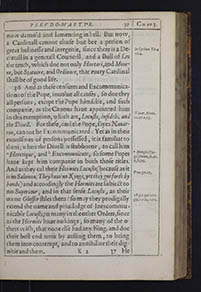 PSEVDO-MARTYR.
39
Chap. 3.
PSEVDO-MARTYR.
39
Chap. 3.
now damn'd and lamenting in hell. But now,
a Cardinall cannot chuse but bee a person of
great holinesse and integritie, In septimo. Tit. 4.
ca. 4. since there is a De-
cretall in a generall Councell, and a Bull of Leo
the tenth, which doe not only Hortari, and Moue-
re, but Statuere, and Ordinare, that euery Cardinal
shall be of good life. 36 And as these censures and Excommunica-
tions of the Pope, inuolue all causes, so doe they
all persons, except the Pope himselfe, and such
companie, as the Canons haue appointed him
in this exemption, which are, Nauar. Manu.
ca. 27. n. 13. Locusts, infidels, and
the Diuell. For these, and the Pope, sayes Nauar-
rus, cannot be Excommunicated: Yet as in their
exorcismes of persons possessed, it is familiar to
them, when the Diuell is stubborne, to call him
a Heretique, and b Excommunicate, a Menghi. Fla-
gel. Dæmo. fo. 42. so some Popes
haue kept him companie in both those titles.
And as they cal their Hermits Locusts b fo. 79. (because as it
is in Salomon, Prou. 30. 27. They haue no Kings, yet they goe forth by
bands) and accordingly the Hermits are subiect to
no Superiour, and in that sense Locusts, as their
owne Glosser stiles them: 16. q. 1. qui uere.
glas. verbo. vero. so may they prodigally
extend the name and priuiledge of Inexcommu-
nicable Locusts, to many in the other Orders, since
as the Hermits haue no kings, so many of the o-
thers wish, that none else had any King, and doe
their best endeuour by auiling them, to bring
them into contempt, and to annihilate their dig-
nitie and them. K2 37 He 040
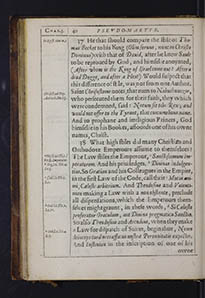 Chap. 3.
40
PSEVDO-MARTYR.
In Epist. eius ms37 He that should compare the stile of Tho-
Chap. 3.
40
PSEVDO-MARTYR.
In Epist. eius ms37 He that should compare the stile of Tho-mas Becket to his King (Olim seruus, nunc in Christo
Dominus) with that of Dauid, after he knew Saule
to be reproued by God, and himselfe anoynted,
(After whom is the King of Israel come out? After a
dead Dogge, and after a Flea?) Would suspect that
this difference of stile, was not from one Author.
Saint Chrisostome notes, that euen to Nabuchonozor,
Chrisost. ad Pop.
Antioch. Ho. 23. who persecuted them for their faith, they which
were condemned, said: Notum sit tibi Rex; and
would not offer to the Tyrant, that contumelious name.
And to prophane and irreligious Princes, God
himselfe in his Bookes, affoords one of his owne
names, Christ. 38 What high stiles did many Christian and
Orthodoxe Emperours assume to themselues? a Dig. li. 31. Ti. 1. l
87. §. Imperator.
The Law stiles the Emperour, a Sanctissimum Im-
peratorem. And his priuiledges, bb Dig. l. 1. Tit. 4.
Le. 3. Diuinas Indulgen-
tias. So Gratian and his Colleagues in the Empire,
in the first Law of the Code, call their cc Cod. l. 1. Tit. 1.
L. 1. Motus ani-
mi, Cæleste arbitrium. And Theodosius and Valenti-
nian making a Law with a non obstante, preclude
all dispensations, which the Emperours them-
selues might graunt, in these words, dd Cod. l. 1. Tit. 2.
Lc. 10. Si Cæleste
proferatur Oraculum, aut Diuina pragmatica Sanctio.
So also Theodosius and Arcadius, when they make
a Law for dispatch of Suites, begin thus, ee Cod. l. 1. Tit. 4
L. 3. Nemo
deinceps tardiores affatus nostræ Perennitatis expectet.
And Iustinian in the inscription of one of his owne 041
 PSEVDO-MARTYR.
41
Chap. 3.
PSEVDO-MARTYR.
41
Chap. 3.
owne Lawes, inserts amongst his owne Tiles,
ff Cod. l. 1. Tit. 15
Le. 3. Semper Adorandus Augustus. And in a Lawe of
Monasteriall, and Matrimoniall causes, (which are
now onely of spirituall Iurisdiction) he threatens,
that if any Bishop infringe that Law, gg Cod. l. 1. Tit. 3.
L. 55 §. His ita. Quam nostra
sanxit Æternitas Capitis supplicio ferietur. In which
stile also Theodosius and Arcadius ioyne, hh Cod. l. 11. Tit. 9.
l. 2. Adoratu-
rus æternitatem vestram dirigatur. And another pro-
ceedes somewhat further, ii Cod. l. 1. Tit. 2.
Leg. 8. Beneficio numinis nostri.
And Theodosius, and Valentinian deliuer it more
plainely, kk Cod. l. 1. Tit. 1.
L. 3. Vt sciant omnes, quantum nostra Diuinitas
auersatur Nestorium; and so in fauour of the puritie
and integritie of Christian Religion, in contem-
plation whereof, it seemes they were Religiously
exercised, euen at that time, when hee assum'd
these high stiles, they proceede in the same Law,
We anathematize all Nestorius followers, according to
those things which are already constituted A Diuini-
tate nostra. And Constantius, and Irene write them-
selues Dinos; and their owne Acts, Diualia. And
this, Pope Adrian, to whom they writ, reprehen-
ded not; Carol Mag. l. 1. c
1. & 3. but the Emperour Charles did, and ano-
ther phrase of as much exorbitance, which was,
Deus qui nobis conregnat. 39 The highest that I haue observed any of
our Kings to haue vsed, Glouer de Nobi-
lit. fol. 75. is in Edward the fourth,
who in his creation of Marques Dorset, speakes
thus of himselfe; Cum nostra Maiestas, ad Regium
Culmen sublimata existat; and after, Tantum splendo-
K3 ris 042
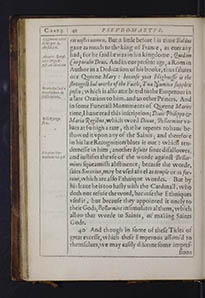 Chap. 3.
42
PSEVDO-MARTYR.
ris nostri nomen. Cassanæus catal
Chap. 3.
42
PSEVDO-MARTYR.
ris nostri nomen. Cassanæus catal
Glor. par. 5.
consid. 30. But a little before his time Baldus
gaue as much to the king of France, as euer any
had; for he said he was in his kingdome, Quidam
Corporalis Deus. Aluares specul.
vtri Dign. E-
pist. ad Mariam And in our present age, a Roman
Author in a Dedication of his booke, thus salutes
our Queene Mary: because your Highnesse is the
strongest bul-warke of the Faith, Tua Numina supplex
posco; Oratio Cœsarij a
Branhedoro in
subscriptione. which is also attributed to the Emperour in
a late Oration to him, and to other Princes. And
in some Funerall Monuments of Queene Maries
time, I haue read this inscription; Diuis Philippo &
Maria Regibus, Bell. Recoga.
fo. 2. which word Diuis, Bellarmine va-
lues at so high a rate, that he repents to haue be-
stowed it vpon any of the Saints; and therefore
in his late Recognition blots it out: which tender-
nesse in him, another Iesuite since disallowes,
and iustifies the vse of the worde against Bellar-
mines squeamish abstinence; Serarius lita-
neuticus. l. 2. q. 6 because the worde,
saies Serarius, may be vsed aswel as temple or as for-
tune, which are also Ethnique wordes. But by
his leaue he is too hasty with the Cardinall, who
doth not refuse the word, because the Ethniques
vsed it, but because they appointed it onely to
their Gods; Bellarmine insimulates al them, which
allow that worde to Saints, of making Saints
Gods. 40 And though in some of these Titles of
great excesse, which these Emperous assum'd to
themselues; we may easily discerne some impres-
sions 043
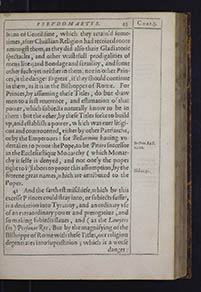 PSEVDO-MARTYR.
43
Chap. 3.
sions of Gentilisme, which they retain'd some-
PSEVDO-MARTYR.
43
Chap. 3.
sions of Gentilisme, which they retain'd some-times, after Christian Religion had receiued roote
amongst them; as they did also their Gladiatorie
spectacles, and other wastefull prodigalities of
mens liues; and Bondage and seruility, and some
other such: yet neither in them, nor in other Prin-
ces, is the danger so great, if they should continue
in them, as it is in the Bishoppes of Rome. For
Princes, by assuming these Titles, do but draw
men to a iust reuerence, and estimation of that
power, which subiects naturally know to be in
them: but the other, by these Titles seeke to build
vp, and establish a power, which was euer litigi-
ous and controuerted, either by other Patriarchs,
or by the Emperours: for Bellarmine hauing vn-
dertaken to proue the Pope, De Pont. Ro. li.
2. c. 12. to be Peters successor
in the Ecclesiastique Monarchy (which Monar-
chy it selfe is denyed, and not onely the popes
right to it) labors to proue this assumption, by the
fifteene great names, Ibid. ca. 32. which are attributed to the
Popes. 41 And the farthest mischiefe, which by this
excesse Princes could stray into, or subiects suffer,
is a deuiation into Tyranny, and an ordinary vse
of an extraordinary power and prerogatiue, and
so making subiects slaues, and (as the Lawyers
say) Personas Res. But by the magnifying of the
Bishoppe of Rome with these Titles, our religion
degenerates into superstition; which is a worse danger: 044
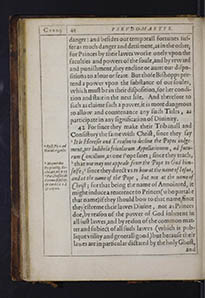 Chap. 3.
44
PSEVDO-MARTYR.
Chap. 3.
44
PSEVDO-MARTYR.
danger: and besides our temporall fortunes suf-
fer as much danger and detriment, as in the other;
for Princes by their lawes worke onely vpon the
faculties and powers of the soule, and by reward
and punishment, they encline or auert our dispo-
sitions to a loue or feare. But those Bishopps pre-
tend a power vpon the substance of our soules,
which must be in their disposition, for her condi-
tion and state in the next life. And therefore to
such as claime such a power, it is more dangerous
to allow and countenance any such Titles, as
participate in any signification of Diuinity. 42 For since they make their Tribunall and
Consistory the same with Christ, since they say
a a Epist. Fij 2. ad
Norinbergenses It is Heresie and Treason to decline the Popes iudge-
ment, per ludibria friuolarum Appellationum, ad futu-
rum Concilium, as one Pope saies; since they teach,
bb Maynardus
De priuileg. Ec-
cles. art. 27. n 15 that one may not appeale from the Pope to God him-
selfe; c since they direct vs to bow at the name of Iesus,
and at the name of the Pope, but not at the name of
Christ; for that being the name of Annointed, it c Par. Crassus de
Ceremo. Episcop.
& Card. l. 1 c. 5
& cap. 22.
might induce a reuerence to Princes (who partake
that name) if they should bow to that name; since
they esteeme their lawes Diuine, not as Princes
doe, by reason of the power of God inherent in
all iust lawes, and by reason of the common mat-
ter and subiect of all such lawes (which is pub-
lique vtility and generall good) but because their
lawes are in particular dictated by the holy Ghost, L and 045
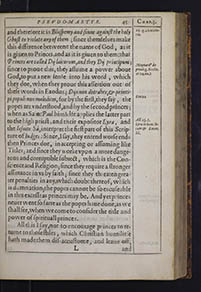 PSEVDO-MARTYR.
45
Chap. 3.
PSEVDO-MARTYR.
45
Chap. 3.
and therefore it is Blasþemy and sinne against the holy
Ghost to violate any of them; 25. q. 1. violato-
res. since themselues make
this difference betweene the name of God, as it
is giuen to Princes, and as it is giuen to them: that
Princes are called Dij laicorum, and they Dij principum;
since to proue this, Maynard' de
priuileg. Eccles.
ar. 14. nu. 1 they assume a power aboue
God, to put a new sense into his word, which
they doe, when they proue this assertion out of
these words in Exodus; Dijs non detrables, & princi-
pi populi non maledices, Exo. 22 for by the first, they say, the
popes are vnderstood, and by the second princes;
when as Saint Paul himselfe applies the latter part
to the high priest, and their expositor Lyra, Act. 23.5.
Lyram hunc lo-
cum & Eman.
Sâ. and
the Iesuite Sà, interpret the first part of this Scrip-
ture of Iudges: Since, I say, they entend worse ends
then Princes doe, in accepting or assuming like
Titles; and since they worke vpon a more dange-
rous and corruptible subiect, which is the Con-
science and Religion; since they require a stronger
assurance in vs by faith; since they threaten grea-
ter penalties in any which doubt thereof, which
is damnation; the popes cannot be so excuseable
in this excesse as princes may be. And yet princes
neuer went so farre as the popes haue done, as we
shall see, when we come to consider the title and
power of spirituall princes. All this I say, not to encourage princes to re-
turne to those stiles, which Christian humilitie
hath made them dis-accustome, and leaue off, L and 046
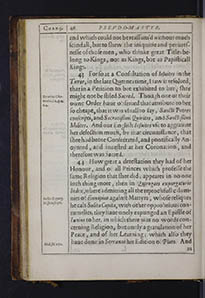 Chap. 3.
46
PSEVDO-MARTYR.
Chap. 3.
46
PSEVDO-MARTYR.
and which could not be reassum'd without much
scandall, but to shew the iniquitie and peruers-
nesse of those men, who thinke great Titles be-
long to Kings, not as Kings, but as Papisticall
Kings. 43 For so at a Consultation of Iesuites in the
Tower, in the late Queenes time, I saw it resolued,
that in a Petition to bee exhibited to her, shee
might not be stiled Sacred. Serarius Lita-
neutic. l. 2. q. 4.
n. 4. Though one of their
owne Order haue obserued that attribute to bee
so cheape, that it was vsuall to say, Sancti Patres
conscripti, and Sacratissimi Quirites, and Sanctissimi
Milites. And our English Iesuites vse to aggrauate
her defection much, by that circumstance, that
shee had beene Consecrated, and pontifically An-
oynted, and inuested at her Coronation, and
therefore was Sacred. 44 How great a detestation they had of her
Honour, and of all Princes which professe the
same Religion that shee did, appeares in no one
such thing more, then in Quirogaes expurgatorie
Index, where admitting all the reprochfull calum-
nies of Eunapius against Martyrs, Index Expurg.
Hispan. fo. 92. whose reliques
he cals Salita Capita, with other opprobrious con-
tumelies, they haue onely expunged an Epistle of
Iunius to her, in which there was no words con-
cerning Religion, but onely a gratulation of her
Peace, and of her Learning; which also they
haue done in Serranus his Edition of Plato. Ibid. fol. 150. And as 047
 PSEVDO-MARTYR.
47
Chap. 3.
PSEVDO-MARTYR.
47
Chap. 3.
as God hath continued his fauours showen to
her, vpon her successour, so haue they their ma-
lice: For in the second Tome of that worke, Ibid. fol. 151. they
haue taken away an Epistle Dedicatorie to his
Maiestie, that now is. 45 And as in many of their Rules, for that
Dissection and Anatomising of Authours, they
haue prouided that all Religion, and all pro-
phane knowledge shall depend vpon their will:
So haue they made a good offer, that all cariage
of State businesse shall bee open to them, Instruct. circa.
lib. corrig. §. 10. by ex-
punging all such sentences, as instructor remem-
ber Princes, in that learning, which those Rules
cals Rationem status, and which (because Italians
haue beene most conuersant therein) is vulgarly
called Ragion di stato. For this Ragion di stato, is,
as the Lawyers call it, Ius Dominationis; And as o-
thers call it, Arcana Imperij. And it pretends no
farther but to teach, by what meanes a Prince, or
any Soueraigne state, may best exercise that pow-
er which is in them, and giue least offence to the
Subiects, and yet preserue the right and dignitie
of that power. 46 For it is impossible, that any Prince should
proceede in all causes & occurrences, by a down-
right Execution of his Lawes: And he shall cer-
tainely be frustrated of many iust and lawfull
ends, if he discouer the way by which he goes to
them. And therefore these disguisings, and auer-
L2 ting 048
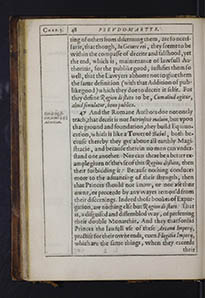 Chap. 3.
48
PSEVDO-MARTYR.
ting of others from discerning them, are so neces-
Chap. 3.
48
PSEVDO-MARTYR.
ting of others from discerning them, are so neces-sarie, that though, In Genere rei, they seeme to be
within the compasse of deceite and falshood, yet
the end, which is, maintenance of lawfull Au-
thoritie, for the publike good, iustifies them so
well, that the Lawyers abhorre not to giue them
the same definition (with that Addition of pub-
like good) which they doe to deceit it selfe. For
they define Ragion di stato to be, Cumaliud agitur,
aliud simulatur, bono publico. Soto de teg. se-
cret. memb. 3. q. 3
Ad tertium. 47 And the Romane Authors doe not onely
teach, that deceit is not Intrinsecè malum, but vpon
that ground and foundation, they build Equiuo-
cation, which is like a Tower of Babel, both be-
cause thereby they get aboue all earthly Magis-
tracie, and because therein no men can vnder-
stand one another. Nor can there be a better ex-
ample giuen of the vse of this Ragion di stato, then
their forbidding it: Because nothing conduces
more to the aduancing of their strength, then
that Princes should not know, or not vse their
owne, or proceede by any wayes remou'd from
their discernings. Indeed those bookes of Expur-
gation, are nothing else but Ragion di stato: That
is, a disguised and dissembled way, of preferring
their double Monarchie. And they that fordid
Princes the lawfull vse of these Arcana Imperij,
practise for their owne ends, euen Flagitia Imperij,
which are the same things, when they exceede their 049
 PSEVDO-MARTYR.
49
Chap. 3.
PSEVDO-MARTYR.
49
Chap. 3.
their true endes (which are iust authority, and the
publique good) or their lawfull waies to those
ends, which should euer be within the compasse
of vertue, and religion. 48 Of which sort are all those enormous dis-
pensations from Rome, which no interpretati-
on nor pretence can iustifie as (to omit some
sacrilegious and too immodest licenses) that of
Gregory the third is one, who writ to Boniface
his Legate in Germany,Carranza Sum.
Concil. fo. 353. that they, whose wiues being o-
uertaken with any infirmity, would not reddere Debitum,
might marry other wiues: which Binius hath wisely
left out. 49 But they are in these expurgations iniurious
also to the memorie of dead princes: for a a Hispanic. Ind.
fo. 148. they will
not admit our k. Edward the sixt, to be said to be
Admirandæ indolis, nor the Duke of bb Ibidem. Wittenberg præ-
clarus. They will not allow cc Idem. fo. 93. Vlrichus Huttenus
to be called A learned Knight: no, dd Id. fo. 148. neither him,
nor Oebanus Hessus to be so much as good poets.
But with the same circumspection, that the ee Ind. Belg. fo. 146 Bel-
gique Index could add to Borrhæus writing vppon
Aristotles politiques, in this sentence, Religionis cur-
a semper pertinuit ad principes, this clause, & Sacer-
dotem; the ff Ind. Hisp. fo.
158. Spanish Index dooth mutilate Velcurio
vpon Liuy, and from this sentence (the fift age was
decrepite vnder the Popes and Emperours) takes out
the Popes, and leaues the Emperours obnoxi-
ous to the whole imputation. And as with ex-
L3 treame 050
 Chap. 3.
50
PSEVDO-MARTYR.
treame curious malignity, they haue watched
Chap. 3.
50
PSEVDO-MARTYR.
treame curious malignity, they haue watched
that none of our side be celebrated, so haue they
spied some inuisible dangers, which the Popes
honor might incurre: and therfore as the gg Fol. 93. Spanish
Copie, hath before Luthers name expunged the let-
ter D, least it might intimate Doctor, or Diuus; so
the hh Fo. 154. Duch Copie, hauing found nothing to quarrel
at in Schonerus the Mathematician, expunges in
many places a great D. at beginning of Diuisi-
ons, because in it (as ordinarily those great initi-
all letters, haue some figure) there is imprinted
the popes head, and by it the diuell, presenting
him a Bull.
50 But this inhumanity of theirs hath not
deterr'd Thuanus from his ingenuity, in giuing to
all those learned men, whom he hath occasion to
mention, the attributes and epithetes due to their
vertues, though they be of a diuers perswasion in
Religion from himselfe: But those other men,
who in a proude humility will say brother Thiefe,
and brother Wolfe, Sedulius Apol.
pro. lib. Conform
l. 1. c. 12. & l. 3.
c. 28 and brother Asse, (as Saint Fran-
cis (perchance not vn-prophetically) is said to haue
done) will admit no fraternity nor fellowshippe
with Princes.
51 And though the Iesuites by the aduantage
of their fourth Supernumerary vow, of sustaining
the Papacy, by obeying the Popes will; seeme to
haue gone further herein then the rest, yet the last
Order erected by Philip Nerius, Congregatio O-
ratorij. which was saide to 051
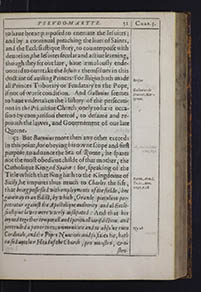 PSEVDO-MARTYR.
51
Chap. 3.
PSEVDO-MARTYR.
51
Chap. 3.
to haue beene purposed to eneruate the Iesuites;
and by a continual preaching the liues of Saints,
and the Ecclesiastique story, to counterpoise with
deuotion, the Iesuites secular and actiue learning,
though they set out late, haue æmulously ende-
uoured to ouertake the Iesuites themselues in this
doctrine of auiling Princes: Bozius For Bozius hath made
all Princes Tributary or Feudatary to the Pope,
if not of worse condition. Gallonius de
Cruciat. Mar-
tyrum. And Gallonius seemes
to haue vndertaken the History of the persecuti-
ons in the Primitiue Church, onely to haue occa-
sion by comparison thereof, to defame and re-
proach the lawes, and Gouernement of our late
Queene. 52 But Baronius more then any other exceeds
in this point, for obeying his owne scope and first
purpose to aduance the Sea of Rome, he spares
not the most obedient childe of that mother, the
Catholique King of Spaine: for, speaking of the
Title which that King hath to the Kingdome of
Sicily, Baron. Annal.
To. 11. Ann.
1097. n. 18 he imputes thus much to Charles the fift,
that being possessed with employments of the fielde, hee
gaue way to an Edict, by which, Grande piaculum per-
petratur against the Apostolique authority and al Eccle-
siastqiue lawes were vtterly dissipated: And that hee
ioyned together temporall and spirituall iurisdiction and
pretended a power to excommunicate and to absolue euen
Cardinals,Nu. 28 and the Popes Nuncioes, and so, saies he, hath
raised another Head of the Church, pro monstro, & o-
sten- 052
 Chap. 3.
52
PSEVDO-MARTYR.
stento. He addes with extreame intemperance,
Chap. 3.
52
PSEVDO-MARTYR.
stento. He addes with extreame intemperance,
that this claime to that Kingdome was buried a
while,Nu. 87. but reuiued againe by Tyrannicall force, by vio-
lent grassation, and by the robbery of Princes, who com-
maunded that to be obeyed as reasonable, which they had
extorted by Tyranny. And least hee should not
seeme to extend his bitternes to the present time,
he saies, Nu. 88. those Princes which hold Sicily by the same rea-
sons, doe imitate those tyrants. And so he imputes vp-
pon all the later kings of Spaine, as much vsupati-
on of Ecclesiastique Iurisdiction, and as mon-
strous a Title of head of the Church, as euer their
malice degorged vppon our king Henrie the
eight. 53 And though in some passages of that hi-
story, he hath left some wayes to escape, Card. Colum. fo.
158. paris. by laying
those imputations rather vpon the kings officers
then vpon the king, yet that Cardinall who hath
censured that part of his worke, espies his worke-
manshippe and arte of deceiuing, and therefore
tels him, that he hath inuayd against Monarchy it selfe,
and all defenders thereof; and that as many, and as
great things might be spoken against him Nor doth
Baronius repent that, which hee hath spoken of
those kings, but in his answere to this Cardinall;
he saies, that if the King were impeccable, if he were an
Angell, if he were God himselfe, yet he is subiect to iust
reproofe. Nu. 19. And in his Epistle to Phil. 3. in excuse of
himselfe, though hee seeme to spare the present king, 053
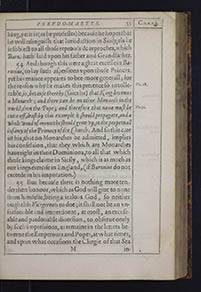 PSEVDO-MARTYR.
53
Chap. 3.
PSEVDO-MARTYR.
53
Chap. 3.
king, yet it is (as he professes) because he hopes that
he will relinguish that Iurisdiction in Sicily; els he
is subiect to all those reproofs & reproches, which
Baro. hath laid vpon his father and Grandfather.
54 And though this were a great excesse in Ba-
ronius, to lay such aspersions vpon those Princes,
yet his malice appeares to bee more generall; for
the reason why he makes this pretence so intolle-
rable, Nu. 28. is, because thereby (saies he) that King becomes
a Monarch; and there can be no other Monarch in the
world, Nu. 31. then the Pope; and therefore that name must be
cutte off, least by this example it should propagate, and a
whole wood of monarchs should grow vp, to the perpetuall
infamy of the Primacy of the Church. And so this care
of his, that no Monarches be admitted, implies
his confession, that they which are Monarches
haue right in their Dominions, to all that which
those kings claime in Sicily, which is as much as
our kings exercise in England, (if Baronius do not
exceede in his imputation.)
55 But because there is nothing more ten-
der then honour, which as God will giue to none
from himselfe, being a iealous God, so neither
ought his Vicegerents to doe; it shall not be an vn-
seasonable and impertinent, at most, an excuse-
able and pardonable diuersion, to obserue onely
by such impressions, as remaine in the letters be-
tweene the Emperours and Popes, at what times,
and vpon what occasions the Clergie of that Sea M in 054
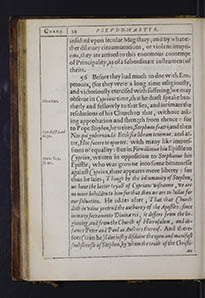 Chap. 3.
54
PSEVDO-MARTYR.
Chap. 3.
54
PSEVDO-MARTYR.
insulted vpon secular Magistacy; and by what ei-
ther dilatory circumuentions, or violent irrupti-
ons, they are arriued to this enormous contempt
of Principality, as of a subordinate instrument of
theirs. 56 Before they had much to doe with Em-
perours, (for they were a long time religiously,
and victoriously exercised with suffering) we may
obserue in Cyprians time, Circa. 240. that he durst speake bro-
therly and fellowly to that Sea, and intimate the
resolutions of his Church to that, without ask-
ing approbation and strength from thence: for
to Pope Stephen, he writes, Stephano fratri; and then
Nos qui gubernandæ Ecclesiæ libram tenemus:Cypr. Epist. 1. ad
Steph. and af-
ter, Hoc facere te oportet: with many like impres-
sions of equality: But in Firmilianus his Epistle to
Cyprian, Binius To. 1.
fo. 191. written in opposition to Stephanus his
Epistle; who was growne into some bitternesse
against Cyprian, there appeares more liberty: for
thus he saies; Though by the inhumanity of Stephen,
we haue the better tryall of Cyprians wisedome, we are
no more beholden to him for that, then we are to Iudas for
our saluation. He addes after, That that Church
doth in vaine pretend the authority of the Apostles; since
in many sacraments Diuinæ rei, it differs from the be-
ginning, and from the Church of Hierusalem, and de-
fames Peter and Paul as Authors thereof. And there-
fore (saies he) I doe iustly disdaine the open and manifest
foolishnesse of Stephen, by whom the truth of the Christi-
an 055
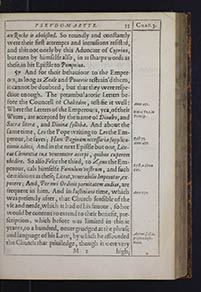 PSEVDO-MARTYR.
55
Chap. 3.
an Rocke is abolished. So roundly and constantly
PSEVDO-MARTYR.
55
Chap. 3.
an Rocke is abolished. So roundly and constantly
were their first attempts and intrusions resisted,
and this not onely by this Aduocate of Cyprian,
but euen by himselfe also, in as sharpe words as
these, in his Epistle to Pompeius. 57 And for their behauiour to the Emper-
ors, as long as Zeale and Pouertie restrain'd them,
it cannot be doubted, but that they were respe-
ctiue enough. The preambulatorie Letters be-
fore the Councell of Chalcedon, Anno 451. testifie it well:
Where the Letters of the Emperours, Binius To. 2. in
Princip. yea, of their
Wiues, are accepted by the name of Diuales, and
Sacræ literæ, and Diuinæ syllabæ. And about the
same time, Leo the Pope writing to Leo the Em-
perour, he sayes; Epist 73.
Anno 457. Hanc Paginam necessariæ supplica-
tionis adieci; And in the next Epistle but one, Lite-
ras Clementiæ tuæ veneranter accepi, quibus cuperem
obedire. So also Felix the third, to Zeno the Em-
perour, cals himselfe Famulum vestrum, Epist. 2. Circa
527. and such
demissions as these; Liceat, venerabilis Imperator, ex-
ponere; And, Per mei Ordinis paruitatem audias, are
frequent in him. Anno 530. And in Iustinians time, which
was presently after, that Church sensible of the
vse and neede, which it had of his fauour, so hee
would be content to extend to their benefit, pre-
scription, which before was limited in thirtie
yeares, to a hundred, neuer grudged at the phrase
and language of his Law, Autent. Coll. 2.
prefatio Iusti-
niani. by which he affoorded
the Church that priuiledge, though it were very M2 high; 056
 Chap. 3.
56
PSEVDO-MARTYR.
Chap. 3.
56
PSEVDO-MARTYR.
high; Being willing to illustrate Rome, Lege specialj
nostri Numinis, That that Church may eternally by
this, remember the prouidence of our Gouernement, we
graunt, &c. 58 And Gregorie the first was, out of his wise-
dome at least, L. 2. Epist. 62. if not Deuotion, as temperate as
the rest, when he writ to the Emperour Maurice,
to sweeten and modifie that Law, which forbad
some persons to enter into Monasteries; For there
he cals himselfe Famulum, and Seruum: And addes
this, Whiles I speake thus with my Lords, What am I,
but dust and wormes? To. 2. fo. 770. B. And though Binius is loth to
pardon him this duetifulnesse, and respect to his
Princes, and therefore sayes, That he protested in the
begining of that Letter, that hee spoke not as a Bishop,
but Iure priuato, An. 593. n. 17. And so out of Baronius, he sayes,
That he plaide another part, as vpon a stage: Yet, if he
wore this maske and disguise cleane through the
Epistle, then he spoke personately, and dissem-
blingly, as well with Christ, as with the Em-
perour, when he sayes: I, the meanest of Christs sir-
uants and yours. Nor do I thinke that Binius or Ba-
ronius would say, that he spoke personately of the
Execution of the Emperours Law, but that hee
had truely done as he said: I haue done all which I
ought to doe: for I haue both performed my obedience to
the Emperor, and I haue vttered that which I thought fit
concerning God. And he was wisely careful that his
Letter to the Emperour, concerning his opnionopinion of 057
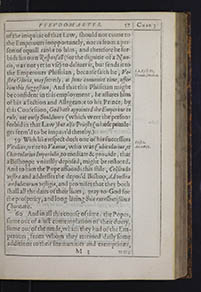 PSEVDO-MARTYR.
57
Chap. 3.
PSEVDO-MARTYR.
57
Chap. 3.
of the iniquitie of that Law, should not come to
the Emperours inopportunely, nor as from a per-
son of equall ranke to him; and therefore he for-
bids his own Responsall (for the dignitie of a Nun-
cio, was not yet in vse) to deliuer it, but sends it to
the Emperours Phisitian, because saith he, Ve-
L. 2. Epist. 65.
Theodo. Medico.stra Gloria, may secretly, at some conueniet time, offer
him this suggestion; And that this Phisitian might
be confident in this employment, he assures him
of his affection and Allegeance to his Prince, by
this Confession, God hath appointed the Emperour to
rule, not onely Souldiours (which were the persons
forbid in that Law) but also Priests (whose priuile-
ges seem'd to be impayr'd thereby.) 59 With like respect doth one of his successors Epist. 2.
Anno. 655.
Vitalian, write to Vaanus, who was Cubicularius, et
Chartularius Imperialis, to mediate & prouide, that
a Bishoppe vniustly deposed, might be restored.
And to him the Pope affoords this stile, Celsitudo
vestra, and addresses the depos'd Bishop, Ad vestra
ambulaturum vestigia, and promises that they both
shall all the daies of their liues, pray to God for
the prosperity, and long liuing Suæ excellentissimæ
Charitatis. 60 And in all this course of time, the Popes,
some out of a iust contemplation of their duety,
some out of the neede, which they had of the Em-
perours, from whom they receiued daily some
additions to their immunities and exemptions, M3 were 058
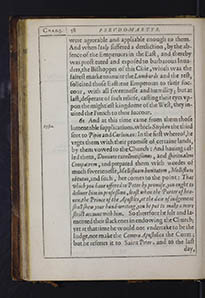 Chap. 3.
58
PSEVDO-MARTYR.
Chap. 3.
58
PSEVDO-MARTYR.
were agreeable and appliable enough to them.
And when Italy suffered a dereliction, by the ab-
sence of the Emperours in the East, and thereby
was prostituted and exposed to barbarous Inua-
ders, the Bishoppes of this Citie, which was the
fairest marke to inuite the Lumbards and the rest,
solicited those Easterne Emperours to their suc-
cour, with all sweetnesse and humility; but at
last, desperate of such reliefe, casting their eyes vp-
pon the mightiest kingdome of the West, they in-
uited the French to their succour. Epist. 2. 61 And at this time came from them those
lamentable supplications, which Stephen the third
sent to Pipin and Carloman: In the first whereof, he
vrges them with their promise of certaine lands,
by them vowed to the Church: And hauing cal-
led them, Dominos excellentissimos, and spiritualem
Compatrem, and prepared them with wordes of
much sweetenesse, Mellifluam bonitatem, Mellifluos
obtutus, and such, hee comes to the point: That
which you haue offered to Peter by promise, you ought to
deliuer him in profession, least when the Porter of hea-
uen, the Prince of the Apostles, at the daie of iudgement
shall shew your hand-writing you be put to make a more
strict account with him. So therefore he felt and la-
mented their slackenes in endowing the Church;
yet at that time he would not vndertake to be the
Iudge, nor make the Camera Apostolica the Court;
but he referres it to Saint Peter, and to the last day, 059
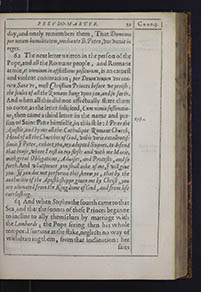 PSEVDO-MARTYR.
59
Chap. 3.
PSEVDO-MARTYR.
59
Chap. 3.
day, and onely remembers them, That Dominus
per meam humilitatem, mediante B. Petro, vos vnxit in
reges. 62 The next letter written in the person of the
Pope, and all the Romane people, and Romane
armie, et omnium in afflictione positorum, is an earnest
and violent coniuration; per Deum viuum vos con-
iuro, Saue vs, most Christian Princes before we perish;
the soules of all the Romans hang vpon you, and so forth.
And when all this did not effectually stirre them
to come, as the letter solicited, Cum nimia festinatio-
ne; then came a third letter in the name and per-
son of Saint Peter himselfe, Epist. 4. in this stile: I Peter the
Apostle, and by me all the Catholique Romane Church,
Head of all the Churches of God, vobis viris excellentis-
simis. I Peter, exhort you, my adopted Sonnes, to defend
that house, where I rest in my flesh: and with me Marie,
with great Obligations, Aduises, and Protests, and so
forth. And whatsoeuer you shall aske of me, I will giue
you. If you doe not performe this, know ye, that by the
authoritie of the Apostleshippe giuen me by Christ, you
are alienated from the Kingdome of God, and from life
euerlasting. 63 And when Stephen the fourth came to that
Sea, and that the sonnes of these Princes beganne
to incline to ally themselues by marriage with
the Lombards; the Pope seeing then his whole
temporal fortune at the stake, neglects no way of
withdrawing them, from that inclination: hee saies 060
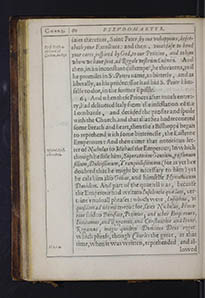 Chap. 3.
60
PSEVDO-MARTYR.
Chap. 3.
60
PSEVDO-MARTYR.
saies therefore, Saint Peter, by our vnhappines, besee-
cheth your Excellence:Epist. Steph. 4.
ad Carol. et
Carlom. An. 831 and then, vouchsafe to bend
your eares, inspired by God, to our Petition, and to him
whom we haue sent, ad Regale vestrum Culmen. And
then, in an inconstant distemper, he threatens, and
he promises in St. Peters name, as bitterly, and as
liberally, as his predecessor had bid S. Peter him-
selfe to doe, in the former Epistle. 64 And when these Princes after much entrea-
ty, had deliuered Italy from the infestation of the
Lombards, and deuided the profite and spoile
with the Church, and that that Sea had recouered
some breath and heart, then their Bishopps began
to reprehend with some bitternesse, the Easterne
Emperours: And then came that notorious let-
ter of Nicholas to Michael the Emperour; Nichol. Epist.
circa. 874. In which
though he stile him, Superatorem Gentium, prussimum
filium, Dulcissimum, Tranquillissimum (for as yet hee
doubted that he might be necessary to him) yet
he cals him also Golias, and himselfe Hymnidicum
Dauidem. And part of the quarrell was, because
the Emperour had written Insolentia quædam, cer-
taine vnusuall phrases: which were, Iussimus, vt
quosdam ad nos mitteretis: for, saies Nicholas, Hono-
rius said to Boniface, Petimus; and other Emperours,
Inuitamus, and Rogamus, and Constantine and Irene,
Rogamus, magis quidem Dominus Deus rogat:
which phrase, though Charles the great, at that
time, Li I1. c. 4. when it was written, reprehended, and al-
lowed 061
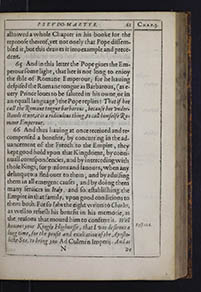 PSEVDO-MARTYR.
61
Chap. 3.
allowedlowed a whole Chapter in his booke for the
PSEVDO-MARTYR.
61
Chap. 3.
allowedlowed a whole Chapter in his booke for the
reproofe thereof, yet not onely that Pope dissem-
bled it, but this drawes it into example and prece-
dent. 65 And in this letter the Pope giues the Em-
perour some light, that hee is not long to enioy
the stile of Romane Emperour; for he hauing
despised the Romane tongue as Barbarous, (as e-
uery Prince loues to be saluted in his owne, or in
an equall language) the Pope replies: That if hee
call the Romane tongue barbarous, because hee vnder-
stands it not, it is a ridiculous thing, to call himselfe Ro-
mane Emperour. 66 And thus hauing at once receiued and re-
compensed a benefite, by concurring in the ad-
uancement of the French to the Empire, they
kept good hold vpon that Kingdome, by conti-
nuall correspondencies, and by interceding with
those Kings, for pardons and fauours, when any
delinquents fled ouer to them, and by aduising
them in all emergent causes, and by doing them
many seruices in Italy, and so establishing the
Empire in that family, vpon good conditions to
them both. For so Iohn the eight writes to Charles,
as well to refresh his benefit in his memorie, as
the reasons that moued him to conferre it. Well
knowes your Kingly Highnesse, Epist. 216. that I was desirous a
long time, for the profit and exaltation of the Aposto-
licke Sea, to bring you Ad Culmen Imperij. And as N we 062
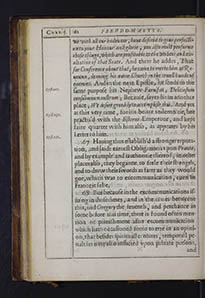 Chap. 3.
62
PSEVDO-MARTYR.
Chap. 3.
62
PSEVDO-MARTYR.
we with all our endeuour, haue desired to giue perfecti-
on to your Honour and glorie, you also must performe
those things, which are profitable to the vtilitie and ex-
altation of that Seate. And there he addes,
That for Conference about that, he came to meete him at Ra-
uenna, leauing his owne Church in the cruell hands of
enemies. And in the next Epistle, he sends to the
same purpose his Nephew Farulfus, Epist. 217. Deliciosum
consiliarium nostrum; Because, sayes he in another
place, We desire greedily to accomplish this. And yet
at this very time, Epist. 230. for his better indemnitie, hee
practis'd with the Esterne Emperour, and kept
faire quarter with him also, as appeares by his
Letter to him. Epist. 251. 67 Hauing thus establish'd a stronger reputa-
tion, and laide earnest Obligations vpon France,
and by example and authoritie thereof, in other
places also, they beganne to feele their strength,
and to draw their swords as farre as they would
goe, which was to excommunication, euen in
France it selfe. 68 But because in the excommunications is-
suing in these times, and in the times betweene
this, and Gregory the seuenth, and perchance in
some before this time, there is found often men-
tion of pnunishment after excommunication
which hath occasioned some to erre in an opinio-
n, that besides spirituall censures, temporall pe-
nalties were also inflicted vpon priuate persons, and 063
 PSEVDO-MARTYR.
63
Chap. 3.
PSEVDO-MARTYR.
63
Chap. 3.
and consequently eradication vpon Princes, we
will arrest, and stay a little vppon the stile and
phrase of some of those excommunications, by
which it wil appeare, that they intended nothing
but spirituall punishment. 69 The first which I haue obserued, is a letter
of Innocent the first, Epist. 30. to Arcadius the Emperour,
whom he thought guilty of the eiecting & of the
death of Chrysostome: His words are; Ego minimus
& peccator, segrego te a perceptione mysteriorum Chri-
sti. This then went no farther then to depriue
him of spirituall foode, and the Pope (if that Epi-
stle be genuine) was very hasty in it; for the Em-
perour discharged himselfe presently, by plead-
ing ignorance of the fact; which that Bishoppe
ought to haue tried, before hee had proceeded to
excommunication. Chrysostome himselfe, whose
quarrell it was, De verb. Esaiæ.
Hom. 4 To. I1.
fo. 207. had taught sufficiently the limits
of that iurisdiction; for he said, When the Priest
had reprehended Ozias, De spreto Sacerdotio, he could
doe no more; for it is his part onely to reprooue, and to
perswade, not to stirre warre: and he addes, that God
himselfe (to whom onely it belongs to punish so)
inflicted a leprosie vpon the King, in which (saies he)
we see Humanitatem Diuinæ ultionis, who sent not
lightning, nor shaked the earth, nor moued the Hea-
uens: So farre was Chrysostome from counsayling
any such punishment, as should be accompanied
with tumult. N2 70 And 064
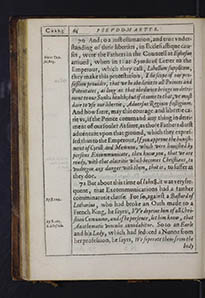 Chap. 3.
64
PSEVDO-MARTYR.
70 And so a iust estimation, and true vnder-
Chap. 3.
64
PSEVDO-MARTYR.
70 And so a iust estimation, and true vnder-standing of their liberties, in Ecclesiastique cau-
ses, were the Fathers in the Councell at Ephesus
arriued, Binius To. 1.
fol. 803. when in that Synodicall Letter to the
Emperour, which they call, Libellum supplicem,
they make this protestation, The scope of our pro-
fession prouides, that we be obedient to all Princes and
Potentates, as long as that obedience brings no detri-
ment to our Soules health; but if it come to that, we must
dare to vse our libertie, Aduersus Regium fastigium.
And how farre, may this courage and libertie ca-
rie vs, if the Prince command any thing in detri-
ment of our soule? As farre, as those Fathers durst
aduenture vpon that ground, which they expres-
sed thus to the Emperour, If you approue the banish-
ment of Cyrill and Memnon, which were banished by
persons Excommunicate, then know you, that we are
ready, with that alacritie which becomes Christians, to
vndergoe any danger with them, that is, to suffer as
they doe. 71 But about this time of Iohn 8. it was very fre-
quent, that Excommunications had a farther
comminatorie clause. Epist. 123. For so, against a Bastard of
Lotharius, who had broke an Oath made to a
French King, he sayes, VVWe depriue him of all Chri-
stian Comunion,and if he perseuer, let him know, that
Anathematis vinculis innodabitur. So to an Earle
and his Lady, which had seduced a Nunne from
her profession, he sayes, Epist. 165.
Lidiesrido. We seperate them from the body 065
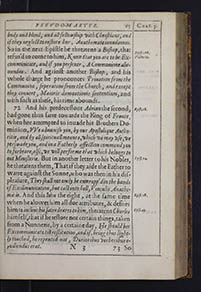 PSEVDO-MARTYR.
65
Chap. 3.
PSEVDO-MARTYR.
65
Chap. 3.
body and blood, and all fellowship with Christians, and
if they neglect to restore her, Anathemate innodamus.
So in the next Epistle he threatens a Bishop, Epist.: 66.
Vbiberto. that
refus'd to come to him, Know that you are to be Ex-
communicate, and if you perseuer, A Communione alie-
nandus. And against another Bishop, and his
whole charge he pronounces Priuation from the
Communion, seperation from the Church, and except
they conuert, Maioris damnationis sententiam, and
with such as these, his time abounds. 72 And his predecessour Adrian the second, Epist. 18.
had gone thus farre towards the King of France,
when hee attempted to inuade his Brothers Do-
minion, VVeWe admonish you, by our Apostolique Autho-
ritie, and by all spirituall meanes, which we may vse, we
perswade you, and in a Fatherly effection command you
to forbeare; else, we will performe that which belongs to
outr Ministerie. Epist. 24. But in another letter to his Nobles,
he threatens them, That if they aide the Father to
warre against the Sonne, who was then in his dis-
pleasure, They shall not onely be enwrapp'd in the bands
of Excōmunication, but cast into hell, Vinculis Anathe-
matis. And this Iohn the eight, Epist. 28. at the same time
when he alowes him all due attributes, & desires
him to incline his sacred eares to him, Epist. 42. threatens Charles
himself, that if he restore not certain things, taken
from a Nunnerie, by a certaine day, He should bee
Excommunicate till restitution, and if, being thus light-
ly touched, he repented not, Durioribus verberibus e-
rudiendus erat. N3 73 So 066
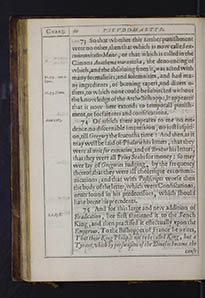 Chap. 3.
66
PSEVDO-MARTYR.
73 So that whether this farther punishment
Chap. 3.
66
PSEVDO-MARTYR.
73 So that whether this farther punishment
were no other, then that which is now called ex-
communicatio Maior, or that which is called in the
Canons Anathema maranatha, the denouncing of
which, and the absoluing from it, was acted with
many formalities, 21. q. 3. cum a-
liquis. and solemnities, and had ma-
ny ingredients, of burning tapers, and diuers o-
thers, to which none could be subiected without II11. q. 3. Nemo.
the knowledge of the Arch-Bishoppe, it appeares
that it now here extends to temporall punish-
ment, or forfaitures and confiscations. 74 Of which there appeares Anno 1063. to me no eui-
dence, no discernable impression, no iust suspiti-
on, till Gregory the seuenths time: And then, as it
may well be said of Phalaris his letters, that they
were al writ for execution, and of Brutus his letters,
that they were all Priuy Seales for money: so may
wee say of Gregories iudging, by the frequency
thereof, that they were all cholerique excommu
nications; and that with Postscripts worse then
the body of the letter; which were Confiscations,
neuer found in his predecessors, which should
haue beene his precedents. 75 And for this large and new addition of L. 2. Ep. 5.
Eradication, hee first threatned it to the Fench
King, and then practised it effectually vpon the
Emperour. To the Bishoppes of France he writes,
That their King Philip is not to be called King, but a
Tyrant, which by perswasion of the Diuel is become the cause 067
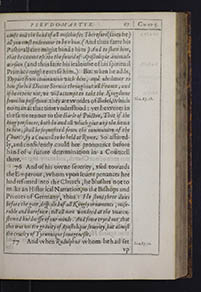 PSEVDO-MARTYR.
67
Chap. 3.
PSEVDO-MARTYR.
67
Chap. 3.
cause and the head of all mischiefe: Therefore (saies he)
all you must endeauour to bow him. (And thus farre his
Pastorall care might binde him) And to shew him,
that he cannot escape the sword of Apostolique animad-
uersion (and thus farre his iealousie of his spiritual
Primacy might excuse him.) But when he adds,
Depart from communion with him, and obedience to
him, forbid Diuine Seruice throughout all France, and
if he repent not, we will attempt to take the Kingdome
from his possession they are wordes of Babel, Li. 2. Ep. 18. which
no man at that time vnderstood: yet he writes in
the same tenour to the Earle of Poicton, That if the
king perseuere, both he and all which giue any obedience
to him, shall be sequestred from the communion of the
Church, by a Councell to be held at Rome. So assured-
ly, and confidently could hee pronounce before
hand of a future determination in a Councell
there. 76 And of his owne seuerity, vsed towards
the Emperour, whom vpon seuere penances hee
had resumed nto the Church, he blushes not to
make an Historical Narration, to the Bishops and
Princes of Germany, thus: He stood three daies
before the gate, despoiled of all Kingly ornaments, mise-
rable and barefoote; till all men wondred at the vnaccu-
stomed hardnesse of our minds. And some cryed out that
this was not the grauity of Apostolique seuerity, but almost
the cruelty of Tyrannique sauagenesse. 77 And when Rodulphus whom he had set Li. 4. Ep. 12. vp 068
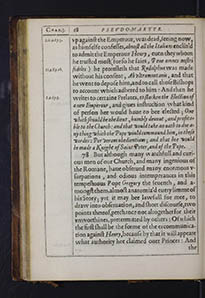 Chap. 3.
68
PSEVDO-MARTYR.
Chap. 3.
68
PSEVDO-MARTYR.
vp against the Emperour, Lib. 9. Ep. 3. was dead, seeing now,
as himselfe confesses, almost all the Italians enclin'd
to admit the Emperour Henry, euen they whom
he trusted most (for so he saies, Rene omnes nostri
fideles) he protesteth that Rodolphus was made
without his consent, Li. 9. Ep. 28.Ab vltramontanis, and that
he went to depose him, and to call those Bishops
to account which adhered to him ; And then he
writes to certaine Prelates, L. 9. Ep. 3.to slacken the Election of
a new Emperour, and giues instruction what kind
of person hee would haue to bee elected; One
which should be obedient, humbly deuout, and profita-
ble to the Church: and that would take an oath to doe a-
ny thing which the Pope would commaund him, in these
wordes: Per veram obedientiam; and that hee would
be made a Knight of Saint Peter, and of the Pope. 78 But although many watchfull and curi-
ous men of our Church, and many ingenious of
the Romane, haue obserued many enormous v-
surpations, and odious intemperances in this
tempestuous Pope Gregory the seuenth, and a-
mongst them, almost anatomiz'd euery limme of
his Story; yet it may bee lawfull for mee, to
draw into obseruation, and short discourse, two
points thereof, perchance not altogether for their
vnworthines, pretermitted by others: Of which
the first shall be the forme of the excommunica-
tion against Henry, because by that it will appeare
what authority hee claimed ouer Princes: And the 069
 PSEVDO-MARTYR.
69
Chap. 3.
PSEVDO-MARTYR.
69
Chap. 3.
the other shall be his letter to a Bishop, who desi-
red to draw from him, some reasons by which he
might defend that which the Pope had done; be-
cause by that it will appeare, vpon what founda-
tions he grounded this pretence and authority. 79 The excōmunication is thus deliuered; Con-
tradico ei,Binius. To. 3. fo.
1282. A. I denie him the gouernment of al the kingdom
of Germany, & of Italy: and I absolue all Christians, frō
the band of the oth, which they haue made to him, or shall
make: and I forbid any man to serue him as his king: for
it is fit, that he which endeuors to diminish the honor of
the Church should loose his owne honour. And because
he hath contemned to obey as a Christian, participating
with excommunicated persons, and despising my admo-
nitions, and seperating himselfe from the Church, I tie
him, in vinculo Anathematis. By which we see, that he beginnes with Con-
fiscation: And because it had neuer beene heard,
that the Popes authority extended beyond Ex-
communication, therefore hee makes Deposition a
lesse punishment then that, and naturally to pre-
cede it: for he makes this to bee reason enough,
why he should forfait his dignity, because he at-
tempted to diminish the Dignity of the Church: But for
his Disobedience to the Church and him, he inflicts
Excommunication as the greater, and greatest pun-
ishment which he could lay vpon him. And it
is of dangerous consequence, if Excommunication
be of so high a nature, and of so vast an extent, O that 070
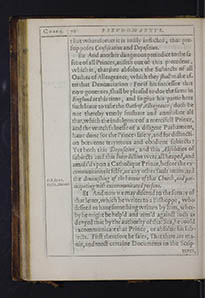 Chap. 3.
70
PSEVDO-MARTYR.
Chap. 3.
70
PSEVDO-MARTYR.
that wheresoeuer it is iustly inflicted, that pre-
supposes Confiscation and Deposition. 80 And another dangerous preiudice to the sa-
fetie of all Princes, ariseth out of this precedent,
which is, that hee absolues the Subiects of all
Oathes of Alleageance, which they shall make af-
ter that Denunciation: For if his successor that
now gouernes, shall be pleased to doe the same in
England at this time, and so giue his partie here
such leaue to take the Oath of Alleageance; doth he
not thereby vtte ly frustrate and annihilate all
that, which the indulgence of a mercifull Prince,
and the watchfulnesse of a diligent Parliament,
haue done for the Princes safety, and for distincti-
on betweene trayterous and obedient subiects?
Yet both this Deposition, and this Absolution of
subiects and this Interdiction were all heaped, and
amass'd vpon a Catholique Prince, before the ex-
communication it selfe, or any other fault intimated
the diminishing of the honour of that Church,Li. 8. Ep. 21.
Episco. Metentiand par-
ticipating with excommunicated persons. 81 And now we may discend to the suruay of
that letter, which he writes to a Bishoppe, who
desired to haue something written by him, wher-
by he might be help'd and arm'd against such as
denyed that by the authority of that Sea, he could
excommunicate that Prince, or absolue his sub-
iects. First therefore he saies, That there are ma-
nie, and most certaine Documents in the Scrip-
tures, 071
 PSEVDO-MARTYR.
71
Chap. 3.
tures to that purpose, of which hee cites, those
PSEVDO-MARTYR.
71
Chap. 3.
tures to that purpose, of which hee cites, those
which are ordinarily offered, as Tu es Petrus, and
Tibi dabo Claues, and Quodcunqe ligaueris: and then
he askes, Whether Kings be excepted? But, Kings
are not excepted; but this proceeding against
Kings is excepted: That is, it is not included in
that Commission, as hath beene enough and e-
nough proued by many. 82 Then followes that testimony of Gelasius
a Pope, That Priest-hood is aboue Principality, and
that the Bishoppe of Rome is the chiefe Priest, If wee
allow both Testem, & Testimonium, yet the cause
is safe; he may be aboue all, in some functions,
yet not in temporall. 83 His next authority, is Iulius, another Pope,
who expounding the wordes, Tibi dabo Claues, to
certaine Easterne Bishoppes, saies, Shall not he that
opens heauen, iudge of the earth? But this dooth as
much destroy all Iudicature and all Magistracy, as
iustifie the deposing of Kings. 84 After this, he cites (though not as Gregories
words are) a priuiledge graunted by Gregory the
first, to a Monasterie and depriuation from secular
dignity, and excommunications to any that infringe
that priuiledge. And this priuiledge Bellarmine
also produces, to proue the Popes soueraignty in
temporall matters. It is the priuiledge of the De Pontif l. 5.
c. 7. §. Quartum
Monastery of S. Medard, which is in Gregories Epi-
stle: and it is cyted by this other Gregory, L. 2. post. Ep 38. it makes O2 de= 072
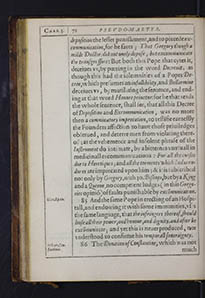 Chap. 3.
72
PSEVDO-MARTYR.
Chap. 3.
72
PSEVDO-MARTYR.
deposition the lesser punishment, and to precede ex-
communication, for he sayes; That Gregory though a
milde Doctor, did not onely depose, but excommunicate
the transgressors: But both this Pope that cytes it,
deceiues vs, by putting in the word Decreuit, as
though this had the solemnities of a Popes De-
cree, which presumes an infallibility, and Bellarmine
deceiues vs, by mutilating the sentence, and end-
ing at that word Honore priuetur: for he that reads
the whole sentence, shall see, that all this Decree
of Deposition and Excommunication, was no more
then a comminatory imprecation, to testifie earnestly
the Founders affection to haue those priuiledges
obserued, and deterre men from violating there-
of; as the vehemence and insolent phrase of the
Instrument do intimate, by a bitternes vnvsuall in
medicinall excommunications: For all the curses
due to Heretiques; and all the torments which Iudas en-
dures are imprecated vpon him; & it is subscribed
not only by Gregory, with 30. Bishops, but by a King
and a Queene, no competent Iudges (in this Grego-
ries opiniō) of faults punishable by excōmunication. Li. II11. Ep. 10.85 And the same Pope in erecting of an Hospi-
tall, and endowing it with some immunities, vses
the same language, that the infringers thereof, should
loose all their power, and honour, and dignity, and after be
excōmunicate; and yet this is neuer produced, nor
vnderstood to confirme his temporall soueraignty. Dist. 96. Con-
stantinus.86 The Donation of Constantine, which was not much 073
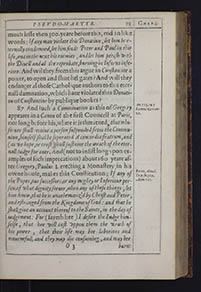 PSEVDO-MARTYR.
73
Chap. 3.
PSEVDO-MARTYR.
73
Chap. 3.
much lesse then 300. yeare before this, end in like
words: If any man violate this Donation, let him be e-
ternally condemned, let him finde Peter and Paul in this
life, and in the next his enemies, and let him perish with
the Diuell and al the reprobate, burning in Inferno infe-
riore. And wil they from this argue in Constantine a
power, to open and shut hel gates? And will they
endanger al those Catholique authors to this eter-
nall damnation, which haue violated this Donati-
on of Constantine by publique bookes? 87 And such a Commination as this of Gregory
appeares in a Canon of the first Councell at Paris, An. 553. ca. 5
Sumna Carran-
ze.
not long before his, where it is threatned, that who-
soeuer shall receiue a person suspended from the Commu-
nion, himself shal be seperated A concordia fratrum, and
(as we hope, or trust) shall sustaine the wrath of the eter-
nall iudge for euer. And (not to insist long vpon ex-
amples of such imprecations) about 160 yeare af-
ter Gregory, Paulus I. erecting a Monastery in his
owne house, makes this Constitution; Baron. Annal.
To. 9 fo. 319.
Anno 761.If any of
the Popes, our successors, or any mighty or Inferiour per-
son, of what dignity soeuer, alien any of these things, let
him know, that he is anathematiz'd by Christ and Peter,
and estranged from the Kingdome of God: and that he
shall giue an account thereof to the Saints, in the day of
iudgement: For (sayeth hee) I desire the Iudge him-
selfe, that hee will cast vppon them the wrath of
his power, that their life may bee laborious and
mournefull, and they may die consuming, and may bee O3 burnt 074
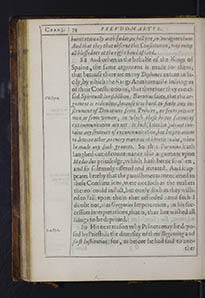 Chap. 3.
74
PSEVDO-MARTYR.
Chap. 3.
74
PSEVDO-MARTYR.
burnt eternally with Iudas, in hell fire, in voragine chaos
And that they that obserue this Constitution, may enioy
all blessednes at the right hand of God. 88 And when in the behalfe of the Kings of
Spaine, the same argument is made for them,
that because there are many Diplomes extant in Si-
cily, by which the Kings Anathematise infringers
of their Constitutions, that therefore they exerci-
sed Spirituall Iurisdiction:Vbi supra.Baronius saies, that this ar-
gument is ridiculous, because itis hard to finde any in-
strument of Donations from Princes, or from priuate
men, or from women; in which these bitter formes of
excommunication are not: Which (saies he) do not con-
taine any sentence of excommunication, but Imprecations
to deterre other, as euery man was at libertie to doe, when
he made any such graunts. So that Baronius hath
laughed out of countenance this argument vpon
Medardus priuiledge, which hath beene so often,
and so solemnly offered and iterated. And it ap-
peares hereby that the punishments mentioned in
these Constitutions, were not such as the makers
thereof could inflict, but onely such as they wish-
ed to fall vpon them that offended: and such I
doubt not, was Gregories Imprecation, in his suc-
cessors interpretations, that is, that hee wished all
Kings to be depriued. L. 4. Ep. 2.89 His next reason why Princes may be depo-
sed by Priests, is the diuersity of their Beginning and
first Institution; for, as before he had said to ano-
ther 075
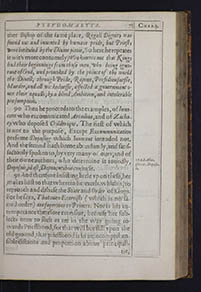 PSEVDO-MARTYR.
75
Chap. 3.
ther Bishop of the same place, Regall Dignity was
PSEVDO-MARTYR.
75
Chap. 3.
ther Bishop of the same place, Regall Dignity was
found out and inuented by humane pride, but Priests
were intituled by the Diuine pietie, So here he repeates
it with more contumely; Who knowes not that Kings
had their beginnings from those men, who being igno-
rant of God, and prouoked by the prince of the world
the Diuell, through Pride, Rapine, Perfidiousnesse,
Murder, and all wickednesse, affected a gouernment o-
uer their equalls, by a blind Ambition, and intolerable
presumption. 90 Then he proceeds to the examples, of Inno-
cent who excomunicated Arcadius, and of Zacha-
ry who deposed Childerique. The first of which
is not to the purpose, Except Excommunication
presume Deposing which Innocent intended not.
And the second hath beene abundantly, and satis-
factorily spoken to, by very many of ours, and of
their owne authors, who determine it roundly, 15.9. b. Alius.
glo. ver. Deposu-
it.
Deposuit, id est, Deponentibus consensit. 91 And therefore insisting little vpon these, hee
makes hast to that wherein he excels, which is, to
reproach and debase the State and Order of Kings.
For he says, That euen Exorcists (which is no sa-
cred order) are superiour to Princes. Nor is his in-
temperance therefore excessiue, because hee sub-
iects men to such as are in the way going to-
wards Priesthood, for that will bee still vpon the
old ground, that priesthood is in an incomprehen-
sible distance and proportion aboue principali-
tie, 076
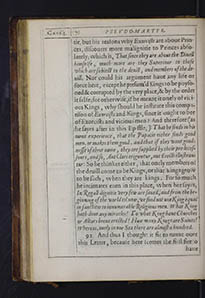 Chap. 3.
76
PSEVDO-MARTYR.
tie, but his reasons why Exorcists are aboue Prin-
Chap. 3.
76
PSEVDO-MARTYR.
tie, but his reasons why Exorcists are aboue Prin-ces, discouers more malignitie to Princes abso-
lutely; which is, That since they are aboue the Diuell
himselfe, much more are they Superiour to those
which are subiect to the deuill, and members of the de-
uill. Nor could his argument haue any life or
force here, except he presum'd Kings to be poyso-
ned & corrupted by the very place, & by the order
it selfe; for otherwise, if he meant it onely of vici-
ous Kings, why should he institute this compa-
rison of Exorcists and Kings, since it ought to bee
of Exorcists and vicious men? And therefore (as
he sayes after in this Epistle,) That he finds in his
owne experience, that the Papacie either finds good
men, or makes them good, and that if they want good-
nesse of their owne, they are supplied by their predeces-
sours, and so, Aut Clari eriguntur, aut Erecti illustran-
tur: So he thinkes either, that onely members of
the deuill come to be Kings, or that kings grow
to be such, when they are kings. For so much
he intimates euen in this place, when hee sayes,
In Regall dignitie very few are saued, and from the be-
ginning of the world til now, we find not one King equal
in sanctitie to innumerable Religious men. What King
hath done any miracles? To what King haue Churches
or Altars beene erected? How many Kings are Saints?
Whereas, onely in our Sea there are almost a hundred. 92 And thus I thought it fit to runne ouer
this Letter, because here seemes the first fire to haue 077
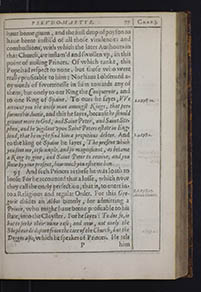 PSEVDO-MARTYR.
77
Chap. 3.
PSEVDO-MARTYR.
77
Chap. 3.
haue beene giuen, and the first drop of poyson to
haue beene instil'd of all those virulencies and
combustions, with which the later Authours in
that Church, are inflam'd and swollen vp, in this
point of auiling Princes. Of which ranke, this
Pope had respect to none, but those who were
really profitable to him: Nor haue I obserued a-
ny words of sweetenesse in him towards any of
them, but onely to our King the Conquerour, and
to one King of Spaine. To ours he sayes, L. 1. Epist 70.VVWe
account you the onely man amongst Kings, that per-
formes his duetie, and this he sayes, because he should
graunt more to God, and Saint Peter, and Saint Ste-
phen, and be vigilant vpon Saint Peters estate in Eng-
land, that he might find him a propitious debter. L. 9. Epist. 2. And
to the king of Spaine he sayes, The present which
you sent me, is so ample, and so magnificent, as became
a King to giue, and Saint Peter to receiue; and you
show by your present, how much you esteeme him. 93 And such Princes as these he was loath to
loose: For he accounted that a losse, which now
they call the onely perfection, that is, to enter in-
to a Religious and regular Order. L. 6. Epist. 17.
Abbati Cluniac. For this Gre-
gorie chides an Abbot bitterly, for admitting a
Prince, who might haue beene profitable to his
state, into the Cloyster. For he sayes: To doe so, is
but to seeke their owne ease; and now, not onely the
Shepheards depart from the care of the Church, but the
Dogges also; which he speakes of Princes. He tels P him 078
 Chap. 3.
78
Chap. 3.
Chap. 3.
78
Chap. 3.
him, That he hath done against the Canons, in admitting
him: and that he is therein an occasion, that a hundred
thousand persons doe lacke their guide. And therefore
sayes he, Since there are scarce any good Princes to bee
found, I am grieu'd that so good a Prince, is taken away
from his mother; That is from the Church, as it
must necessarily be intended in this Epistle. So
pliant and seruiceable to his vses, would Gregorie
make Regall dignitie, or else breake it in peeces. Binius To. 3. pa. 2
fol. 1196. 94 And where could our later men find bet-
ter light in this mischeiuous and darke way, then
in this Gregories Dictates, of which, these are some,
That onely the Pope may vse Imperiall Ornaments;
That all Princes must kisse his feete: That onely his
Name must be rehearsed in the Church; That there is
no other Name in the world, with many such trans-
cendencies. And accordingly he is wel seconded
by others, Cassanæ. Catal.
Glor. pa. 4. Con-
sid. 7. which say, that he is Superillustris; and
may not be cald so neither, because he is so much aboue all
Dignitie, that our thought cannot extend to his Maie-
stie: And to preuent all opposition against it, Bal-
dus in a choler sayes, That he that sayes the contra-
rie, Lyes. 95 And vpon what place of Scripture may
they not build this supremacy, and this obedience
to it, after a Pope, who is heire to an Actiue and
Passiue infallibility, and can neither deceiue nor be
deceiued, L. 4. Epist. 2. hath extorted from Samuel, so long be-
fore the Apostolique Sea was established, a testimo-
nie, 079
 PSEVDO-MARTYR.
79
Chap. 3.
ny, That not to obey the Apostolique Sea,1. Reg. 15.was the sinne
PSEVDO-MARTYR.
79
Chap. 3.
ny, That not to obey the Apostolique Sea,1. Reg. 15.was the sinne
of Idolatrie, teste Samuele: which he iterates againe,
and againe in diuers other Epistles. 96 From this example, and from this libertie
proceedes that malignity, wherewith the later
writers wrest euery thing to the disgrace of Prin-
cipality. By this authority Symancha drawes in-
to consequence, Enchird. Ind.
Tit. 21. n. 9. and vrges as a precedent to be i-
mitated, the example of the Scythians, who killed
their king for admitting some new rytes in diuine
worshippe; Which (sayes Simancha) was iustly done;
for the Subiects of hereticall Princes are deliuered from
their Iurisdiction. And in like maner, Schultingius
an Epitomizer of Baronius, Schultingius.
Thesaur. Antiq.
Eccles. To. 1. c.
8. & 243. finding in him out of
Strabo, that in Egypt the Priests had so much authority
ouer the Kings, that sometimes by a bare message they
would put one King to death, and erect another: and
repeating the same gloriously and triumphantly
a second time; at last in a Marginall note hee
claimes the same authority for the Pope, when he
notes, and sayes thereupon, The supreame authority
of the Clergy, is proued against the Caluinists: So that
we may easily discerne, by these examples which
they propose for imitation, what authority they
ayme at. But Schultingius might also haue obser-
ued, as a prophecy of the ruine of their vsurpation, Diod. Sicul. Bib-
liot. l. 4. ca. 1.
that as soone as a learned and vnderstanding king
Ergamenes, came amongst them, he tooke away
that custome. P2 97 From 080
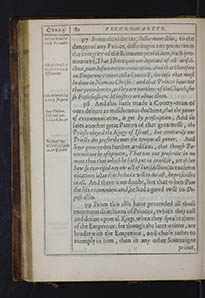 Chap. 3.
80
PSEVDO-MARTYR.
Chap. 3.
80
PSEVDO-MARTYR.
Bell. de Pont. l. 2.
c. 2. §. Nec ualet. 97 From this libertie, Bellarmine also, to the
danger of any Prince, differing in any point from
the integrity of the Romane profession, hath pro-
nounced, That Heretiques are depriued of all iurisdi-
ction, euen before excommunication. And that therefore
an Emperour cannot call a Councell, because that must
be done in Nomine Christi: and that Princes haue not
their precedencies, as they are members of the Church, for
Ide. de Concil. et
Eccles. l. 1. e. 2. §
Esse autem.so Ecclesiastique Ministers are aboue them. 98 And this hath made a Contry-man of
ours deliuer as mischeuous doctrine, that the power
of excommunication, is got by prescription; And so
saies another great Patron of that greatnesse, the
Priests obeyed the Kings of Israel, but contrarily our
Priests doe prescribe ouer the temporall power. And
Sayr proceedes further, and saies, that though Pa-
normitane be of opinion, That one can prescribe in no
more then that which he hath put in practise, yet if hee
haue so exercised any one act of Iurisdiction (as excōmu-
nication is) as that he had a will to doe all, he prescribes
Ide. delaicis. l. 3
c. 17. § In quemin all. And there is no doubt, but that when Pius
the fift excommunicated, he had a good will to De-
pose also. Sayr Thesaur.
Cas. Consc. par.
1. l. 1. c. 6. nu. 30 99 From this also haue proceeded all those
enormous deiections of Princes, which they cast
and deriue vpon al Kings when they speake them
of the Emperour: for though the later writers, are
broder with the Emperour, and chose rather to Stephan' De
Osculat. ped. pont.
ca. 16. § quare
exemply in him, then in any other Soueraigne prince, 081
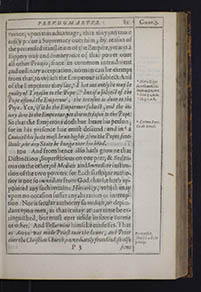 PSEVDO-MARTYR.
81
Chap. 3.
PSEVDO-MARTYR.
81
Chap. 3.
Prince; vpon this aduantage, that they can more a Hiero. Gigas
de læsa mai. l 1.
Rubr. 4. q. 2. n. 5.
easily proue a Supremacy ouer him, by reason of
the pretended translation of the Empire, yet it is a
slippery way and conueyance of that power ouer
all other Princes; since in common intendment
and ordinary acceptation, no man can be exempt
from that, to which the Emperour is subiect. And
of the Emperour they say,a That not onely he may be
guilty of Treason to the Pope,b b Ibid. q. 4. n. 2. but if a subiect of the
Pope offend the Emperour, the treason is done to the
Pope. Yea,c if it be the Emperours subiect, and the in-
iury done to the Emperour, yet this is treason to the Pope:
c Ib. q. 1. n. 8.So that the Emperour doth but beare his person;
for in his presence hee must descend: and ind d Ceremo. Sacr.
Ca. de Concil. a
Councell his seate must be no higher, then the Popes foot-
stoole, nor any State he hunge ouer his head. 100 And from hence also hath growne that
Distinction, Superstitious on one part, & Sediti-
ous on the other, of Mediate and Immediate institu-
tion of the two powers: for Ecclesiastique autho-
rity is not so immediate from God, that he hath ap-
pointed any such certaine Hierarchy, which may
vpon no occasion suffer any alteration or interup-
tion: Nor is secular authority so mediate, or depen-
dant vpon men, as that it may at any time be ex-
tinguished, but must euer reside in some forme
or other. And Bellarmine himselfe confesses, That
as Aaron was made Priest ouer the Iewes,De translat.
Imp. l. 1. c. 8. in
princip.and Peter
ouer the Christian Church, immediately from God, so also P3 some 082
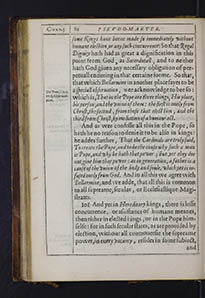 Chap. 3.
82
PSEVDO-MARTYR.
Chap. 3.
82
PSEVDO-MARTYR.
some Kings haue beene made so immediately without
humane election, or any such concurrence: So that Regal
Dignity hath had as great a dignification in this
point from God, as Sacerdotall; and to neither
hath God giuen any necessary obligation of per-
petuall enduring in that certaine forme. So that,
that which Bellarmine in another place sayes to be
a speciall obseruation, De Pont. l. 2. c.
17. §. Obseruan-
dum. wee acknowledge to bee so:
which is, That in the Pope are three things; His place,
his person, and the vnion of them: the first is onely from
Christ, the second, from those that elect him, and the
third from Christ, by mediation of a humane act. And as wee confesse all this in the Pope, so
hath he no reason to denie it to be also in kings:
he addes further, That the Cardinals are truly said,
To create the Pope, and to be the cause why such a man
is Pope, and why he hath that power; but yet they doe
not giue him that power: as in generation, a father is a
cause of the vnion of the body and soule, which yet is in-
fused onely from God. And in all this we agree with
Bellarmine; and we adde, that all this is common
to all supreame, secular, or Ecclesiastique Magi-
strates. 101 And yet in Hereditary kings, there is lesse
concurrence, or assistance of humane meanes,
then either in elected kings, or in the Pope him-
selfe: for in such secular states, as are prouided by
election, without all controuersie the supreame
power, in euery vacancy, resides in some subiect, and 083
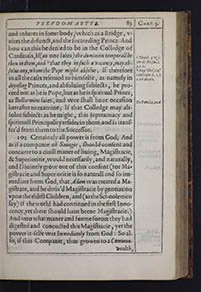 PSEVDO-MARTYR.
83
Chap. 3.
PSEVDO-MARTYR.
83
Chap. 3.
and inheres in some body, which as a Bridge, v-
nites the defunct, and the succeeding Prince. And
how can this be denied to be in the Colledge of
Cardinals, a Theod. a Ni-
em de schism. l.
3. c. 1. If (as one saies) the dominion temporall be
then in them, and b that they in such a vacancy, may ab-
solue any, whom the Pope might absolue. If therefore
in all the cases reserued to himselfe, as namely in
deposing Princes, and absoluing subiects, he pro-
ceed not as he is Pope, but as he is spiritual Prince,
b Sayr Thes. Cas
consci. par. 1. l. 2
c. 20. nu. 20.as Bellarmine saies, and wee shall haue occasion
hereafter to examine; If that Colledge may ab-
solue subiects as he might, this supreamacy and
spirituall Principality resides in them, and is trans-
fer'd from them to the Successor. 102 Certainely all power is from God; And
as if a companie of Sauages, should consent and
concurre to a ciuill maner of liuing, Magistracie,
& Superioritie, would necessarily, and naturally,
and Diuinely grow out of this consent (for Ma-
gistracie and Superioritie is so naturall and so im-
mediate from God, that Adam was created a Ma-
De Pont. l. 5. ca. 6gistrate, and he deriu'd Magistracie by generation
vpon the eldest Children, and (as the Schoolemen
say) if the world had continued in the first Inno-
cency, yet there should haue beene Magistracie.)
And into what maner and forme soeuer they had
digested and concocted this Magistracie, yet the
power it-selfe was Immediately from God: So al-
so, if this Companie, thus growen to a Common-
wealth, 084
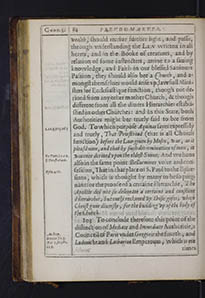 Chap. 3.
84
PSEVDO-MARTYR.
Chap. 3.
84
PSEVDO-MARTYR.
wealth, should receiue further light, and passe,
through vnderstanding the Law written in all
hearts, and in the Booke of creatures, and by
relation of some instructers, arriue to a sauing
knowledge, and Faith in our blessed Sauiours
Passion, they should also bee a Church, and a-
mongst themselues would arise vp, lawfull Mini-
sters for Ecclesiastique function, though not de-
riued from any other mother Church, & though
different from all the diuers Hierarchies establi-
shed in other Churches: and in this State, both
Authorities might bee truely said to bee from
God. 1.2 æ. q. 103. ad 3 To which purpose Aquinas sayes expressely
and truely, That Priesthood (that is all Church
function) before the Law giuen by Moses, was, as it
pleasd men, and that by such determination of men, it
was euer deriued vpon the eldest Sonne;De Pont. l. 1. c. 9.
§ Potest etiam. And we haue
also in the same point Bellarmines voice and con-
fession, That in that place of S. Paul to the Ephe-
sians, Ephe. 4.11. which is thought by many to be so preg-
nant for the proofe of a certaine Hierarchie, The
Apostle did not so delineate a certaine and constant
Hierarchie, but onely reckoned vp those gifts, which
Christ gaue diuersly, for the building vp of the body of
the Church. 103 To conclude therefore this point of the
distinction of Mediate and Immediate An. 829.
Binnius To. 3.
Far 1. fo. 562.
ca. 5. Authoritie, a
Councell of Paris vnder Gregorie the fourth, and
Lodouicke and Lotharius Emperours, which were times 085
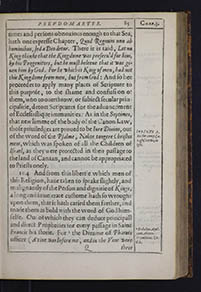 PSEVDO-MARTYR.
85
Chap. 3.
PSEVDO-MARTYR.
85
Chap. 3.
times and persons obnoxious enough to that Sea,
hath one expresse Chapter, Quod Regnum non ab
hominibus, sed a Deo detur. There it is said, Let no
King thinke that the Kingdome was preseru'd for him,
by his Progenitors, but he must beleeue that it was gi-
uen him by God. For he which is King of men, had not
this Kingdome from men, but from God: And so hee
proceedes to apply many places of Scripture to
this purpose, to the shame and confusion of
them, who to ouerthrow, or subiect secular prin-
cipalitie, detort Scriptures for the aduancement
of Ecclesiastique immunities: As in the Septimes,
that new limme of the body of the Canon Law,
those priuiledges are proued to be Iure Diuino, In 7. l 2. Tit. 1.
De for. comp. Ca.
1. glos. verbo, cu
ipso. out
of the word of the Psalme, Nolite tangere Christos
meos, which was spoken of all the Children of
Israel, as they were protected in their passage to
the land of Canaan, and cannot be appropriated
to Priests onely. 104 And from this libertie which men of
this Religion, haue taken to speake slightly, and
malignantly of the Person and dignitie of Kings,
a long and inueterate custome hath so wrought
vpon them, that it hath caried them farther, and
made them as bold with the word of God him-
selfe. Out of which they can deduce principall
and direct Prophecies for euery passage in Saint
Francis his storie. Foraa Sedulius. Apol.
cont. Alcora.
Francisca. l. 2.
C. 1. the Dreame of Pharoes
officer (A vine was before me, and in the Vine were Q three 086
 Chap. 3.
86
PSEVDO-MARTYR.
Chap. 3.
86
PSEVDO-MARTYR.
three branches) signifies Saint Francis, Gen. 40.10. and the three
Orders deriued from him, sayes the Booke of Con-
formities, and Sedulius the fresh Apologer thereof.
So he sayes,bb Sedul. l. 2. c. 1.
Luc. 12.32. Christ prophecied of this Order; and it is
fulfilled in this Order which hee said, Feare not little
flocke, for it is your Fathers pleasure, to giue you
the Kingdome. Andcc Sedul. l. 3. c. 13
Psal. 118. of these it is spoken, sayes hee,
The sound of them is gone into all Nations. Of these
prophanations the examples are too frequent;
for as they haue fitted all other things spoken of
Christ, to Saint Francis in the Booke of Conformities,
so dothdd l. 1. Ca. 18. Sedulius maintaine the giuing to him,
the title of Iesus of Nazareth, King of the Iewes. 105 So also must the Scriptures affoord prophe-
sies for euery ragge and inch of the Sindon, which
wrapped our Sauiour in the Sepulchre. For in
ee Mallonij Notæ
in Paleotum de
Syndone. l. 1.
C. 1. Nu. 18. that Liturgie or Office, (as they call it) which is
appointed by the Pope to be said in the Chappell
where this Sindon is preserued, all those places of
Scripture, which speake of Christs body sprinkled
with blood, are referred and saide to bee intended
of this Sindon. And therefore saies the Author
thereof, Since the Pope hath so applyed them, this ex-
position thereof cannot be reprehended. 106 By this license they giue all the names of f Extraua. Io. 22.
Cum inter. glos.
in fine.
Christ to the Pope;f yea the name of God himselfe;
And ofaa Liter Leo. 10.
per Benchum. l.
8. Ep. l. 17. Goddesse to our Lady. And by this license
didb Crusius the Iesuit, call Ignatius Constitutions
the Decalogue: b Gretzer. Cont.
Hassenmiller.
fo. 141. because saies Gretzer, his fellow Iesuite 087
 PSEVDO-MARTYR.
87
Chap. 3.
PSEVDO-MARTYR.
87
Chap. 3.
Iesuite, Metaphorically and instruction of our life, is
call'd the Decalogue. 107 Nor can these blasphemous detorsions,
& bold mis-applications, besalued, by Sedulius his
guiltie excuse, that theycc Sedul. Apol.
prefat. are somewhat too freely
written, according to the simplicitie of the age, And
dd l. 1. C. 9. such as some men would rather wish vnwritten, and
ee l. 1. C. 18. Circumspect men wish'd vnsaid; And some things too
ff Ibid. & C. 20. rawly, somethings too couragiously vttered. And these
which he so tenderly, and calmely passes ouer,
with light animaduersion, are such sayings as
these, That S. Francis wasgg l. 1. C. 20. deified; Thathh l. 1. C. 13. hee was
made one spirit with God: Thatii Ib. C. 15. hee saw the secrets of
hearts: Andkk Ib. c. 18. that he was more then Iohn Baptist, and
better then the Apostles: Andll l. 2. C. 6. that God did obay him at
a beck in euery thing. 108 Nor will Serarius his elegant euasion
serue them in this,mm Serar. litaneu-
ti. l. C. 13. That some men too indulgent and
carefull of their verse, or the delicacie of the Latine lan-
guage, may haue gone into these excesses. For the first
place, where the Pope is called the Lord our God,
is in a place barbarous and loose inough, which
is the glosse vpon an Extrauagant. And though
Bembus, in whose letters written for Leo the 10 our
Lady is called Goddesse, doe often stray into pro-
phane elegancies (asnn Epist. Leo. 10.
l. 2. Ep. 21. in another place, when he
would expresse an inspiration of the Holy ghost
in one, he saies, he was afflatus Zephiri cælestis aurà,
Andoo l. 4. Ep. 15. calls Excommunication, Interdictionem a-
Q2 quæ 088
 Chap. 3.
88
PSEVDO-MARTYR.
Chap. 3.
88
PSEVDO-MARTYR.
quæ & ignis) yet this will neither excuse that Pope
which sign'd those Letters, nor those to whose
care the expurgation of bookes, hath beene com-
mitted. So that none of their piæ fraudes, with
which they emplaster this venemous & contagi-
ous wounding the scriptures of God, & the phrase
of his spirit, will acquit or excuse them. 109 And if their mis-applying of Scriptures
carried them no further, then to simple and chil-
dish actions (as Saint Francis commanded Mas-
sæus to tumble round like a childe; because, saies
Sedulius, Apolog. l. 3. c.
1. nu. 3. it is written, Nisi Conuersi fueritis, & effi-
ciamini sicut paruuli, non intrabitis): Or if it carried
them but to stupid actions (as the penitent which
confessed to S. Anthony,Idem. l. 3. c. 13
nu. 3. that he had kicked his mo-
ther, receiuing this answere: If thy foote offend thee,
cut it off, went, and cut off his foote, (but S. Antho-
ny honestly set it on againe,) Or if it carried them
but to bolde and confident actions (as Saint An-
thony, when his Host set him a Toade vpon the
Table, and tolde him that it was written in
the Gospell, Idem. l. 3. c. 28
nu. 31.De omni quod tibi apponitur, comedes, he
with the signe of the Crosse, made it a Capon
ready rosted) sillinesse or some such disease might
lessen the fault. 110 But then is there extreame horrour
and abominations therein, when God and his
Lieuetenants are at once iniur'd, which is, when
places of Scripture are malitiously or ridiculous-
ly 089
 PSEVDO-MARTYR.
89
Chap. 3.
ly detorted to the auiling of Princes: With what
PSEVDO-MARTYR.
89
Chap. 3.
ly detorted to the auiling of Princes: With what
soule then could Pope Alexander say, treading vp-
pon Fredericke,Psal. 90. 13.Super aspidem & Basiliscum ambula-
bis: of which Acte, Ios Stepha. de
Osculat. ped. a Bishoppe in that Church
saies, that it ought to be commended, and that it was law-
fully and worthily done. Pont. cap. 11. §.
Ex quo. And with what conscience could the same
seruile Bishopp of Sixtus the fift, proue the kissing
of the popes feete,Esa 49.23. out of those wordes of Esay,
Kings and Queenes shall worshippe thee, with their
faces towards the Earth,Ios. Steph. c. 5.and licke vp the dust of thy
feete? how durst hee say, that this kissing of the
popes feete, was established in saint Luke,Luc. 7.when the
sinner kissed Christs feete?Idem. ca. 7. Because (saies he) if it were
affoorded Christ, belongs it not to his Church, which is
bone of his bone?Deut. c. 1.3. And out of Deuteronomy hee
thinkes this reuerence is euidenly enough de-
monstrated, because it is saide of God, the saints of
God,Idem. c. 10. are said to be humbled at his feete. So that whatsoeuer is applyed to the Church, or
to God, by this detorsion is giuen to the pope:
But this Bishoppe is so transported with this
rage of detorting scriptures, that rather then
not mis-applie them, hee will apply them
to his owne Condemnation: For thus hee
concludes his Epistle with the wordes of the A-
postle:Epist. lecto. Gaudeo siue per veritatem, siue per occasionem,
Romanæ Ecclesiæ dignitatem extolli: so that it is all
one to him, whether scriptures bee faithfully Q3 ap= 090
 Chap. 3.
90
PSEVDO-MARTYR.
Chap. 3.
90
PSEVDO-MARTYR.
applyed or no, so it be to the profit and aduantage
of that Church. Append. ad lib.
de Pont. respons.
ad lib. Auiso Pi-
aceuole ca. 2 111 And though Bellarmine seeme to deplore
and lament that vnworthy manner of handling
serious Controuersies, of which hee accus'd that
Authour, which called his booke Auiso Piaceuole,
because he cytes some of the Italian Poets against
the Church of Rome, yet is this fashion still in so
much vse amongst them, that in their last busines
with the state of Venice, Nicod. Macer
de paren: Baro:
ad lecto. one authour, though in a
disguised name, that vndertooke the defence
of Baronius his furious instigation of the Pope,
doth not onely wound and staine the memory
of our late Queene, with impious calumniations,
and wrest the Scriptures, to defame our present
King; but he protests that hee chuses this way of
doing it, to imitate Socrates, who was (saies he) De-
risor hominum, maxime potentum, and exhibites his
booke as a sacrifice, Risui, & Lubentiæ. 112 Where then shall we hope, that these men
will stoppe or limit their blasphemies? when in
the licentious fury thereof, hauing made it habi-
tuall to them, and an Idiolisme of that Religion,
they set (in their account) God against God; that
is the word of God against the Pope, and defame
him in their owne Pasquils by the phrase of
Scripture. In which kind of prophane libelling,
I had thought their malignity, and irreligion had
beene at the highest, when they called Lucretiaes bastard, 091
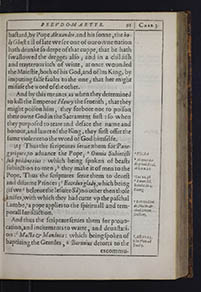 PSEVDO-MARTYR.
91
Chap. 3.
PSEVDO-MARTYR.
91
Chap. 3.
bastard, by Pope Alexander, and his sonne, the ho-
ly Ghost: till of late we see one of our owne nation
hath drunke so deepe of that cuppe, that he hath
swallowed the dregges also; and in a childish
and trayterous itch of witte, at once wounded
the Maiestie, both of his God, and of his King, by
imputing false faults to the one, that hee might
misuse the word of the other. And by this meanes, as when they determined
to kill the Emperor Henry the seuenth, that they
might poison him, they forbore not to poison
their owne God in the Sacrament first: so when
they purposed to teare and deface the name and
honour, and lawes of the King, they first offer the
same violence to the word of God himselfe. 113 Thus the scriptures serue them for Pane-
gyriques, to aduance the Pope;aa Psal. 8.6 Omnia Subiecisti
sub pedibus eius: which being spoken of beasts b Maynardus
de priuil. Eccl.
Art. 2 n. 21
subiection to men,b they make it of men to the
Pope. Thus the scriptures serue them to deuest
and disarme Princes;cc Luc 22.38 Ecceduo gladij, which being
(if wedd Eman. Sâ.
Scholia in 4.
Euang. beleeue the Iesuite Sd) no other then those
knifes, with which they had cutte vp the paschal
Lambe,e a pope applies to the spirituall and tem-
porall Iurisdiction. e Extrau. Com
de Maior. &
obed. Vnam
sanctam,. And thus the scripture serues them for prouo-
cation, and incitements to warre, and deuastati-
on:ff Act. 10.13. Macta & Manduca: which being spoken of
baptizing the Gentiles,gg In Voto ad
Paul. 5. Baronius detorts to the excommu- 092
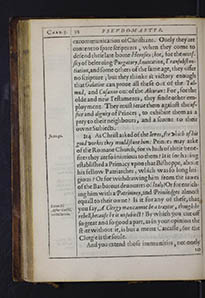 Chap. 3.
92
PSEVDO-MARTYR.
Chap. 3.
92
PSEVDO-MARTYR.
excommunication of Christians. Onely they are
content to spare scriptures, when they come to
defend their late-borne Heresies; for, for the neces-
sity of beleeuing Purgatory, Inuocation, Transubstan-
tiation, and some others of the same age, they offer
no scripture; but they thinke it victory enough
that Galatine can proue all these out of the Tal-
mud, and Cusanus out of the Alcoran: For, for the
olde and new Testaments, they finde other em-
ployment. They must serue them against the of-
fice and dignity of Princes, to exhibite them as a
prey to their neighbours, and a scorne to their
owne Subiects. 114 As Christ asked of the Iewes, for which of his
good workes they would stone him: Princes may askeIo. 10.30.
of the Romane Church, for which of their bene-
fites they are so iniurious to them? Is it for hauing
established a Primacy vpon that Bishoppe, aboue
his fellow Patriarches, which was so long liti-
gious? Or for withdrawing him from the iawes
of the Barbarous deuourers of Italy? Or for enrich-
ing him with a Patrimony, and Priuiledges almost
equall to their owne? Is it for any of these, that
you say,Eman. Sâ
Aphor Confes.
verb. Clericus. A Clergy man cannot be a traytor, though he
rebell; because he is no subiect? By which you cut off
so great and so good a part, as in your opinion the
state without it, is but a meere Carcasse, for the
Clergie is the soule. And you extend those immunities, not onely to 093
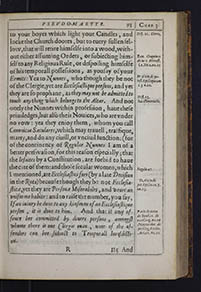 PSEVDO-MARTYR.
93
Chap. 3.
PSEVDO-MARTYR.
93
Chap. 3.
to your boyes which light your Candles,Dist. 21. Cleros, and
locke the Church doores, but to euery sullen fel-
low, that will retire himselfe into a wood, with-
out either assuming Orders, Ren. Choppinus
de iure Monast.
l. 2. Tit. 2. nu. 25 or subiecting him-
self to any Religious Rule, or despoiling himselfe
of his temporall possessions, as you say of your
ErmitsDr Aluin de po-
test. Episcoporum
c. 3 n. 11.: Yea to Nunnes, who though they be not
of the Clergie, yet are Ecclesiastique persons, and yet
they are so prophane, as they may not be admitted to
touch any thing which belongs to the Altar.Dist. 23.
Sanctimonialis. And not
onely the Nunnes within profession, haue these
priuiledges, but also their Nouices, who are vnder
no vow: yea they enioy them, whom you call
Canonicas Sæculares, which may trauell, traffique,
marry, and do any ciuill, or vnciuil function: (for
of the continency of Regular Nunnes I am of a
better perswasion, for this reason especially; that
the Iesuites by a Constitution, are forbid to haue
the care of them: Regula. 47. and those secular women, which
I mentioned, are Ecclesiastici fori (by a late Decision
in the Rota) because though they be not Ecclesia-
sticæ,D Aluinde
pot. Episco. ca. 3.
nu. 13. yet they are Personæ Miserabiles, and weare an
vniforme habite: and to raise the number, you say,
If an iniury be done to any kinsman of an Ecclesiastique
person, it is done to him.Paris de puteo
de Synd. ca. de
exces. reg. nu. 29
Maynardus de
prinileg. Eccles.
Art. 17. nu. 10. And that if any of-
fence bee committed by diuers persons, amongst
whome there is one Clergie man, none of the of-
fenders can bee subiect to Temporall Iurisdicti-
on. R 115 And 094
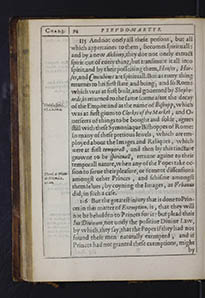 Chap. 3.
94
PSEVDO-MARTYR.
115 And not onely all these persons, but all
Chap. 3.
94
PSEVDO-MARTYR.
115 And not onely all these persons, but all
which appertaines to them, becomes spirituall:
and by a new Alchimy, they doe not onely extract
spirit out of euery thing, but transmute it all into
spirit, and by their possessing them, Houses, Hor-
ses, and Concubines are spirituall. But as euery thing
returnes to his first state and being; and so Rome
which was at first built, and gouerned by Shephe-
ards, is returned to the same forme after the decay
of the Empire:Tholosa. synt. l.
15. c. 2. nu. 4. and as the name of Bishopp, which
was at first giuen to Clerkes of the Market, and O-
uerseers of things to be bought and solde, agrees
still with these Symoniaque Bishoppes of Rome:
so many of these pretious Iewels, which are em-
ployed about the Images and Reliques, which
were at first temporall, and then by this tincture
growne to be spirituall, returne againe to their
temporall nature, when any of the Popes take oc-
sionoc-
casion to serue their pleasure, Theod. a Niem.
de schism. l. 1.
ca. 22. or foment dissensions
amongst other Princes, and schisme amongst
themselues, by coyning the Images, as Vrbanus
did, in such a case. 116 But the greatest iniury that is done to Prin-
ces in this matter of Exemption, is, that they will
not be beholden to Princes for it: but plead their
Ius Diuinum, not onely the positiue Diuine Law,
by which, they say, that the Popes if they had not
found these men naturally exempted, and if
Princes had not granted these exemptions, might by 095
 PSEVDO-MARTYR.
95
Chap. 3.
PSEVDO-MARTYR.
95
Chap. 3.
by their Constitutions, haue exempted them,
without asking leaue of Princes, but they pre-
tend text of ScritureScripture, though detorted and mis-
vs'd, to proue this Exemption. And for the Per-
sons they pretend many; but with no more di-
rectnes, then that by which they proue exempti-
on of their goods,Lælio Medico.
contra. Venet.
fo. 196. Nella
Raccolta. from secular charges and bur-
dens, which is, Domini est terra, & plenitudo eius,
and since it is the Lords, it is theirs. 117 But all Princes grow weary and iealous
of that claime;Risposta di Ant.
Bouio al. Paulo.
Nella Raccolta
fo. 50. and a Catholique Writer hath ob-
serued, that many of the Writers of the Spanish
Nation in these later times, haue resisted that opi-
nion, of which he names Medina, Victoria, Soto, Le-
desma, and Bannes. And if that Nation grow into iealousies, and
feele her right, as France hath done before, all the
Italian Writers, will be but weake euidence, to
proue this exemption to bee Iure Diuino. But as
though all this were not enough, and that the
states of Princes were not enough infirm'd by
withdrawing of all these, they teach,Bell. de Clericis
l. 1. c. vlt. That a Sub-
iect by remouing into another Prouince hath deuested
his allegeance and subiection: And that euery man is
free concerning his owne person: And that the band is
stronger between a Creditor and a Debtor, then between
a Prince and subiect. Vpon all which, what mischie-
uous conclusions will follow, is euident and ob-
uious enough. R2 118 To 096
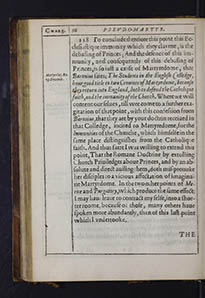 Chap. 3.
96
PSEVDO-MARTYR.
118 To conclude therefore this point this Ec-
Chap. 3.
96
PSEVDO-MARTYR.
118 To conclude therefore this point this Ec-clesiastique immunity which they clayme, is the
debasing of Princes; And the defence of this im-
munity, and consequently of this debasing of
Princes, is so iust a cause of Martyredome, that
Baronius saies;Martyrolog. Ro.
29. Decemb. The Students in the English Colledge,
haue good title to two Crownes of Martyrdome, because
they return into England, both to defend the Catholique
faith, and the immunity of the Church. Where we will
content our selues, till wee come to a further exa-
gitation of that point, with this confession from
Baronius, that they are by your doctrin receiued in
that Colledge, incited to Martyredome, for the
Immunities of the Churche, which himselfe in the
same place distinguishes from the Catholique
faith. And thus farre I was willing to extend this
point, That the Romane Doctrine by extolling
Church Priuiledges aboue Princes, and by an ab-
solute and direct auiling them, doth mis-prouoke
her disciples to a vicious affectation of imagina-
rie Martyrdome. In the two other points of Me-
rite and Purgatory, which produce the same effect,
I may haue leaue to contract my selfe, into a shor-
ter roome, because of those, many others haue
spoken more abundantly, then of this last point
which I vndertooke. THE 097
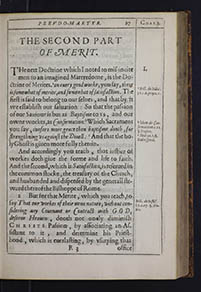 PSEVDO-MARTYR.
97
Chap. 3.
THE SECOND PART
PSEVDO-MARTYR.
97
Chap. 3.
THE SECOND PART
OF MERIT. THeThe next Doctrine which I noted to mis-incite1.
men to an imagined Martyrdome, is the Do-
ctrine of Merites.aa Bell. de Indul.
l. 1. c. 2. propos. 1. In euery good worke, you say, there
is somewhat of merite, and somewhat of satisfaction. The
first is said to belong to our selues, and that by it
we establish our saluation: So that the passion
of our Sauiour is but as Baptisme to vs, and our
owne workes, as Confirmation:bb Idem de Con-
firmatione c. 11
§ Duplex. Which Sacrament
you say, confers more grace then baptisme dooth, for
strengthning vs against the Diuell:c And that the ho-
ly c Ibid ca. 2. §.
Sed respond. Ghost is giuen more fully therein. And accordingly you teach, that iustice of
workes doth giue the forme and life to faith.
And the second, which is Satisfaction, is reserued in
the common stocke, the treasury of the Church,
and husbanded and dispensed by the generall ste-
ward thereof the Bishoppe of Rome. 2 But for that Merite, which you teach, to
say That our workes of their owne nature,Bell. de Iustif.
l. 5. c. 17. §. No-
bis.without con-
sidering any Couenant or Contract with GOD,
deserue Heauen, dooth not onely diminish
CHRISTS Passion, by associating an As-
sistant to it, and determine his Priest-
hood, which is euerlasting, by vsurping that R3 office 098
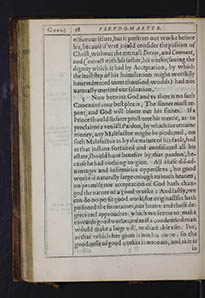 Chap. 3.
98
PSEVDO-MARTYR.
Chap. 3.
98
PSEVDO-MARTYR.
office our selues, but it preferres our worke before
his, because if wee could consider the passion of
Christ, without the eternall Decree, and Couenant,
and Contract with his father, his worke (sauing the
dignity which it had by Acceptation, by which
the least step of his humiliation might worthily
haue redeemed tenne thousand worlds) had not
naturally merited our saluation. 3 Now betwixt God and vs there is no such
Couenant; our best plea is, The sinner must re-
pent, and God will blotte out his sinnes. If a
Prince should so farre prostitute his mercie, as to
proclaime a veniall Pardon, by which for certaine
money, any Malefactor might be pardoned, no
such Malefactor as by the nature of his fault, had
at that instant forfaited and confiscated all his
estate, should haue benefite by that pardon, be-
cause he had nothing to giue. All these dis-ad-
uantages and infirmities oppresse vs; no good
worke is naturally large enough to reach heauen;
no promise nor acceptation of God hath chan-
ged the nature of a good worke: And lastly, we
can do no perfit good work; for originall sin hath
poisoned the fountaines, our hearts: and those de-
grees and approaches, which we seeme to make
towards good workes, are as if a condemned man
would make a large will, to charitable vses. For,
as that which hee giues is not his owne, so the
goodnesse of good workes is not ours; and as it is in 099
 PSEVDO-MARTYR.
99
Chap. 3.
PSEVDO-MARTYR.
99
Chap. 3.
in the Princes pleasure and allowance, whether
his will shall take any effect, or no; so is it in the
pleasure of God, whether any workes of ours shal
be accepted. 4 Yet there is more Deuotion in our Do-
ctrine of good works, then in that of the Romane
Church, because wee teach as much necessity of
them as they doe, and yet tye no reward to them.
And we acknowledge, that God doth not onely
make our faith, to fructifie and produce good
workes as fruits thereof, but sometimes beginnes
at our workes: and in a mans hart morally encli-
ned to doe good, dooth build vp faith: for if an
Angell could transport Abacuc, for Gods seruice,
by onely taking hold of his haire, God can take
such holde of our workes, and carrie vs further
by them. And further then this I see not that mo-
derate men may goe: and they startle too easilie
that dare not come so farre. And if it had beene
expedient for Bellarmine, to haue spoken plaine, I
thinke he would haue come to that, when hee
was so neere towards it, as to say, That it is the sa-
fest way to place all our confidence in the onely mercy of
God,De Iustificat.
l. 5. c. 7. Proposit.
3. by reason of the incertainety of our owne righteous-
nesse, and the danger of vaine-glory: for he seemes else
where to be so farre from doubting, that a man
may not be sure of his owne righteousnesse, that
himselfe had such an assurance of righteousnesse
in another man, that vpon his Oath before a pub- 100
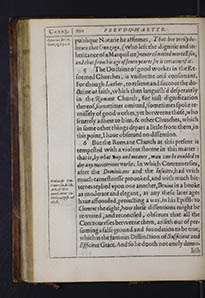 Chap. 3.
100
PSEVDO-MARTYR.
Chap. 3.
100
PSEVDO-MARTYR.
publique Notarie he affirmes,Ceparius. de vit.
Gonzag. l. 3. c. 2. That hee verily be-
leeues that Gonzaga, (who left the dignitie and in-
heritance of a Marquisate) neuer cōmitted mortall sin,
and that from his age of seuen yeares, he is certaine of it. 5 The Doctrine of good workes in the Re-
formed Churches, is vniforme and consonant.
For though Luther, to relieue and succour the do-
ctrine of faith, which then languish'd desperately
in the Romane Church, for iust dignification
thereof, sometimes omitted, sometimes spoke re-
missely of good workes, yet betweene those, who
seuerely adhere to him, & other Churches, which
in some other things depart a little from them, in
this point, I haue obserued no dissention. 6 But the Romane Church at this present is
tempested with a violent storme in this matter:
that is, by what way and meanes, man can be enabled to
doe any meritorious worke. In which Controuersies,
after the Dominicans and the Iesuites, had with
much earnestnesse prouoked, Eenius de Con-
trouersia, de lib.
Arb. & Dei
auxil. inter Ca-
tholicos. Epist. ad
Cle. 8. and with much bit-
ternes replied vpon one another, Benius in a booke
as moderate and elegant, as any these later ages
haue affoorded, proiecting a way, in his Epistle to
Clement the eight, how these dissentions might be
re-vnited, and reconciled, obserues that all the
Controuersies betweene them, ariseth out of pre-
suming a false ground and foundation to be true,
which is the famous Distinction of Sufficient and
Efficient Grace. And so he dooth not onely demo-
lish 101
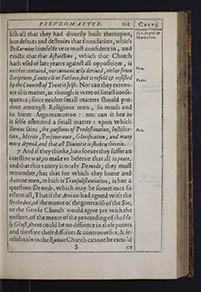 PSEVDO-MARTYR.
101
Chap. 3.
lish all that they had diuersly built thereupon, Li. I. de grat. &
PSEVDO-MARTYR.
101
Chap. 3.
lish all that they had diuersly built thereupon, Li. I. de grat. &
lib. arb. ca. II.
but defeats and destroies that foundation, which
Bellarmine himselfe was most confident in, and
euicts that that distinction, which that Church
hath vsed of late yeares against all opposition, is
neither containd,Fo. 4.nor conueniently deriued, either from
Scriptures, Councels or Fathers, but is refeld & resisted
by the Councell of Trent it selfe.Fo. 91. Nor can they extenu-
ate this matter, as though it were of small conse-
quence; since neither small matters should pro-
duce amongst Religious men, so much and
so bitter Argumentation: nor can it bee in
it selfe esteemed a small matter: vpon which
Benius saies, Fo. 2.the questions of Predestination, Iustifica-
tion, Merite, Perseuerance, Glorification, and many
more depend, and that all Diuinitie is shaken therein. 7 And if they thinke, howsoeuer they suffer an
intestine war, to make vs beleeue that all is peace,
and that this variety is onely De modo, they must
remember, that that for which they burne and
damne men, which is Transubstantiation, is but a
question De modo, which may be sometimes so
essentiall, That if the Arrians had agreed with the
Orthodox, of the maner of the generatiō of the Son,
or the Greeke Church would agree yet with the
western, of the maner of the proceeding of the Ho-
ly Ghost, there could be no diffrence in these points
and therfore these diffrēces & controuersies, & ir-
resolutiōs in the Roman Church cannot be excus'd S or 102
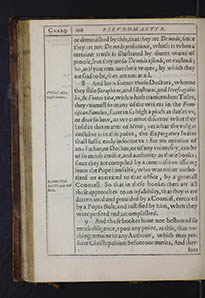 Chap. 3.
102
PSEVDO-MARTYR.
Chap. 3.
102
PSEVDO-MARTYR.
or diminished by this, that they are De modo, since
they are not De modo probationis, which is when a
certaine truth is illustrated by diuers waies of
proofe, but they are so De modo essendi, or existendi;
So, as if you remoue these wayes, by which they
are said to be, they are not at all. 8 And howsoeuer those Doctors, whome
they stile Seraphicos,VVWilloti Atbe-
næ, Orthodox. and Illustratos, and Irrefragabi-
les, & Fontes vitæ, with which transcendent Titles,
they enamell so many of the writers in the Fran-
ciscan Families, so are in so high a pitch as dazles vs,
or diue so low, as we cannot discerne what they
hold in this matter of Merit; yet what the vulgar
doctrine is in this point, the Expurgatory Indices
shall sufficiently informe vs: for no opinion of
any Father, or Doctor, or of any vniuersity, can be
of so much credite, and authority, as those books;
since they are compiled by a commission issuing
from the Pope himselfe, who was either autho-
rized or entreated to that office, by a generall
Councell.Ex Cone. Trid.
Bull. Pij 4. de Ind
libro. So that in these bookes there are all
these approaches to an infallibility, that they were
determined and prouided by a Councel, executed
by a Popes Buls, and iustified by him, when they
were perfited and accomplished. 9 And those bookes haue not bestowed so
much diligence, vpon any point, as this, that no-
thing remaine in any Authour, which may pre-
ferre Christs passion before our merits. And ther-
fore 103
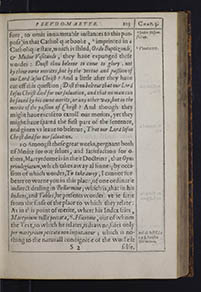 PSEVDO-MARTYR.
103
Chap. 3.
fore, to omit innumerable instances a Index Hispan.
PSEVDO-MARTYR.
103
Chap. 3.
fore, to omit innumerable instances a Index Hispan.
fo. 149. to this pur-
pose) in that Catholique booke,b imprinted in a
Catholique state, b Venet. 1575. which is stiled, Ordo Baptizandi,
& Modus Visitandi, they haue expunged these
wordes: Doost thou beleeue to come to glory, not
by thine owne merites, but by the vertue and passion of
our Lord Iesus Christ? And a little after they have
cut off this question; Dost thou beleeue that our Lord
Iesus Christ died for our saluation, and that no man can
be saued by his owne merits, or any other way, but in the
merite of the passion of Christ? And though they
might haue excuse to extoll our merites, yet they
might haue spared the first part of the sentence,
and giuen vs leaue to beleeue, That our Lord Iesus
Christ died for our saluation. 10 Amongst these great works, pregnant both
of Merite for our selues, and satisfaction for o-
thers, Martyrdome is in their Doctrine, that Opus
priuilegiatum, which takes away al sinne; by occa-
sion of which wordes, To take away, I cannot for-
beare to warne you in this place, of one ordinarie
indirect dealing in Bellarmine; which is, that in his
Indices, and Tables, he presents wordes verie farre
from the sense of the place to which they relate:
As in this point of merite, where his Index saies,
Martyrium tollit peccata, S. Hierome, out of whom
the Text, to which he relates, is drawne; saies only
per martyrium peccata non imputantur; Bell de Iustisi. l. 2
c. 9. §. Sanctus
Hieronimus. which is no-
thing to the naturall condignitie of the worke it S2 selfe. 104
 Chap. 3.
104
PSEVDO-MARTYR.
Chap. 3.
104
PSEVDO-MARTYR.
selfe. And I should haue neglected to haue noted
Bellarmines Index, but that I obserue that they are
so seuere vpon the Indices, made by some of their
owne Church, that pretending still to haue ra-
sed nothing in the body of the fathers, they ex-
punge in the Indices many sentences, though the
very wordes be in the Text it selfe: as in this
point of Merite,Epist. ante Ind.
Belg. Iunius hath noted, that these
wordes, Meritum nullum, nisi quod a Christo confer-
tur, are cut out of the Index to Chrysostome, though
the same wordes be in the text. 11 To proceede then, for the dignity of this
worke, Bellarmine against So o, and Ledesmo main-
taines, that martyrdome doth saue a man,De baptism. l. 1.
c. 6. ex opere ope-
rato. And that there is required in the martyre, no
further disposition, nor other preparation, then in one
who is to be baptized. For (saies he) though Charity be
required, it is not precedent Charity, but it is, because a
Martyr cannot depart without Charity, because by a co-
uenant from God, Grace is infus'd, and so Charity: and
therefore it abolishes originall sinne, and actuall sinne,
and both eternall and temporall punishment belonging
thereunto.De Indulg. l. 1.
c. 2. §. Quinto. And in another place Bellarmine saies,
That it is euident that martyredome is so full a satisfa-
ction, that it expiates all guiltinesse, contracted by all
sinnes, how huge soeuer the number, or haynousnes ther-
of be: and if any milder man of that Church would
say otherwise (as Ferus doth directly, the Passions in
this life,L. 3. Com. in Mat.
20. 8 are not worthy of future glorie) hee must be de= 105
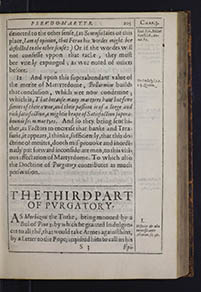 PSEVDO-MARTYR.
105
Chap. 3.
PSEVDO-MARTYR.
105
Chap. 3.
detorted to the other sense,Sext Sen. Bibliot
Sanct. l. 6. An-
not. 89. (as Senensis saies of this
place, I am of opinion, that Ferus his wordes might bee
deflected to the other sense:) Or if the wordes will
not confesse vppon that racke, they must
bee vtterly expunged, as wee noted of others
before. 12 And vpon this superabundant value of
the merite of Martyredome,De Indulg. l. 1. c.
2. §. Quinto. Bellarmine builds
that conclusion, which wee now condemne;
which is, That because many martyres haue but fewe
sinnes of their owne, and their passion is of a large and
rich satisfaction, a mightie heape of Satisfaction supera-
bounds from martyrs. And so they being sent hi-
ther, as Factors to encrease that banke and Trea-
surie, it appears, I thinke, sufficiently, that this do-
ctrine of merites, dooth mis-prouoke and inordi-
natly put forward inconsiderate men, to this viti-
ous affectation of Martyrdome. To which also
the Doctrine of Purgatory contributes as much
perswasion. THE THIRD PART OF PVRGATORY. ASAs Morbizan the Turke, being mooued by a 1.
Bul of Pius 2. by which he granted Indulgen-
ces to all thé,Historiæ & ali
impressa. ante
Alcoran. fo. 99. that would take Armes against him,
by a Letter to the Pope; required him to call in his S3 Epi-
106
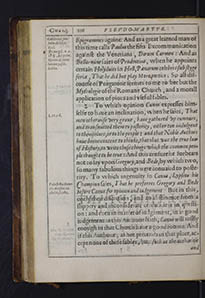 Chap. 3.
106
PSEVDO-MARTYR.
Chap. 3.
106
PSEVDO-MARTYR.
Epigrammes againe: Casabonus pre-
fatio de liber.
Eccl. And as a great learned man of
this time calls Paulus the fifts Excommunication
against the Venetians, Dirum Carmen And as
Bellarmine De purg. L. 2. c.
18 §. Ad quint.
Hymno de nouo
lumine pasch.
Sabba. saies of Prudentius, when he appoints
certain Holydaies in Hell, Pænarum celebres sub styge
feriæ, That he did but play More poetico: So all dis-
course of Purgatorie seemes to me to bee but the
Mythologie of the Romane Church, and a morall
application of pious and vseful fables. 2 To which opinion Canus expresses him-
selfe to haue an inclination, when he saies,L. 11. c. 6. That
men otherwise very graue, have gathered vp rumours,
and transmitted them to posterity, either too indulgent
to themselues, or to the people: and that Noble Authors
haue beene content to thinke, that that was the true law
of History, to write those things which the common peo-
ple thought to be true: And this censure he forbears
not to lay vpon Gregory, and Bede, by which two,
so many fabulous things were conuaied to poste-
rity. To which ingenuity in Canus, Lypsius his
Champion saies,Palæstrita Hono-
ris. Anastas Co-
chelet. fo. 285. That he preferres Gregory and Bede
before Canus, for opinion and iudgement: But in this,
onely their discretion, and an abstinence from a
slippery and inconsiderate credulitie is in questi-
on: and euen in matter of iudgement, in as good
iudgement as this Authour hath, Canus will iustly
enough in that Church haue a good roo me. And
if this Authour, as hee pretends in that place, ac-
cept none of these fables, but such as the authoritie and 107
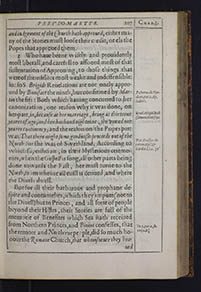 PSEVDO-MARTYR.
107
Chap. 3.
PSEVDO-MARTYR.
107
Chap. 3.
and iudgement of the Church hath approued, either ma-
ny of the Stories must loose their credit, or els the
Popes that approued them. 3 Who haue beene wisely and prouidently
most liberall, and carefull to affoord most of that
sustentation of Approuing, to those things that
were of themselues most weake and indeffensible:
for so S. Brigids Reuelations are not onely appro-
ued by Boniface the ninth, Paleotus de Syn-
done, par. 1. Ep.
lectori. but confirmed by Mar-
tin the fift: Both which hauing concurred to her
canonization, one reason why it was done, on
her part,Reuel. Brigid. Bull
Canone. Bonif. 9. is, because at her marriage, being at thirteene
yeares of age, and her husband eighteene, she vowed one
yeares continency; and the reason on the Popes part
was: That there might some goodnesse proceede out of the
North for she was of Swethland.Par. Crassus de
cerem. Epis. &
Cardin. l. 1. c. 39 According to
which superstition, in their Mysterious ceremo-
nies, when the Gospell is song, all other parts being
done towards the East, hee must turne to the
North, from whence all euill is deriued, and where
the Diuels dwell. But for all their barbarous and prophane de-
spite and contumelies, which they impute (not to
the Diuell) but to Princes, and all sorte of people
beyond their Hilles, their Stories are full of the
memorie of Benefites which Sea hath receiued
from Northern Princes,To. 3. par. 2. fo.
1052. B. and Binius confesses, that
the remote and Northerne people, did so much ho-
nour the Romane Church, that whomsoeuer they hea-
ued 108
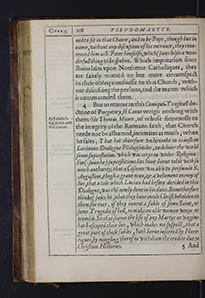 Chap. 3.
108
PSEVDO-MARTYR.
Chap. 3.
108
PSEVDO-MARTYR.
ued to sit in that Chaire, and to be Pope, though but in
name, without any discussion of his entrance, they reue-
renced him as S. Peter himselfe, which (saies he) is a won-
derfull thing to be spoken. Which imputation since
Binius laies vpon Northerne Catholiques, they
are fairely warned to bee more circumspect
in their obsequiousnesse to that Church, with-
out discussing the persons, and the matter which
is commaunded them. 4 But to returne to this Comique-Tragicall do-
ctrine of Purgatory, if Canus weigh nothing with
them:Epist. Rutbalo.
Reg. Secret. ante
Dial. Luciani. Sir Thomas Moore, of whose firmenesse to
the integrity of the Romane faith, that Church
neede not be ashamed, intimates as much, when
he saies, That hee therefore vndertooke to translate
Lucianus Dialogue Philopseudes, to deliuer the world
from superstition: which was crept in vnder Religion:
For (saies he) superstitious lies haue beene tolde with so
much authority, that a Cosoner was able to perswade S.
Augustine, thogh a graue man, & a vehement enemy of
lies, that a tale which Lucian had before derided in this
Dialogue, was thē newly done in his daies. Some therfore
thinke (saies he) that they haue made Christ beholden to
them for euer, if they inuent a fable of some Saint, or
some Tragedie of hell, to make an olde woman weepe or
tremble. So that scarce the life of any Martyr or virgine
hath escaped their lies, which makes me suspect, that a
great part of those fables, hath beene inserted by Here-
tiques, by mingling therof to withdraw the credite due to
Christian Histories. 5 And 109
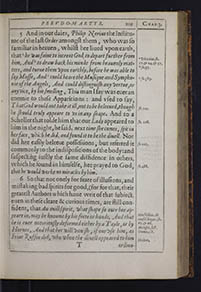 PSEVDO-MARTYR.
109
Chap. 3.
5 And in our daies, Philip Nerius the Institu-
PSEVDO-MARTYR.
109
Chap. 3.
5 And in our daies, Philip Nerius the Institu-tor of the last Order amongst them, who was so
familiar in heauen, whilst hee liued vpon earth, a Vita eius. fo.
17. & 24. & 57.
thata he was faine to intreat God to depart further from
him, Andbb fo. 33. to draw back his minde from heauenly mat-
ters, and turne them vpon earthly, before he was able to
say Masse, Andcc fo. 383. could heare the Musique and Sympho-
nie of the Angels, And could distinguish any vertue, or
any vice, by his smelling, This man I say was euer an
enemie to these Apparitions: and vsed to say,
That God would not take it illfo. 107., not to be beleeued, though
he should truly appeare to vs in any shape. And to a
Scholler that tolde him that our Lady appeared to
him in the night,fo. 108. he said, next time she comes, spit in
her face, which he did, and found it to be the diuell. Nor
did hee easily beleeue possessions,fo. 229. but referred it
commonly to the indispositions of the body: and
suspecting iustly the same diffidence in others,
which he found in himselfe,fo. 488. hee prayed to God,
that he would worke no miracles by him. 6 So that not onely for feare of illusions, and
mistaking bad spirits for good, (for for that, their
greatest Authors which haue writ of that subiect,
euen in these cleare & curious times, are still con-
fident, that An euill spirit, Binsfeldius. de
confel. Sagar. fo.
67. & 68
Menghi. fust.
Dæmo. c. 8. what shape so euer hee ap-
peare in, may be knowne by his feete or hands, And that
he is euer notoriously deformed either by a Tayle, or by
Hornes, And that hee will vanish, if one vse him, as
Friar Ruffin did,Ibidem. who when the diuell appeared to him T ordina- 110
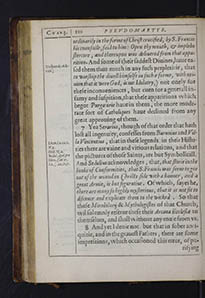 Chap. 3.
110
PSEVDO-MARTYR.
Chap. 3.
110
PSEVDO-MARTYR.
ordinarily in the forme of Christ crucified, by S. Francis
his counsaile, said to him: Open thy mouth, & implebo
stercore, and thereupon was deliuered from that appa-
rition. And some of their saddest Diuines, haue ea-
sed them thus much in any such perplexitie, that Vasques de Ado-
rati.
to worship the diuell himselfe in such a forme, with opi-
nion that it were God, is not Idolatry,) not onely for
these inconueniences, but euen for a generall in-
famy and suspition, that these apparitions which
begot Purgatorie haue in them, the more mode-
rate sort of Catholiques haue declined from any
great approuing of them. 7 Yea Serarius, though of that order that hath
lost all ingenuity, confesses from Baronius and Vil-
la Vincentius,Litan. l. 2. ca. 2.
N. 3.
Ibid. N. 4. that in these legends, in their Histo-
ries there are vaine and vitious relations, and that
the pictures of those Saints, are but Symbolicall.
And Sedulius acknowledges, that, Sedul. Apol. pro
libro. Con or.
l. 1. C. 20. N. 7. that storie in the
booke of Conformities, that S. Francis was seene to goe
out of the wound in Christs side with a banner, and a
great Armie, is but figuratiue. Of which, sayes he,
there are many so highly mysterious, that it is not fit to
discouer and explicate them to the wicked. So that
these Mirabilarij & Mythologistes of that Church,
wil solemnly reserue these their Arcana Ecclesiæ to
themselues, and shall without any enuie from vs. 8 And yet I denie not, but that in sober anti-
quitie, and in the grauest Fathers, there are some
impressions, which occasioned this error, of pu-
rifying 111
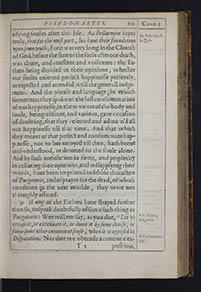 PSEVDO-MARTYR.
111
Chap. 3.
rifying soules after this life, As Bellarmine sayes
PSEVDO-MARTYR.
111
Chap. 3.
rifying soules after this life, As Bellarmine sayes
truly,De Pont. l. 4. c. 8.
§. Quia. that for the most part, lies haue their foundation
vpon some truth; For it was very long in the Church
of God, before the state of the soule after our death,
was cleare, and constant and vniforme: the Fa-
thers being diuided in their opinions, whether
our soules enioyed perfect happinesse presently,
or expected and attended it till the generall iudge-
ment. And the phrase and language, in which
sometimes they spoke of the last consummation
of our happinesse, in the re-vnion of the body and
soule, being obscure, and various, gaue occasion
of doubting, that they reserued and adiourn'd all
our happinesse till that time. And that which
they meant of that perfect and consummate hap-
pinesse, not to bee enioyed till then, hath beene
mis-vnderstood, or detorted to the soule alone.
And by such irresolution in some, and perplexity
in collating their opinions, and misapplying their
words, haue been imprinted indelible characters
of Purgatorie, and of prayer for the dead, of whose
condition in the next worlde, they were not
throughly assured. 9 If any of the Fathers haue strayed farther
then so, to speak doubtfully of some such thing as
Purgatorie: Wee will not say, as you doe,aa Ind. Expurg.
belg. fo. 12. Let vs
excuse it, or extenuate it, or denie it by some deuise, or
faine some other conuenient sense, when it is opposed in
Disputation.Dist. 4 statuimus.
gloss. Nor dare we obtrude a contrarie ex-
T2 position, 112
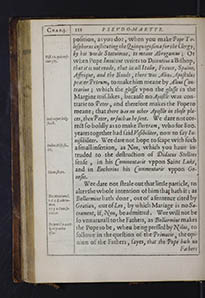 Chap. 3.
112
PSEVDO-MARTYR.
Chap. 3.
112
PSEVDO-MARTYR.
position, as you doe, when you make Pope Te-
lesphorus instituting the Quinquagesima for the Clergy,
by his worde Statuimus, to meane Abrogamus;Dist. 12. quis nes-
ciat glos. Or
when Pope Innocent writes to Decentius a Bishop,
that it is not reade, that in all Italie, France, Spaine,
Affrique, and the Ilands, there was Alius Apostolus
præter Petrum, to make him meane by Alius Con-
trarius; which the glosse vpon the glosse in the
Margine mis-likes, because no Apostle was con-
trarie to Peter, and therefore makes the Pope to
meane; that there was no other Apostle in those pla-
ces, then Peter, or such as he sent.Ind. expur. belg.
fo. 18. We dare not cor-
rect so boldly as to make Bertram, who for 800.
yeares together had said Visibiliter, now to say In-
uisibiliter. Wee dare not hope to scape with such
a small insertion,Index. Hisp. fo...
66. as Non, which you haue in-
truded to the destruction of Didacus Stellaes
sense, in his Commentarie vppon Saint Luke,
and in Eucherius his Commentarie vppon Ge-
nesis.Idem. fo. 92. Wee dare not steale out that little particle, to
alter the whole intention of him that hath it; as
Bellarmine hath done,De Matrimo. l.
1. C. 5. §. vbi ta-
men.
27. q. 2. Cum so-
cietas. out of a sentence cited by
Gratian, out of Leo, by which Mariage is no Sa-
crament, if, Non, be admitted. Wee will not be
so vnnaturall to the Fathers, as Bellarmine makes
the Pope to be,De pont. l. 2. c. 27.
§. respondeo
istas. when being pressed by Nilus, to
followe in the question of the Primacie, the opi-
nion of the Fathers, sayes, that the Pope hath no Fathers 113
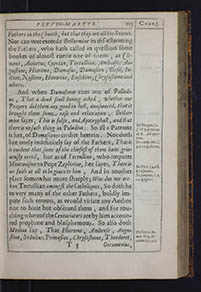 PSEVDO-MARTYR.
113
Chap. 3.
PSEVDO-MARTYR.
113
Chap. 3.
Fathers in the Church, but that they are all his Sonnes.
Nor can wee exceede Bellarmine in dis-esteeming
the Fathers, who hath called in question some
bookes of almost euerie one of them, as Cle-
ment, Anicetus, Cyprian, Tertullian, Ambrose, Au-
gustine, Hierome, Damasus, Damascen, Basil, Iu-
stine, Nyssene, Honorius, Eusebius, Chrysostome and
others. And when Damascene cites out of Palladi-
us, That a dead scull beeing asked, whether our
Prayers did them any good in hell, aunswered, that it
brought them some ease and relaxation, Bellar-
mine sayes, This is false, and Apocryphall, and that
there is no such thing in Paladius:De Purgat. l. 2.
C. 18 §. preterea.
& §. Ad quar-
tum. So ill a Patrone
is hee, of Damascenes credite heerein. Nor doth
hee onely indefinitely say of the Fathers, That it
is euident that some of the chiefest of them haue De verbo Dei. l.
3. c. 10. §. dicens. grie-
uously erred, but as of Tertullian, who imputes
Montanisme to Pope Zephirine, hee sayes,De Pont. l. 4. c. 8.
§. respondeo.
De penitent. l. 1.
c. 1. §. igitur. There is
no faith at all to be giuen to him, And in another
place somewhat more sharply; Wee doe not rec-
kon Tertullian amongst the Catholiques, So doth he
to very many of the other Fathers, boldly im-
pute such errours, as would vitiate any Author
not to haue but obserued them, and for tou-
ching whereof the Centuriators are by him accoun-
ted prophane and blasphemous. So also doth
Medina say,De Sacro. ho-
min. Orig. &
contin. l. 1. a. 5. That Hierome, Ambrose, Augu-
stine, Sedulius, Primasius, Chrysostome, Theodoret, T3 Oecumenius, 114
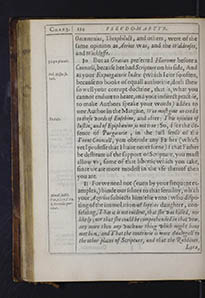 Chap. 3.
114
PSEVDO-MARTYR.
Chap. 3.
114
PSEVDO-MARTYR.
Oecumenius, Theophilact, and others, were of the
same opinion as Aerius was, and the Waldenses,
and Wickliffe. 10 But as Gratian preferred Hierome before a 36. q. 2. placuit.
Councell, because hee had Scripture on his side, And
as your Expurgatorie Index (which I cite so often,Ind. Hispa fo.
146.
because no booke of equall authoritie, doth shew
so well your corrupt doctrine, that is, what you
cannot endure to heare, and your indirect practise,
to make Authors speake your words) addes to
one Author in the Margine, Wee must giue no credit
to these words of Eusebius,Fo. 147. and after; This opinion of
Iustin, and of Epiphanius, is not true: So, if for the de-
fence of Purgatorie, in the full sense of the
Trent Councell, you obtrude any Father (which
yet I professe that I haue neuer seene) if that Father
be destitute of the support of Scripture, you must
allow vs, some of that libertie which you take,
since we are more modest in the vse thereof then
you are. 11 For we need not (euen by your frequent ex-
amples,) binde our selues to that seruility, which
your Azorius subiects himselfe vnto:Moral. Instit.
Par. 1. l. 11. C. 14.
§. Secundo quæ-
ritur. who dispu-
ting of the immolation of Iepthes daughter, con-
fessing, That it is not euident, that she was killed, nor
likely; nor that she could be comprehended in that vow,
any more then any vncleane thing which might haue
met him, and That the contrarie is more Analogall to
the other places of Scripture, and that the Rabbines, Lyra, 115
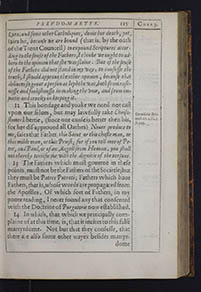 PSEVDO-MARTYR.
115
Chap. 3.
PSEVDO-MARTYR.
115
Chap. 3.
Lyra, and some other Catholiques, denie her death, yet,
saies he, because we are bound (that is, by the oath
of the Trent Councell) to expound Scriptures accor-
ding to the sense of the Fathers, I thinke we ought to ad-
here to the opinion that she was slaine. But if the sense
of the Fathers did not stand in my way, to confesse the
truth, I should approue the other opinion, because that
deliuers so great a person as Iephthe was, both from rash-
nesse and foolishnesse in making the vow, and from im-
pietie and cruelty in keeping it. 12 This bondage and yoake we need not cast
vpon our selues, but may lawfully take Chriso-
stomes libertie,De militia spiri-
tuali Ho. 4. To. 5.
fo. 209. (since our cause is better then his,
for hee dis-approued all Oathes) Neuer produce to
me, saies that Father, this Saint or this chaste man, or
this milde man, or this Priest; for if you tell mee of Pe-
ter, and Paul, or of an Angell from Heauen, you shall
not thereby terrifie me with the dignitie of the persons. 13 The Fathers which must gouerne in these
points, must not be the Fathers of the Societie; but
they must be Patres Patrati; Fathers which haue
Fathers; that is, whose words are propagated from
the Apostles. Of which sort of Fathers, in my
poore reading, I neuer found any that consented
with the Doctrine of Purgatorie now established. 14 In which, that which we principally com-
plaine of at this time, is, that it incites to this false
martyrdome. Not but that they confesse, that
there are also some other wayes besides martyr-
dome 116
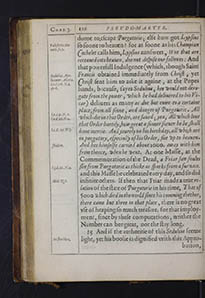 Chap. 3.
116
PSEVDO-MARTYR.
dome to escape Purgatorie; else how got Lypsius
Chap. 3.
116
PSEVDO-MARTYR.
dome to escape Purgatorie; else how got Lypsius
so soone to heauen?Palestrita Ho-
noris fo. 1. for as soone as his Champian
Cochelet calls him, Lypsius aunswers, Wee that are
receaued into heauen, doe not despise our fellowes: And
that powerfull Indulgence (which, though Saint
Francis obtained immediately from Christ,Sedulius Apo-
lo. contr. Alcora.
l. 1. C. 16. N. 4.
& 6. yet
Christ sent him to aske it againe, at the Popes
hands, because, sayes Sedulius, hee would not dero-
gate from the power, which he had deliuered to his Vi-
car) deliuers as many as doe but come to a certaine
place, from all sinne, and danger of Purgatorie. All l. 2. cC. 9. N. 1.
which die in that Order, are saued;l. 2. C. 11. N. 4. yea, All which loue
that Order hartily, how great a sinner soeuer he be, shall l. 1. C. 19. N. 3.
haue mercie. And yearely on his birthday, all which are
in purgatory, especially of his Order, flie vp to heauen.
And hee himselfe carried aboue 1000. away with him
from thence,Ibidem. when he went. At one Masse, at the
Commemoration of the Dead, a Friar saw soules
flie from Purgatorie as thicke as sparks from a furnace.l. 3. C. 21. N. 4.
and this Masse he celebrated euery day, and so did
infinite others.Ibid. N. 7. If then that Friar made a true re-
lation of the state of Purgatorie in his time, That of
5000 which died in the world since his comming thether,
there came but three to that place, there is no great
vse of heaping so much treasure, for that imploy-
ment, since by these computations, neither the
Number can bee great, nor the stay long. 15 And if the authoritie of this Sedulius seeme
light,In fine libri. yet his booke is dignified with this Appro-
bation, 117
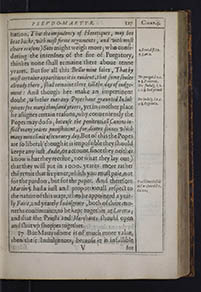 PSEVDO-MARTYR.
117
Chap. 3.
bation, That the impudency of Heretiques, may bee
PSEVDO-MARTYR.
117
Chap. 3.
bation, That the impudency of Heretiques, may bee
beat backe, with most firme arguments, and with most
cleare reasons) Soto might weigh more;4. Sent. dist. 19.
q. 3. ar. 2. who consi-
dering the intensnes of the fire of Purgatory,
thinkes none shall remaine there aboue tenne
yeares. But for all this Bellarmine saies, De purgat. l. 2. c.
9. §. Preterea. That by
most certaine apparitions it is euident, that some soules
already there,De Indulg. l. 2.
c. 2. §. Sed primū shall remaine there till the day of iudge-
ment: And though hee make an impertinent
doubt,De Indulg. l. 1. c.
9. §. Respontio. Whether euer any Popes haue graunted Indul-
gences for many thousand yeares, yet in another place
he assignes certain reasons, why conueniently the
Popes may do so; because the penitentiall Canons in-
flict many yeares punishment, for diuers sinnes which
many men cōmit often euery day. But of this the Popes
are so liberal (though it is impossible they should
keepe any iust Audit, or account since they neither
know what they receiue, nor what they lay out)
that they will put in 1000. yeares more rather
thē remit that six pence, which you must paie, not
for the pardon, but for the paper.Turselinus Iesuit
Histor. laurel. l. 1.
Ca. 22. And therefore
Martin 5. had a iust and proportionall respect to
the nature of this ware, when he appointed a year-
ly Faire, and yearely Indulgence, both of three mo-
neths continuance, to be kept together at Loretta;
and that the Priests and Merchants should open
and shut vp shoppes together. 17 But Martyrdome is of much more value,
then these Indulgences, because it is infallible V for 118
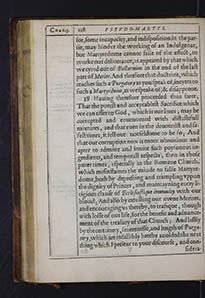 Chap. 3.
118
PSEVDO-MARTYR.
Chap. 3.
118
PSEVDO-MARTYR.
for, some incapacity, and indisposition in the par-
tie, may hinder the working of an Indulgence,
but Martyredome cannot faile of the effect, to
worke our deliuerance, as appeared by that which
we cyted out of Bellarmine in the end of the last
part of Merite. And therfore that doctrine, which
teaches such a Purgatory as you speak of, incytes to
such a Martyrdome, as we speake of, & disapproue. 18 Hauing therefore proceeded thus farre,
That the purest and acceptablest Sacrifice which
we can offer to God, which is our liues, may be
corrupted and enuenomed with distastefull
mixtures, and that euen in the deuotedst and sa-
fest times, it fell out, not seldome to be so; And
that our corruption now is more obnoxious and
apter to admitte and inuite such poysonous in-
gredients, and temporall respects, then in those
purer times, especially in the Romane Church,
which misinflames the minde to false Martyre-
dome, both by depressing and trampling vppon
the dignity of Princes, and maintayning euery li-
tigious clause of Ecclesiastique immunity with our
blood; And also by extolling our owne Merites,
and encouraging vs thereby, to trafique, though
with losse of our life, for the benefit and aduance-
ment of the treasury of that Church; And lastly
by the certainety, seuerenesse, and length of Purga-
tory, which are infallibly hereby auoided: the next
thing which I present to your discourse, and con-
sidera- 119
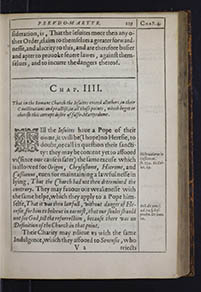 PSEVDO-MARTYR.
119
Chap. 4.
sideration, is, That the Iesuites more then any
o-
PSEVDO-MARTYR.
119
Chap. 4.
sideration, is, That the Iesuites more then any
o-ther Order, claim to themselues a greater forward-
nesse, and alacrity to this, and are therefore busier
and apter to prouoke seuere lawes, against them-
selues, and to incurre the dangers thereof. Chap. IIII. That in the Romane Church the Iesuites exceed all others, in their
Constitutions and practise, in all those points, which beget or
cherish this corrupt desire of false-Martyrdome.
TIllTill the Iesuites haue a Pope of their
owne, it will be (I hope) no Heresie, to
doubt, or call in question their sancti-
ty: they may be content yet to affoord
vs (since our cause is safer) the same excuse which
is allowed for Origen, Chrysostome, Hierome, and Obseruationes in
Cassianum.
fo. 739. Ex Col-
lat. 19.
Cassianus, euen for maintaining a lawfulnesse in
lying, That the Church had not then determined the
contrary. They may fauour our weakenesse with
the same helpe, which they apply to a Pope him-
selfe,Bell. de pont. l.
4. C. 14. §. Res-
pondeo. De Ioan.
22. That it was then lawfull, without danger of He-
resie, for him to beleeue in earnest, that our soules should
not see God, till the resurrection, because there was no
Definition of the Church in that point. Their Charity may relieue vs with the same
Indulgence, which they affoord to Senensis, who V2 reiects 120
 Chap. 4.
120
PSEVDO-MARTYR.
Chap. 4.
120
PSEVDO-MARTYR.
reiects some part of the Canonicall Scripture, af-
ter the determination of the Trent Councel, Because
he did not reach and attaine to the force of that Canon,
saies Gretzer,Gretzer defens.
Bellar. To. 1. fo.
362. §. Namquod who allowes him all these escapes,
That he did it either by negligence, inconsideration, a
foreconceiu'd perswasion, or some other cause, which is
large enough. 2 But if euer a Iesuite come to be the Church,
that is, the Pope, we shall soone be precluded by
the Churches Definitions. And as now to doubt
whether the Pope without a Councell,Bell. de Pont. l. 1.
c. 2 §. Ex his. may
teach an Heresie, is Hæresi proximum, and so is Semi-
hæreticum, when a Iesuite is Pope, it will be Hyper-
hæreticum, and Sesqui-hæreticum: for we haue beene
already taught, that something may be more then
heresie, when by a new Decretall of Paul the fourth,
they say,In septimo. l. 5. tit
3. c. 9. That any great person falling into Heresie or
Schisme, shall for the first offence be esteemed relapsed,
and be in the same desperate state, as if he had formerly
iuridically abiurd the same heresie. At least, when a Ie-
suite comes to that Throne, as in this last volume
of the Canon law,In septimo tit. 4. we haue a new title presented,
De Cardinalibus, which was in none of the rest,
where they are call'd,Ibid. ca. 3. The principall members of the
Church, constituted by the holy Ghost, And the most noble
part of the Popes body, And the clearest lights, and most
speciall children of the Church;Ibid. c. 2. where, to take any thing
from them is called Sacrilege, and to fauour any
which hath dis-fauoured them,Ibid. c. 3. or hurt them, is 121
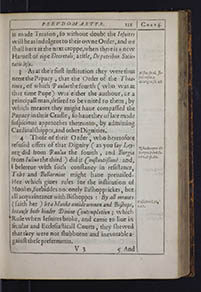 PSEVDO-MARTYR.
121
Chap. 4.
PSEVDO-MARTYR.
121
Chap. 4.
is made Treason, so without doubt the Iesuites
will be as indulgent to their owne Order, and we
shall haue at the next croppe, when there is a new
Haruest of ripe Decretals, a title, De patribus Socie-
tatis Iesu. 3 As at their first institution they were thus
neere the Papacy,Histor. Ordi. Ie-
suit resut. a
Gretzero. fo. 45. that the Order of the Thea-
tines, of which Paulus fourth (who was at
that time Pope) was either the authour, or a
principall man, desired to be vnited to them, by
which meanes they might haue compassed the
Papacy in their Cradle, so haue they of late made
suspicious approaches thereunto, by admitting
Cardinal shippes, and other Dignities. 4 Those of their Order, who heretofore
refused offers of that Dignity (as you say Lay-
nez did from Paulus the fourth,Ribadeneyra de
Scripto. Iesuit. fo.
100. & fo. 60. and Borgia
from Iulius the third) did it Constantissime: and,
I beleeeue with such constancy in resistance,
Tolet and Bellarmine might haue preuailed.
Hee which giues rules for the institution of
Monkes, forbiddes not onely Bishopprickes, but
all acquaintance with Bishoppes: By all meanes
(saith hee) let a Monke auoide women and Bishops,Cassianus l. 11.
c. 17.
because both hinder Diuine Contemplation; which
Rule when Iesuites broke, and came to liue in
secular and Ecclesiasticall Courts, they shewed
that they were not stubborne and inexorable a-
gainst these preferments. V3 5 And 122
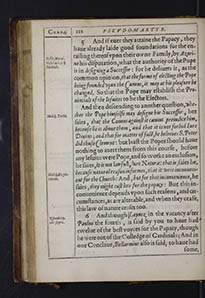 Chap. 4.
122
PSEVDO-MARTYR.
5 And if euer they attaine the Papacy, they
Chap. 4.
122
PSEVDO-MARTYR.
5 And if euer they attaine the Papacy, they
haue already laide good foundations for the en-
tailing thereof vpon their owne Family,Instit. Moral.
to. 2. l. 4. C. 5. §
Secundo. by Azori-
us his disputation, what the authority of the Pope
is in designing a Successor: for he deliuers it, as the
common opinion, that the forme of electing the Pope
being founded vpon the Canons, it may at his pleasure be
changed. So that the Pope may establish the Pro-
uincials of the Iesuites to be the Electors. And then descending to another question, whe-
ther the Pope himselfe may designe his Successor,Ibid. §. Tertio. hee
saies, that the Canons against it cannot preiudice him,
because he is aboue them, and that it is not forbid Iure
Diuino; and that for matter of fact, he beleeues S. Peter
did chuse Clement: but least the Popes should haue
nothing to auert them from this course, before
any Iesuite were Pope, and so worke an exclusion,
he saies, It is not lawfull, Iure Naturæ: that is, saies he,
because natural reason informes,Ibid. §. Ex plo-
ratum. that it were inconueni-
ent for the Church: And, but for that inconuenience, he
saies, they might cast lots for the papacy: But this in-
conuenience depends vpon such reasons, and cir-
cumstances, as are alterable, and when they cease,
this law of nature ceases too. Ribadeney.
vbi supra. 6 And though Laynez in the vacancy after
Paulus the fourth, is said by you to haue had
twelue of the best voyces for the Papacy, though
he were out of the Colledge of Cardinals; And in
one Conclaue, Bellarmine also is said, to haue had some, 123
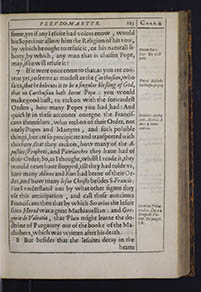 PSEVDO-MARTYR.
123
Chap. 4.
PSEVDO-MARTYR.
123
Chap. 4.
some, yet if any Iesuite had voices enow, would
his Superiour allow him the Religion of his vow,
by which he ought to refuse it,Cerem: Sacr.
Cap. De elect
pont. or his naturall li-
berty, by which, any man that is chosen Pope,
may, if he will refuse it? 7 If it were once come to that, as you are con-
tent yet, to seeme as modest as the Carthusian, who
saies,Petrei Biolioth.
Carthusia. fo 304 that he beleeues it to be a singular blessing of God,
that no Carthusian hath beene Pope: you would
make good hast, to reckon with the forwardest
Orders, how many Popes you had had: And
quickly in these accounts ouergoe the Francis-
cans themselues,Sedulius Apolog
cont. Alcora. l. 2
c. 11. § Inno-
centius. who reckon of their Order, not
onely Popes and Martyres, and such possible
things, but are so precipitate and transported with
this fury, that they reckon, how many of the A-
postles, Prophets, and Patriarches they haue had of
their Order; So, as I thought, whilst I reade it, they
would neuer haue stopped, till they had tolde vs,
how many Adams and Eues had beene of their Or-
der, and how many Iesus Christs besides S. Francis:
For I vnderstand not by what other figure they
vse this anticipation, and call these auncients
Franciscans then that by which Serarius the Iesuit
saies Herod was a great Machiauellian:Serarius. Tribæ-
res. l. 2. Cap. 24
Grego. de Va-
lent. De purgat.
C. 8. and Gre-
gorie de Valentia, that Plato might learne the do-
ctrine of Purgatory out of the booke of the Ma-
chabees, which was written after his death. 8 But besides that the Iesuites decay in the hearts 124
 Chap. 4.
124
PSEVDO-MARTYR.
Chap. 4.
124
PSEVDO-MARTYR.
hearts of Princes (which Philip the second of
Spaine testified well,Pierre Ma-
thieu Histoire
de France. l. 1.
Narrat. 4. because though he had great
vse of their seruice, hee neuer did any thing for
them) this also makes me doubt that they will
neuer haue Pope, because it is already reueil'd by
Christ to S. Francis:Sedulius. Apol.
l. 2. c. 12. n. 8. that Antichrist shall come out of
the family of the Franciscans. 9 This also encreases my suspicion, that they
could neuer compasse, that which is much lesse
then a Pope,Catalog Glor.
Par. 4. Consid. 7. which is a Saint, in their family. For
the Authority of the Pope is greater, then of a Saint, sayes
Cassanæus: And in his Indulgences he doth as fa-
miliarly command Angels, as the yonger Pren-
tizes, the Exorcists, do deuils: To whom they vse
this language, when any spirit possesses a body,
I command Lucifer,Menghi. Flagell.
Dæmon. fo. 9. and all the Furies in hell, to preci-
pitate you into hell fire presently, indispensably and e-
ternally, till the day of iudgement:Ide. fol. 105. And I forbid the
Ayre to haue any power to receiue you. Mat. Tortus su-
pra la Lettera
di Palmieri Ro-
mito. Raccolta.
fol. 126. 10 And though Tortus say, That the time of
the Canonizing of the founder of that Order is not yet
pass'd, and therefore hee may bee Canonized in
good time (which is a poore comfort, since I ne-
uer found any such limitation, nor that a Saint
apparant, as Ignatius is, may be superannated, and
grow too old to bee Canoniz'd) yet since those
two great Princes, Philip the second of Spaine, and
Henry the fourth of France, either out of deuoti-
on to the Order, or for their owne ends, haue both 125
 PSEVDO-MARTYR.
125
Chap. 4.
PSEVDO-MARTYR.
125
Chap. 4.
both pretended the solicitation of Ignatius his ca-
nonizing to belong to them, and both affected
the honour of procuring it, the pursuite and effe-
cting thereof hath beene intermitted and retar-
ded. And howsoeuer for Ignatius and for Xaueri-
us, who was also a Nauarrois as well as Ignatius,
it might please those Princes, for respect to one
another to forbeare any solicitation in their be-
halfes, yet the King of Spaine had very many sub-
iects in that Order, to whom no other Prince
pretended any such precontract or interest: and
yet he procur'd the canonization of D'Alcala a
Franciscane,Pierre Mathieu.
Histoire de fran.
l. 1. Nar. 4. and Pennafort a Iacobin, and neglected
the Iesuites. And though the present Pope Paulus
the fift, haue beene much solicited for the Cano-
nizing of Gonzaga the Iesuite by the Princes of
that Family (the memory of his exempler life be-
ing yet fresh,Ceparius de vita
Gonzag. Epist.
Dedic. and his worthinesse certified (as the
custome is in preparing Canonization) by Car-
dinals which had commission to search therinto)
yet he hath allowed him no other title then Bea-
tus: which might haue beene giuen him with-
out that Rescript of the Pope, as Ignatius and ma-
ny other haue it: since, as Serarius saies,Litan eut. l. 2. q. 7 Custome
giues that Title to those, of whose saluation there is a
strong opinion, and yet are not adorned with the pub-
lique testimony of the Church. 11 Nor doe I perceiue that they are in any
great forwardnesse, to get a Saint, since in canoni-
X zings 126
 Chap. 4.
126
PSEVDO-MARTYR.
zings after the consideration of the truth of the
Chap. 4.
126
PSEVDO-MARTYR.
zings after the consideration of the truth of the
miracles, they fall in the Consistory to another
consideration, of the sufficiency of them. And
besides that,De procurand.
Indo. Salut. l. 2.
c. 9. your own Acosta makes vs doubt of
the truth of those miracles, which are related, be-
cause he spends a Chapter in giuing reasons, why
in our age, in preaching the Gospell in the Indies,
there is not that strength of miracles, which was
in the primitiue Church, since, as he saies there, It
would preuaile very much, if it might be, those which
are said to be done by you, are for the most part
so poore and beggerly, and silly things in respect
of the Franciscans, as betweene yours and theirs
there is as much difference, as betweene Iugling
and Coniuring. 12 Me thinks you should offer no more to
plaie at that game, after you haue beleeued (as I
hope you doe, since so fresh, and so well approo-
ued an author as Sedulius giues new life to these
miracles) That S Anthony when the heretiques refu-
sed to heare him preach,Sedul. Apol. l. 3.
c. 13. Nu. 8. went to the Sea side, called the
fish, which came of all sorts, staide in peace, put their
heads aboue water to hearken, and at the end of the Ser-
mon, some spoke,Idem. l. 3. C.
28. Nu. 30. and some did but bow their heads, and
so the Heretiques were conuerted: or that Frier An-
drew to correct his appetite of eating birds, at the
Table, by the signe of the Crosse, commanded them to flie
away, though they were rosted. 13 And how much more luxuriant of Mira-
cles 127
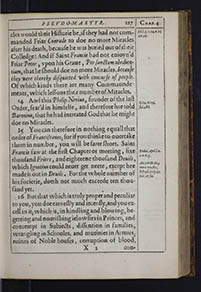 PSEVDO-MARTYR.
127
Chap. 4.
cles would their Historie be,Id. l. 3 c. 24. n. 25
PSEVDO-MARTYR.
127
Chap. 4.
cles would their Historie be,Id. l. 3 c. 24. n. 25
26. 27. if they had not com-
manded Friar Conrade to doe no more Miracles
after his death, because he was buried out of their
Colledge: And if Saint Francis had not enioyn'd
Friar Peter, vpon his Graue, Per sanctam obedien-
tiam, that he should doe no more Miracles, because
they were thereby disquieted with concurse of people.
Of which kinds there are many Commaunde-
ments, which lessons their number of Miracles. 14 And this Philip Nerius, founder of the last
Order,Vita. Nerij.
fol. 488. fear'd in himselfe, and therefore hee told
Baronius, that he had intreated God that he might
doe no Miracles. 15 You can therefore in nothing equall that
order of Franciscanes; for if you thinke to ouertake
them in number, you will be farre short. Saint
Francis saw at the first Chapter or meeting,Sedul. Apol. l. 2.
c. 2. n. 3. sixe
thousand Friers, and eighteene thousand Deuils,
which Ignatius could neuer get neere,An. 1608. they
were 10581.
Ribad. scrip. Ie-
suit. in fin. except hee
made it out in Deuils. For the whole number of
his societie, doeth not much exceede ten thou-
sand yet. 16 But that which is truly proper and peculiar
to you, you doe earnestly and intensly, and you ex-
cell in it; which is, in kindling and blowing, be-
getting and nourishing ielowsies in Princes, and
contempt in Subiects, dissention in families,
wrangling in Schooles, and mutinies in Armies;
ruines of Noble houses, corruption of blood, X2 con= 128
 Chap. 4.
128
PSEVDO-MARTYR.
Chap. 4.
128
PSEVDO-MARTYR.
confiscation of States, torturing of bodies, and
anxious entangling and perplexing of conscien-
ces. And to facilitate your way to these effects,
you are in your institution mixt and complexio-
ned of all Elements, and you hange betweene
Heauen and Earth, like Meteors of an ominous
and incendiarie presaging. You pretend to for-
sake the world, and to looke all vpward; But,
saith Cassianus, Such renunciation is threefold; Of all
temporall fortunes, and of our maners and conditions,
and of our minds from all present things. But all your
labour is to vnderstand the present state of King-
domes, and where any ouerture is giuen for the
Popes aduantage, and where any interposition or
hinderance is interiected against his purposes.
And therefore that saying of Saint Basil to a Sena-
tour,Cassian. l. 7. c. 19. that seem'd to renounce the world, and yet
retain'd part of his state, Thou hast spoyled a Sena-
tour, and hast not made a Monke, belongs almost to
all of this Order. For you are but as Eunuches;
you haue lost your apprehension and capacitie
of worldly Estates, yet the lust, and itche, and
concupiscence, to be conuersant therein, remaines
with you still. Iesuitar. regula
Commu. Cap.
Examinator. 17 For this purpose you haue care in admissi-
ons, That none be receiued whose Parents bee poore,
(which your Examiner hath in charge) least that
should diuert them from the integritie of this
seruice. For this purpose it is, That the Superiour himselfe 129
 PSEVDO-MARTYR.
129
Chap. 4.
PSEVDO-MARTYR.
129
Chap. 4.
himselfe cannot dispence to admit any deformed person, Regulae Prouin-
cial. 56.
because you will haue men sociable, acceptable,
and agreeable to companie. For this purpose
your Superiours and Rectors must write euery weeke
to the Prouinciall, Cap. de formula
scribendi. not onely of their owne state, but of
all things done amongst strangers, by the seruice of this
societie. For this purpose you must haue a Proctor ge-
nerall at Rome, Cap pro curator
Gener. who must buy and studie all the Rules
of that Chancerie, and all the Breues, and Buls, which
the Popes send forth.Pier. Mathieus.
histoire de Fran.
To. 2. l. 7. Nar. 4. And to this purpose was that
attempt of the Iesuite, who (if a Catholicke Hi-
storiographer relate truely) published at Rome,
That Confession by letters was Sacramentall and effe-
ctuall. Into which opinion thoughaa Vide Soto de
teg. Secret.
memb. 3. q. 4.
Dub. 4. &
Zambran. Cas.
Consci. cap. 4.
de pœnit. Dub.
2. Sect. 5. vbi
etiam est hoc
Decretum Clem.
8. Nu. 31. some before
had straied, yet it had receiued no such strength
and authority as at that time, when it was so
hotly pursued, that Clement 8. was forced to op-
pose a direct Decree against it, and to condemne it as
false, rash, and scandalous at least. For if this opinion
had beene beleeued and authorized, the secrets of
all states, and passages of all Courts, had had no
other Register then the breasts of Iesuites; who
are so wise Apothecaries of penances, and haue so
plentifull shops of those druggs of Indulgencies,
that all those Princes, to whom any of them had
beene Confessor, would neither open their di-
sease, nor seeke their physicke at any other place:
when they might be deliuered of the painefullest
part of Confession, which is the personall shame
of accusing ones selfe. X3 18 And 130
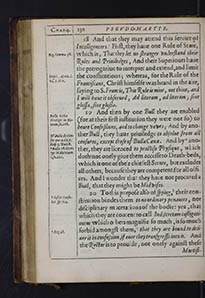 Chap. 4.
130
PSEVDO-MARTYR.
18 And that they may attend this seruice of
Chap. 4.
130
PSEVDO-MARTYR.
18 And that they may attend this seruice of
Intelligencers: First, they haue one Rule of State,
which is,Reg. Commu. 38. That they let no stranger vnderstand their
Rules and Priuiledges, And their Superiours haue
the prerogatiue to interpret and extend, and limit
the constitutions;Sedul. Apolo. l.
2. C. 3. N. 2. whereas, for the Rule of the
Franciscans, Christ himselfe was heard in the aire,
saying to S. Francis, This Rule is mine, not thine, and
I will haue it obserued, Ad literam, ad literam, sine
glossa, sine glossa. Bulla tertia
Gretzer in Ha-
teum. fo. 168. 19 And then by one Bull they are enabled
(for at their first institution they were not so) to
heare Confessions, and to change vowes; And by ano-
ther Bull,D'Auila de Cen-
sur. par. 2. Ca. 7.
Disp 3. Dub. 8. they haue priuiledge to absolue from all
censures, except those of Bulla Caenæ. And by a ano-
ther, they are licenced to practise Physique, which
doth not onely giue them accesse to Death-beds, a Bulla 18. Gret-
zer in Hatteum.
l. fo. 211.
which is one of their chiefest Scenes, but excludes
all others, because they are competent for all offi-
ces. And I wonder that they haue not procured a
Bull, that they might be Midwifes. 20 To this purpose also of spying,bb Iesuit Consti-
tut spirit. 4. their con-
stitution bindes them to no ordinary penances, nor
disciplinary macerations of the bodie: yea, that
which they are content to call Indiscretam castigati-
onem, which others magnifie so much, is so much
forbid amongst them,cc Reg. 48. that they are bound to deli-
uer it in confession, if euer they transgresse into it. And
the Rector is to prouide, not onely against these Mortifi- 131
 PSEVDO-MARTYR.
131
Chap. 4.
PSEVDO-MARTYR.
131
Chap. 4.
Mortifications, but dd Reg. Com. ca.
Rector reg. 8. against too much Deuotion, as
Impediments which call them from their studies And the
charge which is giuen to him who is president o-
uer their spirituall matters, is to see, ee Cap prefect.
Rer. spirit. That whilst
they haue too much desire of Deuotion, they doe not im-
paire their strength: and therefore that Gonzaga of f Cepari Iesuit.
de vita Gonzag.
fo. 58. & sæpe.
whom it is often f said in his life, that hee shortned
his life with such discipline, g laying sharpe chips be-
tweene his sheetes, g Fo. 84. h whipping himselfe with Iron
chaines, h Fo. 83. and i putting spurres betweene his Dublet and
his flesh, i Fo. 84. before he came into the Rules of the Ie-
suites; wonne, and ouercame his Father and Mo-
ther, to encline to his purpose of entring this Or-
der, because they sawe, k k Fo. 154. That this Order would be
wholsome for his body, and not allow him such seuerity. 21 For priuiledges of Addition, they haue by
l l Bulla. 13. Gretz
fo. 195. one Bull all the immunities of the Mendicants, which
are very many and aduantageous, because thereby
they must be receiued, as they trauell into any re-
ligious house: And by aa Bull. 17. Gretz
fo. 207. another Bull, at one libe-
ralitie, the priuiledges of all Orders, are extended to
them. 22 And for Exemptions, they are deliuered by b Bull. 15. fo. 197.
b one Bull from keeping their howres in the Chappell;
and by c c Bull. 19 f. 217. another from attending at Procession: and
by d d Bull. 7. fo. 186. another dispenced from fastes, and forbidden
meates: and by their e e Repro-
uincial. 84. Rule bound to no habite: and
by f another Bull, licensed to read all bookes; which
is so great a libertie in that Church, that in the f Bull. 16. fo. 198 Septimes, 132
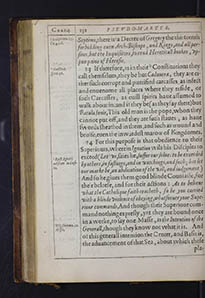 Chap. 4.
121132
PSEVDO-MARTYR.
Chap. 4.
121132
PSEVDO-MARTYR.
Septims, there is gg In septimo. l. 5.
Tit. 4. c. 6. a Decree of Gregory the thirteenth
forbidding euen Arch-Bishops, and Kings, and all per-
sons, but the Inquisitors, to read Hereticall bookes, vp-
pon paine of Heresie. 23 If therefore, as in their hh Constitut.
spirit. 36. Constitutions they
call themselues, they be but Cadauera, they are ei-
ther such corrupt and putrified carcasses,as insect
and enuenome all places where they reside, or
such Carcasses, as euill spirits haue assumed to
walk about in: and if they be (as they say there) but
Bacula senis, This old man is the pope, whon they
cannot put off, and they are such staues, as haue
swords sheathed in them, and such as wound and
bruise, euen the inwardest marow of Kingdomes. 24 For this purpose is that obedience to their
Superiours, wherein Ignatius wils his Disciples to
exceed (Let ii Epist. Ignatij
ad fratr in Lusi-
ta. vs, saies he, suffer our selues to be exceeded
by others, in fastings, and in watchings, and such; but let
our marke be, an abdication of the will, and iudgement.)
And so he giues them good blinde Counsaile, for
their beleefe, and for their actions: As to beleeue
what the Catholique faith teacheth, so be you carried
with a blinde violence of obeying, whatsoeuer your Supe-
riour commands. And though their Superiour com-
mand nothing expresly, yet they are bound once
in a weeke, to say one Masse, to the Intention of the
Generall,Reg. Commu. ca.
Missa. though they know not what it is. And
of this generall intention the Center, and Basis is,
the aduancement of that Sea, about which these pla= 133
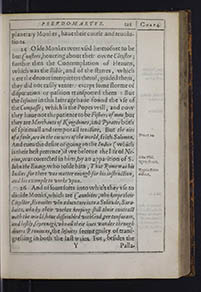 PSEVDO-MARTYR.
133
Chap. 4.
PSEVDO-MARTYR.
133
Chap. 4.
planetary Monkes, haue their course and reuolu-
tions. 25 Olde Monkes were vsed heretofore to be
but Coasters, houering about their owne Cloyster;
further then the Contemplation of Heauen,
which was the Bible, and of the starres, which
were the deuout interpreters therof, guided them,
they did not easily venter: except some storme of
disputation or passion transported them: But
the Iesuites in this laterage haue found the vse of
the Compasse; which is the Popes will, and now
they haue not the patience to be Fishers of men, but
they are Merchants of Kingdomes, and Pyrates both
of spirituall and temporall treasure. But the eies
of a foole,Pro. 17. 24. are in the corners of the world, saith Salomon.
And euen the desire of going to the Indies (which
is their best pretence) if we beleeue the life of Ne-
rius, was corrected in him,Vita Phil.
Nerij fo. 110. by an apparition of S.
Iohn the Euang. who tolde him, That Rome was his
Indies, for there was matter enough for his instruction, Regula Bene-
dict. c. 1.
and his example to worke vpon. 26 And of foure sorts into which they vse to
diuide Monks, which are Caenobites, who keepe their
Cloyster, Eremites who aduenture into a Solitude, Sara-
baits, who by their workes keeping still their contract
with the world, haue dissembled with God, per tonsuram,
and lastly, Gyrouagi, who all their liues wander through
diuers Prouinces, the Iesuites seeme guilty of trans-
gressing in both the last waies. For, besides the Y Palla= 134
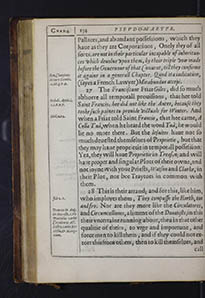 Chap. 4.
134
PSEVDO-MARTYR.
Chap. 4.
134
PSEVDO-MARTYR.
Pallaces, and abundant possessions, which they
haue as they are Corporations, Onely they of all
sorts, are not in their particular incapable of inheritan-
ces which deuolue vpon them, by their triple vow made
before the Gouernour of that Conuent, till they confirme
it againe in a generall Chapter.Ren. Choppinūs
de iure Cœnobi.
.2. tit. 3. n. 9. Quod ita iudicatum,
(sayes a French Lawyer) Mirabundus accepi. 27 The Franciscane Friar Giles, did so much
abhorre all temporall prouisions,Seduli. Apolo. l.
2. c. 6. n. 7. that hee told
Saint Francis, hee did not like the Antes, because they
tooke such paines to prouide victuals for Winter. And
when a Friar told Saint Francis,Ibid. n. 14. that hee came, A
Cella Tuâ, when he heard the word Tuâ, he would
lie no more there. But the Iesuites haue not so
much deuested themselues of Proprietie, but that
they may haue proprietie in temporall possession:
Yea, they will haue Proprietie in Treason; and will
haue proper and singular Plots of their owne, and
not ioyne with your Priests, Watson and Clarke, in
their Plot, nor bee Traytors in common with
them. 28 This is their arrand; and for this, like him,
who imployes them,Iob 2.2. They compasse the Earth, too
and fro. Nor are they more like the Circulatores,
and Circumcelliones,Danæus in Aug.
de Hæresib. c. 69
Prateolus verbo
Circuitores Alf.
Castro. verbo Ec-
clesia, & Marty-
rium. a limme of the Donatists, in this
their vncertaine running about, then in that other
qualitie of theirs, to vrge and importune, and
force men to kill them, and if they could not ex-
tort this from others, then to kill themselues, and call 135
 PSEVDO-MARTYR.
135
Chap. 4.
PSEVDO-MARTYR.
135
Chap. 4.
call all this Martyrdome. For onely of this vici-
ous inclination of Iesuits to an imaginarie Mar-
tyrdome, I purpos'd to speake in this Chapter;
but that being occasioned by the way, to deale
with men of a various vncertaine Constitution
and Nature, I haue taken part of their fault, and
as a Phisitian comming to cure, sometimes receiues
some of the Patients infection, so speaking of
their running and wandring, I haue strayed some-
what from the directnesse, and strictnesse of my
purpose. 29 Therefore to pursue it now, they are so
much more intemperate and importunate vpon
this Pseudo-Martyrdome, then any others; by how
much they are more seuere maintainers and en-
creasers of those Doctrins of the Roman Church,
which we noted to beget this inclination. For
when the spirit of God awaked certaine Refo-
rmers of his Catholicke Church, of which the Ro-
mane Church had long time beene the head, that
is, the Principall and most eminent, and exemplar
member (for I am euer loth, to seeme to abhorre, or
abstaine from giuing to that Church, any such
Stiles and Titles, as shee is pleas'd and delighted
in, as long as by a pious interpretation thereof,
her desire may thereby be satisfied in some mea-
sure, our Churches not iniur'd nor preiudiced, and
the free spirit of God, which blowes where it
pleaseth, not tied nor imprison'd to any place, or Y2 person) 136
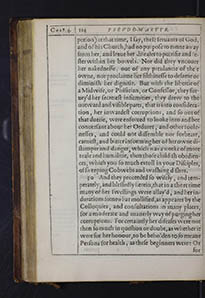 Chap. 4.
124136
PSEVDO-MARTYR.
Chap. 4.
124136
PSEVDO-MARTYR.
person) at that time, I say, these seruants of God,
and of his Church, had no purpose to runne away
from her, and leaue her diseases to putrifie and fe-
ster within her bowels. Nor did they vncouer
her nakednesse, out of any petulancie of their
owne, nor proclaime her filthinesse to defame or
diminish her dignitie. But with the libertie of
a Midwife, or Phisician, or Confessor, they sur-
uey'd her secretest infirmities, they drew to the
outward and visible parts, that is into considera-
tion, her inwardest corruptions, and so out of
that duetie, were enforced to looke into and bee
conuersant about her Ordures, and other foule-
nesses, and could not dissemble nor forbeare,
earnest, and bitter informing her of her owne di-
stemper and danger, which was a worke of more
zeale and humilitie, then those childish obedien-
ces, which you so much extoll in your Disciples,
of sweeping Cobwebs and washing dishes. 30 And they proceeded so wisely, and tem-
perately, and blessedly herein, that in a short time
many of her swellings were allay'd, and her in-
durations somewhat mollified, as appeares by the
Colloquies, and consultations in many places,
for a moderate and manerly way of purging her
corruptions. For certainely her diseases were not
then so much in question or doubt, as whether it
were for her honour, to be beholden to so meane
Persons for health, as these beginners were: Or for 137
 PSEVDO-MARTYR.
125137
Chap. 4.
PSEVDO-MARTYR.
125137
Chap. 4.
for her safetie to trust her selfe in such Phisicians
hands; for now diuers secular Princes were come
to giue their assistance. And as some diseases pro-
duce so violent and desperate Symptomes, as the
Physician must sometime neglect the maine ori-
ginall Disease, and attend onely to cure the Acci-
dents: So, though the Doctrine of Purgatorie,
were at that time no member of the body: That
is, no part of the Catholicke faith, but seru'd that
body onely for Nayles to scrape and scratche toge-
ther, Those spirituall Physicians busied them-
selues much, to paire those Nayles which defa-
ced the beautie and integritie of the whole body,
and so to slacken that griping hold, which they
had taken vpon mens estates and Consciences, by
the terrour of Purgatorie, and vertue of their In-
dulgences. 31 And as to both sides, there appear'd eui-
dently in the Doctrine of Merits, as the Schoole-
men (which then Gouern'd n the Church, by rea-
son of the discontinuance of Councels) had saw-
ced and disguis'd it, many abominations, dero-
gatorie to the Passion of our Blessed Sauiour: So
did they all confesse, in the Doctrine of Purgatory
so many mixtures of coniecturall, incredible, im-
possible fables, as might haue scandaliz'd and
discredited any certaine trueth by their Addition.
But when on the one side, the Reformers encou-
raged by this entrance, thought they might pro-
Y3 ceede 138
 Chap. 4.
138
PSEVDO-MARTYR.
ceede further, and so offered to dissect and anato-
Chap. 4.
138
PSEVDO-MARTYR.
ceede further, and so offered to dissect and anato-mize the whole Church, and thought to fill euery
veine, and restore and rectifie euery Sprane and
dislocation, and to take off euery Mole, and paire
away euery Wemme, and to alter euen the fashi-
on of her clothes, so that all, both substance and
ceremony came in question: And the Romane
Church on the other side, foresaw her precipitati-
on, that if they stop'd not at the toppe, they could
not at the middle of the hill, thought it better not
to beginne, then not to know where to end, and
so mistaking the medicine to be worse then the
disease, departed from further consultation, iusti-
fied their corruptions, and by excommunicati-
ons put away those seruants, which had done
them these offices, and whom now they call Schis-
matiques and Heretiques, for departing from that
Church, which would affoord them, not onely
no wages, but no other roome, then a fire. 32 And then, as all recidiuations and relapses,
are worse then the disease, vpon this relapse, came
the Councell of Trent, which did couer and pal-
liate some of these vlcers, and promised the cure
of the rest, though they neuer went about it yet;
And then the Iesuites, who crie that all there is
health and soundnesse, and that there is none any
where else yea that the Church was borne thus,
and that she is as well, as she was in her Cradle,
and that whatsoeuer she thinkes, or saies, or does is 139
 PSEVDO-MARTYR.
139
Chap. 4.
PSEVDO-MARTYR.
139
Chap. 4.
is by a diuine power, inherent in her; as though
there had beene sowed in her at first certaine
seedes of Iure Diuino, which now in our age, by the
cultiuating, and watering, and industry of the Ie-
suites must fructifie and produce in her, all these
effects. For they will abate nothing; their con-
sciences are as tender and delicate, Baron. Martyro-
lo. 21 Oct. ex
Lindano. as the ground
at Coleyne, where some of S. Vrsulaes eleuen thou-
sand Virgines are buried, which will cast vp againe
in the night, any that is enterred there, except shee were
of that company, though it be a childe newly baptized:
So the Iesuites stomaches cannot indure this, that
the Popes should be great by Priuiledges of Prin-
ces, or Canons of Councels: but all must be Iure
Diuino. So that that note, which the law casts
vpon some Aduocates, will lie heauie vpon the
Iesuites, Par. de puteo.
De Syndic. c. de
excess. Aduocator
nu. 15.They are too carefull of their cause, and therfore
they are presum'd to inuent falshood: 33 For though it be hard for any man to goe
further on the left hand, then the Councell of
Trent hath done, in these two doctrines of Merite
and Purgatrry, and euery Catholique be bound
to that Councell, yet as in most other Doctrines,
so in these also, Pelargus hath noted the Iesuites to
haue gone beyond others, Pelargus de
Nouo Iesuitismoand therefore more
then others, they incite, in these points, to a false
Martyrdome. 34 But as the late inuention of Artillery and
Gunpowder, though it haue much horrour and af- 140
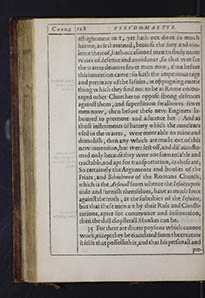 Chap. 4.
128140
PSEVDO-MARTYR.
Chap. 4.
128140
PSEVDO-MARTYR.
affrightment in it, yet hath not done so much
harme, as it threatned, because the fury and vio-
lence thereof, hath occasioned men to study more
waies of defence and auoidance, so that wee see
the warres deuoure fewer men now, then before
this inuention came: so hath the impetuous rage
and pertinacy of the Iesuits, in oppugning euerie
thing which they find not to be at Rome encou-
raged other Churches to oppose strong defences
against them, and superstition swallowes fewer
men now, then before these new Enginers la-
boured to promote and aduance her: And as
those instruments of battery which the auncients
vsed in the warres, were more able to ruine and
demolish, then any which are made out of this
new inuention, but were left off, and dis accusto-
med only because they were not so maniable and
tractable, and apt for transportation, as these are;
So certainely the Arguments and bookes of the
Friars, and Schoolemen of the Romane Church,
which is the Arsenall from whence the Iesuites pro-
uide and furnish themselues, haue as much force
against the truth, as the subtilties of the Iesuites,
but that these men are by their Rule and Consti-
tutions, apter for conueyance and insinuation,
then the dull cloysterall Monkes can be. 35 For there are diuers poysons which cannot
work, except they be eiaculated from the creature
it selfe that possesseth it, and that his personall and pre= 141
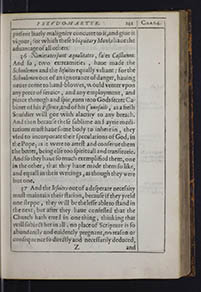 PSEVDO-MARTYR.
141
Chap. 4.
PSEVDO-MARTYR.
141
Chap. 4.
present liuely malignity concurre to it, and giue it
vigour; for which these vbiquitary Monks haue the
aduantage of all others. 36 Nimietates sunt aequalitates, saies Cassianus.
And so, two extreamities, haue made the
Schoolemen and the Iesuites equally valiant: for the
Schoolemen out of an ignorance of danger, hauing
neuer come to hand-blowes, would venter vpon
any peece of seruice, and any employment, and
pierce through and spie, euen into Gods secret Ca-
binet of his Essence, and of his Counsails, as a fresh
Souldier will goe with alacrity to any breach.
And then because these sublime and ayrie medi-
tations must haue some body to inhere in, they
vsed to incorporate their speculations of God, in
the Pope; as it were to arrest and conserue them
the better, being else too spirituall and transitorie.
And so they haue so much exemplified them, one
in the other, that they haue made them so like,
and equall in their writings, as though they were
but one. 37 And the Iesuites out of a desperate necessity
must maintain their station, because if they yeeld
one steppe, they will be the lesse able to stand in
the next; but after they haue confessed that the
Church hath erred in one thing, thinking that
will subiect her in all, no place of Scripture is so
abundantly and euidently pregnant, no reason or
consequence so directly and necessarily deduced, Z and 142
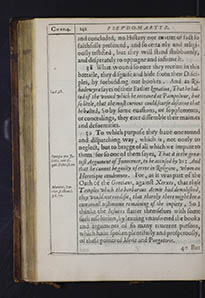 Chap. 4.
142
PSEVDO-MARTYR.
Chap. 4.
142
PSEVDO-MARTYR.
and concluded, no History nor matter of fact so
faithfully presented, and so certainly and religi-
ously testified, but they will stand stubbornly,
and desperately to oppugne and infirme it. 38 What wound so euer they receiue in this
battaile, they disguise and hide from their Disci-
ples, by forbidding our bookes. And as Ri-
badeneyra sayes of their Father Ignatius,l. 4. C. 18. That he hal-
ted of the wound which he receaued at Pampelune, but
so little, that the most curious could scarse discerne that
he halted, So by some euasions, or supplements,
or concealings, they euer dissemble their maimes
and deformities. 39 To which purpose they haue one round
and dispatching way, which is, not onely to
neglect, but to bragge of all which we impute to
them: for so one of them sayes,Spongia pro Ie-
suitis. cont. E-
quit. Polon. fo. 20 That it is the grea-
test Argument of Innocence, to be accused by vs: And
that he cannot be guilty of error in Religion, whom an
Heretique condemnes. For, as it was part of the
Oath of the Grecians, against Xerxes, that those
Temples which the barbarous Armie had demolished,Muretus. Va-
riar. Lection. l.
3. C. 10.
they would not reedifie, that thereby there might bee a
continuall testimonie remaining of the impiety, So I
thinke the Iesuites flatter themselues with some
such resolution, by leauing vnanswered the books
and arguments of so many reuerent persons,
which haue spoken plentifully and prosperously,
of these points of Merit and Purgatorie. 40 But 143
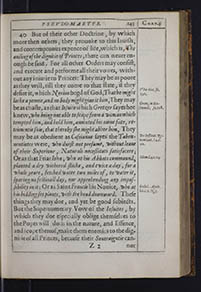 PSEVDO-MARTYR.
143
Chap. 4.
40 But of their other Doctrine, by which
PSEVDO-MARTYR.
143
Chap. 4.
40 But of their other Doctrine, by which
more then others, they prouoke to this lauish,
and contemptuous expence of life, which is, The
auiling of the dignitie of Princes, there can neuer en-
ough be said. For all other Orders may consist,
and execute and performe all their vowes, with-
out any iniurie to Princes: They may be as poore
as they will, till they come to that state, if they
desire it,Vita eius. fo.
591. which Nerius begd of God, That he might
lacke a pennie, and no body might giue it him, They may
be as chaste,Gretz. in Ha-
senmill. fo. 118. as that Iesuite which Gretzer sayes hee
knew, who being not able to scape from a woman which
tempted him, and held him, anointed his owne face, re-
trimentis suis, that thereby she might abhor him, They
may be as obedient as Cassianus sayes the Taben-
nentiotes were,De Institut. Re-
nuntiant. l. 4. C.
10. who durst not presume, without leaue
of their Superiour, Naturali necessitati satisfacere;
Or as that Friar Iohn, who at his Abbats commaund,
planted a dry withered sticke, and twice a day, for a Idem. l. 4. c. 24.
whole yeare, fetched water two miles of, to water it,
sparing no festiuall day, nor apprehending any impos-
sibility in it;Sedul. Apolo.
l. 2. c. 5. N. 5. Or as Saint Francis his Nouice, who at
his bidding set plants, with the head downward. These
things they may doe, and yet be good subiects.
But the Supernumerary Vow of the Iesuites, by
which they doe especially oblige themselues to
the Popes will, doth in the nature, and Essence,
and scope thereof, make them enemies to the dig-
nitie of all Princes, because their Soueraigntie can-
Z2 not 144
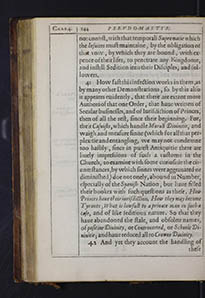 Chap. 4.
144
PSEVDO-MARTYR.
Chap. 4.
144
PSEVDO-MARTYR.
not consist, with that temporall Supremacie which
the Iesuites must maintaine, by the obligation of
that vow, by which they are bound, with ex-
pence of their lifes, to penetrate any Kingdome,
and instill Sedition into their Disciples, and fol-
lowers. 41 How fast this infection works in them, as
by many other Demonstrations, so by this also
it appeares euidently, that there are extant more
Authors of that one Order, that haue written of
Secular businesses, and of Iurisdiction of Princes,
then of all the rest, since their beginning. For,
their Casuists, which handle Morall Diuinitie, and
waigh and measure sinne (which for all that per-
plexitie and entangling, we may not condemne
too hastily, since in purest Antiquitie there are
liuely impressions of such a custome in the
Church, to examine with some curiositie the cir-
cumstances, by which sinnes were aggrauated or
diminished) doe not onely, abound in Number,
especially of the Spanish Nation, but haue filled
their bookes with such questions as these, How
Princes haue their iurisdiction, How they may become
Tyrants, What is lawfull to a priuate man in such a
case, and of, like seditious nature. So that they
haue abandoned the stale, and obsolete names,
of positiue Diuinity, or Controuerted, or Schoole Di-
uinitie; and haue reduced all to Crowne Diuinity. 42 And yet they account the handling of these 145
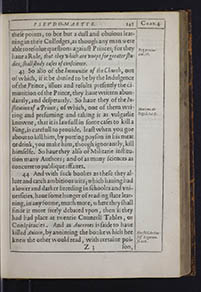 PSEVDO-MARTYR.
145
Chap. 4.
PSEVDO-MARTYR.
145
Chap. 4.
these points, to bee but a dull and obuious lear-
ning in their Colledges, as though any man were
able to resolue questions against Princes; for they
haue a Rule,Reg. prouin-
cial. 56. that they which are vnapt for greater stu-
dies, shall study cases of conscience. 43 So also of the Immunitie of the Church, out
of which, if it be denied to be by the Indulgence
of the Prince, issues and results presently the di-
munition of the Prince, they haue written abun-
dantly, and desperately. So haue they of the In-
stitution of a Prince;Mariana de
Rege. l. 1. c. 7. of which, one of them wri-
ting and presuming and taking it as vulgarlie
knowne, that it is lawfull in some cases to kill a
King, is carefull to prouide, least when you goe
about to kill him, by putting poyson in his meat
or drink, you make him, though ignorantly, kill
himselfe. So haue they also of Militarie institu-
tion many Authors; and of as many sciences as
concurre to publique affaires. 44 And with such bookes as these they al-
lure and catch ambitious wits; which hauing had
a lower and darker breeding in schooles and vni-
uersities, haue some hunger of reading state lear-
ning, in any forme, much more, where they shall
finde it more freely debated vpon, then if they
had had place at twentie Councell Tables, or
Conspiracies. And as Auerroes is saide to haue
killed Auicen,Binsfeld. de Con-
fess Sagarum.
fofo. 216. by anointing the booke which hee
knew the other would read, with certaine poi-
Z3 son, 146
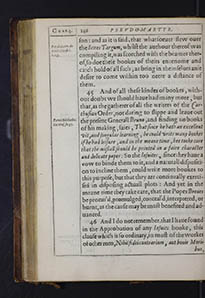 Chap. 4.
146
PSEVDO-MARTYR.
son: and as it is said, that whatsoeuer flew ouer
Chap. 4.
146
PSEVDO-MARTYR.
son: and as it is said, that whatsoeuer flew ouer
the Iewes Targum,Pet. Galatin. de
verit. Christ. l.
1. c. 3. whilst the authour thereof was
compiling it, was scorched with the beames ther-
of, so doe these bookes of theirs enuenome and
catch hold of all such, as bring in themselues anie
desire to come within too neere a distance of
them. 45 And of all these kindes of bookes, with-
out doubt we should haue had many more, but
that, as the gatherer of all the writers of the Car-
thusian Order, not daring to slippe and leaue out
the present Generall Bruno,Petrei Bibliothe.
Carthus fo. 35. and finding no books
of his making, saies, That since he hath an excellent
wit, and singular learning, he could write many bookes
if he had leisure, and in the meane time, hee tooke care
that the missall should be printed in a faire character
and delicate paper: So the Iesuites, since they haue a
vow to binde them to it, and a naturall dispositi-
on to incline them, could write more bookes to
this purpose, but that they are continually exerci-
sed in disposing actuall plots: And yet in the -
meane time they take care, that the Popes Breues
be procur'd, promulged, conceal'd interpreted, or
burnt, as the cause may be most benefited and ad-
uanced. 46 And I do not remember, that I haue found
in the Approbation of any Iesuits booke, this
clause which is so ordinary, in most of the workes
of other men, Nihil fidei contrarium, aut bonis Mori-
bus, 147
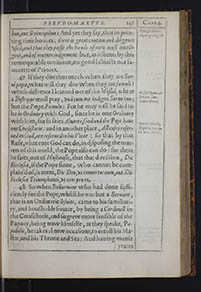 PSEVDO-MARTYR.
147
Chap. 4.
bus, aut Principibus:Spongia contr.
PSEVDO-MARTYR.
147
Chap. 4.
bus, aut Principibus:Spongia contr.
Equit. poton. f. 78 And yet they say, that in prin-
ting their bookes, there is great caution and diligence
vsed, and that they passe the hands of men most intelli-
gent, and of mature iudgement: but, as it seems by this
remarqueable omission, no good subiects nor fa-
uourers of Princes. 47 If they doe thus much when they are Ser-
ui papæ, what will they doe when they are famuli?
which diffrence I learned out of the Missal,Missal. Roma. ex
Decret. Con.
Trid. restitut. where
a Bishoppe must pray, vnd cum me indigno Seruo tuo;
but the Pope, Famulo: For he may well be said to
be in Ordinary with God, since he is one Ordinary
with him;Specul. vtriusq;
Dignit. c. 1. n. 34
Idem. c. 18. n. 7. for so saies Aluares, God and the Pope haue
one Consistorie: and in another place, All cases reser-
ued to God, are reserued to his Vicar: so that by that
Rule, what euer God can do, in disposing the mat-
ters of this world, the Pope also can do: for there
he saies, out of Hostiensis, that that direction, Dic
Ecclesiæ, if the Pope sinne, who cannot be com-
plain'd of, is ment, Dic Deo, vt conuertateum, aut Dic
Ecclesiæ Triumphanti, vt oret pro eo. 48 So when Bellarmine who had done suffi-
ciently for the Pope, whilst he was but a Seruant,
that is an Ordinarie Iesuite, came to his familiari-
ty, and housholde seruice, by being a Cardinall in
the Consistorie, and so grew more sensible of the
Papacy, being now himselfe, as they speake, Pa-
pabilis, he takes al new occasions, to extoll his Ma-
ster, and his Throne and Sea: And hauing manie yeares 148
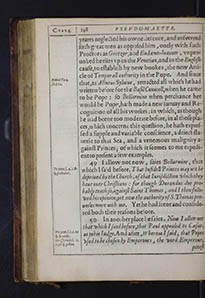 Chap. 4.
148
PSEVDO-MARTYR.
Chap. 4.
148
PSEVDO-MARTYR.
yeares neglected his owne defence, and answered
such great men as opposed him, onely with such
Proctors as Gretzer, and Eudæmo-Ioannes, vnpro-
uoked he rises vp in the Venetian, and in the English
cause, to establish by new bookes, the new Arti-
cle of Temporall authority in the Pope. And since
that,Binius To. 4.
fo. 512. as AEneas Syluius, retracted all which he had
written before for the Basil Councell, when he came
to be Pope: so Bellarmine when perchance hee
would be Pope, hath made a new suruay and Re-
cognition of all his workes; in which, as though
he had beene too moderate before, in al those pla-
ces, which concerne this question, he hath expres-
sed a supple and variable conscience, a deiect sla-
uerie to that Sea, and a venemous malignity a-
gainst Princes; of which it seemes to me expedi-
ent to present a few examples. 49 I allow not now, saies Bellarmine, that
which I said before,De pont. l. 4. c. 8.
§. probatur. That Infidell Princes may not be
depriued by the Church, of that Iurisdiction which they
haue ouer Christians: for though Durandus doe pro-
bably teach so, against Saint Thomas, and I then follo-
wed his opinion, yet now the authority of S. Thomas pre-
uailes more with me. Yet he had seene and conside-
red both their reasons before. 50 In another place he saies, Now I allow not
that which I said before, that Paul appealed to Cæsar, De pont. l. 2. c. 29
§. secundo.
De Clericis l. 1.
c. 16. § postea.
as to his Iudge. And after, Whereas I said, that Popes
vsed to be chosen by Emperours, the word Emperour, potest 149
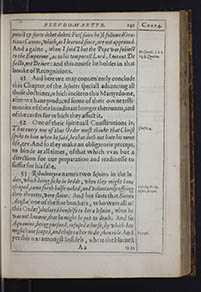 PSEVDO-MARTYR.
149
Chap. 4.
PSEVDO-MARTYR.
149
Chap. 4.
potest & forte debet deleri: For (saies he) I followed Gra-
tians Canons, which, as I learned since, are not approued.
And againe, when I said That the Pope was subiect
to the Emperour,De Concil. l. 1 c.
13. § Quarta. as to his temporall Lord, I meant De
facto, not De iure: and this course he holdes in that
booke of Recognitions. 51 And here we may conueniently conclude
this Chapter, of the Iesuites speciall aduancing all
those doctrines, which incite to this Martyrdome,
after we haue produced some of their owne testi-
monies of their inordinate hunger thereunto, and
of the causes for which they affect it. 52 One of their spirituall Constitutions is,
That euery one of that Order must thinke that Christ
spoke to him when he said,Constit. 4. he that doth not hate his owne
life, &c. And so they make an obligatorie precept,
to binde at all times, of that which VVWas but a
direction for our preparation and readinesse to
suffer for his sake. 53 Ribadeneyra names two Iesuites in the In-
dies, which being sicke in bedde, when they might haue
escaped,Catalog. Scrip.
Iesuit. fo. 190. came forth halfe naked, and voluntarily offring
their throates, were slaine. And hee saies that Simon
Acosta (one of the fiue brothers, who were all of
this Order) declared himselfe to bee a Iesuite, when he
was not knowne, that he might be put to death. And so
Aquauiua, being pursued, refused a horse, by which hee
might haue scaped,Fo. 196. and chose rather to die, then ride. And
yet this was amongst Infidels, where the Haruest Aa was 150
 Chap. 4.
150
PSEVDO-MARTYR.
Chap. 4.
150
PSEVDO-MARTYR.
was great, and the worke-men few: which kind
of intemperance hath beene formerly condem-
ned out of their owne authors. 54 But of this point it is enough to relate
the wordes of him, who speakes in the person of
all the Iesuites; who cals himselfe Clarus Bonarsci-
us, but is vnmask'd and disanagrammatiz'd by his
fellow, who calls him, Carolus Scribanius,Ribadeneyr. Ca-
tal. Script. Iesuit he saies,
That the Scæuolaes, the Catoes, the Porciaes, and the
Cleopatraes, are nothing to the Iesuites: For they (saies
he) lacked courage,Amphitheatrum
Honoris l. 1. c. 4.
§ Primo. Ad multas mortes, And in a fewe
yeares, he saies, they haue had three hundred Martyres:
Therefore he saies, that they of that Order doe violent-
ly teare out Martyrdome, rapiunt spontanea irruptione;Fo. 41.
and, Crederes Morbo adesos: and for what causes do
they this? Least the rest of their life should be barren of
merites, and passe away emptie of glorie: and then hee
passes to them who haue died in England; and as
in these men, this hunger of false-Martyrdome,
goes euer together with blasphemy against Prin-
ces, there he heapes Eulogies vpon Campian, and
reproaches vpon that sacred Prince, for treason to
whom he perished, whom this wretch dares call
Anglicanam Lupam, and after, Sæuientem Caluinianam
lupam:Fo. 44. and after this he saies, That when they come
to this Order, they bargain vpon this condition, vt liceat
prodigere animas, hostili ferro. In which, I thinke, he
relates to that Oath, which they take in the Col-
ledge at Rome, by a Constitution of the Pope; that 151
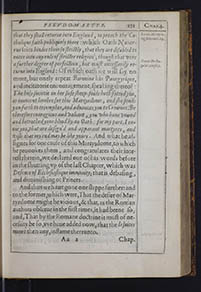 PSEVDO-MARTYR.
151
Chap. 4.
PSEVDO-MARTYR.
151
Chap. 4.
that they shall returne into England,Baron. Martyro-
log. Decemb. 29. to preach the Ca-
tholique faith publiquely there: which Oath Nauar-
rus saies bindes them so strictly, that they are disabled to
enter into any rule of stricter religion, though that were
a further degree of perfection,Nauar. De Re-
gular. Consil. 1. but must necessarily re-
turne into England: Of which oath we will say no
more, but onely repeat Baronius his Panegyrique,
and incitatorie encouragement, speaking thereof:
The holy societie in her safe sheep-folds hath fatted you,
as innocent lambes for this Martyrdome, and she sends
you forth to triumphes, and aduances you to Crownes. Be
therefore couragious and valiant, you who haue vowed
and betrothed your blood by an Oath: for my part, I en-
uie you, that are design'd and apparant martyres, and
wish that my end may be like yours. And what he as-
signes for one cause of this Martyrdome, to which
he prouokes them, and congratulates their inte-
rest therein, we declared out of his words before
in the shutting vp of the last Chapter, which was
Defence of Ecclesiastique immunity; that is debasing,
and diminishing of Princes. And thus we haue gone one steppe further: and
to the former, which were, That the desire of Mar-
tyrdome might be vicious, & that, as the Roman
authors obserue in the first times, it had beeene so;
and, That by the Romane doctrine it must of ne-
cessity be so, vvwe haue added now, that the Iesuites
more then any, inflame thereunto. Aa2 Chap. 152
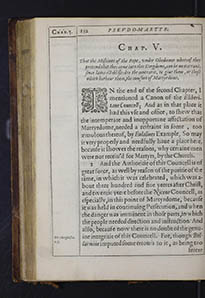 Chap. 5.
152
PSEVDO-MARTYR.
Chap. V.
That the Missions of the Pope, vnder Obedience whereof they
Chap. 5.
152
PSEVDO-MARTYR.
Chap. V.
That the Missions of the Pope, vnder Obedience whereof they
pretend that they come into this Kingdome, can be no warrant,
since lawes established to the contrarie, to giue them, or those
which harbour them, the comfort of Martyrdome. IIn the end of the second Chapter, I
mentioned a Canon of the Eliberi-
tane Councell; And as in that place it
had this vse and office, to shew that
the intemperate and inopportune affectation of
Martyrdome, needed a restraint in some, too
æmulous thereof, by Eulalines Example, So may
it very properly and needfully haue a place here,
because it showes the reasons, why certaine men
were not receiu'd for Martyrs, by the Church. 2 And the Authoritie of this Councell is of
great force, as well by reason of the puritie of the
time, in which it was celebrated, which was a-
bout three hundred and fiue yeeres after Christ,
and twentie yeere before the Nicene Councell, as
especially, in this point of Martyrdome, because
it was held in continuing Persecution, and when
the danger was imminent in those parts, in which
the people needed direction and instruction: And
also, because now there is no doubt of the genu-
ine integritie of this Councell.De Imagin. l. 2.
c. 9. For, though Bel-
larmine imputed some errours to it, as being too seuere 153
 PSEVDO-MARTYR.
153
Chap. 5.
PSEVDO-MARTYR.
153
Chap. 5.
seuere against such as had slipp'd in time of Perse-
cution, and Baronius spoke sometime of it,Ann. 55. nu. 119. Some-
what freely aund sharpely, sayes Binius, yet after
that,Ann. 305. nu. 42. he changed his opinion, and hee, and Bini-
us, haue now redeem'd all the Canons of that
Councell from any imputation. 3 Of which Canons, this is the sixtieth:
That they which breake the Idols of the Gentiles, and
are slaine by them, shall not be receiued into the number
of Martyrs. Because, this is not written in the Gospell,
nor found that it was euer done by the Apostles. So that
by the opinion of that Councell, that onely is a
sufficient cause to intitle and interest a man in
the Crowne of Martyrdome, VVWhich was found
written in the Gospell, or practised by the Apostles. And
is there any thing found in either of them, which
may be a precedent to this mission?Mat. 3.14. Christ appoin-
ted twelue, whom hee might send to Preach; but
what?Luke 9.2. The Kingdome of God. And assoone as
Saule had an inward mission, the Text sayes,
Straightwayes he Preached euen in the Synagogue.Act 9.12. But
what? Hee Preached Christ; And what did hee
Preach of him? That he was the Sonne of God; And
that it was hee that was ordain'd of God,Act. 10.42. a iudge of
quicke and dead: And, as himselfe sayes, of his pra-
ctise after, We preach Christ crucified. But this mis-
sion from Rome,1. Cor. 1.23. is not to Preach Christ, but his
Vicar: Not his kingdome of Grace, or Glorie, but
his title to Temporall kingdomes: Not how hee Aa3 shall 154
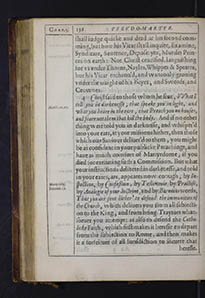 Chap. 5.
156154
PSEVDO-MARTYR.
Chap. 5.
156154
PSEVDO-MARTYR.
shall iudge quicke and dead at his second com-
ming, but how his Vicar shall inquire, Examine,
Syndicate, Sentence, Depose: yea, Murder Prin-
ces on earth: Not Christ crucified, languishing
for vs vnder Thorns, Nayles, Whippes & Speares,
but his Vicar enthron'd, and wantonly groning
vnder the waight of his Keyes, and Swords, and
Crownes. 4 Christ said to those whom he sent, VVWhat I
tell you in darkenesse,Matth. 10.27. that speake you in light, and
what you heare in the eare, that Preach you on houses,
and feare not them that kill the body. And if no other
thing were told you in darknesse, and whisper'd
into your ears, at your missions hither, then those
which our Sauiour deliuer'd to them, you might
be as confident in your publicke Preachings, and
haue as much comfort of Martyrdome, if you
died for executing such a Commission. But what
your instructions deliuered in darkenesse, and told
in your eares, are, appeares now enough, by In-
spection, by Confession,Martyrolog.
Decemb. 29. by Testimonie, by Practise,
by Analogie of your doctrine, and by Baronius words,
That you are sent hither to defend the immunities of
the Church, which deliuers you from all subiecti-
on to the King, and from being Traytors what-
soeuer you attempt: as also to defend the Catho-
licke Faith, which first makes it heresie to depart
from the subiection to Rome, and then makes
it a forfeiture of all Iurisdiction to incurre that heresie. 155
 PSEVDO-MARTYR.
155
Chap. 5.
PSEVDO-MARTYR.
155
Chap. 5.
heresie. Except this be written in the Gospell, or pra-
ctised by the Apostles, you cannot be Martyres for
this. 5 But to descend to reasons of a lower nature,
of the law of Nations,Alf. Aluares
spec. vtri. Dig.
c. 31. N. 1, 2, 3,
& 12. 16, 17.
& ca. 41. 12.
Azor. Mor. Inst.
par. 2. l. 4 c. 18.
& par. 1. l. 8. ca.
24. and conueniency and de-
cency; since all those which maintaine the Spa-
nish Expeditions, and proceedings in the Indies,
by the strength of the Popes Donation, concurre in
this, That into what place soeuer the Pope, or any Princes
may send Priests, they may also send Armies for the se-
curity of those Priests, and them whom they haue redu-
ced: and since it is euident by all your Writers, that
the Pope hath more Iurisdiction ouer Christian Princes
relapsed from Rome, then ouer Infidels, might hee not
for safe-guard of his Apostles, sende Fleetes and ar-
mies hither? and is it not the common and recei-
ued opinion, which Maynardus deliuers, that in all
cases where the Pope may enioyne,De priuileg. Ec-
cles. Ar. 10. n. 25 or commaund any
thing, he may lawfully proceede by way of warre, against
any that hinder the execution thereof. If then such
armies and Fleets were sent to conduct you, and
were resisted in their landing, or defeated in bat-
tell; had not they as good title to Martyrdome as
you? and may not the Pope as well Canonize the
whole Spanish Fleete, which perished in 88. for
your Catholique faith, and Ecclesiastique immu-
nitie? since in many cases,Commen. in Mat
1. in fine. as in the Innocent chil-
dren (of whom Hilary saies, that they were exalted
to eternity, by Martyrdome) one may bee an impli-
cite 156
 Chap. 5.
156
PSEVDO-MARTYR.
cite Martyre, though he know not why he died,
Chap. 5.
156
PSEVDO-MARTYR.
cite Martyre, though he know not why he died,
so he haue no actuall reluctation against it. 6 And it is very probable, that their title was
better then yours, for this point of sending, because
they were vnder the obedience of them which
sent them: but for you, (not to dispute now
whether the cause be enough for Martyrdome, or
whether your obedience can giue it that forme,
and life, and vigour) you are so farre from being
sent, or from exercising any obedience in this act,
that your first step, which is going out of the king-
dome, is absolutely and euidently disobedience
to your Prince, before you haue any colour of
hauing submitted your selfe to any other superi-
our; and then you enter into the Colledge, vppon
condition that you may returne, and you take an
Oath before hand that you will returne: So that
you returne not hither in obedience of your Su-
periour, but in performance of your owne vniust,
and indiscreete Vowes: both which, in all Vowes,
are Annulling or vitiating circumstances. Neither
dooth this Oath so farre binde you to returne,
(though Nauarrus say so) but that one of the
learnedst of the Iesuites, thinkes, If that be forborne,
and some Order of Religion embraced in stead thereof,Azor. par. 1. l.
11. c. 5. §. Ani-
maduertendum.
the oath is better performde. 7 And, if these lawes which take holde of
you, when you returne hither, had been made be-
tweene the time of your vowe, and your return-
ing: 157
 PSEVDO-MARTYR.
157
Chap. 5.
ning: and if they had beene made directly to that
PSEVDO-MARTYR.
157
Chap. 5.
ning: and if they had beene made directly to that
end, to interrupt and preclude the performance
of this Vow, yet naturally they would worke the
same effect vpon this Vow of yours, and make it
voide, because something was now interpos'd,
which may iustly, yea ought to change your pur-
pose: For if that law had beene made before, your
Vowe had beene vniust from the beginning;
which is the case of as many of you, as haue gone
since the making of those prohibitory lawes. For
a law which forbidds vpon paine of losse of goods,Sayr. Thesau.
Cas. Consc. l. 3. c. 7
nu. 25. death,
banishment, or such, bindes a man vpon paine of mortall
sinne; and therfore no Vow can iustifie the breach
thereof. 8 All this, if the lawes be iust, is euident and
without question, and how could it be euident
to all those yong Schollers which went ouer, and
made this vowe, that these lawes were vniust?
What infallible assurance could they haue of this,
to excuse them of disobedience in going, or indiscre-
tion in swearing? 9 Their owne men teach, that the lawes of
Princes are not therefore necessarily vniust and voide,Alf. Castro de po-
test. legis. l. 1. c. 5.
Docum. 1.
because the Prince had an ill intention in making them.
As if the Prince propose and purpose particular
gaine, by exacting the penalty of the law, or re-
uenge vpon certaine persons, by executing there-
of; this makes not your law voide, so that it be
profitable to the bodie of the Common-wealth: Bb much 158
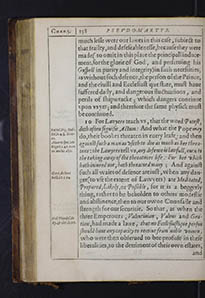 Chap. 5.
158
PSEVDO-MARTYR.
Chap. 5.
158
PSEVDO-MARTYR.
much lesse were our lawes in this case, subiect to
that frailty, and defeseablenesse, because they were
made (to omit in this place the principall induce-
ment, for the glorie of God, and preseruing his
Gospell in purity and integrity) in such necessities,
as without such defence, the person of the Prince,
and the ciuill and Ecclesiast que state, must haue
suffered daily, and dangerous fluctuations, and
perils of shipwracke; which dangers continue
vpon vs yet; and therefore the same physick must
be continued. 10 For Lawyers teach vs, that the word Potest,
doth often signifie Actum:Bartol. Dig. Indi.
Sol. le. 4. §. Sire-
us. And what the Pope may
do, their bookes threaten in euery leafe: and then
against such a man as vseth to doe as much as hee threa-
tens:Aluares spec. vtr
Dignit. c. 41. n. 10
ex multis alijs. the Lawyers tell vs, any defence is lawfull, euen to
the taking away of the threatners life: For hee which
hath iniured one, hath threatned many; And against
such all waies of defence are iust,Gent. de Iure
belli. l. 1. c. 14. when any dan-
ger (to vse the extent of Lawyers) are Meditated,
Prepared, Likely, or Possible, for it is a beggerly
thing, rather to be beholden to others modestie
and abstinence, then to our owne Counsaile and
strength for our securitie. So that, as when the
three Emperours,Cod. Theodos. de
Ep. & cler. le. 20. Valentinian, Valens and Gra-
tian, had made a lawe, that no Ecclesiastique person
should haue any capacity to receiue from noble women,
who were then obserued to bee profuse in these
liberalities, to the detriment of their own estates, and 159
 PSEVDO-MARTYR.
159
Chap. 5.
PSEVDO-MARTYR.
159
Chap. 5.
and of the publique, Saint Hierome saies,Epist. ad Nepotia Hee did
not grieue that such a law was made, but that the coue-
tousnesse of the Clergy had occasioned these most religi-
ous Princes to make that law: So you ought rather to
lament, that the Doctrine and practise of some of
your principall men, hath raised these iealousies
and suspitions in a Prince, out of the conscience
of his owne equalitie naturally confident, then
murmure at the law, or dis-councell the obedi-
ence to it. 11 For in these cases of naturall preseruation, it
is not onely lawfull to make new lawes, but to
breake any other, which are not directly Diuine.
And if you impute the worst condition of these
lawes, which malignitie can obiect to them,
which is, that those Catholiques, which are inno-
cent, which meerely out of conscience, abstaine
from communicating with vs, in the Word and
Sacraments, shall be vtterly starued and depriued
of all spirituall sustentation, if the lawes which
forbid all Priests to enter, should be still executed;
yet that inconuenience will not annull and make
voide a law, so farre, as that to doe against it shall
be a iust cause of Martyrdome: for in making of
lawes, those euils which doe occasionally or consequently
arise from the execution thereof,Aluares spec. vtr.
digni. c. 41. n. 7. must not be considered,
but what the principall intention of the law-maker was:
Which, in our case was, the preseruation of the
publique. Bb2 I2 And 160
 Chap. 5.
160
PSEVDO-MARTYR.
12 And yet the Catholiques in England shall
Chap. 5.
160
PSEVDO-MARTYR.
12 And yet the Catholiques in England shall
for all this be in as good condition here, as they
should be in any Catholique Countrie, which
were by the Popes displeasure vnder a locall Inter-
dict; which the Popes doe often impose, with
small respect to the Innocents, for in the late bu-
sinesse betweene the Church and the State of Venice
by the Popes Breues, the whole Dominion was Inter-
dicted, because the Senate, which onely was excom-
municated, did not within three daies do all those
acts, which were so derogatory to the Soueraign-
ty of that State. And so, that punishment, which
is so seuere, by the Canons, that as Boniface the eight
obserued,De sent. Excom.
Alma mater in
sexto.
Verbo, Insurgunt It occasions many Heresies and indeuotion,
and many dangers to the soule: And, as the Glosse saies
there, by experience it appeared, that when a place
had lien long vnder an Interdict, the people laughed at
the Priests, when they came to say Masse againe; was
inflicted vpon many Millions of innocent per-
sons: all which, if that State had not prouided for
their spirituall food by staying the priests, had bin
in as ill case by that Interdict, and euocation of the
Clergie, as the Catholiques in England were by
those lawes of interdicting their entrance, consi-
dering with how much lenitie in respect of their
extreame prouocations, they were executed. And
if that reliefe which Vgolini giues to comfort the
Venetians consciences, be of any strength, which is;
that that which they loose in spirituall sustenance,De Interd. Ver.
§. 1. nu. 11. they gaine 161
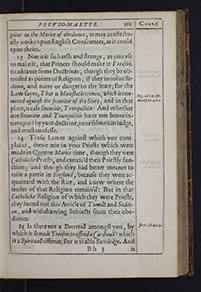 PSEVDO-MARTYR.
161
Chap. 5.
PSEVDO-MARTYR.
161
Chap. 5.
gaine in the Merite of obedience, it may as effectu-
ally worke vpon English Consciences, as it could
vpon theirs. 13 Nor is it so harsh and strange, as you vse
to make it, that Princes should make it Treason,
to aduance some Doctrines, though they be ob-
truded as points of Religion, if they inuolue Se-
dition, and ruine or danger to the State; for the
Law sayes,Dig. ad Ley. int.
Maiest. tit. 4. le. 1 That is Maiestatis crimen, which is com-
mitted against the securitie of the State; and in that
place, it cals Securitie, Tranquilitie: And whether
our Securitie and Tranquilitie haue not beene in-
terrupted by your doctrine, your selues can iudge,
and must confesse. 14 These Lawes against which you com-
plaine, drewe not in your Priests which were
made in Queene Maries time, though they were
Catholicke Priests, and exercis'd their Priestly fun-
ction; and though they had better meanes to
raise a partie in England, because they were ac-
quainted with the state, and knew where the
seedes of that Religion remain'd: But in that
Catholicke Religion of which they were Priests,
they found not this Article of Tumult and Sediti-
on, and withdrawing Subiects from their obe-
dience. 15 Is there not a Decretall amongst you,In 70. tit. 4. c. 3. by
which it Is made Treason to offend a Cardinall? which
is a Spirituall offence; For it is also Sacriledge. And Bb3 is 162
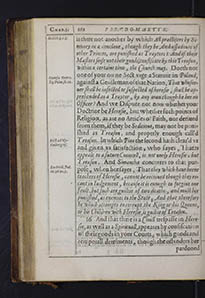 Chap. 5.
162
PSEVDO-MARTYR.
Chap. 5.
162
PSEVDO-MARTYR.
is there not another by which All practisers by Si-
money in a conclaue,Ibid. tit. 3. c. 3. though they be Ambassadours of
other Princes, are punished as Traytors? And if their
Masters seise not their goods, confiscate by this Treason,
within a certaine time, the Church may. Doeth not
one of your owne Sect vrge a Statute in Poland,
against a Gentleman of that Nation,Spongia Contra.
Eq. Polon. fo. 29. That whosoe-
uer shall be infected or suspected of heresie, shall be ap-
prehended as a Traytor, by any man though he bee no
Officer? And we Dispute not now whether your
Doctrine be Heresie, but whether such points of
Religion, as are no Articles of Faith, nor deriued
from them, if they be Seditious, may not be puni-
shed as Treason, and properly enough call'd
Treason.Epist. ad No-
rimbergens. In which Pius the second hath clear'd vs
and giuen vs satisfaction, who sayes, That to
appeale to a future Councell, is not onely Heresie, but
Treason. And Simancha concurres to that pur-
pose, when hee sayes,Enchirid. Ind.
tit. 56. nu. 5. That they which haue beene
teachers of Heresie, cannot be receiued though they re-
cant in Iudgement, because it is enough to forgiue one
fault, but such are guiltie of two deaths, and must bee
punished, as enemies to the State; And that therefore
he which attempts to corrupt the King or his Queene,
or his Children with Heresie, is guiltie of Treason. 16 And that there is a Ciuill trespasse in Here-
sie, as well as a Spirituall, appeares by confiscation
of their goods in your Courts; which goods and
temporall detriments, though the offenders bee pardoned 163
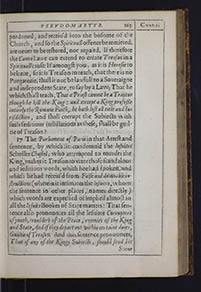 PSEVDO-MARTYR.
163
Chap. 5.
PSEVDO-MARTYR.
163
Chap. 5.
pardoned, and receiu'd into the bosome of the
Church, and so the Spirituall offence be remitted,
are neuer to be restored, nor repaird. If therefore
the Canon Lawe can extend to create Treason in a
Spirituall cause: If amongst you, as it is Heresie to
beleeue, so it is Treason to teach, that there is no
Purgatorie, shall it not be lawfull to a Soueraigne
and independent State, to say by a Law; That he
which shall teach, That a Priest cannot be a Traytor
though he kill the King: and except a King professe
intirely the Romane Faith, he hath lost all title and Iu-
risdiction, and shall corrupt the Subiects with
such seditious instillations as these, shall be guil-
tie of Treason? 17 The Parliament of Paris in that Arrest and
sentence, by which it condemn'd the Iesuites
Scholler Chastel, who attempted to murder the
King, makes it Treason to vtter those scandalous
and seditious words, which hee had spoken, and
which he had receiu'd from False and damnable in-
structions (wherein it intimates the Iesuites, whom
the sentence in other places, name, directly)
which words are expressed or implied almost in
all the Iesuits Bookes of State matters: That sen-
tence also pronounces all the Iesuites Corrupters
of youth, troublers of the Peace, enemies of the King
and State, And if they depart not within certaine daies,
Guiltie of Treason. And this sentence pronounces,
That if any of the Kings Subiects, should send his Sonne 164
 Chap. 5.
164
PSEVDO-MARTYR.
Chap. 5.
164
PSEVDO-MARTYR.
Sonne out of the Realme, to a Iesuites Colledge, hee
should incurre treason. 18 And though your Expurgatorie Index can
reach into all Libra ies, and eate and corrupt
there more then all the Moathes and Wormes,
though you haue beene able to expunge, yea
euert, and demolish the Pyramis erected in dete-
station of you by this Arrest, yet your Deleatur
will neuer stretch to the scarre in the Kings face,
nor your Inseratur restore his Toothe, nor your
expunctions arriue to the Recordes which preserue
this sentence. 19 And came it (thinke you) euer into the
opinion of the Catholickes of France, that if a man
by vertue or example and precedent of this Arrest,
had beene Executed as a Traitor, for speaking
those forbidden words, or for sending his Sonne
to the Iesuits, he should haue beene by the Catho-
licke Church reputed a Martyr? 20 When the Iesuits were lately expell'd from
Venice, and when other Priests which stai'd there,
were commanded by Lawes to doe their functi-
ons, did either the Iesuites apprehend this oppor-
tunitie of Martyrdome, and come backe, or did
the Priests find such spirituall comfort in trans-
gressing this Law, that they offred to goe out? 21 And in all our differences, which fell out in
this Kingdome betweene our Kings, and the
Popes, when so many capitall Lawes were made against 165
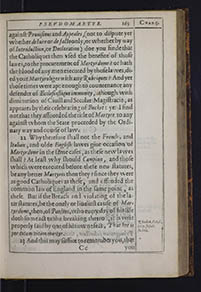 PSEVDO-MARTYR.
165
Chap. 5.
PSEVDO-MARTYR.
165
Chap. 5.
against Prouisions and Appeales, (not to dispute yet
whether de Iure or de facto only, or whether by way
of Introduction, or Declaration) doe you finde that
the Catholiques then vsed the benefite of those
lawes, to the procurement of Martyrdome? or hath
the blood of any men executed by those lawes, di-
ed your Martyrologes with any Rubriques? And yet
those times were apt enough to countenance any
defender of Ecclesiastique immunity, though with
diminution of Ciuill and Secular Magistracie, as
appeares by their celebrating of Becket: yet I find
not that they affoorded the title of Martyre to any
against whom the State proceeded by the Ordi-
nary way and course of law. 22 Why therefore shall not the French, and
Italian, and olde English lawes giue occasion of
Martyrdome in the same cases, as these new lawes
shall? At least why should Campian, and those
which were executed before these new statutes,
be any better Martyres then they? since they were
as good Catholiques as these, and offended the
common law of England in the same point, as
these. But if the Breach and violating of the la-
ter statutes, be the onely or liueliest cause of Mar-
tyrdome, then, of Parsons, who euery day of his life
doth some act to the breaking thereof, it is verie
properly said by one of his owne sect,Ribaden. Catal.
scrip. Iesuit.
fo. 109. That hee is
per totam vitam martyr. 23 And this may suffice to remember you, that Cc you 166
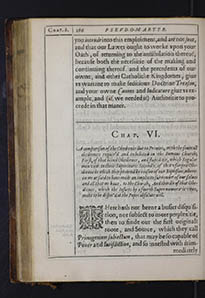 Chap. 6.
166
PSEVDO-MARTYR.
Chap. 6.
166
PSEVDO-MARTYR.
you intrude into this emploiment, and are not sent,
and that our Lawes ought to worke vpon your
Oath, of returning to the annihilation thereof,
because both the necessitie of the making and
continuing thereof and the precedents of our
owne, and other Catholicke Kingdomes, giue
vs warrant to make seditious Doctrine Treason,
and your owne Canons and Iudicature giue vs ex-
ample, and (if we needed it) Authoritie to pro-
ceede in that maner. Chap. VI. A comparison of the Obedience due to Princes, with the seuerall
obediences requir'd and exhibited in the Romane Church;
First, of that blind Obedience, and stupiditie, which Regular
men vowe to their Superiours: Secondly, of that vsurped Obe-
dience to which they pretend by reason of our Baptisme, where-
in we ar said to haue made an implicite surrender of our selues
and all that we haue, to the Church; And thirdly of that Obe-
dience, which the Iesuits by a fourth Supernumerarie vowe,
make to be dispos'd at the Popes absolute will.
THereThere hath not beene a busier disquisi-
tion, nor subiect to more perplexitie,
then to finde out the first originall
roote, and Source, which they call
Primogenium subiectum, that may be so capable of
Power and Iurisdiction, and so inuested with it im-
mediately 167
 PSEVDO-MARTYR.
167
Chap. 6.
mediately from God, that it can transferre and
PSEVDO-MARTYR.
167
Chap. 6.
mediately from God, that it can transferre and
propagate it, or let it passe and naturally deriue
it-selfe into those formes of Gouernement, by
which mankind is continued and preserued; For
at the resolution of this, all Questions of Subie-
ction attend their dispatch. And because the Cler-
gie of the Roman Church, hath with so much fierce
earnestnesse and apparance of probablenesse, pur-
sued this Assertion, That that Monarchall forme,
and that Hierarchie, which they haue, was instituted
immediately from God; Many wise and iealous Aduo-
cates of Secular Authoritie, fearing least otherwise
they should diminish that Dignitie, and so pre-
uaricate and betray the cause, haue said the same
of Regall power and Iurisdiction.Fra. a Victor
Relect. de Pot.
Ciui. nu. 8. And euen in
the Romane Church a great Doctor of eminent
reputation there, agrees (as he sayes) Cum omnibus
sapientibus, That this Regall Iurisdiction and Monar-
chie (which word is so odious and detestable to
Baronius) proceedes from God, and by Diuine and na-
turall Law, and not from the State or altogether from
man. And as we haue it in Euidence, so we haue
it in Confession from them, that God hath as immedi-
ately created some Kings, as any Priests. And Cassa-
næus thinkes this is the highest Secular Authoritie
that euer God induced:Catal. Glor. pa. 5
Consid. 28. For he denies That old or
new Testament haue any mention of Emperour. 2 But to mine vnderstanding we iniure and
endanger this cause more, if wee confesse that Cc2 that 168
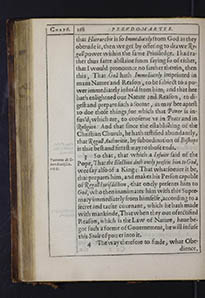 Chap. 6.
168
PSEVDO-MARTYR.
Chap. 6.
168
PSEVDO-MARTYR.
that Hierarchie is so Immediately from God as they
obtrude it, then we get by offering to drawe Re-
gall power within the same Priuiledge. I had ra-
ther thus farre abstaine from saying so of either,
that I would pronounce no farther therein, then
this, That God hath Immediately imprinted in
mans Nature and Reason, to be subiect to a po-
wer immediately infus'd from him; and that hee
hath enlightned our Nature and Reason, to di-
gest and prepare such a forme, as may bee aptest
to doe those things, for which that Power is in-
fus'd; which are, to conserue vs in Peace and in
Religion: And that since the establishing of the
Christian Church, he hath testified abundantly,
that Regall Authoritie, by subordination of Bishops
is that best and fittest way to those ends. Tannerus de li-
bert. Eccles. l. 2.
cap. 5. 3 So that, that which a Iesuite said of the
Pope, That the Election doth onely present him to God,
wee say also of a King; That whatsoeuer it be,
that prepares him, and makes his Person capable
of Regall Iurisdiction, that onely presents him to
God, who then inanimates him with this Supre-
macy immediately from himselfe, according to a
secret and tacite couenant, which he hath made
with mankinde, That when they out of rectified
Reason, which is the Law of Nature, haue be-
got such a forme of Gouernement, he will infuse
this Soule of power into it. 4 The way therefore to finde, what Obe-
dience, 169
 PSEVDO-MARTYR.
169
Chap. 6.
dience is due to a King, is not to seeke out, how
PSEVDO-MARTYR.
169
Chap. 6.
dience is due to a King, is not to seeke out, how
they which are presum'd to haue transferr'd this
power into him, had their Authoritie, and how
much they gaue, and how much they retain'd; For
in this Discouerie none of them euer went farther,
then to Families; In which, they say, Parents and
Masters had Iurisdiction ouer Children, and Ser-
uants; and these Families concurr'd to the making
of Townes, and transferr'd their power into some
Gouernour ouer them all. 5 But, besides that this will not hold, because
such Sauadges as neuer rais'd Families, or such men
as an ouerburdned kingdom should by lot throw
out, which were peeces of diuers families, must
haue also a power to frame a forme of Gouerne-
ment, wheresoeuer they shall reside, which could
not bee if the onely roote of Iurisdiction were in
parents & masters; This also will infirme and ouer-
throw that Assertion, that if parents and masters
had not this supreme Soueraignty, which is requisite
in Kings, they could not transferre it into Kings,
and so Kings haue it not from them: And if they
were Soueraignes they cold not transfer it, for no
Soueraigne can deuest himselfe of his Supremacie. 6 Regall authority is not therefore deriued
from men, so, as at that certaine men haue lighted
a King at their Candle, or transferr'd certaine De-
grees of Iurisdiction into him: and therefore it is a
cloudie and muddie search, to offer to trace to the Cc3 first 170
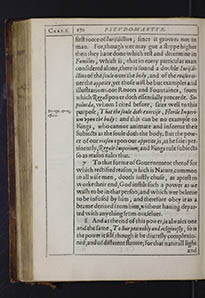 Chap. 6.
170
PSEVDO-MARTYR.
Chap. 6.
170
PSEVDO-MARTYR.
first roote of Iurisdiction, since it growes not in
man. For, though wee may goe a steppe higher
then they haue done which rest and determine in
Families, which is, that in euery particular man
considered alone, there is found a double Iurisdi-
ction of the soule ouer the body, and of the reason o-
uer the appetite, yet those will be but examples and
illustrations, not Rootes and Fountaines, from
which Regall power doth essentially proceede. Se-
pulueda, whom I cited before, saies well to this
purpose;De regn. & reg.
offi. l. 1. That the soule doth exercise, Herile Imperi-
um vpon the body: and this can be no example to
Kings, who cannot animate and informe their
Subiects as the soule doth the body. But the pow-
er of our reason vpon our appetite, is, as he saies per-
tinently, Regale Imperium; and Kings rule subiects
so as reason rules that. 7 To that forme of Gouernement therof for
which rectified reason, which is Nature, common
to all wise men, dooth iustly chuse, as aptest to
worke their end, God instils such a power as we
wish to be in that person, and which wee beleeue
to be infused by him, and therefore obey it as a
beame deriued from him, without hauing depar-
ted with any thing from our selues. 8 And as to the end of this power, is alwaies one
and the same, To liue peaceably and religiously, so is
the power it self though it be diuersly complexio-
ned, and of different stature; for that naturall light and 171
 PSEVDO-MARTYR.
171
Chap. 6.
PSEVDO-MARTYR.
171
Chap. 6.
and reason, which acknowledges a necessity of a
Superiour, that we may enioy peace, and worshippe
God, did consent in the common wish and tacite
praier to God, and doth rest in the common faith
and beliefe, that God hath powred into that per-
son all such authority as is needefull for that vse;
Therefore of what complexion soeuer the forme
of gouernement be, or of what stature soeuer it
seeme, yet the same authority is in euery Soueraigne
State: thus farre, That there are no Ciuill men,
which out of rectified Reason haue prouided for
their Peaceable and religious Tranquility, but are
subiect to this regall authority, which is, a power to
vse all those meanes, which conduce to those endes. 9 For those diffrences which appeare to vs in
the diuers formes, are not in the essence of the
Soueraignty, which hath no degrees, nor additions,
nor diminutions, but they are onely in those in-
struments, by which this Soueraignty is exercised,
which are ordinarily called Arcana, and Ragion di
stato, as I noted before: and as the soule it selfe,
hath as good vnderstanding in an Idiote, and as
good a memory in a Lethargique person as in the wi-
sest and liueliest man; So hath this Soueraignty in
euery state equall vigour, though the Organes by
which it workes be not in all alike disposed. And
therefore the gouernement amongst the Iewes be-
fore Saule, was fully a Kingdome in this acceptati-
on: nor did they attend any new addition to this 172
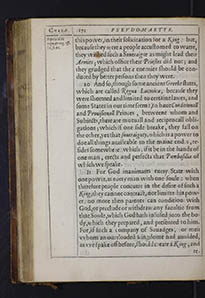 Chap. 6.
172
PSEVDO-MARTYR.
Chap. 6.
172
PSEVDO-MARTYR.
this power,Sepulued. de
regn. & reg. offi.
l. 2. fo. 91. in their solicitation for a King: but,
because they were a people accustomed to warre,
they wished such a Soueraigne as might lead their
Armies; which office their Priestes did not; and
they grudged that their enemies should be con-
duced by better persons then they were. 10 And so, though some ancient Greeke states,
which are called Regna Laconica, because they
were shortned and limited to certaine lawes, and
some States in our time seeme, to haue Conditionall
and Prouisionall Princes, betweene whom and
Subiects, there are mutuall and reciprocall obli-
gations; which if one side breake, they fall on
the other, yet that soueraignty, which is a power to
doe all things auaileable to the maine endes, re-
sides somewhere: which, if it be in the hands of
one man, erects and perfects that Pambasilia of
which we speake. 11 For God inanimates euery State with
one power, as euery man with one soule: when
therefore people concurre in the desire of such a
King, they cannot contract, nor limitte his pow-
er: no more then parents can condition with
God, or preclude or withdraw any facultie from
that Soule, which God hath infused into the bo-
dy, which they prepared, and presented to him.
For, if such a company of Sauadges, or men
vvwhom an ouerloaded kingdome had auoided,
as vvwe spake off before, should create a King, and re- 173
 PSEVDO-MARTYR.
173
Chap. 6.
PSEVDO-MARTYR.
173
Chap. 6.
reserue to themselues a libertie to reuenge their
owne wrongs, vpon one another, or to doe any
act necessary to that end, for which a King hath
his authority, this liberty were swallowed in
their first acte, and onely the creation of the King
were the worke of rectified reason, to which God
had concurr'd, and that reseruation a uoide and im-
potent act of their appetite. 12 If then this giue vs light, what and whence
the Kings Iurisdiction is; we may also discerne by
this, what our obedience must be: for power and
subiection are so Relatiue, as since the King com-
maunds in all things conducing to our Peaceable
and Religious being, wee must obey in all those.
This therefore is our first Originary, naturall, and
Congenite obedience, to obey the Prince: This be-
longs to vs as we are men; and is no more changed
in vs, by being Christians, then our Humanity is
changed: yet hath the Romane Church extolled
and magnified three sorts of Obedience, to the pre-
iudice of this. 13 The first is, that which they call Cæcam obedi-
entiam: which is an inconsiderate & vndiscoursed,
and (to vse their owne word) an Indiscreete surren-
dring of themselues, which professe any of the
rules of Religion, to the command of their Prelate
and Superior; by which, like the vncleane beasts,
They swallow,Deu. 14. and neuer chaw the cudde: But this o-
bedience proceeding out of the will and election Dd of 174
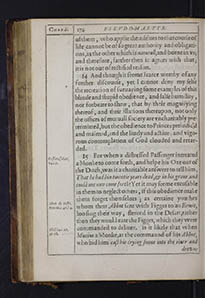 Chap. 6.
174
PSEVDO-MARTYR.
Chap. 6.
174
PSEVDO-MARTYR.
of them, who applie themselues to that course of
life, cannot be of so great authority and obligati-
ons, as the other which is naturall, and borne in vs;
and therefore, farther then it agrees with that;
it is not out of rectified reason. 14 And though it seeme scarce worthy of any
further discourse, yet I cannot deny my selfe
the recreation of suruaying some examples of this
blinde and stupid obedience, and false humility,
nor forbeare to shew, that by their magnifying
thereof, and their illations thereupon, not only
the offices of mutuall society are vncharitably pre-
termitted, but the obedience to Princes preiudic'd
and maimed, and the liuely and actiue, and vigo-
rous contemplation of God clouded and retar-
ded. Cassian. Collat.
24. c. 9.15 For when a distressed Passenger intreated
a Monke to come forth, and helpe his Oxe out of
the Ditch, was it a charitable answere to tell him,
That he had bin twentie years dead, & in his graue, and
could not now come forth? Yet it may seeme excusable
in them to neglect others, if this obedience make
them forget themselues; as certaine youthes
whom their Abbot sent with Figges to an Ermit,Idem de Instit.
Renunc. c. 40. l 4.
loosing their way, sterued in the Desart, rather
then they would eate the Figges, which they were
commanded to deliuer.Ibid. l. 4. c. 27.
& 28. Is it likely that when
Mucius a Monke, at the commaund of his Abbot,
who bid him cast his crying sonne into the riuer and drowne 175
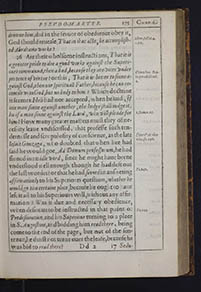 PSEVDO-MARTYR.
175
Chap. 6.
PSEVDO-MARTYR.
175
Chap. 6.
drowne him, did in the feruor of obedience obey it,
God should reueale,Idem. Collat. 4.
c. 20. That in that acte, he accomplish-
ed Abrahams worke? 16 Are these wholsome instructions, That it is
a greater pride to doe a good worke against the Superi-
ours commaund, then a bad, because they are vices vnder
pretence of vertue?Climachus Sca-
la. parad. Grad.
4. or this, That it is better to sinne a-
gainst God, then our spirituall Father, because he can re-
concile vs to God, but no body to him? Which doctrine
it seemes Heli had not accepted, when he said, If
one man sinne against another, the Iudge shall iudge it,
bu if a man sinne against the Lord,1. Sam. 2. 25. who will pleade for
him? How many greater matters must they of ne-
cessity leaue vndiscussed, that professe such ten-
dernesse and scrupulosity of conscience,Cepaci' de eius
vita. fo. 196. as the late
Iesuit Gonzaga, who doubted that when hee had
said he would goe, Ad Domum professorum, he had
sinned in an idle word, since he might haue beene
vnderstood well enough though he had left out
the last wordes?Fo. 242. or that he had sinned in answering
affirmatiuely to his Superiours question, whether he
would go to a certaine place, because he ought to haue
left it all to his Superiours will, without any affir-
mation? Was it due and necessary obedience,
when desirous to be instructed in that point of
Predestination,Fo. 244. and his Superiour turning to a place
in S. Augustine, and bidding him read there, being
come to the end of the page, but not of the sen-
tence, he durst not turne ouer the leafe, because he
was bid to read there? Dd2 17 Sedu- 176
 Chap. 6.
176
PSEVDO-MARTYR.
17 Sedulius seemes glad that he had examples
Apol. l. 3. c. 1.
Chap. 6.
176
PSEVDO-MARTYR.
17 Sedulius seemes glad that he had examples
Apol. l. 3. c. 1.
enough to furnish a Chapter, De simplicitate Mino-
ritarum; and hee seemes to haue much comfort
that he is of the same order, as Friar Ruffin was,
who out of simplicity cut off a liuing Hogges foote,
to dresse for a sicke bodie, and odde his Birds in the fea-
thers: who also out of his humility, desired that he
might stinke when he was dead, and that he might be ea-
ten with dogges.Idem. l. 2. c. 2. n. 2. And he saies that Friar Iuniper was
so simple,IdeIdem. l. 3. c. 14. n. 2 that a Dœmoniaque possessed man, ranne
seuen miles from him, because the diuell could
not abide Patientiam Iuniperi. L. 2, c. 5, n. 7. 18 Was it not Prodigium Obedientiae, as Sedu-
lius iustly calles it, in Fryar Ruffin to go preach na-
ked? And were there not some degrees of spiri-
tuall pride in Gonzaga,Vita eius fo. 100 who is praised because he had
a paire of patched hose in Delicijs? and that he refused
to put on a paire of old bootes,Fo. 306. because a worshipfull
man had worne them?Fo. 326 and that when his handes did
cleaue with colde, he would put on no gloues? Was
there not some measure of stupid insensiblenesse in
him, when he durst not spit in any necessity at his
praiers;Fo. 225. and that he knew not how many brothers
he had?Fo. 191. And of desperate prouocation, when he heard
of a plague likely to be in those parts, to make a vow
to visit those which were infected?Fo. 360. And of murmuring,
when he grudged and grieued,Fo. 220. That he could find
out no veniall sinne in himselfe? And of Inhumanity,
when he was sorry,Fo. 346. if any body loued him? And of a seared 177
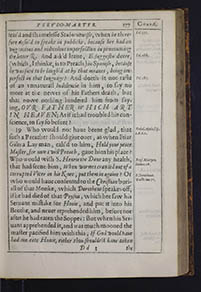 PSEVDO-MARTYR.
177
Chap. 6.
PSEVDO-MARTYR.
177
Chap. 6.
sear'd and shamelesse Stubornenesse,Fol. 335. when he there-
fore desir'd to speake in publicke, because hee had an
vngracious and ridiculous imperfection in pronouncing
the letter R. And ask'd leaue,Fol. 288. E suggestu dicere,
(which, I thinke, is to Preach) in Spanish, because
he was sure to be laugh'd at by that meanes, being im-
perfect in that language?Fol. 187. And doeth it not taste
of an vnnaturall Indolencie in him, to say no
more at the newes of his Fathers death, but
that nowe nothing hindered him from say-
ing, OVR FATHER WHICH ART
IN HEAVEN; As if it had troubled his con-
science, to say so before? 19 Who would not haue beene glad,Sedul. Apolo. l. 3.
c. 6. n. I. that
such a Preacher should giue ouer, as when Friar
Giles a Lay man, call'd to him, Hold your peace
Master, for now I will Preach, gaue him his place?
Who would wish S. Henrie the Dane any health,Engl. Martyro.
Ianua. 16.
that had seene him, When wormes crawled out of a
corrupted Vlcer in his Knee,B. Dorotheus.
Doctrina. 7a. put them in againe? Or
who would haue consented to the Christian buri-
all of that Monke, which Dorotheus speakes off,
if he had died of that Poyson, which hee saw his
Seruant mistake for Honie, and put it into his
Brothe, and neuer reprehended him, before nor
after he had eaten the Soppes: But when his Ser-
uant apprehended it, and was much mooued the
master pacified him with this, If God would haue
had me eate Honie, either thou shouldest haue taken Dd3 the 178
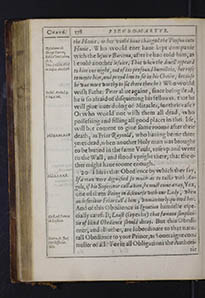 Chap. 6.
178
PSEVDO-MARTYR.
Chap. 6.
178
PSEVDO-MARTYR.
the Honie, or hee would haue changed the Poyson into
Honie. Relatione di
Diego Torrez.
Edit. Venet. 1604
fo. 5. Who would euer haue kept companie
with the Iesuite Barcena, after he had told him, as
he told another Iesuite, That when the diuell appeard
to him one night, out of his profound humilitie, hee rose This Iesuite died
in Cusco An. 1598
to meete him, and prayd him to sit in his Chaire, because
he was more worthy to sit there then he? Who would
wish Father Peter aliue againe, Sedul. Apolo. l. 3.
c. 24. n. 26. since being dead,
he is so afraid of disquieting his fellowes, that he
will giue ouer doing of Miracles, for their ease?
Or who would not wish them all dead, who
possessing and filling all good places in their life,
will bee content to giue some roome after their
death; Id. l. 3. c. 25. n. 18 as Friar Raynold, who hauing beene three
yeres dead, when another Holy man was brought
to be buried in the same Vault, rose vp and went
to the Wall, and stood vpright there, that the o-
ther might haue roome enough. Id. l. 2. c. 5. n. 8.20 This is that Obedience by which they say,
If a man were dignified so much as to talke with An-
gels, if his Superiour call'd him, he must come away; Yea,
one of them Being in discourse with our Lady, when
an inferiour Friar call'd him, vnmannerly quitted her.
And of this Obedience is Ignatius himselfe espe-
cially carefull,Epist, ad fratres
in Lusitan. Least (sayes he) that famous simplici-
tie of blind Obedience should decay. But this Obedi-
ence, and all other, are subordinate to that natu-
rall Obedience to your Prince, Extra. de Iur,
Iur. sufficiat.
Glo. as Soueraigne con-
troller of all: For in all Obligations the Authori-
tie 179
 PSEVDO-MARTYR.
179
Chap. 6.
tie of the Superiour is euer excepted.
21 And this Obedience must not be so blind,
PSEVDO-MARTYR.
179
Chap. 6.
tie of the Superiour is euer excepted.
21 And this Obedience must not be so blind,
but that it may both looke vpward, what God, in
his Lieuetenant appoints to bee done, and also
round about to see, wherein they may relieue o-
thers, and receiue from them. They may be cir-
cumspect, though they must not be curious. For
Abbayes, at first institution, were not all Chappels
but Schooles of Sciences, and Shops of manufact-
ures. Now they are come to that, that they cannot
worke,Regul. Benedict.
c. 48. Declarat. Quia Officia longa. They haue indeede so
many Offices, and so many Officers, that they
neede not worke. But this strict obedience was
impos'd vpon them then, because they were
great confluences of men of diuers Nations, Dispo-
sitions, Breedings, Ages, and Employments, and they
could be tied together in no knot so strongly, nor
meete in any one Center so concurrently, and v-
niformely, as in the Obedience to one Superi-
our; And what this Obedience was, and how
farre it extended: Aquinas, who vnderstood it
well,22. æ. q. 104.
Ar. 5. ad 3m. hath well express'd, That they are bound to
Obey only in those things which may belong to their Re-
gular conuersation. And this vse and office, that o-
bedience which is exhibited in our Colledges, ful-
fils and satisfies, without any of these vnnatural,
childish, stupid, mimique, often scandalous, and
sometimes rebellious singularities. 22 Any resolution which is but new borne in 180
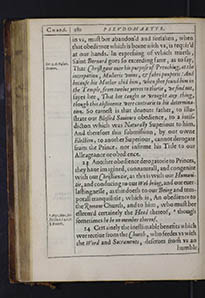 Chap. 6.
180
PSEVDO-MARTYR.
Chap. 6.
180
PSEVDO-MARTYR.
in vs, must bee abandon'd and forsaken, when
that obedience which is borne with vs, is requir'd
at our hands. In expressing of which trueth,
Saint Bernard goes so exceeding farre,Ser. 3. de Resurr.
Domini. as to say,
That Christ gaue ouer his purpose of Preaching, at the
increpation, Mulieris vnius, & fabri pauperis: And
because his Mother chid him, when shee found him in
the Temple, from twelue yeeres to thirtie, we find not,
sayes hee, That hee taught or wrought any thing,
though this abstinence were contrarie to his determina-
tion. So earnest is that deuoute father, to illu-
strate our Blessed Sauiours obedience, to a iuris-
dicton which was Naturally Superiour to him.
And therefore this submission, by our owne
Election, to another Superiour, cannot derogate
from the Prince, nor infirme his Title to our
Alleageance or obedience. 23 Another obedience derogatorie to Princes,
they haue imagined, connaturall, and congenite
with our Christianitie, as this is with our Humani-
tie, and conducing to our Wel-being, and our euer-
lastingnesse, as this doeth to our Being and tem-
porall tranquilitie; which is, An obedience to
the Romane Church, and to him, who must bee
esteem'd certainely the Head thereof, aa Azor. Mor. In-
stit. To. 2. l 4. c. 7.
§ Deinde. though
sometimes he be no member thereof. 24 Certainely the inestimable benefits which
wee receiue from the Church, who feedes vs with
the Word and Sacraments, deserues from vs an humble 181
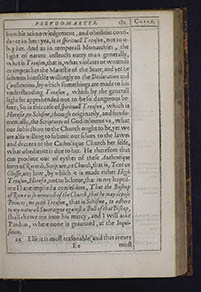 PSEVDO-MARTYR.
181
Chap. 6.
PSEVDO-MARTYR.
181
Chap. 6.
humble acknowledgement, and obedient confi-
dence in her: yea, it is spirituall Treason, not to o-
bey her. And as in temporall Monarchies, the
light of nature instructs euery man generally,
what is Treason, that is, what violates or wounds
or impeaches the Maiestie of the State, and yet he
submits himselfe willingly to the Declaration and
Constitutions, by which somethings are made to his
vnderstanding Treason, which by the generall
light he apprehended not to be so dangerous be-
fore; So in this case of spirituall Treason, which is
Heresie, or Schisme, though originarily, and funda-
mentally, the Scriptures of God informe vs, what
our subiection to the Church ought to be, yet we
are also willing to submit our selues to the lawes
and decrees of the Catholique Church her selfe,
what obedience is due to her. He therefore that
can produce out of eyther of these Authentique
sorts of Records, Scripture, or Church, that is, Text or
Glosse, any law, by which it is made either High
Treason, Heresie, not to beleeue, that in my baptis-
me I haue implied a confession, That the Bishop
of Rome is so monarch of the Church, that he may depose
Princes; or petit Treason, that is Schisme, to adhere
to my naturall Soueraigne against a Bull of that Bishop,
shall drawe me into his mercy, and I will aske
Pardon, where none is graunted, at the Inqui-
sition. 25 Else it is most reasonable (and that is euer Ee most 182
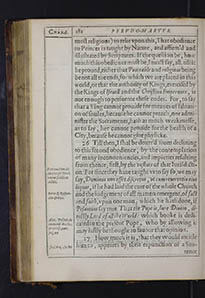 Chap. 6.
182
PSEVDO-MARTYR.
Chap. 6.
182
PSEVDO-MARTYR.
most religious) to relie vpon this, That obedience
to Princes is taught by Nature, and affirm'd and
illustrated by Scriptures. If the question be, how
much this obedience must be, I must say, all, till it
be proued, either that Peaceable and religious being
be not all the ends, for which we are placed in this
world, or that the authority of Kings, exercised by
the Kings of Israell and the Christian Emperours, is
not enough to performe these endes. For, to say
that a King cannot prouide for meanes of saluati-
on of soules, because he cannot preach, nor admi-
nister the Sacraments, hath as much weakenesse,
as to say, hee cannot prouide for the health of a
City, because he cannot giue physicke. 26 Till then, I shal be deterr'd from declining
to this second obedience, by the contemplation
of many inconueniencies, and impieties resulting
from thence; first, by the vastnes of that Iurisdicti-
on: For since they haue taught vs to say so, Extrau. Com. de
Maior: & Obed.
vnam sanctam
Addit. we may
say, Dominus non esset discretus, vt cum reuerentia eius
loquar, if he had laid the cure of the whole Church
and the iudgement of all matters emergent, Bertr. § Respon-
deo & dico. of fact
and faith, vpon one man; which he hath done, if
Pesantius say true, That the Pope is, Iure Diuino, di-
rectly Lord of all the World: which booke is dedi-
cated to the present Pope, Alex. Pesant. de
immunit. Eccles.
& potest. pont.
pag. 44 who by allowing it
may iustly be thought to fauour that opinion. 27 How much it is, that they would entitle
him to, Ind. Belg fo: 86 appeares by their expunction of a Sen-
tence 183
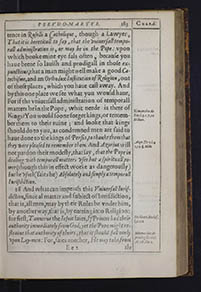 PSEVDO-MARTYR.
183
Chap. 6.
tence in Roselli a Catholique, though a Lawyer,
PSEVDO-MARTYR.
183
Chap. 6.
tence in Roselli a Catholique, though a Lawyer,
That it is hereticall to say, that the vniuersall tempo-
rall administration is, or may be in the Pope: vpon
which booke mine eye fals often, because you
haue beene so lauish and prodigall in those ex-
punctions, that a man might well make a good Ca-
techisme, and an Orthodox Institution of Religion, out
of those places, which you haue cast away. And
by this one place we see what you would haue,
For if the vniuersall administration of temporall
matters be in the Pope, what neede is there of
Kings? Simancha de
Rep. l. 3. c. 7. ex
Stobæo. You would soone forget kings, or remem-
ber them to their ruine; and looke that kings
should do to you, as condemned men are said to
haue done to the kings of Persia, to thanke them that
they were pleased to remember them. Azor. To 2. l. 4
c,. 19. § Mihi And Azorius will
not pardon their modesty, that say, that the Pope in
dealing with temporall matters vses but a spirituall po-
wer (though this in effect worke as dangerously)
but he vseth (saies he) Absolutely and simply a temporall
Iurisdiction. 28 And what can impeach this Vniuersall Iuris-
diction, since al matter and subiect of Iurisdiction,
that is, all men, may by their Rules be vnder him,
by another way, that is, by entring into Religion:
for first, De libert. Eccles.
l,. 2:. c:. I Tannerus the Iesuit saies, If Princes had their
authority immediately from God, yet the Pope might re-
straine that authority of theirs,Maynardus de
priuileg. Eccles.
Ar. 16. Nu 2. that it should fall onely
vpon Lay-men: For, saies another, He may take from Ee2 the 184
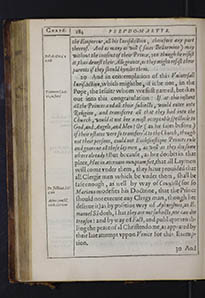 Chap. 6.
184
PSEVDO-MARTYR.
Chap. 6.
184
PSEVDO-MARTYR.
the Emperour, all his Iurisdiction, therefore any part
thereof. And as many as will (saies Bellarmine) may
without the consent of their Prince, Bell. de Cler. l I
c. vlt yea though he resist
it, thus deuest their Allegeance, as they might resist their
parents if they should hynder them. 29 And in contemplation of this Vniuersall
Iurisdiction, which might be, if it be not, in the
Pope; Tannerus l. 2. c.
12, in fine: the Iesuite whom we first named, breakes
out into this, congratulation: If at this instant
all the Princes and all their subiects, would enter into
Religion, and transferre all that they had into the
Church, would it not bee a most acceptable spectacle to
God, and Angels, and Men? Or (as he saies before)
if their estates were so transferr'd to the Church, though
not their persons, could not Ecclesiastique Princes rule
and gouerne all these lay men, as well as they doe some
others already? But because, as hee doubts in that
place, Hoc in æternum nunquam fiet, that all Laymen
will come vnder them, they haue prouided that
all Clergie men which be vnder them, shall be
safe enough, De Iastitut. l. I:
c: 10 as welll by way of Counsell (for so
Mariana modefies his Doctrine, that the Prince
should not execute any Clergy man, Aphor. confes.
verb. clericus though hee
deserue it) as by positiue way of Aphorismes, as E-
manuel Sâ doth, That they are not subiects, nor can doe
treason: and by way of Fact, and publique troub-
ling the peace of al Christendome, as appeared by
their late attempt vppon Venice for this Exemp-
tion. 30 And 185
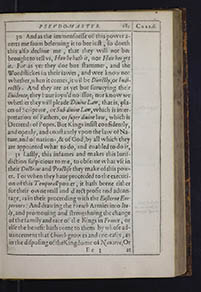 PSEVDO-MARTYR.
185
Chap. 6.
30 And as the immensnesse of this power a-
PSEVDO-MARTYR.
185
Chap. 6.
30 And as the immensnesse of this power a-uerts me from beleeuing it to bee iust, so doeth
this also decline me, that they will not bee
brought to tell vs, How he hath it, nor How hee got
it. For as yet they doe but stammer, and the
Word stickes in their iawes, and wee know not
whether, when it comes, it wil be Directly, or Indi-
rectly. And they are as yet but surueying their
Euidence; they haue ioyn'd no issue; nor know we
whether they will pleade Diuine Law, that is, pla-
ces of Scripture, or Sub diuine Law, which is inter-
pretation of Fathers, or super diuine law, which is
Decretals of Popes. But Kings insist confidently,
and openly, and constantly vpon the law of Na-
ture, and of nations, & of God, by all which they
are appointed what to do, and enabled to do it, 31 Lastly, this infames and makes this Iuris-
diction suspicious to me, to obserue what vse in
their Doctrine and Practise they make of this pow-
er. For when they haue proceeded to the executi-
on of this Temporall power, it hath beene either
for their owne reall and direct profit and aduan-
tage, as in their proceeding with the Easterne Em-
perours: And drawing the French Armies into Ita-
ly, and promouing and strengthning the change
of the family and race of the Kings in France, or
else the benefit hath come to them by whose ad-
uancement that Church growes and encreases, as
in the disposing of the Kingdome of Nauarre; Or Ee3 at 186
 Chap. 6.
186
PSEVDO-MARTYR.
Chap. 6.
186
PSEVDO-MARTYR.
at least, the example and terrour thereof magni-
fies the dignitie, and reputation of that Church,
and facilitates her other enterprises, for a good
time after, as a Shippe that hath made good way
before a strong winde, and vnder a full Sayle, will
runne a great while of her selfe, after shee hath
stricken saile. 32 VVWhen any of these reasons inuite them,
how small causes are sufficient to awake and call
vp this temporall Authoritie? The cause why Chil-
derique was deposed, 15. q. 6. Alius. was not, sayes the Canon,
for his Iniquities; but because he was Inutilis. And
this was not, sayes the Glosse, because hee was In-
sufficient, for then hee should haue an assistant, and co-
adiutor; but because hee was Effeminate. So that
the Pope may depose vpon lesse cause, then hee
can giue an assistant. For to bee Insuficient for the
Gouernement, is more directly against the office
of a King, then to bee subiect to an infirmitie,
which concernes his humanitie, not his office. 33 And when the officers and Commissio-
ners of the Romane Court, come to Syndicate
Kings, they haue already declar'd, what they will
call Enormities and Excesses, Paris de puteo
de syndic. Ca. de
Excess. Regum. by inuoluing almost
all faults, whether by Committing or Omitting in
generall words; As, When he doeth not that for which
he is instituted; when he vseth his prerogatiue without
iust cause, when he vexes his Subiects; when he permits
Priests to kisse his hands; when he proceeds indiscreetly, and 187
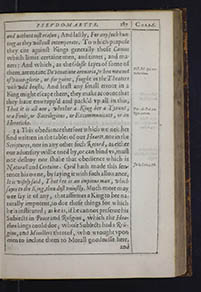 PSEVDO-MARTYR.
187
Chap. 6.
PSEVDO-MARTYR.
187
Chap. 6.
and without iust reason; And lastly, For any such hun-
ting as they will call intemperate. To which purpose
they cite against Kings generally those Canons
which limit certaine men, and times, and ma-
ners: And which, as the Glosse sayes of some of
them, Dist. 86. qui ve-
natoribus. are meant De venatione arenaria, When men out
of vaine-glorie, or for gaine, fought in the Theaters
with wild beasts. And least any small errour in a
King might escape them, they make account that
they haue enwrapp'd and pack'd vp all in this,
That it is all one, Par. de Put. ca.
Rex autem. whether a King bee a Tyrant,
or a Foole, or Sacrilegious, or Excommunicate, or an
Hereticke. 34 This obedience therfore which we neither
find written in the tables of our Hearts, nor in the
Scriptures, nor in any other such Record, as either
our aduersary wilbe tried by, or can bind vs, must
not destroy nor shake that obedience which is
Naturall and Certaine. In Io. l. 12. c. 56. Cyril hath made this sen-
tence his owne, by saying it with such allowance,
It is wisely said, That hee is an impious man, which
sayes to the King, thou dost vniustly. Much more may
wee say it of any, that affirmes a King to bee na-
turally impotent, to doe those things for which
he is instituted; as he is, if he cannot preserue his
Subiects in Peace and Religion, which the Hea-
then kings could doe; whose Subiects had a Reli-
gion, and Ministers thereof, who wrought vpon
men to incline them to Morall goodnesse here, and 188
 Chap. 6.
188
PSEVDO-MARTYR.
Chap. 6.
188
PSEVDO-MARTYR.
and to the expectation of future blessednesse after
death, though not by so cleare nor so direct waies
as Christian Religion doth. 35 The king therefore defends the Liberties
of the Church, as the nature of his office, which
he hath acknowledged, and Declar'd, and seal'd
to his Subiects by an Oath, binds him to do, if he
defend the Church of England from foraine v-
surpation. And a most learned and equall man
hath obserued well, Casub. de lib.
Eccles. fol. 46. That in the differences betweene
Gregorie the seuenth, and the Emperours, the defence
of the liberties of the Church, was the title and pretence
on both sides, Azor. Instit.
Moral. To. I. l. 5.
c. 14. in fine. And since a Iesuite hath affoorded vs
this confession, That the Prince hath this Authori-
tie ouer Bishops, that hee may call them as Peeres of
his Realme, And since their Clementines, or the
Glosser, De sent. & re
indic. Pastoralis
Glossa. yeeldes to vs, That a Church Prelate may
bee a Traytor, because hee holdes some temporalities:
how can they escape from being subiect in all o-
ther cases; since their naturall and natiue obedience
is of a stronger obligation, then the accepting or
possessing of these Temporalities: for, if Iure Diui-
no, the Character of Order, did obliterate and
wash out the Character of ciuill Obedience, and sub-
iection, the conferring of any temporall dignity
or possession, could not restore it; for vnder color
of a benefit, it should endammage and diminish
them, when a little Temporall honour or profit
shall draw their spirituall estate and person to secu-
cular 189
 PSEVDO-MARTYR.
189
Chap. 6.
cular iurisidiction: for, as Azorius will proue to vs,
PSEVDO-MARTYR.
189
Chap. 6.
cular iurisidiction: for, as Azorius will proue to vs,
the king may call a Bishoppe as a Baron to the Par-
liament, and as the Canonist will prooue to vs, he
may call him to the Barre as a Traytor. 36 To recollect therefore now, and to deter-
mine & end this point, the title which the Prince
hath to vs by Generation, and which the Church
hath by Regeneration, is all one now. For we are
not onely Subiects to a PrineePrince, but Christian Sub-
iects to a Christian Prince, and members as well
of the Church as of the Common-wealth, in
which the Church is. And as by being borne
in his Dominions, and of parents in his alleage-
ance, we haue by birth-right interest in his lawes
and protection: So by the Couenant of Almighty
God to the faithful and their Seede, by being born
of Christian Parents, we haue title to the Sacra-
ments; which the king (to whom, as all the king-
dome is his house, so al the Clergy are chaplaines)
takes care, that they duly administer to vs which
are his sonnes, and seruants. 37 Nor dooth the king and the Church di-
rect vs to diuers ends, one to Tranquility, the other
to Saluation, but both concurre in both: For wee
cannot ordinarily be saued (which seemes to be
the function of the Clergy) without the exercise of
morall vertue here in this life, nor can Christians do
those morall vertues (which seeme to bee the
Princes businesse) without faith, and keeping the Ff right 190
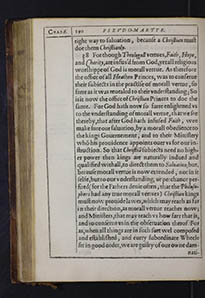 Chap. 6.
190
PSEVDO-MARTYR.
Chap. 6.
190
PSEVDO-MARTYR.
right way to saluation, because a Christian must
doe them Christianly. 38 For though Theologall vertues, Faith, Hope,
and Charity, are infus'd from God, yet all religious
worshippe of God is morall vertue. As therefore
the office of all Heathen Princes, was to conserue
their subiects in the practise of morall vertue, so
farre as it was reuealed to their vnderstanding; So
is it now the office of Christian Princes to doe the
same. For God hath now so farre enlightned vs
to the vnderstanding of morall vertue, that we see
thereby, that after God hath infused Faith, wee
make sure our saluation, by a morall obedience to
the kings Gouernement, and to their Ministery
whõ his prouidence appoints ouer vs for our in-
struction. So that Christiã subiects need no high-
er power then kings are naturally indued and
qualified withall, to direct them to Saluation; but,
because morall vertue is now extended, not in it
selfe, but to our vnderstanding, or perchance per-
fited (for the Fathers denie often, that the Philoso-
phers had any true morall vertues) Christian kings
must now prouide lawes, which may reach as far
in their direction, as morall vertue reaches now;
and Ministers, that may teach vs how farr that is,
and to conserue vs in the obseruation therof: For
as, when all things are in such sort wel composed
and established, and euery subordinate Wheele
set in good order, we are guilty of our owne dam-
nati- 191
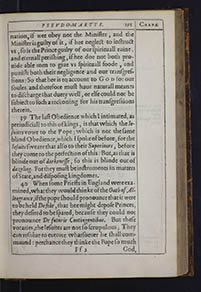 PSEVDO-MARTYR.
191
Chap. 6.
nation, if wee obey not the Minister, and the
PSEVDO-MARTYR.
191
Chap. 6.
nation, if wee obey not the Minister, and the
Minister is guilty of it, if hee neglect to instruct
vs, so is the Prince guilty of our spirituall ruine,
and eternall perishing, if hee doe not both pro-
uide able men to giue vs spirituall foode, and
punish both their negligence and our transgres-
sions: So that hee is to account to GOD for our
soules, and therefore must haue naturall meanes
to discharge that duety well, or else could not be
subiect to such a reckoning for his transgressions
therein. 39 The last Obedience which I intimated, as
preiudiciall to this of kings, is that which the Ie-
suites vowe to the Pope; which is not the same
blind Obedience, which I spoke of before, for the
Iesuits sweare that also to their Superiours, before
they come to the perfection of this: But, as that is
blinde out of darkenesse, so this is blinde out of
dazeling. For they must be instruments in matters
of State, and disposing kingdomes. 40 When some Priests in England were exa-
mined, what they would thinke of the Oath of Al-
leageance, if the pope should pronounce that it were
to be held De fide, that hee might depose Princes,
they desired to be spared, because they could not
pronounce De futuris Contingentibus. But these
votaries, the Iesuites are not so scrupulous; They
can resolue to execute whatsoeuer he shall com-
maund: perchance they thinke the Pope so much Ff2 God, 192
 Chap. 6.
192
PSEVDO-MARTYR.
Chap. 6.
192
PSEVDO-MARTYR.
God, (for Iesuites must exceede in euerything)
that in him, as in GOD, there can bee no Con-
tingency. And therefore vowing their trauell and
labour, to the corrupting and aliening of subiects,
to the combustion or translation of Kingdomes,
to the auiling and eradication of Princes, they do
not vow De futuris Contingentibus, but of things e-
uer constantly resolued in the Decree, and Coun-
sell, and purpose of the Bishop of Rome. 41 Though therefore Mat. Tortus be no Sopra. la. lettera
de palmieri Ro-
milo. Iesuite
himselfe, yet in respect of his Master, who was one,
I wonder he durst say, That the Iesuites made no o-
ther Nella Roccolta
fo. 183. vow of obedience to the Pope, then other religious
Orders did; which is such an excuse in their behalf,
as no accusation could offend them so much;
since their ambition is to serue the Pope by a nee-
rer Obligation then the rest: which appeares eui-
dently enough, in the Bul of Paul the third, where
this fourth vow is repeated. 42 And is it not a stange precipitation to vow
their helpe to all his errours? of which they con-
fesse he may commit many in matter of Fact, by
mis-information. So that they sweare to exe-
cute that, which they are not bound to beleeue
to be well commaunded: yea they are not bound
to beleeue, that he which commaunds them, is
that person whose commaundements by their
vow they are bound to doe, and yet they must do SimanchaSimancha. En-
chir. Iud. Tit. 5.
nu. 3.
them. For though they bee bound to obey the Pope, 193
 PSEVDO-MARTYR.
193
Chap. 6.
PSEVDO-MARTYR.
193
Chap. 6.
Pope, Yet they are bound to beleeue that Paul the fift is
Pope: because those Elections haue many vitia-
ting circumstances, which annuls them. For if
they could be certaine, that the Election were free
from all other corruptions, yet that Decretall in
the Septimes, Li. 1. To. 3. c. 1. of Simoniacall Election, must of neces-
sitie keepe all indifferent men in continuall anx-
ietie and perplexitie. For, if any thing by any Car-
dinall, were giuen, or promis'd before, though the Ele-
ction be by way of Assumtion and Adoration, when all
concurre in it, which they call, Viam spiritus Sancti,
and therefore not subiect to errour, Yet there is a
Nullitie in this Election, and the holy Ghosts confir-
mation workes nothing vpon it, And the Person
elected, hath neither spirituall nor temporall Iurisdicti-
on, but looses all the dignities which he had before, and
becomes incapable euer after; And no subsequent Act, of
Inthroning, Oathes of Obedience by the Cardinalls, nor
possession, though of long time, can make it good: And
euen those Cardinals, which were parties to the Simony,
may at any time after, depart frõ his obedience, & all the
rest of the Cardinals, which do not, forfeit their dignities. 43 It is scarce possible to bee hoped, that in
Elections there should be no degrees of that cor-
ruption, which this Decree labors to preclude,
& which, it takes knowledg, to be so clandestine,
and secretly caried, that comming to the point of
annulling all those promises which were so
made, your Law expresses it thus, Cum quauis Inex-
Ff3 cogitabili 194
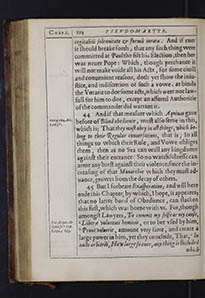 Chap. 6.
194
PSEVDO-MARTYR.
cogitabili solennitate & formà iurata. And if euer
Chap. 6.
194
PSEVDO-MARTYR.
cogitabili solennitate & formà iurata. And if euer
it should breake forth, that any such thing were
committed at Paul the fift his Election, then hee
was neuer Pope: Which, though perchance it
will not make voide all his Acts, for some ciuill
and conuenient reasons, doth yet show the iniu-
stice, and indiscretion of such a vowe, as binds
the Votarie to doe some acts, which were not law-
full for him to doe, except an assured Authoritie
of the commander did warrant it. 44 And if that measure which Aquinas gaue
before of Blind obedience, 22. æ. q. 104. Art.
5. ad 3m. must also serue in this,
which is; That they must obey in all things, which be-
long to their Regular conuersations, that is, In all
things to which their Rule, and Vowe obliges
them, then as no Sea can wall any kingdome
against their entrance: So no watchfulnesse can
arme any brest against their violence, since the in-
creasing of that Monarchie which they must ad-
uance, growes from the decay of others. 45 But I forbeare Exasperation; and will here
ende this Chapter; by which, I hope, it appeares,
that no latter band of Obedience, can slacken
this first, which was borne with vs. For, though
amongst Lawyers, To commit my selfe or my cause, Par. de put. de
Synd. fo a 179.
b.b 192. c.c 193.
aLiberæ voluntati hominis, or to bee vsed by him,
bProut voluerit, amount very farre, and create a
large power in him, yet they conclude, That, cIn
nullo arbitrio, How large so euer, any thing is included which 195
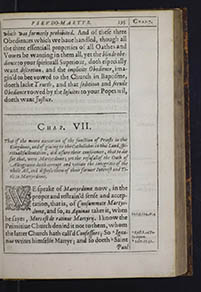 PSEVDO-MARTYR.
195
Chap. 7.
PSEVDO-MARTYR.
195
Chap. 7.
which was formerly prohibited. And of these three
Obediences which we haue handled, though all
the three essentiall properties of all Oathes and
Vowes be wanting in them all, yet the blinde obe-
dience to your spirituall Superiour, doth especially
want discretion, and the implicite Obedience, ima-
gin'd to bee vowed to the Church in Baptisme,
doeth lacke Trueth, and that seditious and seruile
Obedience vowed by the Iesuites to your Popes wil,
doeth want Iustice.
Chap. VII. That if the meere execution of the function of Priests in this
Kingdome, and of giuing to the Catholickes in this Land, spi-
rituall sustentation, did assure their consciences, that to die
for that, were Martyrdome; yet the refusall of the Oath of
Alleageance doeth corrupt and vitiate the integritie of the
whole Act, and dispoyle them of their former Interest and Ti-
tle to Martyrdome.
WWe speake of Martyrdome now, in the
proper and restrain'd sense and accep-
tation, that is, of Consummate Martyr-
dome, and so, as Aquinas takes it, when
he sayes, 22 æ. q. 124. Ar. 4 Mors est de ratione Martyrij. I know the
Primitiue Church denied it not to them, whom a Epist. 8. ad Po-
lycarpum.
the latter Church hath call'd Confessors; So a Igna-
tius writes himselfe Martyr; and so doeth b b 1. Cor. 15.31. Saint Paul 196
 Chap. 7.
196
PSEVDO-MARTYR.
Chap. 7.
196
PSEVDO-MARTYR.
Paul say, that hee dies daily. And sometimes,
when the Church enioyed her ease, and was pam-
per'd with securitie and rest, to excite men to a
publicke confession of their Faith, if there arose
any case wherein it was needfull, the Ministers of
that Church, which was euer apter and forwar-
der to suffer Martyrdome, when any long persecu-
tion had accustom'd her to the expectation and
patience and glorie thereof, then in the times of
dull abundance and tranquilitie, would affoord
the Title of Martyrs, to any persons who suffred
any persecution for the testimonie of Christ,
though they died not: Aquin. ibid. As the Church celebrates
the Martyrdome of Pope Marcellus, vvwho died in
Prison. So also sometimes their indulgence a-
lovvwed that Name, for some abstinencies and for-
bearings, if they conduced to the depressing of I-
dolatrie. For so Saint Chrisostome sayes, Aduers. Iudæos.
Orat. 5. If thou re-
fuse to be cured by Magique, and die of that sickenes,
thou art a Martyr De Purgat. l. I.
c. 7. § Quinto. 2 Deuotion is apt to ouerualew other mens
actions; And Bellarmine confesses out of Sulpitius,
That the people did long time deuoutely celebrate one
for a Martyr, who after appear'd, and told them that
he was damn'd. Extrau. de Reli-
quij. Audiuimus. So also were those men inclin'd,
whom Alexander the third reprehendes, For gi-
uing the honour of a Martyr to one that died drunke.
So doeth another Iesuite prooue Hyrcanus to bee
an Hereticke, Serarius Tri-
hæres. l. 2. c. 28. whom Albertus Magnus hath put in-
to 197
 PSEVDO-MARTYR.
197
Chap. 7.
to his Litany, and so drawne into continuall In-
PSEVDO-MARTYR.
197
Chap. 7.
to his Litany, and so drawne into continuall In-uocation euer since. And when Gregory the thir-
teenth made Commissioners to suruay the Mar-
tyrologe, Bini{us} To. I. f. 490 they found the Histories of Pope Felix the
second, so various and repugnant, that they were
determined to expunge his name, but that oppor-
tunely there was a Marble Coffin found, with
such an Inscription as alterd them, and relieued
the Popes fame. Bellar. vbi supra And one principall inducement
to the Pope, to come to these solemne Canonizati-
ons, is, because before the people did often mistake. 3 And this medicine, Ibid. c. 8. §. Dices as it was very late ap-
plied (for Bellarmine cannot finde, that the Popes
canonizd any in eight hundred yeares after Christ:) So
neither hath it, nor can it naturally extinguish
the disease. The most that it can worke, is an
Assurance, that they which are publiquely cano-
nized are true Saints: for Bellarmine saies, That it is
the opinion of Heretiques, that the Pope can erre in
such Canonizations: Ibid. c. 9. §. I.
§. Tertio. and yet, to proue it, he argues
but thus: If we beleeue that there was such a man as
Cæsar, why should we not beleeue that which God testi-
fies by miracles? But how shall wee beleeue that
these miracles are from God, or that he doth them
in testimony of that mans sanctity? For that mi-
racles are done, is not enough to constitute a
Saint, Extra. de Reliq.
gloss. verb. mira-
culis. for wicked men may doe them, say your
Authors: And in this case they can proceede no
farther, then to an Historicall beleefe, that Mira-
Gg cles 198
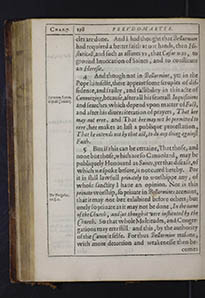 Chap. 7.
198
PSEVDO-MARTYR.
cles are done. And I had thought that Bellarmine
Chap. 7.
198
PSEVDO-MARTYR.
cles are done. And I had thought that Bellarmine
had required a better faith at our hands, then Hi-
storicall, and such as assures vs, that Cæsar was, to
ground Inuocation of Saints, and to constitute
an Heresie. 4 And though not in Bellarmine, yet in the
Pope himselfe, there appeare some scruples of dif-
fidence, and frailty, and fallibility in this acte of
Canonizing, Ceremon. Sacræ.
Cap. de Canoniz. because, after all his seuerall Inquisitions
and searches which depend vpon matter of Fact,
and after his diuers iteration of prayers, That hee
may not erre, and That hee may not be permitted to
erre, hee makes at last a publique protestation,
That he intends not by that act, to do any thing against
Faith. 5 But if this can be certaine, That those, and
none but those, which are so Canonized, may be
publiquely Honoured as Saints, yet that disease, of
which we spoke before, is not cured hereby. For
it is still lawfull priuately to worshippe any, of
whose sanctity I haue an opinion. Nor is this
priuate worship, De Purgat. c.
10. §. I. so priuate in Bellarmines account,
that it may not bee exhibited before others; but
onely so priuate as it may not be done, In the name
of the Church, and as though it were instituted by the
Church. So that whole Multitudes, and Congre-
gations may erre still: and this, by the authority
of the Canon it selfe. For thus Bellarmine reasons,
with more detortion and weakenesse then be-
comes 199
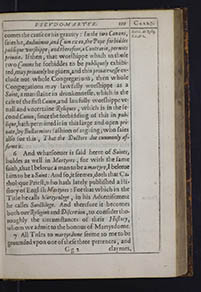 PSEVDO-MARTYR.
199
Chap. 7.
comes the cause or his grauity:
Extra. de Relig.
PSEVDO-MARTYR.
199
Chap. 7.
comes the cause or his grauity:
Extra. de Relig.
C. 1. & 2. In the two Canons,
saies he, Audiuimus, and Cum ex eo, the Pope forbiddes
publique worshippe; and therefore, a Contrario, permits
priuate. If then, that worshippe which in those
two Canons he forbiddes to be publiquely exhibi-
ted, may priuately be giuen, and this priuatenesse ex-
clude not whole Congregations, then whole
Congregations may lawfully worshippe as a
Saint, a man slaine in drunkennesse, which is the
case of the first Canon, and lawfully worshippe ve-
nall and vncertaine Reliques, which is in the se-
cond Canon; since the forbidding of this in pub-
lique, hath permitted it in this large and open pri-
uate, by Bellarmines fashion of arguing; who saies
also for this, That the Doctors doe commonly af-
firme it. 6 And whatsoeuer is said heere of Saints,
holdes as well in Martyres, for with the same
faith, that I beleeue a man to be a martyre, I beleeue
him to be a Saint: And so, it seemes, doth that Ca-
tholique Priest, who hath lately published a Hi-
story of English Martyres: For that which in the
Title he calls Martyrologe, in his Aduertisement
he calles Sanctiloge. And therefore it becomes
both our Religion and Discretion, to consider tho-
roughly the circumstances of their History,
whom we admit to the honour of Martyrdome. 7 All Titles to martyrdome seeme to me to be
grounded vpon one of these three pretences, and Gg2 claymes. 200
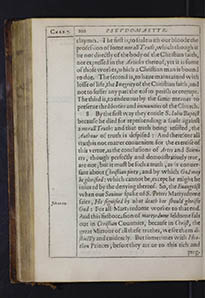 Chap. 7.
200
PSEVDO-MARTYR.
Chap. 7.
200
PSEVDO-MARTYR.
claymes. The first is, to seale with our bloode the
profession of some morall Truth, which though it
be not directly of the body of the Christian faith,
nor expressed in the Articles thereof, yet it is some
of those workes, which a Christian man is bound
to doe. The second is, to haue maintained with
losse of life, the Integrity of the Christian faith, and
not to suffer any part thereof to perish or corrupt.
The third is, to endeuour by the same meanes to
preserue the liberties and immunities of the Church. 8 By the first way they entitle S. Iohn Baptist
because he died for reprehending a fault against
a morall Truth: and that truth being resisted, the
Authour of truth is despised: And therefore all
truth is not matter conuenient for the exercise of
this vertue, as the conclusions of Artes and Scien-
ces, though perfectly and demonstratiuely true,
are not; but it must be such a truth, as is conuer-
sant about Christian piety, and by which God may
be glorified: which cannot be, except he might be
iniured by the denying thereof. So, the Euangelist
when our Sauiour spake of S. Peters Martyrdome
saies, Ioh. 21.19. He signified by what death hee should glorifie
God: For all Martyredome workes to that end.
And this first occasion of martyrdome seldome fals
out in Christian Countries, because in Christ, the
great Mirrour of all these truthes, we see them di-
stinctly and euidently. But sometimes with Hea-
then Princes, before they arriue to this rich and preg- 201
 PSEVDO-MARTYR.
201
Chap. 7.
PSEVDO-MARTYR.
201
Chap. 7.
pregnant knowledge, men which labour their
conuersion, begin, or touch by the way, some of
these Morall dueties; and if they grow odious, and
suffer for that, they are perfect Martyrs, dying for
a morall Trueth, and in the way to Christ. 9 By the second claime, which is the Inte-
gritie of Catholicke Religion, the professors of a-
ny Christian Church, will make a specious, and ap-
parant Title, if they suffer persecution in any o-
ther Christian Church. For the Church of Rome
will call the whole totall body and bulke of the
points of their profession, Integritie of Religion,
and the Reformed Churches call, soundnesse, pu-
ritie, and incorruptnesse, integritie. The Roman
thinkes Integritie hurt by nothing but Maimes,
and we, by Diseases. And one will prooue by his
death, that too little is professed, and the other,
that too much. But this aduantage we haue, that
by confession of our aduersaries, all that wee af-
firme, is True, and Necessarie: and vpon good
ground we assure our selues, that nothing else is
so, and we thinke that, a propensenesse to die, for
profession of those points, which are not neces-
sarie, will not constitute a Martyrdome, in such a
person especially as is of necessarie vse. 10 Amongst other things which our Bles-
sed Sauiour warnes his followers, this is one, That
none of them suffer as a busie body in other mens mat-
ters,1. Pet. 4.15. but if he suffer as a Christian, let him not be asha-
Gg3 med, 202
 Chap. 7.
202
PSEVDO-MARTYR.
med but glorifie God. And in another place, hee
Chap. 7.
202
PSEVDO-MARTYR.
med but glorifie God. And in another place, hee
cals them blessed: If others say all maner of euill of
them, falsely, and for his sake. Matth. 5.11. So that the prohibition
forbids vs, to suffer for those things which doe
not certainely appertaine to vs; And the instruction
ties the reward to these conditions, That the im-
putations be false, That they be imputed for Christs
sake, that is, to dishonour him, and that we suf-
fer because we are Christians. 11 Since therefore some of you, at your Exe-
cutions, and in other conferences, haue added this
to your comfort, and glory of Martyrdome, That
because the Kings mercie hath beene offred you, if you
would take the Oath, therefore you died for refusing the
same, (Though your Assertion cannot lay that
vpon the State, who hath two discharges; One,
that you were condemn'd for other Treasons, be-
fore that offer; The other, that the Oath hath no
such Capitall clause in it) yet since, as I said, you
take it vpon your Consciences to bee so; Let vs
Examine, whether your refusall of the Oath, bee
a iust cause to Die, vpon this point of Integritie of
Faith, by that measure which our Sauiour gaue in
his Prohibition, and in his Instruction. 12 Is it then any of your matters, or doeth it be-
long to you, by your Doctrine, and by your Exam-
ple, in refusing the Oath, to determine against
Princes Titles, or Subiects Alleageance? If this be
any of your matters, then you are not sent onely to doe 203
 PSEVDO-MARTYR.
203
Chap. 7.
PSEVDO-MARTYR.
203
Chap. 7.
doe Priestly functions; And if it be not, then you
suffer as busie bodies in other mens matters, if you suf-
fer for the Oath. 13 And then, what is imputed to you, which
is false (which is another condition required by
Christ) if you be called traytors then, when after
apparant transgressing of such lawes as make you
Traytors, you confirme to vs a perseuerance in
that Trayterous disposition, by refusing to sweare
Temporall Alleageance? Wherein are you lesse
subiect to that name, then those Priestes which
were in Actuall plots, since mentall Treason deno-
minates a man as well as mentall heresie? You nei-
ther can nor will condemne any thing in them,
but that they did their treason, before any Resolu-
tion of the Church: and haue you any resolution
of the Church, for this, That the King may be deposed,
when he is excommunicated? If you haue, you are in a
better forwardnesse then they, and you may vn-
dertake any thing, as soone as you will, that is, as
soone as you can. For you haue as good opinions
already, and as strong authorities, That a King of
another Religion then Romane, is in the state of an
excommunicate person, before Sentence, as you haue
for this, That an Excommunicate King may be depo-
sed; And would you thinke it a iust cause of Mar-
tyrdome, to auerre, that the King is already vnder ex-
communication? 14 And (to proceede farther in Christs Instru-
ction) 204
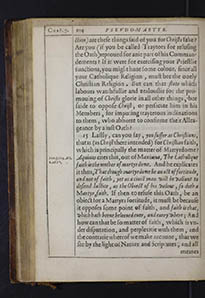 Chap. 7.
204
PSEVDO-MARTYR.
ction) are these things said of you for Christs sake?
Chap. 7.
204
PSEVDO-MARTYR.
ction) are these things said of you for Christs sake?
Are you (if you be called Traytors for refusing
the Oath) reproued for anie part of his Comman-
dements? If it were for exercising your Priestlie
functions, you might haue some colour, since all
your Catholique Religion, must bee the onely
Christian Religion. But can that state which
labours watchfullie and zealouslie for the pro-
mouing of Christs glorie in all other things, bee
saide to oppose Christ, or persecute him in his
Members, for imputing trayterous inclinations
to them, who abhorre to confirme their Allea-
geance by a iust Oath? 15 Lastly, can you say, you suffer as Christians,
that is (as Christ there intended) for Christian faith,
which is principally the matter of Martyrdome?
Aquinas cites this, 22 æ. q. 124. Art.
2. ad 1m. out of Maximus, The Catholique
faith is the mother of martyrdome. And he explicates
it thus, That though martyrdome be an act of fortitude,
and not of faith, yet as a ciuill man will be valiant to
defend Iustice, as the Obiect of his valour, so doth a
Martyr, faith. If then to refuse this Oath, be an
obiect for a Martyrs fortitude, it must be because
it opposes some point of faith, and faith is that,
which hath beene beleeued euer, and euery where; And
how can that be so matter of faith, which is vn-
der disputation, and perplexitie with them, and
the contrarie whereof we make account, that we
see by the light of Nature and Scriptures, and all meanes 205
 PSEVDO-MARTYR.
205
Chap. 7.
PSEVDO-MARTYR.
205
Chap. 7.
meanes conducing to a diuine and morall cer-
titude? 16 Leo the first, Epist. 24. in an Epistle to the Empe-
rour, by telling what hath beene, informes sum-
marilie and soundly, what should be a iust cause
of Martyrdome. None of the Martyrs, saies he, had
any other cause of their suffering, but the confession of
the true Diuinitie, and true humanitie in Christ. And
this was then the Integritie of faith, in both ac-
ceptations; All, and sound. Which is neither im-
paired in the extent, nor corrupted in the puritie,
by any thing proposed in the Oath. 17 But as Chrysostome expounding that place
of Ieremie, In Marc. Hom.
13. To. 2. fo. 270Domus Dei facta est spelunca Hyænæ, ap-
plies it to the Priests of the Iewes, as hardest of all,
to be conuerted, so may we apply it to the Priests
of the Romanes, who abhor the Oath, and deter
their Schollers. For, the Hyena, saies Chrysostome,
hath but one backe bone, and cannot turne except it
turne all at once. So haue these men, one back bone,
the Church; (for so saies Bellarmine, if we were a-
greed of that, we should soone be at an end:) and this
Church is the Pope; And they cannot turne, but
all at once, when he turnes; and this is the Integri-
tie of the faith they talke of. And, as that Father,
addes of the Hyena, Delectantur cadaueribus; they
are delighted with impious prouocations to the
effusion of bloud, by suggesting a false and ima-
ginarie martyrdome. Hh 18 The 206
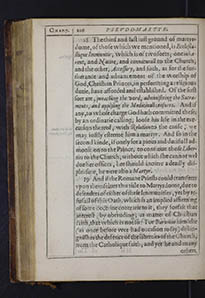 Chap. 7.
206
PSEVDO-MARTYR.
18 The third and last iust ground of martyr-
Chap. 7.
206
PSEVDO-MARTYR.
18 The third and last iust ground of martyr-dome, of those which we mentioned, is Ecclesia-
stique Immunitie, which is of two sorts; one inhæ-
rent, and Natiue, and connaturall to the Church,
and the other, Accessory, and such, as for the fur-
therance and aduancement of the worship of
God, Christian Princes, in performing a religious
dutie, haue afforded and established. Of the first
sort are, preaching the word, administring the Sacra-
ments, and applying the Medicinall censures. And if
any, to whose charge God hath committed these,
by an ordinarie calling, loose his life in the exe-
cution thereof, with Relation to the cause, we
may iustly esteeme him a martyr. And so in the
second kinde, if onely for a pious and dutifull ad-
monition to the Prince, to continue those Liber-
ties to the Church, without which she cannot wel
doe her offices, hee should incurre a deadly dis-
pleasure, he were also a Martyr. 19 And if the Romane Priests could transferre
vpon themselues this title to Martyrdome, due to
defenders of either of these Immunities, yet by re-
fusall of this Oath, which is an implied affirming
of some doctrine contrarie to it, they forfait that
interest by obtruding, as matter of Christian
faith, that which is not so: For Baronius himselfe
(as once before wee had occasion to say) distin-
guishes the defence of the liberties of the Church,
from the Catholique faith; and yet he and many others, 207
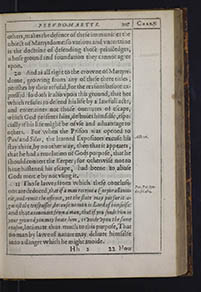 PSEVDO-MARTYR.
207
Chap. 7.
PSEVDO-MARTYR.
207
Chap. 7.
others, makes the defence of these immunities the
obiect of Martyrdome: so various and vncertaine
is the doctrine of defending those priuiledges,
whose ground and foundation they cannot agree
vpon. 20 And as all right to the crowne of Martyre-
dome, growing from any of these three titles,
perishes by their refusal, for the reasons before ex-
pressed: so doth it also vpon this ground, that hee
which refuses to defend his life by a lawfull acte,
and entertaines not those ouertures of escape,
which God presents him, destroies himselfe, espe-
cially if his life might be of vse and aduantage to
others. For when the Prison was opened to
Paul and Silas, Acts 16. the learned Expositors excuse his
stay there, by no other way, then that it appeares,
that he had a reuelation of Gods purpose, that he
should conuert the Keeper; for otherwise not to
haue hastened his escape, had beene to abuse
Gods mercie by not vsing it. 21 Those lawes from which these conclusi-
ons are deduced, Par. Put. Syn-
dic. fol. 484. that if a man receiue a Corporall iniu-
rie, and remit the offence, yet the state may pursue it a-
gainst the trespasser, because no man is Lord of himselfe:
and that a couenant from a man, that if you finde him in
your ground you may beate him, is voide vpon the same
reason, Intimate thus much to this purpose, That
no man by lawe of nature may deliuer himselfe
into a danger which he might auoide. Hh2 22 How 208
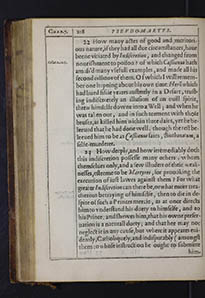 Chap. 7.
208
PSEVDO-MARTYR.
22 How many actes of good and meritori-
Chap. 7.
208
PSEVDO-MARTYR.
22 How many actes of good and meritori-ous nature, if they had all due circumstances, haue
beene vitiated by Indiscretion, and changed from
nourishment to poison? Collat. 2. ca. 5. of which Cassianus hath
amass'd many vsefull examples, and made all his
second collation of them. Of which I will remem-
ber one hapning about his own time. Herō which
had liued fiftie yeares austerely in a Desart, trust-
ing indiscreetely an illusion of an euill spirit,
threw himselfe downe into a Well; and when he
was taken out, and in such torment with those
bruses, as killed him within three daies, yet he be-
leeued that he had done well, though the rest be-
leeued him to be as Cassianus saies, Biothanatum, a
selfe-murderer. 23 How deeply, and how irremediably doth
this indiscretion possesse many others, whom
themselues only, and a few illuders of their weak-
nesses, esteeme to be Martyres, for prouoking the
execution of iust lawes against them? For what
greater Indiscretion can there be, or what more trea-
cherous betraying of himselfe, then to die in de-
spite of such a Princes mercie, as at once directs
him to vnderstand his duety to himselfe, and to
his Prince: and shewes him, that his owne preser-
uation is a naturall duety; and that hee may not
neglect it in any cause, but where it appeares eui-
dently, Catholiquely, and indisputably (amongst
them to whose instruction he ought to submitte him- 209
 PSEVDO-MARTYR.
209
Chap. 7.
PSEVDO-MARTYR.
209
Chap. 7.
himselfe) that God may bee glorified in it; And
that his obedience to the King was borne in him,
and therfore was once, without all question, due,
& could not be taken away, without his consent,
who is damnified by the losse of a Subiect; at
least by such a litigious Authoritie, as is yet in
Disputation, What it is, whence it comes, and how it
resides in him, and how it is executed. 24 For as a man may be felo de se, by destroy-
ing himselfe by our Law; And fur de se, by depar-
ting, and stealing himselfe away, from him to
whõ his seruice is due, by Imperial law: so he may
be proditor de se, by the law of Nature, if hee des-
cend from the Dignitie of humanitie, & submit
himselfe to an vsurpation, which he ought to re-
sist, which is; All violence and danger which hee
might auoide. 25 And since, if the King would pardon him,
vpon doing of any act, which depended vpon his
owne will, he were guiltie of his death, if hee re-
fused it, he is so also in this case, since he can pro-
pose to himselfe no such restraint as binds his wil;
For scruples, and things in Opinion and Disputation,
do not binde in this case; Of which we shall haue
proper occasion to speake in the next Chapter. 26 Let vs then proceede further, to that which
giues the forme, and measure, and merit, euen to
Martyrdome it-selfe, which is Charitie. And this
is not meant onely of Charitie, as it is a Theolo-
Hh3 gall 210
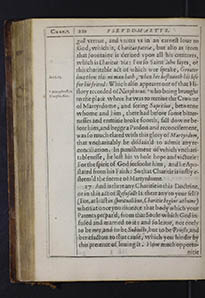 Chap. 7.
210
PSEVDO-MARTYR.
gall vertue, and vnites vs in an earnest loue to
Chap. 7.
210
PSEVDO-MARTYR.
gall vertue, and vnites vs in an earnest loue to
God, which is, Charitas patriæ, but also as from
that fountaine is deriued vpon all his creatures,
which is Charitas viæ: For so Saint Iohn sayes, of
this charitable act of which wee speake, Greater
loue then this no man hath, Io. 15. 13 when hee bestoweth his life
for his friend: Which also appeares out of that Hi-
story recorded of Nicephorus: a a Metaphrast. in
Nicepho. Mar. who being brought
to the place where he was to receiue the Crowne
of Martyrdome, and seeing Sapritius, betweene
whome and him, there had before some bitter-
nesses and enmitie broke foorth, fall downe be-
fore him, and begge a Pardon and reconcilement,
was so much elated with this glory of Martyrdom,
that vncharitably he disdain'd to admit any re-
conciliation. In punishment of which vnchari-
tablenesse, he lost his whole hope and victorie:
For the spirit of God forsooke him, and he Apo-
stated from his Faith: So that Charitie is iustly e-
steem'd the forme of Martyrdome. 27 And is there any Charitie in this Doctrine,
or in this act of Refusall? Is there any to your self?
(For, at least in spiritualibus, Charitie begins at home)
when at once you diuorce that body which your
Parents prepar'd, from that Soule which God in-
fused and married to it: and so leaue, not onely
to be men, and to be Subiects, but to be Priests, and
benefactors to that cause, which you hinder by
this pretence of louing it. How much opportu-
nitie 211
 PSEVDO-MARTYR.
211
Chap. 7.
nitie of Merit, euen in aduancing the Catholique
PSEVDO-MARTYR.
211
Chap. 7.
nitie of Merit, euen in aduancing the Catholique
cause, which to you is so certaine, doe you loose,
by exposing your selfe to certaine ruine, vpon vn-
certaine foundations? Is there any charitie to the
Church, or partie, or faction, which you haue in
this Kingdom? towards whom the King brought
with him so much tendernesse, that hee cast in a
dead sleepe all bloudy lawes, and in a slumber all
pecuniarie lawes which might offend, & aggrieue
them. Is it charitably done towards them, that
by your vnnecessarie act, their peace be interrup-
ted, his Maiesties sweetnesse distasted, his soft-
nesse indured, and those faire impressions which
hee had admitted, That ciuill obedience might
consist with your Religion, defaced and oblitera-
ted? And that to all these should succeede, iea-
lousies in him, imputations vpon them, and du-
tifull solicitations from his Parliament, & Coun-
saile, and Subiects of all rankes, to awaken his
lawes against these suspitious men? 28 Was it charitably done of that Priest, Ieruase. who
apprehending a generall inclination of taking the
Oath, aduanced it so farre, as to make a Declara-
tion that it was lawfull, and neuer retracting that
opinion, yet would die in the refusall thereof, be-
cause it seemed not expedient to him, to take it then;
and so to cast snares and tortures vpon their con-
sciences, who were before in possessiõ of a peace-
able, & (by his own testimony) a iust resolution? 29 When 212
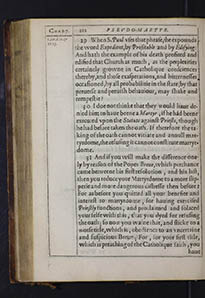 Chap. 7.
212
PSEVDO-MARTYR.
1. Cor. 6. 12. &
Chap. 7.
212
PSEVDO-MARTYR.
1. Cor. 6. 12. &
10. 23.29 When S. Paul vses that phrase, he expounds
the word Expedient, by Profitable and by Edifying:
And hath the example of his death profited and
edified that Church as much, as the perplexities
certainely growne in Catholique consciences
thereby, and those exasperations, and bitternesses
occasioned, by all probabilitie in the state, by that
peruerse and peeuish behauiour, may shake and
tempest it? 30 I doe not thinke that they would haue de-
nied him to haue beene a Martyr, if he had beene
executed vpon the Statute against Priests, though
he had before taken the oath. If therefore the ta-
king of the oath cannot vitiate and annull mar-
tyrdome, the refusing it cannot constitute martyr-
dome. 31 And if you will make the difference one-
ly by reason of the Popes Breue, which perchance
came betweene his first resolution, and his last,
then you reduce your Martyrdome to a more slip-
perie and more dangerous distresse then before:
For as before you quitted all your benefite and
interest to martyrdome, for hauing exercised
Priestly functions, and proclaimed and solaced
your selfe with this, that you dyed for refusing
the oath; so now you waine that, and sticke to a
worse title, which is, obedience to an uncertaine
and suspicious Breue; For, for your first title,
which is preaching of the Catholique faith, you haue 213
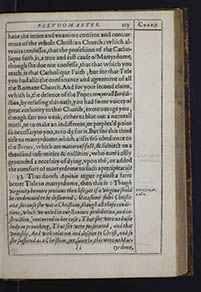 PSEVDO-MARTYR.
213
Chap. 7.
PSEVDO-MARTYR.
213
Chap. 7.
haue the intire and vnamine consent and concur-
rence of the whole Christian Church; which al-
waies confesses, that the profession of the Catho-
lique faith, is, a true and iust cause of Martyrdome;
though she doe not confesse, that that which you
teach, is that Catholique Faith, but for that Title
you had also the consonance and agreement of all
the Romane Church. And for your second claim,
which is, the defence of the Popes temporall Iurisdi-
ction, by refusing this oath, you had some voices of
great authority in that Church, to encourage you,
though farr too weak, either to blot out a naturall
truth, or to make an indifferent, or perplex'd point
so necessary to you, as to dy for it. But for this third
title to martyrdome, which arises frō obedience to
the Breues, which are matters of fact, & subiect to a
thousand infirmities & nullities, who euer iustly
grounded a necessity of dying, vpon thē, or added
the comfort of martyrdome to such a precipitatiõ? 32 Thus dooth Aquinas argue against a farre
better Title to martyrdome, then this is: Though
virginity be more pretious then life, 22 æ. q. 124. ar.
4. ad 2. yet if a virgine shold
be condemned to be deflowred, Occasione fidei Christi-
anæ, because she was a Christian, though all those condi-
tions, which we noted in our Sauiors prohibition, and in-
struction, concurred in her case, That she were no busie
body in prouoking, That she were persecuted, and that
vniustly, And with relation and despite to Christ, and so
she suffered as a Christian, yet, saies he, this were no Mar-
Ii tyrdome. 214
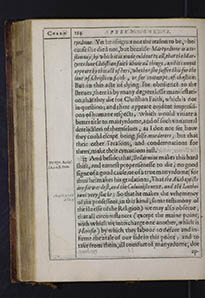 Chap. 7.
214
PSEVDO-MARTYR.
tyrdome. Yet he assignes not the reason to be, be-
Chap. 7.
214
PSEVDO-MARTYR.
tyrdome. Yet he assignes not the reason to be, be-cause she died not, but because Martyrdome is a te-
stimony, by which it is made euident to all, that the Mar-
tyres loue Christian faith aboue all things, and it cannot
appeare by this act of hers, whether she suffer this for the
loue of Christian faith, or for contempt of chastitie.
But in this acte of dying for obedience to the
Breues, there is by many degrees lesse manifestati-
on, that they die for Christian Faith, which is not
in question; and there appeare euident impressi-
ons of humane respects, which would vitiate a
better title to martyrdome, and of such vnnatural
dereliction of themselues, as I doe not see how
they could escape being selfe-murderers, but that
their other Treasons, and condemnations for
them, make their executions iust. De Not. Eccles.
l. 4. c. 2. § Item.33 And besides that, Bellarmine makes this hard
shift, and earnest propensenesse to die, no good
signe of a good cause, or of a true martyrdome (for
thus he makes his gradations, That the Anabaptists
are forwardest, and the Caluinists next, and the Luthe-
rans very slacke: So that he makes the vehemency
of the professors, in this kind, some testimony of
the ilnesse of the Religion) we may also obserue,
that all circumstances (except the maine point,
with which we intercharge one another, which is
Heresie) by which they labour to deface and in-
firme the zeale of our side in this point, and to
take from them, all comfort of martyrdome, doe ap-
ap- 215
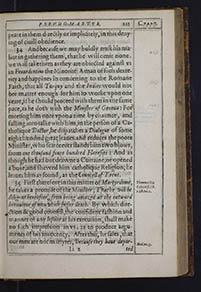 PSEVDO-MARTYR.
215
Chap. 7.
peare in them directly or implicitely, in this deny-
PSEVDO-MARTYR.
215
Chap. 7.
peare in them directly or implicitely, in this deny-ing of ciuill obedience. 34 And because we may boldly trust his ma-
lice in gathering them, that he will omit none,
we will take them as they are obiected against vs
in Feuardentius the Minorite: A man of such dexte-
rity and happines in conuerting to the Romane
Faith, that all Turquy and the Indies would not
bee matter enough for him to worke vpon one
yeare, if he should proceed with them in the same
pace, as he doth with the Minister of Geneua: For
meeting him once vpon a time by chaunce, and
falling into talke with him, in the person of a Ca-
tholique Doctor, he dispatches a Dialogue of some
eight hundred great leaues, and reduces the poore
Minister, who scarce euer stands him two blows,
from one thousand foure hundred Heresies: And as
though he had but drawne a Curtaine, or opened
a boxe, and shewed him catholique Religion, he
leaues him as found, as the Councell of Trent. 35 First therefore in this matter of Martyrdome, Theomachia
Caluinist. l. 8.
c. 18. nu. 1.
he takes a promise of the Minister, That he will be
diligent hereafter, from being amazed at the outward
behauiour of men which suffer death. By which dire-
ction & good counsell, the confident fashion and
manner of any Iesuite at his execution, shall make
no such impression in vs, as to produce argu-
ments of his innocency. After this, he saies, that
our men are not martyres, Ibid. nu. 3. Because they haue depar-
Ii2 ted 216
 Chap. 7.
216
PSEVDO-MARTYR.
ted from the Church, in which they were baptized, and
Chap. 7.
216
PSEVDO-MARTYR.
ted from the Church, in which they were baptized, and
haue not kept their promise made in Baptisme, but are
therefore Apostats and Antichrists. Nu. 4. Another reason
he assignes against them, because they haue beene put
to death for conspiracies, rebellions, tumults, and ciuill
Warres against lawfull Princes, and that therefore
they haue beene proceeded against in Ordinary forme
of Iustice, Nu. 6. as Traytors. And againe, hee saies,
They haue beene iustly executed for making, and di-
uulging libells against Princes. And for Acts against
a Canon of the Eliberitane Councell, Nu. 10. of which I
spoke before. And lastly, this despoiles vs of the
benefite of Martyrdome in his account, Because
we offer our selues to dangers, and punishments, seeking
for honour out of misery, and blowen vp with ambition
and greedinesse of vaine glorie. Thus farre Feuarden-
tius charges vs. 36 And is it not your case also, to forfait your
Martyrdome vpon the same circumstances? Are
not many of you departed from your promise in
baptisme to our Church? or did those which vn-
dertooke for you, euer intend this forsaking? and
this act of departing is by Feuardentius, made an
Essentiall circumstance, abstract, and indepen-
dent and incohaerent with that of the Catholique
Church, for that is another alone by it selfe. 37 And haue not you beene proceeded with,
in Ordinarie course of Iustice, as Traytors, for Rebel-
lions, and Conspiracies, and Tumults? And after so many 217
 PSEVDO-MARTYR.
217
Chap. 7.
PSEVDO-MARTYR.
217
Chap. 7.
many protestations so religiously deliuered, so
vehemently iterated, so prodigally sealed with
bloud, and engaging your Martyrdome vpon
that issue, that you neuer intermedled with mat-
ters of state, nor had any other scope or marke of
all your desires and endeuours, but the replanta-
tion of Catholique Religion, hath not the Recor-
der and mouth of all the English Iesuites, confes-
sed, (vpon a mistaking, that the euennesse of his
Maiesties disposition might be shaked by this in-
sinuation,) a a Iudgement of
a Catholique of
the Apologie of
the Oath. Pag.
91.That in the Sentence of Excommunica-
tion against Queene Elizabeth, the Popes relating to a
statute in England, respected the Actuall right of his
Maiesties mother, and of him, and proceeded for the re-
mouall of that Queene, whom they held an vsurper, in
fauour of the true inheritours oppressed by her, not only
by spirituall, but temporall armes, also, as against a pub-
lique Malefactor, and Intruder. And hauing thus
like an indiscreete Aduocate, preuaricated for the
Pope, doth hee not as much betray all his owne
complices, when he addes, This doth greatly iustifie
the endeuours and desires of all good Catholique people,
both at home, and abroad, against her, their principall
meaning being euer knowne to haue beene, the deliue-
rance and preferment of the true heire, most wrongfully
kept out, and vniustly persecuted for righteousnes sake.
Did you intend nothing else, but Catholique Re-
ligion, and yet was the desire, and endeuour of all
good Catholiques at home, and abroade, to re-
Ii3 moue 218
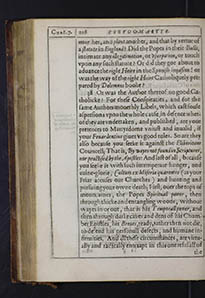 Chap. 7.
218
PSEVDO-MARTYR.
moue her, and plant another, and that by vertue of
Chap. 7.
218
PSEVDO-MARTYR.
moue her, and plant another, and that by vertue of
a statute in England? Did the Popes in their Bulls,
intimate any illegitimation, or vsurpation, or touch
vpon any such statute? Or did they goe about to
aduance the right Heire in the Spanish Inuasion? or
was the way of the right Heire Catholiquely pre-
pared by Dolemans booke? 38 Or was the Author thereof no good Ca-
tholicke? For these Conspiracies, and for the
same Authors monethly Libels, which cast foule
aspersions vpon the whole cause in defence wher-
of they are vndertaken, and published, are your
pretences to Martyrdome vniust and inualid, if
your Feuardentius giues vs good rules. So are they
also because you seeke it against the Eliberitane
Councell; That is, By wayes not found in Scriptures,
nor practised by the Apostles: And last of all, because
you seeke it with such intemperate hunger, and
vaine-glorie, Cultum ex Miseria quærentes (as your
Friar accuses our Churches) and hunting and
pursuing your owne death; First, ouer the tops of
mountaines, the Popes Spirituall power, then
through thicke and entangling woods, without
wayes in or out, that is his Temporall power, and
then through darke caues and dens of his Cham-
ber Epistles, his Breues, ready, rather then not die,
to defend his personall defects, and humane in-
firmities. And all these circumstances, are virtu-
ally and radically enwrapt in this one refusall of the 219
 PSEVDO-MARTYR.
219
Chap. 7.
PSEVDO-MARTYR.
219
Chap. 7.
the Oath, which therefore alone doeth defeate
all your pretences to Martyrdome. 39 And though it may perchance truely bee
said by you, that all those persons which the Re-
formed Churches haue Enregistred in their Marty-
rologies, are not certainely and truely Martyrs, by
those Rules to which we binde the signification
of the word in this Chapter, and in which you
account, all which die by way of Iustice, for ad-
uancing the Romane Doctrine or Dignitie, by
what seditious way so euer, to be true Martyrs, yet
none of them hath euer transgressed so farre, as
your Example would warrant them. For, not to
speake of Baronius his Martyrologe, where verie
many are enrolled, which liued their Naturall
time, and without any externall persecu ion for
their faith, and where verie many of the olde Te-
stament are recorded, besides those which are ca-
nonized in the Epistle to the Hebrewes, Ca. 11.and ma-
nie which are mentioned in that Epistle are left
out by him, not onely Enoch, Noe, and such other
as suffered not death in their bodies, as Martyrs,
but euen Abel whom he might haue beene bolde
to call a Martyr; to omit him, I say, why doth our
Countryman amongst you, which hath lately cō-
piled an English Martyrologe, present a Calender, in
which of almost 500 whom he names, scarse 60
are Martyrs; and of the rest, some were not of our
Nation, as Constantine the Emperour, whose fe-
stiuall 220
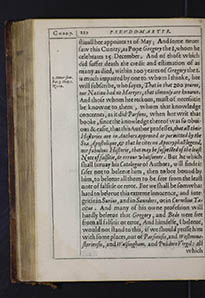 Chap. 7.
220
PSEVDO-MARTYR.
stiuall hee appoints 21 of May; And some neuer
Chap. 7.
220
PSEVDO-MARTYR.
stiuall hee appoints 21 of May; And some neuer
saw this Cuntry, as Pope Gregory the I, whom he
celebrates 25 December. And of those which
did suffer death the credit and estimation of as
many as died, within 200 yeares of Gregory the I.
is much impaired by one to whom I thinke, 3. Conuersions.
Par. 3. Chap. 1.
Nu. 19. hee
will subscribe, who sayes, That in that 200 yeares,
our Nation had no Martyrs, that cōmonly are knowne.
And those whom hee reckons, must of necessitie
be knowne to them, whom that knowledge
concernes, as it did Parsons, when hee writ that
booke, since the knowledge thereof was so obui-
ous & easie, that this Author professes, that all their
Histories are in Authors approued or permitted by the
Sea Apostolique, & that he cites no Apocryphall legend
nor fabulous Historie, that may be suspected of the least
Note of falsitie, or errour whatsoeuer. But he which
shall suruay his Catalogue of Authors, will finde it
safer not to beleeue him, then to bee bound by
him, to beleeue all them to be free from the least
note of falsitie of error. For we shall be somwhat
hard to beleeue this extreme innocence, and inte-
gritie in Surius, and in Saunders, or in Cornelius Ta-
citus. And many of his owne profession will
hardly beleeue that Gregory, and Bede were free
from all falsitie or error, And himselfe, I beleeue,
would not stand to this, if we should presse him
with some places, out of Parsiensis, and Westmona-
steriensis, and Walsingham, and Polidore Virgil: all which 221
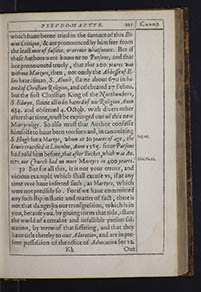 PSEVDO-MARTYR.
221
Chap. 7.
PSEVDO-MARTYR.
221
Chap. 7.
which haue beene tried in the furnace of this Di-
uine Critique, & are pronounced by him free from
the least note of falsitie, or errour whatsoeuer. But if
these Authors were knowne to Parsons, and that
hee pronounced truely, that that 200 yeares was
without Martyrs, then, not onely the Abbesse of E-
lies heardsman, S. Alnoth, slaine about 670 in ha-
tred of Christian Religion, and celebrated 27 Febru.
but the first Christian King of the Northumbers,
S. Edwyn, slaine also in hatred of our Religion Anno
634. and obserued 4. Octob. with diuers other
after that time, must be expunged out of this new
Martyrologe. So also must that Author confesse
himselfe to haue been too forward, in canonizing
S. Hugh for a Martyr, Iuly. 27.whom at 10 yeares of age, the
Iewes crucified at Lincolne, Anno 1255. since Parsons
had told him before, that after Becket, which was An.
1171. our Church had no more Martyrs in 400 yeares.Ibid. Nu. 21. 39 But for all this, it is not your errour, and
vicious example which shall excuse vs, if at any
time wee haue inserted such, as Martyrs, which
were not precisely so. For if we haue committed
any such slip in storie and matter of fact, there is
not that danger in our transgression, which is in
you, because you, by giuing them that title, assure
the world of a certaine and infallible present sal-
uation, by vertue of that suffering, and that they
haue title thereby to our Adoration, and are in pre-
sent possession of the office of Aduocation for vs. Kk Out 222
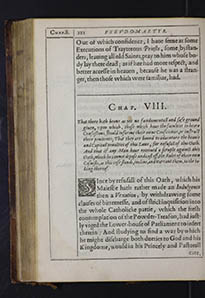 Chap. 8.
222
PSEVDO-MARTYR.
Chap. 8.
222
PSEVDO-MARTYR.
Out of which confidence, I haue seene at some
Executions of Trayterous Priests, some bystan-
ders, leauing all old Saints, pray to him whose bo-
dy lay there dead; as if hee had more respect, and
better accesse in heauen, because he was a stran-
ger, then those which were familiar, had.
Chap. VIII. That there hath beene as yet no fundamentall and safe ground
giuen, vpon which, those which haue the faculties to heare
Confessions, should informe their owne Consciences, or instruct
their penitents; That they are bound to aduenture the heauie
and Capitall penalties of this Lawe, for refusall of this Oath.
And that if any Man haue receiued a scruple against this
Oath, which he cannot depose and cast off, the Rules of their own
Casuists, as this case stands, incline, and warrant them, to the ta-
king thereof.
SInceSince by refusall of this Oath, which his
Maiestie hath rather made an Indulgence
then a Vexation, by withdrawing some
clauses of bitternesse, and of strict inquisition into
the whole Catholicke partie, which the fresh
contemplation of the Powder-Treason, had iust-
ly vrged the Lower-house of Parliament to insert
therein: And studying to find a way by which
he might discharge both dueties to God and his
Kingdome, would in his Princely and Pastorall care, 223
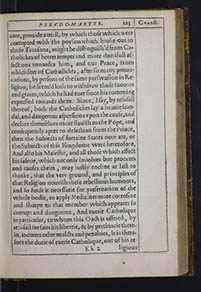 PSEVDO-MARTYR.
223
Chap. 8.
PSEVDO-MARTYR.
223
Chap. 8.
care, prouide a triall, by which those which were
corrupted with the poyson which broke out in
those Treasons, might be distinguish'd from Ca-
tholickes of better temper and more due ifull af-
fections towardes him, and our Peace, from
which sort of Catholickes, after so many prouo-
cations, by persons of the same perswasion in Re-
ligion, he seem'd loth to withdraw those fauours
and graces, which he had euer since his comming
expressed towards them. Since, I say, by refusall
thereof, both the Catholickes lay a heauie scan-
dal, and dangerous aspersions vpon the cause, and
declare themselues more slauish to the Pope, and
consequently apter to defection from the Prince,
then the Subiects of forraine States now are, or
the Subiects of this Kingdome were heretofore,
And also his Maiestie, and all those which affect
his safetie, which not only inuolues but procures
and causes theirs, may iustly encline at last to
thinke, that the very ground, and principles of
that Religion nourish these rebellious humours
and so finde it necessarie for preseruation of the
whole bodie, to apply Medicines more corrosiue
and sharpe to that member which appeares so
corrupt and dangerous, And euerie Catholique
in particular, to whom this Oath is offered, by
refusall forfaits his libertie, & by pertinacie there-
in, incurres other mulcts and penalties, It is there-
fore the dutie of euerie Catholique, out of his re-
Kk2 ligious 224
 Chap. 8.
224
PSEVDO-MARTYR.
ligious zeale to the cause, drawne into suspition
Chap. 8.
224
PSEVDO-MARTYR.
ligious zeale to the cause, drawne into suspition
thereby, and out of his Naturall obligation for
preseruing his life, fame, and fortune, all which
are endangered by this refusall, not to aduenture
the losse of these, but vpon Euidence of much
clearenesse, and grounds of strong assurednesse,
and constancie. 2 And as it is certaine, that at the first promul-
ging of this oath, they had no such ground, nor
Euidence (for then, that light must haue beene
vpon them all, and so many good and earnest
maintainers of that Religion, would not haue
enclined to the Oath, if they had had such Eui-
dence against it) so also after some scruples were
iniected, and the tendernesse of some consciences
vitiated and distracted with some doubts, and
that it had beene submitted to Disputation, and
consulting amongst themselues, and so passed all
those furnaces of Examination, it was held law-
full, and accordingly many tooke it. So that nei-
ther by the Euident and vndeniable authoritie of
Nature, or Scripture, nor by Deductions and
conclusions necessarily deriued and issuing from
thence, any Conscience had sufficient assurance,
to incurre these dangers. 3 If since, by some arguments of probabili-
tie, and of Conueniencie, or by some propositi-
ons propagated & deduced from those first prin-
ciples of Nature, and Scripture, by so many des-
cents 225
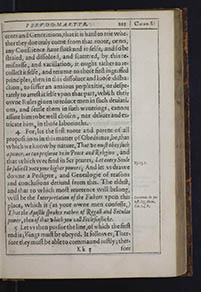 PSEVDO-MARTYR.
225
Chap. 8.
cents and Generations, that it is hard to trie whe-
PSEVDO-MARTYR.
225
Chap. 8.
cents and Generations, that it is hard to trie whe-ther they doe truly come from that roote, or no,
any Conscience haue slackned it selfe, and so be
straied, and dissolued, and scattered, by this re-
misnesse, and vacillation, it ought rather to re-
collect it selfe, and returne to those first ingraffed
principles, then in this dissolute and loose distra-
ction, to suffer an anxious perplexitie, or despe-
rately to arrest it selfe vpon that part, which their
owne Rules giuen to reduce men in such deuiati-
ons, and settle them in suech wauerings, cannot
assure him to be well chosen, nor deliuer and ex-
tricate him, in those laborinths. 4 For, let the first roote and parent of all
propositions in this matter of Obedience, be, that
which we know by nature, That we must obay such
a power, as can preserue vs in Peace and Religion, and
that which wee find in Scriptures, Let euery Soule
be subiect vnto your higher powers; Ro. 13. 1. And let vs drawe
downe a Pedigree, and Genealogie of reasons
and conclusions deriued from this. The eldest,
and that to which most reuerence will belong,
will be the Interpretation of the Fathers vpon this
place, Carninus de po-
test. leg. Hum.
Par. 1. C. 6. which is (as your owne men confesse,
That the Apostle speakes rather of Regall and Secular
power, then of that which you call Ecclesiasticke. 5 Let vs then pursue the line, of which the first
end is; Kings must be obeyed. It followes, Ther-
fore they must be able to commaund iustly; ther-
Kk3 fore 226
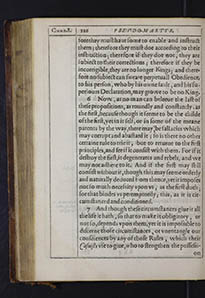 Chap. 8.
226
PSEVDO-MARTYR.
fore they must haue some to enable and instruct
Chap. 8.
226
PSEVDO-MARTYR.
fore they must haue some to enable and instruct
them; therefore they must doe according to their
instruction; therefore if they doe not, they are
subiect to their corrections; therefore if they be
incorrigible, they are no longer Kings; and there-
fore no subiect can sweare perpetuall Obedience,
to his person, who by his owne fault, and his su-
periours Declaration, may growe to be no King. 6 Now, as no man can beleeue the last of
these propositions, as roundly and constantly, as
the first, because though it seeme to be the childe
of the first, yet in it self, or in some of the meane
parents by the way, there may be fallacies which
may corrupt and abastard it; so is there no other
certaine rule to trie it, but to returne to the first
principles, and see if it consist with them. For if it
destroy the first, it degenerates and rebels, and we
may not adhere to it. And if the first may still
consist without it, though this may seeme orderly
and naturally deduced from thence, yet it imposes
not so much necessity vpon vs, as the first doth;
for that bindes vs peremptorily; this, as it is cir-
cumstanced and conditioned. 7 And though these circumstances giue it all
the life it hath, so that to make it obligatory, or
not so, depends vpon them, yet it is impossible to
discerne those circumstances, or vnentangle our
consciences by any of those Rules, which their
Casuists vse to giue, who to stengthen the possessi-
on 227
 PSEVDO-MARTYR.
227
Chap. 8.
on of the Romane Church, haue bestowed more
PSEVDO-MARTYR.
227
Chap. 8.
on of the Romane Church, haue bestowed more
paines, to reach how strongly a conscience is
bound to doe according to a Scruple, or a Doubt,
or an Opinion, or an Errour, which it hath concei-
ued, then how it might depose that Scruple, or
cleare that Doubt, or better that Opinion, or rectifie
that Errour. 8 For, That we may at once lay open the in-
firmity, and insufficiency of their Rules, and apply
the same to our present purpose; What vse and
profite, can those Catholiques, which doubt whe-
ther they may take that Oath, make of that Rule,
that they must follow in doubtfull points, that opinion
which is most common and generall? For, though
this be vnderstood of the opinion of such men as
are intelligent and vnderstanding, and conuersant
in the matter in question, yet oftentimes, amongst
them, both sides say, This is the common opinion; and
who can iudge it? Yea many circumstances
change the common opinion: Instit. Mora.
To. 1. lib. 2. c. 12-
§ si quando. For (saies Azorius) it fals
out often, that that which was not the common opinion a
few yeares since now is; And that that which is the com-
mon opinion of Diuines in one Countrie, is not so in ano-
ther; As in Spaine and Italy, it is the common opi-
nion, That Latreia is due to the Crosse, which in
France and Germany is not so. And Nauarrus saies,
That at Rome,De Iudicijs Ca.
Nouit.no man may say, that the Councell is a-
boue the Pope, nor at Paris, that the Pope is aboue the
Councell. Which deuision also there is amongst them, 228
 Chap. 8.
228
PSEVDO-MARTYR.
Chap. 8.
228
PSEVDO-MARTYR.
them, in a maine point which shakes their Do-
ctrine, Ibid. of the Popes being immediately from God,
since they cannot agree, Whether at the Popes death,
his power remaine vpon the earth, or flie vp to heauen.
He is a Catholique, Carninus de po-
test. leg. Hum.
par. 1. c. 6. and a temperate discreete Au-
thour, which notes, That the writings of Catholique
men, haue something in them which must be allowed to
the times when they writ, which being more diligently
examined by them which follow, are found exorbitant
from the soundnesse of faith: which hee speakes of
those that denie, that the lawes of ciuill Magistrates
doe binde the conscience. Idem. par. 2. c. 2. And after, speaking against
them which thinke, That if we vndergoe the penaltie
of the law, we do not sinne in the breach therof (he saies)
it was the opinion of some Schoolemen, who thought it a
glorious matter, and fit to raise them a name, to leaue the
common and beaten wayes; hauing perchance a delight
sawcily to prouoke, to gnaw, to calumniate, & to draw in-
to hatred those powers and authorities which made those
lawes. 8 And if of late daies, The opinion of refusing
the Oath, become the more common opinion, it is
vpon some of these circumstanees, that at these
times, when Catholiques are called to professe ciuill
obedience, in this place, where Iesuites are in pos-
session of most hearts, to get reputation, or to a-
uile secular Magistracy, they haue suddenly made
it the more common: for they can raise the Exchange
in an howre, and aduance and crie downe an o-
pinion at their pleasure. But 229
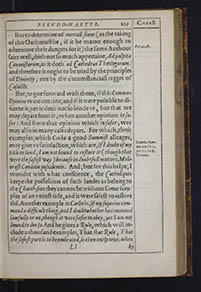 PSEVDO-MARTYR.
229
Chap. 8.
PSEVDO-MARTYR.
229
Chap. 8.
But to determine of mortall sinne (as the taking
of this Oath must be, if it be matter enough to
aduenture these dangers for it) the same Authour
saies well, Par. 1. c. 6. doth not so much appertaine, Ad pulpita
Canonistarum, as it doth ad Cathedras Theologorum:
and therefore it ought to be tried by the principles
of Diuinity, not by the circumstanciall ragges of
Casuists. But, to goe forward with them, if this Common
Opinion were certaine, and if it were possible to di-
scerne it, yet it doth not so binde vs, but that we
may depart from it, when another opinion is sa-
fer: And from that opinion which is safer, wee
may also in many cases depart. For which, those
examples, which Carbo a good Summist alleages,
may giue vs satisfaction, which are,Summa Sum-
marum. To. 1.
par. 1. c. 14. §.
Tertium. If I doubt of my
title to land, I am not bound to restore it (though that
were the safest way) because in doubtfull matters, Meli-
or est Conditio possidentis. And, but for this helpe, I
wonder with what conscience, the Catholiques
keepe the possession of such landes as belong to
the Church; for they cannot be without some scru-
ples of an vniust title, and it were safest to restore
thē. Another example in Carbo is, If my superior com-
mand a difficult thing, and I doubt whether he command
lawfully or no, though it were safer to obey, yet I am not
bound to doe so. And he giues a Rule, which will in-
clude a thousand examples, That that Rule, That
the safest part is to be embraced, is then onely true, when Ll by 230
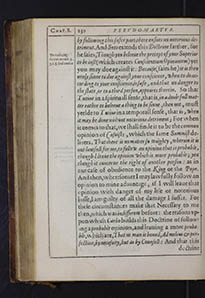 Chap. 8.
230
PSEVDO-MARTYR.
Chap. 8.
230
PSEVDO-MARTYR.
by following this safer part, there ensues no notorious de-
triment. And Soto extends this Doctrine farther, for
he saies, De ratio. teg.
Secret. memb. 3.
q. 2. § Sed contraThough you beleeue the precept of your Superior
to be iust (which creates Conscientiam Opinantem) yet
you may doe against it: Because (saies he) it is then
onely sinne to doe against your conscience, when to do ac-
cording to your conscience, is safe, and that no danger to
the state, or to a third person, appeares therein. So that
Tutius in a spirituall sense, that is, in a doubtfull mat-
ter rather to beleeue a thing to be sinne, then not, must
yeelde to Tutius in a temporall sense, that is, when
it may be done without notorious detriment; For when
it comes to that, we shall finde it to be the common
opinion of Casuists, which the same Summist de-
liuers, That there is no matter so waighty, wherein it is
not lawfull for me, to follow an opinion that is probable
though I leaue the opinion which is more probable; yea
though it concerne the right of another person: as in
our case of obedience to the King or the Pope.
And then, wheresoeuer I may lawfully follow an
opinion to mine aduantage, if I will leaue that
opinion with danger of my life or notorious
losse, I am guilty of all the damage I suffer. For
these circumstances make that Necessary to me
then, which was indifferent before: the reasons vp-
pon which Carbo builds this Doctrine of follow-
ing a probable opinion, and leauing a more proba-
ble, which are, That no man is bound, Ad melius & per-
fectius, by necessity, but as by Counsell: And that this doctrine 231
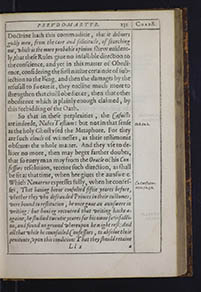 PSEVDO-MARTYR.
231
Chap. 8.
PSEVDO-MARTYR.
231
Chap. 8.
Doctrine hath this commoditie, that it deliuers
godly men, from the care and solicitude, of searching
out, which is the more probable opinion, shew euident-
ly, that these Rules giue no infallible direction to
the conscience, and yet in this matter of Obedi-
ence, considering the first natiue certaintie of sub-
iection to the King, and then the damages by the
refusall to sweare it, they encline much more to
strengthen that ciuill obedience, then that other
obedience which is plainly enough claimed, by
this forbidding of the Oath. So that in these perplexities, the Casuists
are indeede, Heb. 12. 1.Nubes Testium: but not in that sense
as the holy Ghost vsed the Metaphore. For they
are such clouds of witnesses, as their testimonie
obscures the whole matter. And they vse to de-
liuer no more, then may beget farther doubts,
that so euery man may from the Oracle of his Con-
fessors resolution, receiue such direction, as shall
be fit at that time, when hee giues the aunswere.
Which Nauarrus expresses fully Ca Confrater-
nitas. 12. q. 2. when he confes-
ses, That hauing beene consulted fiftie yeares before,
whether they who defrauded Princes in their customes,
were bound to restitution, he once gaue an aunswere in
writing: but hauing recouered that writing backe a-
againe, he studied twentie yeares for his owne satisfacti-
on, and found no ground whereupon he might rest: And
all that while he counsailed Confessors, to absolue their
penitents, vpon this condition: That they should retaine Ll2 a 232
 Chap. 8.
232
PSEVDO-MARTYR.
Chap. 8.
232
PSEVDO-MARTYR.
a purpose to doe so, as they should vnderstand hereafter
to be iust. These spirituall Physitians are therefore like
those Physitians, which vse to erect a figure, by
that Minute in which the patients Messenger
comes to them, and thereby giue their iudgment.
For the Confessours in England, in such resolutions
as these, consider first the Aspects, and Relations,
and diuerse predominancies of Superiours at that
time; and so make their determinations seasona-
ble, and appropriate. Euchirid. Iudi.
Tit. 35. n. 41. But to insist more closely vpon this point in
hand, your Simancha speaking out of the law, saies;
That that witnesse which deposes any thing vpon his
knowledge, must also declare and make it appeare, how
he comes to that knowledge. And if it bee of a thing be-
longing to the vnderstanding, hee must make it appeare
by what means, and instrument his vnderstanding was
instructed. And that which he assignes for the reason,
must be of that nature, that it must certainely, and nece-
ssarily conclude and prooue it. If then you will sub-
scribe with your blood, or testifie by incurring
equiualent dangers, this Doctrine vpon your
Knowledge, you must bee able to tell the Christian
world, how you arriu'd to this Knowledge. If you
will say, Bull. Pij. 4. de
form. Iur. you haue it Ex Iure Diuino, and meane by
that, out of the Scriptures, you must remember
that you are bound by Oath neuer to accept nor in-
terprete Scriptures, but according to the vnanime con-
sent 233
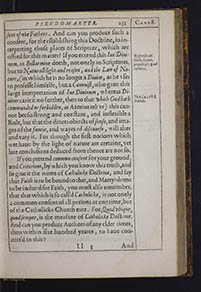 PSEVDO-MARTYR.
233
Chap. 8.
sent of the Fathers. And can you produce such a
PSEVDO-MARTYR.
233
Chap. 8.
sent of the Fathers. And can you produce such a
consent, for the establishing this Doctrine, in in-
terpreting those places of Scripture, which are
offred for this matter? Responsio ad
Docto. Venet.
proposit. 5 a. § ad
rationes. If you extend this Ius Diui-
num, as Bellarmine doeth, not onely to Scriptures,
but to Naturall light and reason, and the Law of Na-
ture, (in which he is no longer a Diuine, as he vses
to professe himselfe, but a Canonist, who gaue this
large interpretation of Ius Diuinum, whereas Di-
uines carie it no further, To. 2. l. 4. c. 18. §
Deinde. then to that which God hath
commanded or forbidden, as Azorius tels vs) this can-
not bee so strong and constant, and inflexible a
Rule, but that the diuers obiects of sense, and ima-
ges of the fancie, and wayes of discourse, will alter
and vary it. For though the first notions which
wee haue by the light of nature are certaine, yet
late conclusions deduced from thence are not so.
If you pretend common consent for your ground,
and Criterium, by which you know this truth, and
so giue it the name of Catholicke Doctrine, and say
that Faith is to be bound to that, and Martyrdome
to be indur'd for Faith, you must also remember,
that that which is so call'd Catholicke, is not onely
a common consent of all persons at one time, but
of the Catholicke Church euer. For, Quod vbique,
quod semper, is the measure of Catholicke Doctrine.
And can you produce Authors of any elder times,
then within sixe hundred yeares, to haue con-
curr'd in this? Ll3 And 234
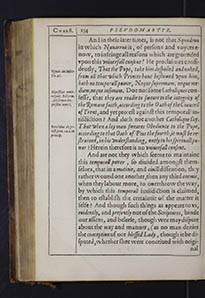 Chap. 8.
234
PSEVDO-MARTYR.
Chap. 8.
234
PSEVDO-MARTYR.
And in these later times, is not that Squadron
in which Nauarrus is, of persons and voyces e-
now, to infringe all reasons which are grounded
vpon this vniuersall consent? He proclaimes confi-
dently, That the Pope,Nouit. de Indic.
Nu. 41.take him despoiled and naked,
from all that which Princes haue bestowed vpon him,
hath no temporall power, Neque supremam, neque me-
diam, neque infimam. Marsilius contr.
respons. Bellarm.
Ad Gener. In-
quisitor. venet. Doe not some Catholiques con-
fesse, that they are readie to sweare to the integrity of
the Romane faith, according to the Oath of the Councell
of Trent, and yet protest against this temporall iu-
risdiction? And doth not another Catholique say
That when a lay man sweares Obedience to the Pope,
Barclaius de po-
test. pont. ca. 2. in
princip.according to that Oath of Pius the fourth, it must be re-
strained, in his vnderstanding, onely to his spiriuall po-
wer? Herein therefore is no vniuersall consent. And are not they which seeme to maintaine
this temporall power, so diuided amongst them-
selues, that in a mutinie, and ciuill dissention, they
rather wound one another, then any third enemie,
when they labour more, to ouerthrow the way,
by which this temporall iurisdiction is claimed,
then to establish the certaintie of the matter it
selfe? And though such things as appeare to vs
euidently, and presently out of the Scriptures, binde
our assent, and beleefe, though wee may dispute
about the way and manner, (as no man denies
the conception of our blessed Lady, though it be di-
sputed, whether shee were conceiued with origi-
nal 235
 PSEVDO-MARTYR.
235
Chap. 8.
nal sinne, or without it) And though those things
PSEVDO-MARTYR.
235
Chap. 8.
nal sinne, or without it) And though those things
which appeare to vs out of the first intrinsique light
of Nature and reason, claime the same authoritie
in vs (as no man doubts whether he haue a soule
or no, though many dispute whether we haue it
by infusion from God, or by propagation from our
parents) yet in things further remoued, and which
are directed by more wheeles, and suggestions,
and deducements, we cannot know certainely e-
nough (for so great a vse, as to testifie them in this
fashion, as we speake of) that they are, except we
know first how, and in what manner they are. As if a
man be conuented before a Iudge, (especially when
he is bound in conscience not to answere, except
he be his competent Iudge, as you teach when Ec-
clesiastique persons are called to Secular tribunals)
he cannot be sure that man is his competent Iudge
except he know first, whether he haue that autho-
rity, as Ordinary, or by speciall Commission. Though
therefore in this point in question, for a pious cre-
dulity, and generall intention to aduance the dig-
nity of the Church of Rome, a Catholique may haue
an indigested and raw opinion, that this power is
in the Pope, yet when he examines himselfe, and
calls himselfe to account, he must first know how
it is, before he can resolue, that it is. And though
he may erre in the manner, by which he beleeeues
it to be in him, yet certainely he must arest him-
selfe vpon some one of those waies, by which the Pope 236
 Chap. 8.
236
PSEVDO-MARTYR.
Chap. 8.
236
PSEVDO-MARTYR.
Pope is said to haue that Iurisdiction, or else hee
doth not answere his conscience, that askes him
how he knowes it? and if his conscience doe not
aske him, he is in too drowsie and stupid a fit to
be a Martyr. Since therefore all his authority must be Direct
or Indirect: Ordinary or Extraordinary: as he is Pope
or not as he is Pope, whosoeuer will seale with his
blood the auerment of this Iurisdiction, auerres
one of these waies, how it comes to him: Which
being so, he cannot iustly be called a Martyr; since
he only is a Martyr, whom all the Church esteemes
to be so. And he which should die, for mainte-
nance of Direct power, should neuer be admitted
into such a Martyrologe, as the fauourers of Indirect
power should compile; nor these, into the other.
And if two should come to execution together,
vpon occasion of denying this Oath, of which one
refused it, because hee thought the Pope Direct
Lorde, the other Indirect, if they forbore hard
words to one another at that time, doubtlesse in
their consciences they would impute to one ano-
ther, the same errours, and the same falshoods, of
which they inter-accuse one another in their
bookes, and neither would beleeue the other to be
a true Martyr. And might not a dispassioned and
equal spectator apply to them both seuerally, that
Rule of the law, That to that, which is forbidden to
be had by one way, one may not be admitted by another? Espe- 237
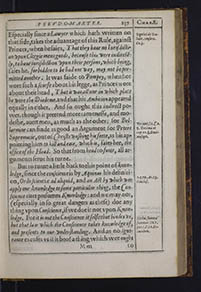 PSEVDO-MARTYR.
237
Chap. 8.
PSEVDO-MARTYR.
237
Chap. 8.
Especially since a Lawyer which hath written on
that side, Vgotini de Va-
lidit. censura.
Ca. 3.takes the aduantage of this Rule, against
Princes, when he saies, That they haue no Iurisdi-
ction vpon Clergie mens goods, because this were indirect-
ly, to haue iurisdiction vpon their persons, which being,
saies he, forbidden to be had one way, may not be per-
mitted another. It was saide to Pompey, when hee
wore such a scarfe about his legge, as Princes wore
about their head, That it was all one in which place
he wore the Diademe, and that his Ambition appeared
equally in either. And so ought this indirect po-
wer, though it pretend more tamenesse, and mo-
destie, auert men, as much as the other: for Bel-
larmine can finde as good an Argument for Peters
Supremacie, De pont. l. 1. C. 2.
§. Decima et
cap. 22. §. Deci-
masepti. out of Christs washing his feete, as his ap-
pointing him to kill and eate, which is, saies hee, the
office of the Head. So that from head to foote, all ar-
guments serue his turne. But to turne a little back to this point of know-
ledge, since the conscience is by Aquinas his definiti-
on, Ordo scientiae ad aliquid, 1. q. 79. Ar. 13.
Conclus. and an Act by which wee
apply our knowledge to some particular thing, the Con-
science euer presumes Knowledge: and we may not,
(especially in so great dangers as these) doe any
thing vpon Conscience, if we doe it not vpon Know-
ledge. For it is not the Conscience it selfe that bindes vs,Carbo. summa
summar. To. 1.
par. 1 C. 12. Se-
cundum.
but that law which the Conscience takes knowledge of,
and presents to our vnderstanding. And as no igno-
rance excuses vs if it be of a thing which wee ought Mm to 238
 Chap. 8.
238
PSEVDO-MARTYR.
Chap. 8.
238
PSEVDO-MARTYR.
to know, and may attaine to: so no misconceiued
knowledge bindes our conscience in these dan-
gers, if it be of a matter not pertinent to vs, or to
which wee haue no such certaine way of attai-
ning, that we can iustly presume our Knowledge
to be certaine. For though in the questions raised by Schoole-
men of the Essence and Counsailes of God, and of the
Creation, and fall, and Ministerie of Angels, and
such other remoued matters, to the knowledge
whereof,God hath affoorded vs no way of attai-
ning, a man may haue some such knowledge, or
opinion, as may sway him in an indifferent acti-
on, by reasons of conueniencie, and with an ap-
parant Analogie, with other points of more eui-
dent certainty: yet no man may suffer any thing
for these points, as for his Conscience, because,
though he haue lighted vpon the truth, yet it was
not by any certaine way, which God appointed
for a constant and Ordinarie meanes to finde out
that truth. And if this refusall of the Oath, and implication
of a power to depose the King, be a matter perti-
nent to vs, that we are bound to know it, Carbo. summa
summar. To. 2.
par. 1. c. 2. §. Ter-
tium. (As all
men in generall are bound to know the principles and e-
lements of the Christian faith, and the generall precepts
of the law, And euery particular man is bound to know,
those things which pertaine to his state and office) Then
euery Subiect which doth not know this, is in an inexcusa- 239
 PSEVDO-MARTYR.
239
Chap. 8.
PSEVDO-MARTYR.
239
Chap. 8.
inexcusable and damnable ignorance; which was
the case of as many, as did at first, or do yet, allow
the taking of the oath. Or if it be not so immediat
to vs, as those principles of faith, or as the duties of
euery particular man (for though we know natu-
rally that Princes must be obeyed, yet, you wil say,
som cases may occur, in which we may not obay)
then there must be some certaine way for vs to at-
taine to the knowledge therof by discourse & in-
dustrie, if we may aduenture these dangers for it,
and we may not aduenture them, till we haue by
that industrie sought it out. For, if we shall say,
that some things are to be held by a man, De fide, Ibid. C. 3: §.
Tertium.
of which he shall still be vnder an inuincible ig-
norance, though he bestow and employ all pos-
sible diligence, (as it is said of Cyprian, that hee did
erre in matter of faith, after he had vsed all possible in-
dustrie) then contrarie opinions in matter of faith
may be iust causes of Martyrdome, and yet one
of these opinions must of necessitie hee Hereticall.
For if Cyprian were vnder an inuincible ignorance, he
was bound to doe according to his erroneous con-
science,since he had no way to rectifie it. So that
he must haue died for his Conscience in that case,
that is, for such an opinion, as all his Aduersaries
were bound to die for the contrarie. But since this seemes incongruous and absurd,
the other opinion will stand safe and vncontrou-
led, that our Conscience, whose office is to apply Mm2 our 240
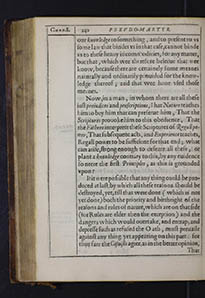 Chap. 8.
240
PSEVDO-MARTYR.
Chap. 8.
240
PSEVDO-MARTYR.
our knowledge to something, and to present to vs
some law that bindes vs in that case, cannot binde
vs to these heauy incommodities, for any matter,
but that, which wee therefore beleeue that wee
know, because there are certainely some meanes
naturally and ordinarily prouided for the know-
ledge thereof; and that wee haue vsed those
meanes. Now, in a man, in whom there are all these
iust preiudices and prescriptions, That Nature teaches
him to bey him that can preserue him, That the
Scriptures prouoke him to this obedience, That
the Fathers interprete these Scriptures of Regall po-
wer, That subsequent acts, and Experience teaches,
Regall power to be sufficient for that end; what
can arise, strong enough to defeate all these, or
plant a knowledge contrary to this, by any euidence
so neere the first Principles, as this is grounded
vpon? If it were possible that any thing could be pro-
duced at last, by which all these reasons should be
destroyed, yet, till that were done (which is not
yet done) both the priority and birthright of the
reasons and rules of nature, which are on that side
(for Rules are elder then the exception) and the
dangers which would ouertake, and entrap,and
depresse such as refused the Oath, must preuaile
against any thing yet appearing on this part: for
thus farr the Casuists agree, as in the better opinion, That 241
 PSEVDO-MARTYR.
241
Chap. 8.
PSEVDO-MARTYR.
241
Chap. 8.
That although that which they cal Metum iustum,
which is, such a feare as may fall vpon a constant man,
and yet not remoue his habite of Constancy, doth not ex-
cuse a man from doing any Euil, yet that is meant
of such an Euill, as is Euill naturally, and accompa-
nied with all his circumstances: for, though no
such feare can excuse me in an absolute deniall to
restore any thing, which was committed to my
trust, yet I maybe excused from deliuering a sword
committed to me, if I haue such a iust feare, that
the owner will therewith offend me or another.
And they account not onely the feare of death, to
be this iust feare, which may excuse in transgressi-
ons, in any thing which is not naturally euill, but
the feare of Torture, Imprisonment, Exile, Bondage,
Losse of temporall goods, or the greater part thereof, or
infamy, and dishonour. And not onely when these
are imminent vppon our selues, but vppon our
wiues and children: And not onely when a law
hath directly pronounced them, but when the
State threatens them, that is, is exasperated and
likely to p oceed to these inflictions. And though
Canonists are more seuere and rigid in the obserua-
tion of their lawe, yet the common opinion of
Diuines is, That this iust feare excuses a man from
the breaking of any humane lawe, whether Civill or Eccle-
siastique: and that none of those lawes binde vs to
the obseruation therof, in danger of death, or these
distresses, except in this case, that these punishments Mm3 are 242
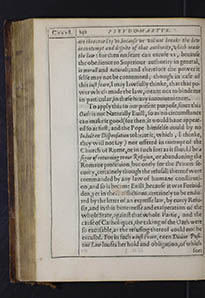 Chap. 8.
242
PSEVDO-MARTYR.
Chap. 8.
242
PSEVDO-MARTYR.
are threatned to vs, because we will not breake the law
in contempt and despite of that authority, which made
the law: for then no feare can excuse vs, because
the obedience to Superiour authority in general,
is morall and naturall; and therefore the power it
selfe may not be contemned; though in case of
this iust feare, I may lawfully thinke, that that po-
wer which made the law, meant not to binde me
in particular, in these heauy inconueniences. To apply this to our present purpose, since this
Oath is not Naturally Euill, so as no circumstance
can make it good (for then, it would haue appear-
ed so at first, and the Pope himselfe could by no
Iudult or Dispensation tolerate it, which, I thinke,
they will not say) nor offered in contempt of the
Church of Rome, or in such sort as it should be a
signe of returning to our Religion, or abandoning the
Romane profession, but onely for the Princes se-
curity, certainely though the refusall thereof were
commanded by any law of humane constituti-
on, and so it became Euill because it was Forbid-
den, yet in these afflictions certainely to be endu-
red by the letter of an expresse law, by euery Refu-
ser, and in this bitternesse and exasperation of the
whole State, against that whole Partie, and the
cause of Catholiques, the taking of the Oath were
so excusable, as the refusing thereof could not be
excused. For in such a iust Feare, euen Diuine Pos-
itiue Law looses her hold and obligation, of which sort 243
 PSEVDO-MARTYR.
243
Chap. 8.
PSEVDO-MARTYR.
243
Chap. 8.
sort Inegrity of Confession is by all helde to be; Tractat. 7. Theol.
de Interd. Pauli
5. propos. 5a. and
yet such sinnes may be omitted in confession, as
would either Scandalize the Confessor, Endanger
the penitent, or Defame a third person. In which
the Casuists are so generally concurrent, that wee
neede no particular authorities. And in the matter of the greatest importance,
which can be in that Church, which is the Electi-
on of the Pope, and an assurance, that he whom
they acknowledge for Pope, is true Pope, which
Comitolius (a Iesuite as much more peremptorie
then the rest of the Iesuites, as they are aboue all
other Friars) sayes, a Comitol. respons.
Moral. l. 1. q. 99.aTo be an Article of Faith, and
that we are bound to beleeue the present Pope to bee
Christs Vicar, with a Diuine and with a Catholicke
Faith, and that all Decrees of Popes, which annull all
Elections, if they appeare after, to haue beene made by
Simonie, intend no more, but to declare that GOD
will neuer suffer that to bee done, or discouer it pre-
sently (in which opinion, that matter of fact,
should so binde our Faith, hee is (for any thing
which I remember to haue read) singular, and
I had occasion before to name b bSimancha En-
chird. Iudic. Tit.
5. nu. 3. bone great Do-
ctor of his owne Religion, directly contrarie to
him in the very point.) In these Elections, I say
which induce (by his Doctrine) a Diuinefaith,
and necessarily, such a probable, and morall
certitude, that it were sinne in them, who are
vnder the obedience of that Church, not to obey the 244
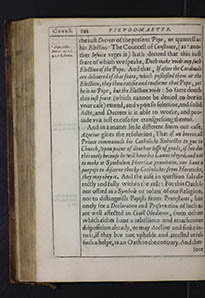 Chap. 8.
244
PSEVDO-MARTYR.
Chap. 8.
244
PSEVDO-MARTYR.
the iust Decrees of the present Pope, or quarrell at
his Election:The Councell of Constance, (as c Azor. Instit.
Moral. par. 2. l.
4. c. 2.§. Sexto. cano-
ther Iesuite vrges it) hath decreed that this iust
feare of which we speake, Doth make voide any such
Election of the Pope. And that, If after the Cardinals
are deliuered of that feare, which possessed them at the
Election, they then ratifie and confirme that Pope, yet
he is no Pope, but the Election voide: So farre doeth
this iust feare (which cannot be denied to bee in
your case) extend, and vpon so solemne, and solid
Acts, and Decrees is it able to worke, and pro-
uide vs a iust excuse for transgressing thereof. And in a matter little different from our case,
Azorius giues the resolution; That if an hereticall
Prince commaunds his Catholicke Subiectes to goe to
Church, vpon paine of death or losse of goods, if hee doe
this onely because he will haue his Lawes obeyed, and not
to make it Symbolum Hereticae prauitatis, nor haue a
purpose to discerne therby Catholickes from Hereticks,
they may obey it. And the case in question fals di-
rectly and fully within the rule: For this Oath is
not offred as a Symbole or token of our Religion,
nor to distinguish Papists from Protestants, but
onely for a Declaration and Preseruation of such as
are well affected in Ciuill Obedience, from others
which either haue a rebellious and treacherous
disposition already, or may decline and sinke in-
to it, if they bee not vphelde and arrested with
such a helpe, as an Oath to the contrary. And ther-
fore 245
 PSEVDO-MARTYR.
245
Chap. 8.
fore by all the former Rules of iust feare & this last
PSEVDO-MARTYR.
245
Chap. 8.
fore by all the former Rules of iust feare & this last
of Azorius, though there were an euident prohi-
bitory act, against the taking of the Oath, yet it
might, yea it ought to be taken.For, agreeable to
this, Tolet cytes Caietans opinion, with allowance
and commendations, Defence of Eng-
lish Cathol. ca. 4.That the Declaration of the
Church, that subiects may not adhere to their King, if
he be excommunicated, extends not to them, if thereby
they be brought into feare of their liues,Par. de Puteo fofo.
327. & fo. 778.or losse of their
goods. For in Capitall matters, saies your great Syn-
dicator, it is lawfull to redeeme the life, per fas & nefas.
which must not haue a wicked interpretation;
and therefore must be meant, whether with, or a-
gainst any humane lawes; which he speakes out
of the strength and resultance of many lawes and
Canons there alleadged. And therfore it can neuer
come to be matter of Faith, that subiects may de-
part from their Prince, if this iust feare may excuse
vs from obeying, as these Authors teach; for that
neuer deliuers vs in matters of so strong obligati-
on as matter of Faith, from which no feare can
excuse our departing. To conclude therefore this Chapter, since later
propositions, either Adulterine, or Suspicious,
cannot haue equall authority, and credite, with
the first, and radicall trueth, much lesse blot out
those certaine and euident Anticipations imprin-
ted by nature, and illustrated by Scriptures, for ci-
uill obedience, since the Rules of the Casuists for Nn electing 246
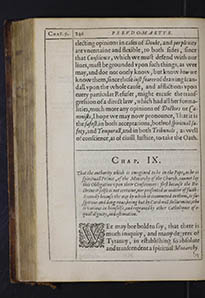 Chap. 9.
246
PSEVDO-MARTYR.
Chap. 9.
246
PSEVDO-MARTYR.
electing opinions in cases of Doubt, and perplexity
are vncertaine and flexible, to both sides, since
that Conscience, which we must defend with our
liues, must be grounded vpon such things, as wee
may, and doe not onely know, but know how we
know them, since these iust feares of drawing scan-
dall vpon the whole cause, and afflictions vpon
euery particular Refuser, might excuse the trans-
gression of a direct law, which had all her forma-
lities, much more any opinions of Doctors or Ca-
nonists, I hope we may now pronounce, That it is
the safest, in both acceptations, both of spirituall sa-
fety, and Temporall, and in both Tribunals, as well
of conscience, as of ciuill Iustice, to take the Oath.
Chap. IX. That the authority which is imagined to be in the Pope, as he is
spirituall Prince, of the Monarchy of the Church, cannot lay
this Obligation vpon their Consciences: first because the Do-
ctrine it selfe is not certaine, nor presented as matter of faith:
Secondly because the way by which it is conueyed to them, is su-
spitious and dangerous, being but by Cardinall Bellarmine, who
is various in himselfe, and reproued by other Catholiques of e-
quall dignity, and estimation.
WEeWee may bee bold to say, that there is
much iniquity, and many degrees of
Tyranny, in establishing so absolute
and transcendent a spiritual Monarchy, by 247
 PSEVDO-MARTYR.
247
Chap. 9.
PSEVDO-MARTYR.
247
Chap. 9.
by them, who abhorre Monarchy so much, that
though one of their greatest Doctors, to the dan-
ger of all Kings, say, a Fran. a Victor.
Relect. de potest.
Ciuili. Nu. 14.aThat the Pope might, if hee
thought it expedient, constraine all Christians to create
one temporall Monarch ouer all the world: yet they al-
low no other Christian Monarchy vpon Earth, so
pure and absolute, but that it must confesse some
subiection and dependencie. The contrarie to whichb Respons. ad
Doct. Venet. pro-
pos. 1.§. Prima
hæc.
b Bellarmine saies, is Hereticall; And yet there is no
Definition of the Church, which should make it
so. And hereby they make Baptisme in respect of
Soueraintie, to bee no better then the bodie in re-
spect of the soule. For, as the bodie by inhaerent
corruption vitiates the pure and innocent soule,
so they accuse Baptisme to cast an Originall serui-
tude and frailtie vpon Soueraintie: which, hauing
beene strong and able to doe all Kingly offices be-
fore, contracts by this Baptisme a debilitie and im-
perfection, and makes Kings, which before had
their Lieutenancie and Vicariate from God, but
Magistrates and Vicars to his Vicar, and so makes
their Patents the worse by renewing & confirming. 2 Nor doe they only denie Monarchie to Kings
of the Earth, but they change the state and forme
of gouernment in heauen it selfe; and ioyne in
Commission with God, some such persons, as they
are so farre from beeing sure that they are there,
that they are not sure, that euer they were heere.
For their excuse, that none of those inuocations Nn2 which 248
 Chap. 9.
248
PSEVDO-MARTYR.
Chap. 9.
248
PSEVDO-MARTYR.
which are vsed in that Church, are so directly in-
tended vpon the Saints, but that they may haue
a lawfull interpretation, is not sufficient. For
words appointed for such vses, must not only be
so conditioned, that they may haue a good sense,
but so, that they may haue no ill. So that to say,
That God hath reserued to himselfe the Court of Iustice,
but giuen to his Mother, the Court of Mercie, And that
a a a Swertius in E-
pitaph. Pataui.
Nulla erat in
Medico spes, ne-
que multa Deo.desperate sicke person was cured by our Lady, when
he had no hope in Physitians, nor much in God, howso-
euer subtill men may distill out of them a whole-
some sense, yet vulgarly and ordinarily they beget
a beliefe, or at least a blinde practise derogatorie
to the Maiestie, and Monarchie of God. 3 But for this spirituall Monarchie which they
haue fansied, I thinke, that as some men haue
imagined, and produced into writing, diuers Idæ-
as, and so sought what a King, a Generall, an Ora-
tour, a Courtier should be, So these men haue only
Idæated what a Pope would be. For if he could
come to a true and reall exercise of all that power
which they attribute to him, I doubt not, but that
Angell, Victorellus de
custodia Ange-
lorum. which hath so long serued in the place of
being the particular Assistant in the Conclaue, (for,
since they affoord a particular Tutelar Angell to
euerie Colledge and Corporation, Anda a Fol. 16.to the race of
Flyes and of Fleas, and of Ants, since they allowe
such an Angell b b Fol. 133. to euery Infidell Kingdome, c Fol. 121.c yea to
Antichrist,d Fol. 17.d yea to Hell it selfe, it were verie vne-
quall 249
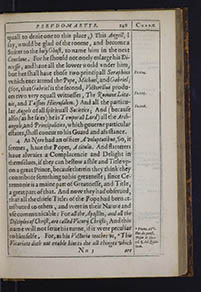 PSEVDO-MARTYR.
249
Chap. 9.
quall to denie one to this place,) This Angell, I
PSEVDO-MARTYR.
249
Chap. 9.
quall to denie one to this place,) This Angell, I
say, would be glad of the roome, and become a
Suiter to the holy Ghost, to name him in the next
Conclaue. For he should not onely enlarge his Di-
ocesse, and haue all the lower world vnder him,
but hee shall haue those two principall Seraphins
which euer attend the Pope,Fo. 104. Michael, and Gabriel;
(for, that Gabriel is the second, Victorellus produ-
ces two very equall witnesses, Fo. 105.The Romane Lita-
nie, and Tassoes Hierusalem.) And all the particu-
lar Angels of all spirituall Societies;Fo. 106. And (because
also (as he saies) he is Temporall Lord) all the Arch-
angels, and Principalities, which gouerne particular
estates, shall concur to his Guard and assistance. 4 As Nero had an officer A voluptatibus, So, it
seemes, haue the Popes, A titulis. And flatterers
haue alwaies a Complacencie and Delight in
themselues, if they can bestow a stile and Title vp-
on a great Prince, because therein they think they
contribute somthing to his greatnesse; since Ce-
remonie is a maine part of Greatnesse, and Title,
a great part of that. And now they had obserued,
that all the chiefe Titles of the Pope had been at-
tributed to others, and were in their Nature and
vse communicable; For all the Apostles, and all the
Disciples of Christ, are called Vicarij Christi; And this a Franc. a Vi-
ctor. de potest.
Papæ et Con-
cil. §. Ad Quin-
tum.
name will not serue his turne, if it were peculiar
to himselfe. For, as his Victoria teaches vs, a This
Vicariate doth not enable him to doe all thinges which Nn3 are 250
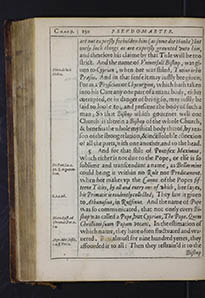 Chap. 9.
250
PSEVDO-MARTYR.
Chap. 9.
250
PSEVDO-MARTYR.
are not expresly forbidden him (as some doe thinke) but
onely such things as are expresly graunted vnto him,
and therefore his claime by that Title will be too
strict. And the name of Vniuersall Bishop, was gi-
uen to Cyprian, Hiero. de locis
Hebra. when hee was stiled, Totius orbis
Præses. And in that sense it may iustly bee giuen;
For as a Physician or Chyrurgion, which hath taken
into his Cure any one part of a mans body, either
corrupted, or in danger of being so, may iustly be
said to looke to, and preserue the body of such a
man; So that Bishop which gouernes well one
Church, is therein a Bishop of the whole Church,
& benefits the whole mystical body therof, by rea-
son of the strong relation, & indissoluble cónexion
of all the parts, with one another, and to the head. 5 And for that stile of Pontifex Maximus,
which either is not due to the Pope, or else is so
sublime and transcendant a name, De Pont. l. 2. c.
31. § Argumen-
tum. as Bellarmine
could bring it within no Rule nor Predicament,
when hee makes vp the Canon of the Popes fif-
teene Titles, by all and euery one of which, hee sayes,
his Primacie is euidently collected;L. 2. c. 26.They saw it giuen
to Athanasius, in Ruffinus. And the name of Pope
was so communicated, that not onely euery Bi-
shop was called a Pope, Hiero. Epist. ad
Chromat. Par. 2.
l. 4. but Cyprian, The Pope. Quem
Christiani suum Papam vocant. In the estimation of
which name, they haue often fluctuated and wa-
uered. For, Azor. Mor. Instit.
c. 4. § Porro. almost for nine hundred yeeres, they
affoorded it to all: Then they restrain'd it to the Bishop 251
 PSEVDO-MARTYR.
251
Chap. 9.
PSEVDO-MARTYR.
251
Chap. 9.
Bishops of Rome, to which purpose a a Lect. 23. Dist.
96 In Scriptu-
ris, & c. 6. q. 1.
Sacerdotes, &c.Biel vpon the
Canon of the Masse, cites diuers Canons, though
farre from the matter. 6 And euer since the Reformation of the Church
was couragiously begun, and prosperously and
blessedly prosecuted, they hauing beene call'd Pa-
pists for their implicite relying vpon the Pope, lest
their owne Argument against vs, Bellar. de Eccles.
milit. l. 4. c. 4 That to bee deno-
minate from any person, is a marke of Heresie, should
be retorted vpon themselues, they haue in all De-
dications and publike Acts, as much as they can,
forborne, and declin'd that name Pope, and still
vsurped, Summus Pontifex, and Pontifex Maximus.
And yet being stil vrged and followed, and hauing
no escape, but that the name of Papists, stickes to
them, and by their Rules imprints some markes
of Heresie; Ibidem § At in-
quiunt.though Bellarmine, a little ashamed of
the name Papist, say; That onely the Lutherans, and a
few neighbour Countreyes call them so: Yet that late a Anastas. Co-
chelet. Palestrit.
bono. f. 9.
Carmelite that hath defended Lypsius, sayes confi-
dently. a We are Papists; we confesse it; and bwe glory
in that Name.b Fo. 6. 7 And this name of Pope, they are the rather
content to take to him againe,because they thinke
that we grudge him that name. Florimond. de
Remond. l. 6. For so that Coun-
cellour of the Parliament of Burdeaux, which in his
Historie of the progresse and decay of Heresie, hath ta-
ken occasion to speake of the affaires of England,
in which, because no man should doubt of the trueth 252
 Chap. 9.
252
PSEVDO-MARTYR.
Chap. 9.
252
PSEVDO-MARTYR.
trueth therof, he professes to follow Sanders, and
Ribadeneyra, (by whome a Morall man may as
well be instructed for matter of Fact, as a Christi-
an might be by Arrius or Mahomet, for his Faith)
sayes, That Henrie the eight, made it Felonie to call the
holy Father Pope, or to reade that name in any Booke,
and not to blot it out. 8 Hauing therefore found such easinesse,
and flexibility in all olde Names, they haue pro-
uided him now of this name spirituall Prince; in a
larger sense, then that great Prince, whom they
call Praeste=gian assumes it (for that name signifies
Apostolique, Brancheda Ora-
rati. ad Imp. de
mutat. Imper.
fo. 18.
Esay. 9.6.and Christs Vicegerent, in his owne king-
domes) or then Christ himself euer assumed, or the
Holy Ghost, by the Prophet Esay, reckoning vp his
most glorious titles, euer attributed to him; and
yet in that place of Esay, both his eternall King-
dome by his filiation, and his euerlasting King-
dome of glory, inchoated in his resurrection, and
his Kingdome of grace in our consciences, are e-
uidently to bee discerned: For, though there be
mention of Principality, yet it is said, Principatus su-
per humerum eius, Lyra. which your Doctor expounds of
carying the Crosse; and that he shall be Princeps pa-
cis, which is Intrinsicall, saies the same Expositor &
belonges to the Conscience. But this Doctrine
which must so settle and affirme a Catholique
conscience, that it must binde him to die, and en-
title him to Martyrdome, hath no touch, nor tin-
cture 253
 PSEVDO-MARTYR.
253
Chap. 9.
cture of either of these Principalities, of Patience,
PSEVDO-MARTYR.
253
Chap. 9.
cture of either of these Principalities, of Patience,
or of Peace; but all therein is Anger and Warre, not
onely with that sword of two edges, of the Word
and Censures, which is his, but with two swords;
which now we shall see how he claimes. 9 The Pope represents Christ to vs (saies Bellar-
mine) as he was, De pont. l. 5. c. 4.
§. Superest. whilst he liued amongst men: nor can
we attribute to the Pope any other office, then Christ
had, as he was a mortall man. And in this Capacitie,
saies he, Ibid. § Sed iam.Christ neither had the execution, nor the power
of any temporall Kingdome. And that therefore, if the §. Cæterum.
Pope, as a King, can take from any King the execution
of his place,Ca. 3. §. Gre-
gorius.he is greater then Christ; and if he cannot,
then he hath no Regall power. Thus hee disputes a-
gainst those which entitle the Pope to a Direct,
and Ordinary Iurisdiction ouer Princes. 10 And the same reasons and groundes, by
which he destroies that opinion, will destroy his;
which is, Ca. 4.§. vt
igitur.That as Christ was, so the Pope is, spirituall
prince, ouer all men, and that by vertue of that power, he
may dispose of all temporall things, as hee shall iudge it
expedient to his spirituall ends. 11 For first, against that opinion of Ordinarie
Iurisdiction hee argues thus; Ca. 3 §. Eadē If it were so, it would
appeare out of the Scriptures, or from the Tradition of
the Apostles: but in the Scriptures, there is mention of
the keyes of Heauen, but none of the Kingdomes of the
earth; nor doe our Aduersaries offer any Apostolique
Tradition. Will not you then, before you receiue Oo so 254
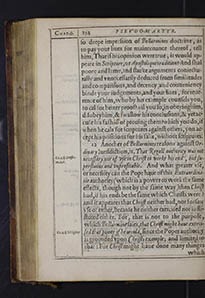 Chap. 9.
254
PSEVDO-MARTYR.
Chap. 9.
254
PSEVDO-MARTYR.
so deepe impression of Bellarmines doctrine, as
to pay your liues for maintenance thereof, tell
him, That if his opinion were true, it would ap-
peare in Scripture, or Apostolique tradition? And shal
poore and lame, and slacke arguments coniectu-
rally and vnnecessarily deduced from similitudes
and comparisons, and decency, and conueniency
binde your iudgements, and your liues, for reue-
rence of him, who by his example counsels you,
to cal for better proof? wil you so, in obeying him,
disobey him, & swallow his conclusions, & yet ac-
cuse his fashiō of prouing them? which you do, if
when he cals for scriptures against others, you ac-
cept his positions for his sake, without scriptures. 12 Another of Bellarmines reasons against Or-
dinary Iurisdiction, is, That Regall authority was not
necessary nor of vse in Christ to worke his end, Ca. 4. § Confir-
matur.but su-
perfluous and vnprofitable. And what greater vse,
or necessity can the Pope haue of this Extraordina-
rie authority (which is a power to work the same
effects, though not by the same way) then Christ
had, if his ends be the same which Christs were?
and it appeares that Christ neither had, nor forsaw
vse of either, because he neither exercised nor insti-
stuted either. For, that is not to the purpose,
which Bellarmine saies, that Christ might haue exerci-
sed that power if he would, Ca 4. § Vt igitur since the Popes authority
is grounded vpon Christs example; and limited to
that: For Christ might haue done many thinges which 255
 PSEVDO-MARTYR.
255
Chap. 9.
PSEVDO-MARTYR.
255
Chap. 9.
which the Pope cannot do; as conuerting all the
world at once, instituting more sacraments, and
many such: Ca. 3. § Grego-
rius. and therefore Bellarmine argued well
before, that it is enough for him to proue, that Christ did
not exercise Regall power, nor declare himselfe to haue it
which Declarion only, and practise, must be dra-
wen into Consequence, and be the precedent for
the Pope to follow. 13 The light of which Argument, that the
Pope hath no power, but such as Christ exercised, hath
brought so many of them to thinke it necessarie
to proue That both Christ did exercise Regall authori-
ty in accepting Regall reuerence vpon Palme-Sunday, Maynardus de
priuil. Eccles. Ar.
7. N. 5. 6. 9.
and in his corrections in the temple, And his iudgement
in the womans case which was taken in Adulterie. And
that S. Peter vsed also the like power, in condemning Idem. Ar. 8. n. 3. 5
Ananias and Saphira, and Simon Magus. 14 In another place Bellarmine saies, That S.
Paul appealed to Caesar, De pont. l. 2. c. 29.
§. Respond. primo as to his Superiour Iudge, not
onely de facto, but de Iure; and that the Apostles were
subiects to the Ethnique Emperours, in all temporall
causes, and that the law of Christ, depriues no man of his
right, which he had before. And lately in his Recog-
nitions he departs from this opinion, and denies
that he was his Iudge, de Iure. If his first opinion
be true, can these consist together, that he which
is subiect in temporal causes, can at the same time
and in the same causes be superiour? Or that he
ouer whom the Emperour had supreame tempo-
Oo2 rall 256
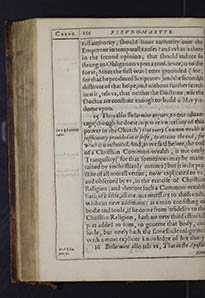 Chap. 9.
256
PSEVDO-MARTYR.
rall authority, should haue authority ouer the
Chap. 9.
256
PSEVDO-MARTYR.
rall authority, should haue authority ouer the
Emperour in temporall causes? and what is there
in the second opinion, that should induce so
strong an Obligation vpon a conscience, as to die
for it; Since the first was better grounded (for,
for that he produced Scriptures) and the second is
destitute of that helpe, and without further search
into it, tels vs, that neither the Doctrine, nor the
Doctor are constant enough to build a Martyre-
dome vpon. 15 Thus also Bellarmine argues, to our aduan-
tage (though he doe it to proue a necessity of this
power in the Church) that euery Common-wealth is
sufficiently prouided in it selfe, Ca. 7. § Secunda
ratio.to attaine the end, for
which it is instituted. And, as we said before, the end
of a Christian Common-wealth, is not onely
Tranquility (for that sometimes may be main-
tained by vnchristianly meanes) but it is the pra-
ctise of all morall vertue, now explicated to vs,
and obserued by vs, in the exercise of Christian
Religion; and therfore such a Common-wealth
hath of it selfe, all meanes necessary to those ends
without new additions: as a man consisting of
bodie and soule, if he come from Infidelity to the
Christian Religion, hath no new third essetiall
part added to him, to gouerne that body, and
soule, but onely hath the same soule enlightned
with a more explicite knowledge of her duety. 16 Ca. 6. § Ita
prorsus.Bellarmine also tels vs, That in the Apostles time 257
 PSEVDO-MARTYR.
257
Chap. 9.
PSEVDO-MARTYR.
257
Chap. 9.
time, these two powers were seperated, and so all the
Temporall was in the Emperour, as all the Ecclesi-
asticke in the Apostles and that Hierarchie. By
what way then, and at what time came this Au-
thoritie into them, if it were once out? For, to say,
that it sprong out of Spirituall Authoritie, when
there was any vse of it, were to say, that that Au-
thoritie at Christs institution had not all her perfe-
ctions and maturity, and to say, that it is no o-
ther but the highest act, and a kinde of prerogatiue
of the spiituall power, will not reach home. For
you must beleeue and die in this, that the Pope as
spirituall Prince, may not onely dispose of tempo-
rall matters, but that herein hee vses the temporall
sword, and temporall iurisdiction. 17 But when Bellarmine saies, l. 5 C. 6. That this supreme
authority resides in the Pope, yet not as he is Pope, And
that the Pope, and none but he, can depose Kings, and
transfer Kingdomes, and yet, not as Pope, I professe
that I know not, how to speake thereof with so
much earnestnesse, as becomes a matter of so
great waight. For other Princes, when they ex-
ercise their extraordinarie and Absolute power,
and prerogatiue, and for the publique good put in
practise sometimes some of those parts of their
power, 1. Sam. 8. 11. which are spoken of in Samuel, (which to
many men seeme to exceede Regall power) yet they
professe to doe these things as they are Kings, and
not by any other authoritie then that. Oo3 18 And 258
 Chap. 9.
258
PSEVDO-MARTYR.
18 And if there be some things which the Pope
Chap. 9.
258
PSEVDO-MARTYR.
18 And if there be some things which the Pope
cannot doe as Pope, but as chiefe spirituall Prince,
this implies that there are other inferiour spirituall
Princes, which are Bishops: (for so Bellarmine saies,
That Bishops in their Diocesses are Ecclesiastique
Princes. De Pont. l. 4. C.
15. §. At in. ) And haue Bishops any such measure of this
spirituall principality, that they may do somthings
by that, which they cannot doe, as they are Bi-
shops; 19 All Principalities maintaine their being by
these two, reward, & punishment. How lame then
and vnperfect is this spirituall principality, which
can affoord but one halfe? For it is onely then of
vse, when the Pope will punish, and correct a
King, by Deposing him: for all Rewards & Indul-
gences in this life, and in the next, hee conferres
and bestowes, as hee is Pope, and needes not this
Title, to doe any good which is in his power.
And for corrections and punishments, all which
we are sure he can lawfully doe, which is, to in-
flict Church censures, vpon those who are vnder
his spirituall obedience, he doth as he is Pope, and
needes not this principalitie for that vse neither. 20 But for irregular actions, and such as oc-
casion tumult and sedition, De Concil. l. 1.
C. 18. §. Dico. he must be a spirituall
Prince. For sayes Bellarmine, Though the Pope as
he is president of a generall Councell, (and he is that, as
he is Pope) ought to follow the greatest number of voy-
ces in making Decrees yet as he is chiefe Prince, hee is not 259
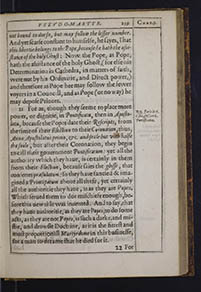 PSEVDO-MARTYR.
259
Chap. 9.
PSEVDO-MARTYR.
259
Chap. 9.
not bound to doe so, but may follow the lesser number.
And yet scarse constant to himselfe, he sayes, That
this libertie belongs to the Pope, because he hath the assi-
stance of the holy Ghost: Now the Pope, as Pope,
hath the assistance of the holy Ghost, (for else his
Determination in Cathedra, in matters of faith,
were not by his Ordinarie, and Direct power,)
and therefore as Pope hee may follow the fewer
voyces in a Councell, and as Pope (or no way) he
may depose Princes. 21 For as, though they seeme to place more
power, Reg. Juris in 6.
C. fin. glos. verb.
Pontificatus. or dignitie, in Pontificatu, then in Aposto-
latu, because the Popes date their Rescripts, from
the time of their Election to their Coronation, thus,
Anno Apostolatus primo, &c. and seale but with
halfe the seale, but after their Coronation, they begin
to call their gouernment Pontificatum: yet all the
authority which they haue, is certainly in them
from their Election, because saies the glosse, that
conferres præsulatum: so they haue fancied & ima-
gined a Principatum aboue all these, yet certainly
all the authoritie they haue, is as they are PopesPopes.
Which serued them to doe mischiefe enough, be-
fore this title was inuented. And to say, that
they haue authoritie, as they are PopesPopes, to doe some
acts, as they are not PopesPopes, is such a darke, and mi-
stie, and drowsie Doctrine, as it is the fittest and
most proportionall Martyrdome in this businesse,
for a man to dreame that he died for it. 22 For 260
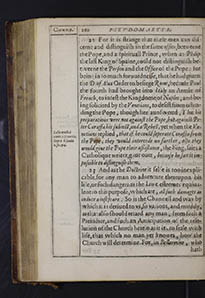 Chap. 9.
260
PSEVDO-MARTYR.
22 For it is strange that these men can dis-
Chap. 9.
260
PSEVDO-MARTYR.
22 For it is strange that these men can dis-cerne and distinguish in the same office, betweene
the Pope, and a spirituall Prince, when as Philip
the last King of Spaine, could not distinguish be-
tweene the Person and the Office of the Pope: for
being in so much forwardnesse, that he had giuen
the D. of Alua Order to besiege Rome, because Paul
the fourth had brought into Italy an Armie of
French, to infest the Kingdome of Naples, and be-
ing solicited by the Venetians, to desist from offen-
ding the Pope, though hee aunswered, That his
preparations were not against the Pope, but against Pe-
ter Caraffa his subiect, and a Rebell, yet when the Ve-
netians replied, Lelio medici
contr. i. Venetia.
Sopra il sonda
2. fo. 194. that if he could seperate Caraffa from
the Pope, they would intercede no farther, else they
would giue the Pope their assistance, the King, saies a
Catholique writer, gaue ouer, because he saw it im-
possible to distinguish them. 23 And as the Doctrine it selfe is too inexpli-
cable, for any man to aduenture thereupon his
life, or such dangers as the lawe esteemes equiua-
lent to this purpose, which are, all such damages as
induce a iust feare: So is the Channell and way by
which it is deriued to vs, so various, and muddy,
as that also should retard any man, from such a
Preiudice, and such an Anticipation of the reso-
lution of the Church herein as it is, to seale with
life, that which no man yet knowes, how the
Church will determine. For, in Bellarmine, who hath 261
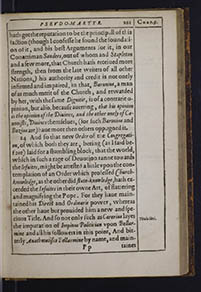 PSEVDO-MARTYR.
261
Chap. 9.
PSEVDO-MARTYR.
261
Chap. 9.
hath got the reputation to be the principall of this
faction (though I confesse he found the foundati-
on of it, and his best Arguments for it, in our
Countriman Sanders, out of whom and Stapleton
and a few more, that Church hath receiued more
strength, then from the late writers of all other
Nations,) his authority and credit is not onely
infirmed and impaired, in that, Baronius, a man
of as much merit of the Church, and rewarded
by her, with the same Dignitie, is of a contrarie o-
pinion, but also, because auerring, that his opinion
is the opinion of the Diuines, and the other onely of Ca-
nonists, Diuines themselues, (for such Baronius and
Bozius are) haue more then others oppugned it. 24 And so that new Order of the Congregati-
on, of which both they are, beeing (as I said be-
fore) laid for a stumbling block, that the world,
which in such a rage of Deuotion ranne towards
the Iesuites, might be arrested a little vpon the con-
templation of an Order which professed Church-
knowledge, as the other did state-knowledge, hath ex-
ceeded the Iesuites in their owne Art, of flattering
and magnifying the Pope. For they haue main-
tained his Direct and Ordinarie power, whereas
the other haue but prouided him a new and spe-
cious Title. Titulo libri. And so not only such as Carerius layes
the imputation of Impious Politician vpon Bellar-
mine and all his followers in this point, And bit-
terly Anathmatises Bellarmine by name, and main-
Pp taines 262
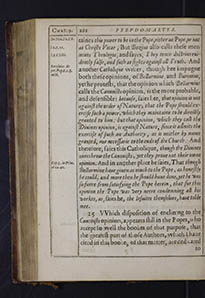 Chap. 9.
262
PSEVDO-MARTYR.
taines this power to be in the Pope,De Pont. l. 2. C. 8. either as Pope, or not
Chap. 9.
262
PSEVDO-MARTYR.
taines this power to be in the Pope,De Pont. l. 2. C. 8. either as Pope, or not
as Christs Vicar, l. 2. C. 11. But Bozius also calls these men
nouos Theologos, and sayes, l. 5. C. Vlti. They teach doctrine eui-
dently false, and such as fights against all Truth. And
another Catholique writer, Barclaius de
pot. Pap. C. 1. §.
mihi. though hee impugne
both these opinions, of Bellarmine, and Baronius,
yet he protests, that the opinion which Bellarmine
calls the Canonists opinion, is the more probable,
and defensible: because, saies hee, that opinion is not
against the order of Nature, that the Pope should ex-
ercise such a power, which they maintaine to be directly
granted to him: but that opinion, which they call the
Diuines opinion, is against Nature, since it admits the
exercise of such an Authority, as is neither by name
granted, nor necessarie to the ends of the Church: And
therefore, saies this Catholique, though the Diuines
ouerthrow the Canonists, yet they proue not their owne
opinion. Cap. 3. in Princ.
et ca. 40. And in another place he saies, That though
Bellarmine haue giuen as much to the Pope, as honestly
he could, and more then he should haue done, yet he was
so farre from satisfying the Pope herein, that for this
opinion the Pope was very neere condemning all his
workes, as, saies he, the Iesuites themselues, haue tolde
mee. 25 VVWhich disposition of enclining to the
Canonists opinion, appeares still in the Popes, who
accept so well the bookes of that purpose, that
the greatest part of those Authors, which I haue
cited in this booke, of that matter, are dedicated to 263
 PSEVDO-MARTYR.
263
Chap. 9.
PSEVDO-MARTYR.
263
Chap. 9.
to the late Popes. So that, that Doctrine, which
is so much denied in the substance and Essence ther-
of, that all wayes of the existence thereof are pe-
remptorily denied, hath not yet receaued conco-
xions enow from the Church, to nourish a con-
science to such a strength, as Martyrdome requires.
For that, which their great Doctor Franciscus a Vi-
ctoria pronounces against his direct Authoritie, De potest. Eccles.
Sect. 6. Nu. 4. we
may as safely say against that & the indirect, This
is the strongest proofe that can be against him,
This Authority is not proued to be in the Pope, Ibid. Nu. 2. et 3. by any
meanes, and therefore he hath it not. To which pur-
pose he had directly said before, of the direct Au-
thoritie, It is manifestly false, although they say that it is
manifestly true; And I beleeue it to be a meere deuise, on-
ly to flatter the Popes. And it is altogether fained, with-
out probability, Reason, Witnesse, Scripture, Father, or
Diuine. Onely some Glossers of the law, poore in for-
tune and learning, haue bestowed this authority vpon
them. And therefore, as that Ermit which was fed
in the Desert by an Angell, Aluarez specul.
vtri. Dignit. ca.
33. Nu. 4. receaued from the An-
gell withered grapes, when hee said his prayers,
after the due time, and ripe grapes when he obser-
ued the iust time, but wilde sower grapes when
he preuented the time, so must that hasty and vn-
seasonable obedience to the Church, to die for
her Doctrine, before she her selfe knowes what it
is, haue but a sower and vnpleasant reward. Pp2 CHAP. 264
 Chap. 10.
264
PSEVDO-MARTYR.
Chap. X.
That the Canons can giue them no warrant, to aduenture these
Chap. 10.
264
PSEVDO-MARTYR.
Chap. X.
That the Canons can giue them no warrant, to aduenture these
dangers, for this refusall: And that the reuerend name of Ca-
nons, is falsly, and cautelously insinuated, and stolne vpon the
whole body of the Canon law, with a briefe Consideration vpon
all the bookes thereof; and a particular suruay, of all those Ca-
nons, which are ordinarily cyted by those Authours, which
maintaine this temporall Iurisdiction in the Pope.
TOTo this spirituall Prince, of whom we
spoke in the former Chapter, the huge
and vast bookes of the Canon law, serue
for his Guarde. For they are great bo-
dies loaded with diuers weapons of Excommunica-
tions, Anathems, and Interdicts, but are seldome dra-
wen to any presse or close fight. And as with tem-
porall Princes, the danger is come very neere his per-
son, if the remedie lie in his guard, so is also this spi-
rituall Prince brought to a neere exigent, if his title
to depose Princes must be defended by the Canons.
For, in this spirituall warre which the Reformed
Churches vnder the conduct of the Holy Ghost, haue
vndertaken against Rome, not to destroy her, but
to reduce her to that obedience, from which at
first she vnaduisedly strayed, but now stubborn-
ly rebels against it, the Canon law serues rather to
stoppe a breach, into which men vse to cast as wel
straw and Feathers, as Timber and Stone, then to main- 265
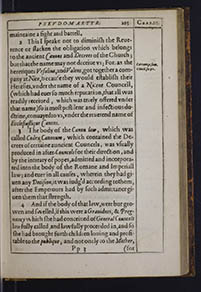 PSEVDO-MARTYR.
265
Chap. 10.
PSEVDO-MARTYR.
265
Chap. 10.
maintaine a fight and battell. 2 This I speake not to diminish the Reue-
rence or slacken the obligation which belongs
to the ancient Canons and Decrees of the Church;
but that the name may not deceiue vs; Carranza. sum.
Concil. fo. 92. For, as the
heretiques Vrsalius, and Valens, got together a com-
pany at Nice, because they would establish their
Heresies, vnder the name of a Nicene Councell,
(which had euer so much reputation, that all was
readily receiued, which was truely offered vnder
that name) so is most pestilent and infectious do-
ctrine, conuayed to vs, vnder the reuerend name of
Ecclesiastique Canons. 3 The body of the Canon law, which was
called Codex Canonum, which contained the De-
crees of certaine auncient Councels, was vsually
produced in after-Councels for their direction, and
by the intreaty of popes, admitted and incorpora-
ted into the body of the Romane and Imperiall
law; and euer in all causes, wherein they had gi-
uen any Decision, it was iudg'd according to them,
after the Emperours had by such admittance gi-
uen them that strength. 4 And if the body of that law, were but gro-
wen and swelled, if this were a Grauidnes, & Preg-
nancy which she had conceiued of General Councels
lawfully called, and lawfully proceeded in, and so
she had brought forth children louing and profi-
table to the publique, and not onely to the Mother, Pp3 (for 266
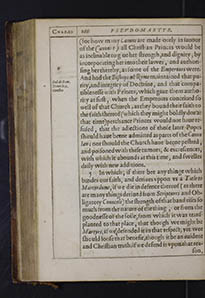 Chap. 10.
266
PSEVDO-MARTYR.
Chap. 10.
266
PSEVDO-MARTYR.
(for how many Canons are made onely in fauour
of the Canons?) all Christian Princes would be
as inclinable to giue her strength, and dignity, by
incorporating her into their lawes, and authori-
sing her thereby, as some of the Emperours were.
And had the Bishops of Rome maintained that pu-
rity, and integrity of Doctrine, Cod. de Sum.
Trinit. le. 1.
Cunctos and that compa-
tiblenesse with Princes, which gaue them autho-
rity at first, when the Emperours conceiued so
well of that Church, as they bound their faith to
the faith thereof (which they might boldly doe at
that time) perchance Princes would not haue re-
fused, that the adiections of those later Popes
should haue beene admitted as parts of the Canon
law: nor should the Church haue beene pestred,
and poisoned with these tumors, & excrescences,
with which it abounds at this time, and swelles
daily with new additions. 5 In which, if there bee any thinge which
bindes our faith, and deriues vppon vs a Title to
Martyrdome, if we die in defence thereof (as there
are many things deriued from Scriptures and Ob-
ligatory Councels) the strength of that band rises so
much from the nature of the thing, or from the
goodnesse of the soile, from which it was trans-
planted to that place, that though we might be
Martyrs, if we defended it in that respect, yet wee
should loose that benefit, though it be an euident
and Christian truth, if we defend it vpon that rea-
son, 267
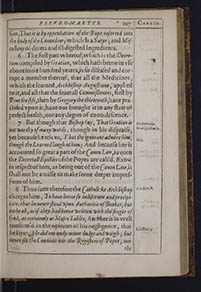 PSEVDO-MARTYR.
267
Chap. 10.
son, That it is by approbation of the Pope inserted into
PSEVDO-MARTYR.
267
Chap. 10.
son, That it is by approbation of the Pope inserted into
the body of the Canon law; which is a Satyr, and Mis-
cellany of diuers and ill digested Ingredients. 6 The first part whereof, which is the Decre-
tum compiled by Gratian, which hath beene in vse
aboue foure hundred yeares, is so diseased and cor-
rupt a member thereof, that all the Medicines,
which the learned Archbishop Augustinus, applied
to it, and all that the seuerall Commissioners, first by
Pius the fift, then by Gregory the thirteenth, haue pra-
ctised vpon it, haue not brought it to any state of
perfect health, nor any degree of conualescence. 7 But though that Bishop say, De Emendat.
Grat. l. 1. Dial. 1. That Gratian is
not worthy of many words, though in his dispraise,
yet because he tels vs, Ibid. That the ignorant admire him,
though the Learned laugh at him; And because hee is
accounted so great a part of the Canon Law, as euen
the Decretall Epistles of the Popes are call'd, Extra,
in respect of him, as being out of the Canon Law, it
shall not be amisse to make some deeper impres-
sions of him. 8 Thus farre therefore the Catholicke Archbishop
charges him, L. 2. Dial. 8. To haue beene so indiscreete and precipi-
tate, that he neuer stood vpon Authoritie of Bookes, but
tooke all, as if they had beene written with the finger of
God, as certainely as Moses Tables; And hee is so well
confirm'd in the opinion of his negligence, that
he sayes, L. 1. Dial. 4. He did not onely neuer Iudge and waigh, but
neuer see the Councels nor the Registers of Popes, nor the 268
 Chap. 10.
268
PSEVDO-MARTYR.
Chap. 10.
268
PSEVDO-MARTYR.
the workes of the Fathers: And therefore sayes hee,
There is onely one remedy left, which is, Vna litura. L. 1. Dial. 19.
And in another place, L. 1. Dial. 16. That there can bee no vse at all
made of this Collection, but that a better must be atten-
ded, out of the Originals. 9 But if his errour were onely in Chronologies,
as to giue Pope Nicholas a place in the Councell
of Carthage, L. 1. Dial. 3. who was dead before; Or in Arith-
meticke, Ibid. as when purposely he enumerates all the
Councels, to make the number lesse by foure. If
this weaknesse had onely beene, that he was not
able to spell, and so in a place of much impor-
tance, to Read Ephesus for Erphesfurd, Ibid. Hierome, for
Ieremie, L. Dial. 4. and Hereticke for Henrie, and a hundred
such; If he had stopp'd, either at mistaking of true
Authors, Ibid. as to cite out of Saint Peter, that which
Saint Paul sayes (which libertie his Glosser extends
farther, Dist. 43. si quis.
verb. postulat. and therefore cites a whole sentence, for
Scripture, which is no where) Or if he had stai'd at
imagining words out of false Authors, as to cite
the Councell of Geneua, L. 1. Dial. 4. and Macharius the Pope,
which neuer were, (as he and the Palea doe) there
were an open way for him, as it is said in that Dia-
logue, to say with the Apostle, L. 2. Dial 8.
1. Tim. 1. 13. Quia ignorans feci. 10 But we also finde malignitie and danger to
our cause, in his Falsifications. For, to dignifie the
Sea of Rome, De pænit. Doct. 1
potest fieri. hee cites Ambroses wordes thus,
Non habent Petri hæreditatem, qui non habent Petri
sedem; which in Ambrose is obseru'd to be, Petri fi.-
dem 269
 PSEVDO-MARTYR.
269
Chap. 10.
dem. And to establish the exemption of Clergie
PSEVDO-MARTYR.
269
Chap. 10.
dem. And to establish the exemption of Clergie
men from secular Iustice, 11. q. 1. Clericum
Ex Conc. Agath.
Can. 32. hee cites this out of a
Councell now a thousand yeeres past, Clericum nul-
lus presumat pulsare apud Iudicem Sæcularem; Where-
as the words of the Councel are Clericus nullus pre-
sumat. And so the Councell layes a Commande-
ment vpon the Clergie, but Gratian layes it vpon
the Layetie. 11 Which falsitie, Tom. 2. fo. 306. Binius, citing the Councell
aright, and Gratians words also right in the Mar-
gine, forbeares to obserue or reprehend, and dis-
sembles the iniurie done to the world therein.
But Bellarmine hath delt herein with more ob-
noxiousnesse, and lesse excuse, De Clericis l. 1. c.
28. § Tertia. then Binius, be-
cause hauing no reference at all to Gratian, hee
cites the words out of the Councell it=selfe; and
hauing said, That Counsell pronounces in this point
more clearely, in these words; He cites the words, false-
ly, and corruptly as Gratian did before. 12 And as for such iniquities as these, we haue rea-
son to decline Gratian, as iniurious to vs: So also in
Charitie towards them, which are caried with an
implicite Faith in Canons, in which name Gratian is
enwrapped, we are bound to tell you how vn-
worthy he is, to bee relied vpon by you. For in
the point of the Emperours Electing the Pope, hee
hath spoken so dangerously, Baron To. 9.
Ann. 774. n. 13.
Dst. 65 Hadri-
anus. St Dist. 63
In Synodo. that Baronius is for-
ced to giue this censure vpon him, Gratian, out of
too much credulitie, improuidently writ out a most ma-
Qq nifest 270
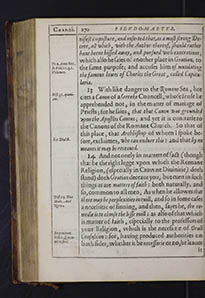 Chap. 10.
270
PSEVDO-MARTYR.
nifest imposture, and inserted that, as a most strong De-
Chap. 10.
270
PSEVDO-MARTYR.
nifest imposture, and inserted that, as a most strong De-cree, all which, with the Author thereof, should rather
haue beene hissed away, and pursued with execrations,
which also he saies of another place in Gratian, to
the same purpose; To. 9. Anno 801.
fo. 622. 11. q. 1.
Volumus. and accuses him of mutilating
the famous lawes of Charles the Great, called Capitu-
laria. 13 With like danger to the Romane Sea, hee
cites a Canon of a Greeke Councell, Dist. 31. quoni-
am. whose sense he
apprehended not, in the matter of mariage of
Priests; for he saies, that that Canon was grounded
vpon the Apostles Canons; and yet it is contrarie to
the Canons of the Romane Church. So that of
this place, that Archbishop of whom I spoke be-
fore, exclaimes, li. 1. Dial. 8. who can endure this? and that by no
meanes it may be receaued. 14 And not onely in matters of fact (though
that be the right legge vpon which the Romane
Religion, (especially in Crowne Diuinitie) doth
stand) doth Gratian deceaue you, but euen in such
things as are matters of faith: both naturally, and
so, common to all men, As when he allowes that
there may be perplexities in euill, Dist. 13. Duo
Mala. And
Nerui. and so in some cases
a necessitie of sinning, and then, sayes he, the re-
medie is to choose the lesse euill; as also of that which
is matter of faith, especially to the professors of
your Religion, which is the necessitie of Orall
Confession: De penitent.
Dist. 1. Quam-
uis in fine. for, hauing produced authorities on
both sides, whether it be necessarie or no, he leaues it 271
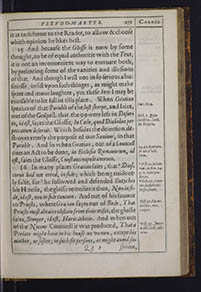 PSEVDO-MARTYR.
271
Chap. 10.
PSEVDO-MARTYR.
271
Chap. 10.
it as indifferent to the Reader, to allow & choose
which opinion he likes best. 15 And because the Glosse is now by some
thought, to be of equal authoritie with the Text,
it is not an inconuenient way to eneruate both,
by presenting some of the vanities and illusions
of that. And though I will not in so serious a bu-
sinesse, insist vpon such thinges, as might make
sport and moue laughter, yet these few I may be
excusable to let fall in this place. When Gratian
speakes of that Parable of the lost sheepe, Luc. 15.4. and saies,
out of the Gospell, that the 99 were left in Deser-
to, id est, Dist. 5. Quia
sanctitas. verb.
In Deserto. sayes the Glosse, In Cœlo, quod Diabolus per
peccatum deseruit. Which, besides the detortion, de-
stroyes vtterly the purpose of our Sauiour, in that
Parable. And so when Gratian, out of a Councell
cites an Act to be done, 24. q. 2. Sane pro-
fectur. Verb.
Item. in Ecclesia Romanorum, id
est, saies the Glosse, Constantinopolitanorum. 16 In many places Gratian saies, that a a Dist. 22. in tan-
tum. in fine. 24.
q. 2. Sane pro-
fertur. Dios-
corus had not erred, in fide; which being euident-
ly false, for b he followed and defended Eutyches
his Heresie, b Dist. 15. Cano-
nes. et glos. ver.
Defensorem. the glosse remedies it thus, Non in fi-
de, id est, non in fide tantum. And out of his fauour
to Priests, where Gratian sayes out of Bede, That
Priests must alwaies abstain from their wifes, the glosse Dist 31. Sacer-
dotibus. ver.
semper.
saies, Semper, id est, Horis debitis. And when out
of the Nicene Councell it was produced, That a
Prelate might haue in his house no women, except his Dist. 33. Inter-
dixit. verb. Ido-
neas.
mother, or sister, or such fit persons, as might auoid su-
Qq2 spition, 272
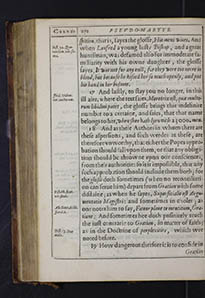 Chap. 10.
272
PSEVDO-MARTYR.
Chap. 10.
272
PSEVDO-MARTYR.
spition that is, sayes the glosse, His mens wiues. And
when Lanfred a young lusty Bishop, Dist. 34. Quo-
rundam. ver. fa-
ma. and a great
huntsman, was defamed also for immoderate fa-
miliarity with his owne daughter, the glosse
sayes, It was not for any euill, for they were too neere in
blood, but because he kissed her so much openly, and put
his hand in her bosome. 17 And lastly, to stay you no longer, in this
ill aire, Ibid. Vidua.
ver. multorum. where the text saies, Meretrix est, quæ multo-
rum libidini patet, the glosse brings this indefinite
number to a certaine, and saies, that that name
belongs to her, when shee hath lyen with 23000. men. 18 And as these Authors in whom there are
these aspersions, and such weedes as these, are
therefore vnworthy, that either the Popes appro-
bation should all vpon them, or that any obliga-
tion should be throwne vpon our consciences,
from their authoritie: so is it impossible, that any
such approbation should include them both; for
the glosse doth sometimes (when no reconciliati-
on can serue him) depart from Gratian with some
disdaine; Dist. 68. sicut.
ver. sicut. as when he sayes, Superficialis est Argu-
mentatio Magistri: and sometimes in choler; as
one notes him to say, Alb. Gent. de lib.
Jur. C. 2. Fateor plane te mentitum, Gra-
tiane: And sometimes hee doth positiuely teach
the iust contrarie to Gratian, in matter of faith;
as in the Doctrine of perplexities, Dist. 13. Duo
mal. which wee
noted before. 19 How dangerous therfore it is to confide in Gratian 273
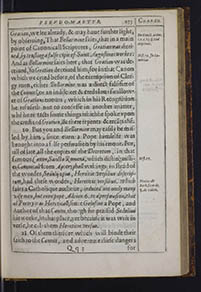 PSEVDO-MARTYR.
273
Chap. 10.
PSEVDO-MARTYR.
273
Chap. 10.
Gratian, we see already, & may haue further light,
by obseruing, De Concil. autor.
l. 2. c. 13. § Sed
obijciunt. That Bellarmine saies, that in a main
point of Canonicall Scriptures, Gratian was decei-
ued, by trusting a false copie of Saint Augustines workes:
And as Dist. 19. In Ca-
nonicis. Bellarmine saies here that Gratian was de-
ceiued, so Gratian deceiued him; for in that Canon
which we cyted before, of the exemption of Cler-
gy men, either Bellarmine was a direct falsifier of
the Councel, or an indiscreet & credulous swallow-
er of Gratians errours; which in his Recognition
he refuseth not to confesse in another matter,
whē he retracts some things which he spoke vpon
the credit of Gratian, & there repents & recãts thē. 20 But you and Bellarmine may easily be mis-
led by him, since euen a Pope himselfe was
brought into a false perswasion by his errour. For,
till of late, all the copies of the Decretum, in that
famous Canon,Dist. 15. Sancta Romana, which distinguish-
es Canonicall scom Apocryphall writings, instead of
the wordes, Sedulij opus, Heroicis versibus descrip-
tum, had these wordes, Pierius de
Barb. sacerdo.
§. At videte. Hereticis versibus. Which
saies a Catholique authour, induced not onely many
wise men, but euen pope Adrian 6. to a perswasion, that
al Poetry was Hereticall; since Gelasius a Pope, and
Author of that Canon, though he praised Sedulius
his worke, in that place, yet because it was writ in
verse, he cals them Hereticos versus. 21 Of them therfore which will binde their
faith to the Canons, and aduenture these dangers Qq3 for 274
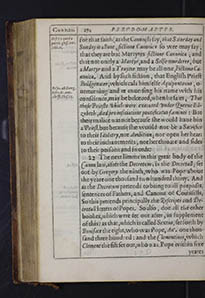 Chap. 10.
274
PSEVDO-MARTYR.
Chap. 10.
274
PSEVDO-MARTYR.
for that faith (as the Canonists say, Dist. 75. quod a
patrib. gloss. ver.
sabbati. that Saterday and
Sunday is all one, fictione Canonica so wee may say,
that they are but Martyres fictione Canonica; and
that not onely a Martyr, and a Selfe-murderer, but
a Martyr and a Traytor, may be all one, Fictione Ca-
nonica. And by such fiction, that English Priest
Bridgewater, which cals himselfe Aquipontanus, o-
uerturning and re enuersing his name with his
conscience, Respo. ad Georg.
Sohn. de Anti-
christ. Thes. 15. may be beleeued, when he saies, That
those Priests which were executed vnder Queene Eli-
zabeth, died pro inficiatione pontificatus fæminei: But
their malice was not because she would haue bin
a Priest, but because she would not be a Sacrifice
to their Idolatry, nor Ambition; nor open her heart
to their inchantments, nor her throate and sides
to their poisons and swords: 22 The next limme in this great body of the
Canon law, after the Decretum, is the Decretall; set
out by Gregory the ninth, who was Pope about
the yeare one thousand two hundred thirty. And
as the Decretum pretends to bring to all purposes,
sentences of Fathers, and Canons of Counsells,
So this pretends principally the Rescripts and De-
cretall letters of Popes. So also, doe all the other
bookes, which were set out after, in supplement
of this: as that, which is called Sextus, set forth by
Boniface the eight, who was Pope, Ano. one thou-
sand three hundred: and the Clementines, which
Clement the fift set out, who was Pope within sixe yeares 275
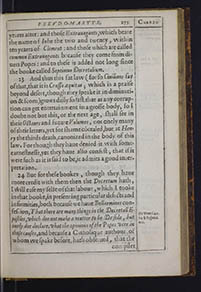 PSEVDO-MARTYR.
275
Chap. 10.
PSEVDO-MARTYR.
275
Chap. 10.
yeares after: and those Extrauagants, which beare
the name of Iohn the two and twenty, within
ten yeares of Clement: and those which are called
common Extrauagants because they come from di-
uers Popes: and to these is added not long since
the booke called Septimus Decretalium. 23 And thus this fat law (for so Ciuilians say
of that, that it is Crassa æquitas; which is a praise
beyond desert, though they speake it in diminuti-
on & scorn) grows daily so fast, that as any corrup-
tion can get entertainment in a grosse body, so I
doubt not but this, or the next age, shall see in
their Octaues and future Volumes, not onely many
of their letters, yet for shame cōcealed, but at Hen-
ry the thirds death, canonized in the body of this
law. For though they haue denied it with some-
earnestnesse, yet they haue also confest, that if it
were such as it is said to be, it admits a good inter-
pretation. 24 But for these bookes, though they haue
more credit with them then the Decretum hath,
I will ease my selfe of that labour, which I tooke
in that booke, in presenting particular defects and
infirmities, both because we haue Bellarmines con-
fession, That there are many things in the Decretall E-
pistles, which doe not make a matter to be De fide,De Pont. l. 4. c.
14. § Respond.
nec. but
onely doe declare, what the opinions of the Popes were in
those causes, and because a Catholique authour of
whom we spake before, hath obserued, that the compiler 276
 Chap. 10.
276
PSEVDO-MARTYR.
Chap. 10.
276
PSEVDO-MARTYR.
compiler of the Decretals, Pierius de Bar-
ba sacerd. § Hoc
in genere. by leauing out a word,
in a Canon of a Councell of Carthage, hath occa-
sion'd the Church euer since, to doe directly a-
gainst the purpose of that Councell, in shauing
the heads of Priests. De vit. & hon.
Cleri. Clericus. For whereas the Councell is
cited by him, Clerici nec Comam Nutriant nec bar-
bam, by occasion whereof, many subsequent or-
ders were brought in, for Shauing, and transgres-
sors seuerely punish'd, it appeares that he left out
in the end, the word Radant, which vtterly chan-
ged the precept into the contrary. These Canons
therefore, of so sickely and weake a constitution,
that any thing deiects them, cannot preuaile so
much vpon our consciences, as to imprint and
worke such a confidence in them, and irremoue-
ablenesse from them, as to maintaine them with
the same maner of testimonie, as we would doe
the words of God himselfe. 25 For, howsoeuer they depart from them,
and seeme somewhat negligent of the Canons,
when we make vse of them to our aduantage a-
gainst them, yet they affright and enthrall the
tender consciences of their owne Disciples, with
nothing more, then the name of Canons, to which
promiscuously they ascribe all reuerence and as-
sent, without distinguishing to them, which are
Gratians, and which are opinionate, and which De-
cretall, for all together are approoued and confir-
med. And therefore the Canons themselues not only 277
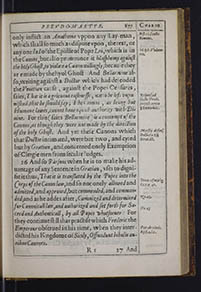 PSEVDO-MARTYR.
277
Chap. 10.
PSEVDO-MARTYR.
277
Chap. 10.
only inflict an Anatheme vppon any Lay-manDist. 15. sancta
Romana.
which shall so much as dispute vpon, the text, or
any one Iod of the Epistle of Pope Leo, 25. q. 1. Violato-
res. which is in
the Canons, but also pronounce it blasphemy against
the holy Ghost, to violate a Canon willingly, because they
are made by the hyol Ghost And Bellarmine al-
so, writing against a Doctor which had defended
the Venetian cause, against the Popes Censures,
saies, Respons. ad
Docto Theolo.
proposit. tertia
§ Tertia hæc. That it is a grieuous rashnesse, not to be left vnpu-
nished, that he should say, The Canons, as being but
Humane lawes, cannot haue equall authority with Di-
uine. For this (saies Bellarmine) is a contempt of the
Canons, as though they were not made by the direction
of the holy Ghost. Marsilij defens.
Docto. Ca. 5, §
Errat. XI. And yet these Canons which
that Doctor intimated, were but two, and cyted
but by Gratian, and concerned onely Exemption
of Clergie men from secular Iudges. 26 And so Parsons when he is to make his ad-
uantage of any Sentence in Gratian, vses to digni-
fie it thus, That it is translated by the Popes into the
Corps of the Canon law, Treat. of mitig.
Ca. 7. n. 42. and so not onely allowed and
admitted, and approued, but commended, and comman-
ded; and as he addes after, Nu. 43. Canonized and determined
for Canonicall law, and authorized and set forth for Sa-
cred and Authenticall,Nu. 43 by all Popes whatsoeuer: For
they continue still that practise which Frederic the
Emperour obserued in his time, Petr. de vineis.
Epist. 4. l. 1. when they inter-
dicted his Kingdome of Sicily, Offundunt bibulis au-
ribus Canones. Rr 27 And 278
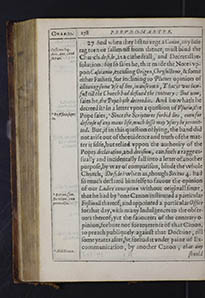 Chap. 10.
278
PSEVDO-MARTYR.
27 And when they list to vrge a Canon, any litle
Chap. 10.
278
PSEVDO-MARTYR.
27 And when they list to vrge a Canon, any litle
rag torn or fallen off from thence, Cassianus lug-
duni. Ann. 1606
fo. 740. must bind the
Church de fide, as a cathedrall, and Decretall re-
solution: for so saies he, that made the Notes vp-
pon Cassianus, excusing Origen, Chrysostome, & some
other Fathers, for inclining to Platoes opinion of
allowing some vse of lies, in wise men, That it was law-
full till the Church had defined the contrary: But now,
saies he, the Pope hath decreed it. And how hath he
decreed it? In a letter vpon a question of Vsurie, the
Pope saies, a a De Vsuris super
eo. Since the Scriptures forbid lies, euen for
defense of any mans life, much lesse may vsury be permit-
ted. But, if in this question of lying, the band did
not arise out of the euidence and truth of the mat-
ter it selfe, but relied vppon the authority of the
Popes declaration, and decision, can such a ragge ca-
sually and incidentally fall into a letter of another
purpose, by way of comparison, binde the whole
Church, De fide? when as, though Sixtus 4. had
so much declared himselfe to fauour the opinion
of our Ladies conception without originall sinne,
that he had by bb Extrau. Com.
De reliqui cum
perexcelsa. one Canon instituted a particular
Festiuall thereof, and appointed a particular Office
for that day, with many Indulgences to the obser-
uers thereof; yet the fauourers of the contrary o-
pinion, forbore not for reuerence of that Canon,
to preach publiquely against that Doctrine, till
some yeares after, he forbad it vnder paine of Ex-
communication, by another Canon, c Ibid. Graue. that any should 279
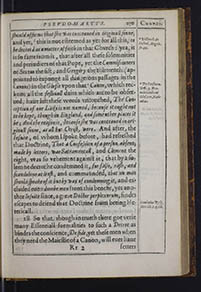 PSEVDO-MARTYR.
279
Chap. 10.
PSEVDO-MARTYR.
279
Chap. 10.
should affirme that she was conceaued in originall sinne;
and yet, dd Victorell. de
Custod. Angelo.
fo. 99. this is not esteemed as yet for all this, to
be decreed as a matter of faith in that Church: yea, it
is so farre from it, that after all these solemnities
and preiudices of that Pope, yet the Commissioners
of Sixtus the fift, and Gregory the thirteenth (ap-
pointed to expunge all dangerous passages in the
Canons) in the Glosse vpon that ee De Consecra.
Dist. 3. Pro-
nunciandam.
Glos. ver. Nati-
uitas. Canon, which rec-
kons all the festiuall daies which are to be obser-
ued, haue left these words vntouched, The Con-
ception of our Lady is not named, because it ought not
to be kept, though in England, and some other places it
be; And the reason is, because she was conceaued in ori-
ginall sinne, as all but Christ, were. And after, the
Iesuite, of whom I spoke before, had refreshed
that Doctrine, That a Confession of a person absent,
made by letters, was Sacramentall, and Clement the
eight, was so vehement against it, that by a so-
lemne decree he condemned it, for false, rash, and
scandalous at least, and commaunded, that no man
should speake of it but by way of condemning it, and ex-
cluded euen dumbe men from this benefit, yet ano-
ther Iesuite since, a great Doctor perplexorum, findes
escapes to defend that Doctrine from beeing He-
reticall. Comitolus Resp.
Mor. lib. 1. q. 16. 28 So that, though in trueth there goe verie
many Essentiall formalities to such a Decree as
bindes the conscience, De fide, yet these men when
they need the Maiestie of a Canon, will euer haue Rr2 fetters 280
 Chap. 10.
280
PSEVDO-MARTYR.
Chap. 10.
280
PSEVDO-MARTYR.
fetters in all corners, to holde all consciences
which offer to slip or breake from them, and still
oppresse them with waights, and with Moun-
taine of Canons. Which way, the Canonists doe
not only approue as the most conuenient to hold
men in that Religion, because the Canons are more
easily varied, and flexible, and appliable to occa-
sions, then the Scriptures are, but also (because or-
dinarily the Canonists haue no other learning) they
think the way by Canons, to be the fittest means, Maynardus de
Priuil. Eccl. Ar.
11. N. 8. 9.
to reduce them whom they call Heretiques. For so
sayes one of them, in his booke to the present
Pope, (with much acutenesse, certainty, and sub-
tilty,) The Canons may well be alleadged against He-
retiques; because they alleadge Scriptures, and they can-
not know Scriptures, by any other way then Canons. 29 But besides, that I haue giuen you suffici-
ent light, to look into the deformity and corrup-
tion of the Canons, (which, GOD forbid any
should vnderstand me to meane of Canons, in that
sense and acceptation, that the Ancients receaued
it, which is, of the Constitutions of Orthodox
Councels, for I take it here, as your Doctors do, &
as your Confessors doe, for the whole body of the
Canon law, extant) before I enter into the suruay of
those particular Canons, which vsually are obtru-
ded in this point of the Popes temporall Suprema-
cie, I will remember you briefly, of some of those
reasons and occasions, (such as may be fittest to vn=- 281
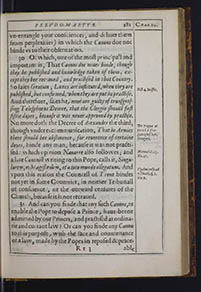 PSEVDO-MARTYR.
281
Chap. 10.
PSEVDO-MARTYR.
281
Chap. 10.
vn-entangle your consciences, and deliuer them
from perplexities) in which the Canons doe not
binde vs to their obseruation. 30 Of which, one of the most principall and
important is, That Canons doe neuer binde, though
they be published and knowledge taken of them, ex-
cept they bee receaued, and practised in that Country.
So saies Gratian,Dist. 4. In istis. Lawes are instituted, when they are
published, but confirmed, when they are put in practise.
And therefore, saies he, none are guilty of transgres-
sing Telesphorus Decree, that the Clergie should fast
fiftie dayes, because it was neuer approued by practise.
No more doth the Decree of Alexander the third, De tregua et
pace C. 1. Tre-
guas. glos. ver.
frangere.
though vnder excommunication, That in Armies
there should bee abstinence, for reuerence of certaine
dayes, binde any man, because it was not practi-
sed: which opinion Nauarre also followes; Manual. C. 23.
Nu. 41. and
a late Canonist writing to this Pope, calls it, Singu-
larem, et Magistralem,Vgolini. resp. ad
7. Theolo. §. 1.
Nu 9. et a toto mundo allegatum. And
vpon this reason the Councell of Trent bindes
not yet in some Countries, in neither Tribunall
of conscience, or the outward censures of the
Church, because it is not receaued. 31 And can you finde that any such Canons, as
enable the Pope to depose a Prince, haue beene
admitted by our Princes, and practised as ordina-
rie and currant law? Or can you finde any Canon
to this purpose, with the face and countenance
of a law, made by the Popes in reposed & peace-
Rr3 able 282
 Chap. 10.
282
PSEVDO-MARTYR.
able times, and deliuered quietly as a matter of
Chap. 10.
282
PSEVDO-MARTYR.
able times, and deliuered quietly as a matter of
Doctrine and conscience, and so accepted by the
Church and state? For if in temporall Scismes, and
differences, for temporall matters, betweene the
Popes and other Princes, the Popes to raise or
maintaine a party against their enemies, haue suf-
fered seditious Bulls, and Rescripts to passe from
them, to facilitate and effect their enterprises then
in hand, this is farre from the nature of a law, and
from being accepted and practised, and so iustifi-
ed, as it may be drawne into consequence, and
haue power and strength to binde the consci-
ence. Azor. To. 2. l. 7.
C. 3. §. Quæres.
Vgotini. vbi su-
pra. 32 And as acceptation giues life to law, so doth
disuse, or custome to the contrarie abrogate it. And
howsoeuer a superstition toward the Canons, may
still be preserued in some of you, yet the generall
state, that is, the same authority, by which those
Canons were receaued before, which euer had a-
nie strength here, hath disused them, & pronoun-
ced against so many of them, as can fall within
this question, that is, Such as bee derogatorie to the
Crowne. For, if these lawes bee not borne aliue,
but haue their quickning by others acceptation,
the same power that giues them life, may by de-
sertion withdraw their strength, and leaue them
inualid. 33 And thus much seemed needfull to be said
in the first part of this chapter, that you might see how 283
 PSEVDO-MARTYR.
283
Chap. 10.
PSEVDO-MARTYR.
283
Chap. 10.
how putrid and corrupt a thing it is, which is offe-
red to you vnder the reuerend name of Canons;
And that though this Cannon law be declined, and
extenuated when we vrge it, yet euery Sentence
thereof is equall'd to Diuine Scripture; and pro-
duced as a definition of the Church, when it may
worke their ends vpon your consciences, which,
for diuers reasons issuing out of their owne rules,
should now be deliuered from that yoake. THE SECOND
PART. FOrFor the second place in this Chapter, I reserued
the consideration and suruay of those Canons
which are Ordinarily vsurped for defence of this
temporall Iurisdiction: In which my purpose is not,
to amasse all those Canons which incline toward
that point, of which condition those which ex-
exempt the Clergy from secular Iurisdiction, and
very many other, are, but onely such as belong
more directly to this point, to which the Oath
stretches, That is, whether the Pope may depose
a Soueraine Prince, and so we shall discern whe-
ther your consciences may so safely relie vpon any
resolution to be had out of the Canons, that you
may incurre the dangers of the law, for refusall
thereof. 2 Of 284
 Chap. 10.
284
PSEVDO-MARTYR.
2 Of which Canons, though I will preter-
Chap. 10.
284
PSEVDO-MARTYR.
2 Of which Canons, though I will preter-mit none, which I haue found to haue beene vr-
ged, in any of their Authours, I will first present
those Fower, which are alwaies produced with
much confidence and triumph: Albericus in
Dictionar. ver.
Electio. Though one Ca-
tholique Author, which might be aliue at the ma-
king of the Clementines (for he liued and flourish-
ed about 1350, and Clement the fift died not much
before 1320.) haue drawen these foure Canons into
iust suspition: for thus he saies of them, The Pa-
stors of the Church putting their Hooke into another
mans Haruest, haue made foure Decretals, which, God
knowes, whether they be iust or no: But I doe not beleeue
(yet I recall it if it be erroneous) that any of them is a-
greeable to Law, but I rather beleeue that they were put
forth against the libertie of the empire. 3 The first is a letter of Innocent the third,
who was Pope about 1199. to the Duke of Caringia
the occasion of which Letter, De Electio &
Elect. potest.
Venerabilem. was this; Henry
the son of Frederic the first, of the house of Sueuia,
succeeding his Father in the Empire, had obtained
of the Princes of Germany, to whom the Election
belonged, to chuse as Successor to him, his sonne
Henry: but hee being too young to gouerne
when his father died, they tooke thereby occasi-
on, though against their Oath, to leaue him; be-
ing also desirous to change the stocke, and chuse
an Emperour of some other race; By this meanes
was Duke Bertholdus, by some of the Princes ele-
cted 285
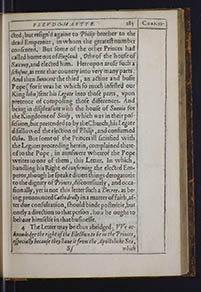 PSEVDO-MARTYR.
285
Chap. 10.
cted; but resign'd againe to Philip brother to the
PSEVDO-MARTYR.
285
Chap. 10.
cted; but resign'd againe to Philip brother to the
dead Emperour, in whom the greatest number
consented. But some of the other Princes had
called home out of England, Otho of the house of
Saxony, and elected him. Here upon arose such a
schisme, as rent that country into very many parts:
And then Innocent the third, an actiue and busie
Pope (for it was he which so much infested our
King Iohn) sent his Legate into those parts, vpon
pretence of composing those differences. And
being in displeasure with the house of Sueuia for
the Kingdome of Sicily, which was in their pos-
session, but pretended to by the Church, his Legate
disallowed the election of Philip, and confirmed
Otho. But some of the Princes ill satisfied with
the Legates proceeding herein, complained there-
of to the Pope; in aunswere whereof the Pope
writes to one of them, this Letter. In which,
handling his Right of confirming the elected Em-
peror, though he speake diuers things derogatorie
to the dignity of Princes, discoursiuely, and occa-
sionally, yet is not this letter such a Decree, as be-
ing pronounced Cathedrally in a matter of faith, af-
ter due consultation, should binde posteritie, but
onely a direction to that person, how he ought to
behaue himselfe in that businesse. 4 The Letter may be thus abridged; VVWe ac-
knowledge the right of the Election to be in the Princes,
especially because they haue it from the Apostolicke Sea, Ss which 286
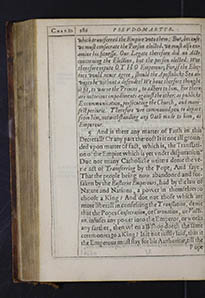 Chap. 10.
286
PSEVDO-MARTYR.
Chap. 10.
286
PSEVDO-MARTYR.
which transferred the Empire vnto them: But, because
we must consecrate the Person elected, we must also ex-
amine his fitnesse. Our Legate therefore did no Acte
concerning the Election, but the person elected. Wee
therefore repute OTHO Emperour; For, if the Elec-
tors would neuer agree, should the Apostolicke Sea al-
wayes be without a defender? We haue therfore thought
it fit, to warne the Princes, to adhere to him. For there
are notorious impediments against the other: as publicke
Excommunication, persecuting the Church, and mani-
fest periurie. Therefore wee commaund you to depart
from him, notwithstanding any Oath made to him, as
Emperour. 5 And is there any matter of Faith in this
Decretall? Or any part thereof? Is it not all groun-
ded vpon matter of fact, which is, the Translati-
on of the Empire which is yet vnder disputation.
Doe not many Catholicke writers denie the ve-
rie act of Transferring by the Pope; And saye,
That the people being now abandoned and for-
saken by the Easterne Emperours, had by the law of
Nature and Nations, a power in themselues to
choose a King? And doe not those which are
more liberall in confessing the Translation, denie
that the Popes Consecration, or Coronation, or Vncti-
on infuses any power into the Emperor, or works
any farther, then when a Bishop doeth the same
ceremonies to a King? Is it not iustly said, that it
the Emperour must stay for his Authoritie, till the Pope 287
 PSEVDO-MARTYR.
287
Chap. 10.
PSEVDO-MARTYR.
287
Chap. 10.
Pope doe these acts, he is in worse condition, by
this increase of his Dominions then he was be-
fore. For, before he was Emperour, and had a lit-
tle of Italy added to him, there was no doubt but
that he had full iurisdiction, in his owne Domini-
ons before these Ceremonies, and now hee must
stay for them. 6 And may not the Popes question in this let-
ter, be well retorted thus, If the Pope will not crowne
the Emperour at all, shall the Empire euer lacke a head?
For the Pope may well be presumed to be slacke
in that office, because he pretends to be Emperour
during the vacancie. But besides that an ouer ear-
nest maintaining of this that the Emperour had no
iurisdiction in Italy, before these Ceremonies, would
diminish and mutilate the patrimonie of the
Church, of which a great part was conferred and
giuen by Pipin, before any of these ceremonies
were giuen by the pope, De Iureiuran-
do. the glosser vpon the Cle-
mentines, is liquid & round in this point, when he
sayes, That these ceremonies, and the taking of an Oath,
are nothing; and that now, Resipiscente mundo, the
world being growne wiser, there must be no longer
striuing for both swords. 7 For those notorious impediments, which the
Pope obiects in this letter, against Philip, if they
were such as made him incapable of Election, then
there was a Nullity in the choise, and the Pope
did nothing but declare that; which may often Ss2 fall 288
 Chap. 10.
288
PSEVDO-MARTYR.
Chap. 10.
288
PSEVDO-MARTYR.
fall out in states, which elect their Princes, because
there are many limitations, but in Successorie
princes, it cannot hold: but if these were not such
impediments, by the lawes which gouerned the
Electors, they became not such, by this Declara-
tion. For one of them, which is manifest periurie,
the pope himselfe was some cause of his continu-
ing therein. For the oath was made to his bro-
ther, in the behalfe of his young Nephew, who
should haue beene Emperour. And now the Pope
had not onely disabled him, but all the other
Princes, from keeping that oath, by electing or
confirming another Emperour. 8 But if all which the Pope sayes in that let-
ter, shall not onely bee strong enough to binde
the Election, but to binde the consciences of po-
sterity, as matter of faith, his last reason against
Philips election, must haue equall strength with
the rest, which would bee of dangerous conse-
quence; for it is, That if after his Father had beene
Emperour, and his Brother, he also should succeede, the
Empire would passe from Election to succession, and
none should be assumed but of one house; Either then
it is matter of faith, that three of one family may not
succeed in an Electiue state, or, as this is, so all the rest
are but arguments of inconueniencie & vnfitnes. 9 And this absoluing this Duke, to whom he
writes, of his Oath, is but of an Oath made Rati-
one Regni, to him who neuer had the Kingdome: and 289
 PSEVDO-MARTYR.
289
Chap. 10.
PSEVDO-MARTYR.
289
Chap. 10.
and therefore that power of absoluing, cannot
by this Decretall be extended to such Oathes, which
are acknowledged to haue beene iust, when they
were made, as being made to lawfull and indu-
bitable Princes. And certainly (for though you
dare not heare, yet wee dare speake trueth,) the
whole purpose in that act, of the Pope, was cor-
rupt, and farre from intention of making peace.
Of whose profit by reason of that dissention one
of your owne Abbats, Vspergens. fo.
1198. sayes, That there was scarse
any Bishoprick, or Parish Church, which was not liti-
gious, and the Suite brought to Rome, Sed non vacua
Manu, And so he proceedes, Gaude, Mater nostra
Roma, because all flowes to thee, aperiuntur Cataractæ
thesaurorum. Reioyce for the iniquitie of the Sonnes
of men; Jocundare de Adiutrice tua Discordia. Thou
hast now that which thou didst alwaies thirst. Sing thy
song, because thou hast ouercome the world, not by thy
Religion, but the wickednesse of men, for men are not
drawne to thee by their owne Deuotion, or by a pure
Conscience, but by the doing of manifolde wickednes-
ses, and by buying the Decision of their Suites and
Causes. 10 The second Canon vsually produced, De Sent. et re
iudic. in 6. Ad
Apostolicæ. and
noted by Albericus (as I said) to be against Iustice,
issued vpon this occasion. When Otho whom the
former Pope had established against Philip, be-
came vnthankfull to the Pope, hee also was ex-
communicate: and Frederick, the Sonne of the Ss3 first 290
 Chap. 10.
290
PSEVDO-MARTYR.
Chap. 10.
290
PSEVDO-MARTYR.
first Frederick, to whom the Princes had sworne
in his Cradle, was elected and crowned; with
whom also, because hee would not goe into the
holy land, and expose the Kingdome of Sicily to
their Ambition, the Popes fell out, and excom-
municated him thrice. And when a generall
Councell was gathered by Innocent the fourth, for
the reliefe of the holy land, the Pope himselfe
proposed Articles against the Emperour. Whose
Aduocate Thaddæus promised all, which might
conduce to peace and Reformation on his Mai-
sters behalfe. This satisfied not the Pope, but he
asked for Sureties: and when the Kings of Eng-
land and France, were offered, the pope refused
them, vpon pretence, that if the Emperor should
remaine incorrigible, the Church should by this
means raise more heauy enemies to it selfe. Then
Thaddæus proceeded to excuse his Maister, in all
the particular obiections, and desired that hee
might be personally heard, but to that the pope
replied, If he come I will depart, for I doe not yet finde
my selfe fit and ready for martyrdome. Binius To. 3. par.
2. fo. 1482. Yet the English
which were there, extorted a fortnights leasure for
the Emperours comming: but he not daring or dis-
daining to come, the pope proceeded to this sen-
tence of Depriuation; which, sayes the Relater
thereof, He thundred out terribly, not without the a-
mazement and horrour of all the hearers and by-stan-
ders. And Thaddæus protested vppon it, This day 291
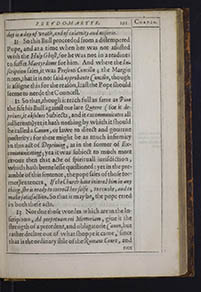 PSEVDO-MARTYR.
291
Chap. 10.
PSEVDO-MARTYR.
291
Chap. 10.
day is a day of wrath, and of calamity and miserie. 11 So this Bull proceeded from a distempered
Pope, and at a time when hee was not assisted
with the Holy Ghost, for he was not in a readines
to suffer Martyrdome for him. And where the In-
scription saies, it was Presenti Concilio; the Margin
notes, that it is not said approbante Concilio, though
it assigne this for the reason, least the Pope should
seeme to neede the Councell. 12 So that, though it reach full as farre as Pius
the fift his Bull against our late Queene (for it de-
priues, it absolues Subiects, and it excommunicates all
adherents) yet it hath nothing by which it should
be called a Canon, or lawe to direct and gouerne
posterity; for there might be as much infirmity
in this act of Depriuing, as in the former of Ex-
communicating; yea it was subiect to much more
errour then that acte of spirituall iurisdiction,
which hath beene lesse questioned: yet in the pre-
amble of this sentence, the pope saies of those for-
mer sentences, If the Church haue iniured him in any
thing, she is ready to correct her selfe, to reuoke, and to
make satisfaction. So that it may be, the pope erred
in both these acts. 13 Nor doe those wordes which are in the In-
scription, Ad perpetuam rei Memoriam, giue it the
strength of a precedent, and obligatorie Canon, but
rather declare out of what shoppe it came, since
that is the ordinary stile of the Romane Court, and not 292
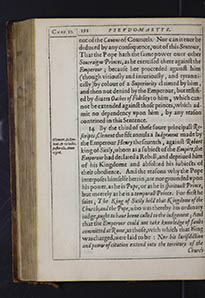 Chap. 10.
292
PSEVDO-MARTYR.
Chap. 10.
292
PSEVDO-MARTYR.
not of the Canons of Councels. Nor can it euer be
deduced by any consequence, out of this Sentence,
That the Pope hath the same power ouer other
Soueraigne Princes, as he exercised there against the
Emperour; because hee proceeded against him
(though vitiously and iniuriously, and tyranni-
cally) by colour of a Superiority claimed by him,
and then not denied by the Emperour, but testifi-
ed by diuers Oathes of Fidelity to him, which can-
not be extended against those princes, which ad-
mit no dependency vpon him, by any reason
conteined in this Sentence. 14 By the third of these foure principall Re-
scripts, Clement the fift annuls a Iudgement made by
the Emperour Henry the seuenth, Clement. de Sen-
tent. & re iudic.
pastoralis. Anno
1306. against Robert
king of Sicily, whom as a subiect of the Empire, the
Emperour had declared a Rebell, and depriued him
of his Kingdome and absolued his subiects of
their obedience. And the reasons why the Pope
interposes himselfe herein, are not grounded vpon
his power, as he is Pope, or as he is spirituall Prince,
but meerely as he is a temporall Prince. For first he
saies, The King of Sicily held that Kingdome of the
Church; and the Pope, who was thereby his ordinary
iudge, ought to haue beene called to the iudgement; And
that the Emperour could not take knowledge of faults
committed at Rome, as those, with which that King
was charged, were laid to be: Nor his Iurisdiction
and power of citation extend into the territory of the Church 293
 PSEVDO-MARTYR.
293
Chap. 10.
PSEVDO-MARTYR.
293
Chap. 10.
Church where that King was then residing: nor he bee
bound vpon any Citation, to come to a place of so certaine
danger. 15 It is not therefore for this part of the De-
cretall, that either they alleadge it so frequently, or
that Albericus laid that marke vpon it, that it be-
trayed the authority of the Emperours; for in this
particular case, I should not bee difficult to con-
fesse, some degrees of Iustice, in prouiding that the
Sentence of the Emperor should not preuaile, where
naturally and iustly it could not worke; especial-
ly the pope proceeding so mannerly, as to reuoke
it after the Emperors death; and as the Glosse saies,
Ad tollendum murmur Populi, who grudged that the
Emperour should dispose of them, who were the
subiects of the Church. 16 But the danger is in the last clause, which is,
We out of the Superiority, which without doubt we haue
ouer the Empire, and out of that power, by which we suc-
ceed therein, in a vacancy, and by that power which
Christ gaue vs in Peter, declare that iudgement to bee
voide, and reuoke all which hath beene done thereupon.
For the first part of which Clause, touching his
Superiority ouer the Emperor, if he had any (which,
as many good authors denie, as affirme it) he had
it by contract betweene the Emperour and the
Church; and he neither can, nor doth claime that,
at least not all that which hee pretended in the
Empire, in other princes dominions; for where Tt doth 294
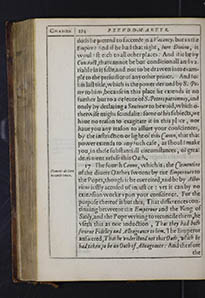 Chap. 10.
294
PSEVDO-MARTYR.
Chap. 10.
294
PSEVDO-MARTYR.
doth he pretend to succeede in a Vacancy, but in the
Empire? And if he had that right, Iure Diuino, it
would stretch to all other places: And if it be by
Contract, that cannot be but conditionall and va-
riable in it selfe, and not to be drawen into exam-
ple to the preiudice of any other prince. And for
his last title, which is the power deriued by S. Pe-
ter to him, because in this place he extends it no
further but to a defence of S. Peters patrimony, and
onely by declaring a Sentence to be void, which o-
therwise might scandalize some of his subiects, we
haue no reason to exagitate it in this place, nor
haue you any reason to assure your consciences,
by the instruction or light of this Canon, that that
power extends to any such case, as should make
you, in these substantiall circumstances, of great
detriment refuse this Oath. Clement. de Iure
iurando vnica. 17 The fourth Canon, which is, the Clementine
of the diuers Oathes sworne by the Emperours to
the Popes, though it be euer cited, and be by Albe-
ricus iustly accused of injustice: yet it can by no
extension worke vpon your conscience. For the
purpose thereof is but this; That differences con-
tinuing betweene the Emperour and the King of
Sicily, and the Pope writing to reconcile them, he
vseth this as one induction, That they had both
sworne Fidelity and Alleageance to him. The Emperor
answered, That he vnderstood not that Oath, which he
had taken, to be an Oath of Alleageance: And therfore the 295
 PSEVDO-MARTYR.
295
Chap. 10.
PSEVDO-MARTYR.
295
Chap. 10.
the Pope, after the Emperours death, in this Decre-
tall pronounces, That they are Oathes of fidelities and
Alleageance, and that whosoeuer shall be created Em-
perour, shall take those Oathes, as such. But, to leaue
it to the Lawyers, (whose tongues, and pennes
are not silenced by this Decretall,) to argue whe-
ther they be oathes of Alleageance, or no, and im-
posed by the pope essentially, so as the Emperour
had no iurisdiction without them (the first being
a Constitution of the Emperour Otho, and not of the
pope, Dist. 63. Tibi
Domino. (if it be rightly cited by Gratian) The second
but an oath of Protection of the Church, and the
pope, And the third, only of a pure and intire ob-
seruing of the Catholique faith) who can presse an
argument out of this Canon, though it were who-
ly confessed and accepted as it lies, that the pope
may depose a king of England? De Pontif. l. 5.
C. 8. §. septimum. For Bellarmine in-
formes your consciences ee er then any of those
Confessors, who auert you from the oath, by this,
and such Canons. That the Empire not depending ab-
solutely vpon the Pope, but since Charlemains time, this
Oath of Alleageance is taken of the Emperour, because
the Pope translated the Empire vpon him. And whe-
ther his be true or false, in the latter part of tran-
slation, yet his reason and argument discharges
all other supreme princes, ouer whom the pope
hath no such pretence. 18 Hauing passed through these foure, wee
will consider those Canons, which are in Gratian, Tt2 to 296
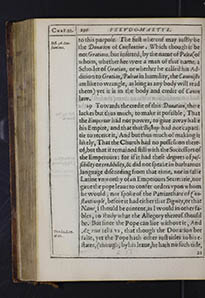 Chap. 10.
296
PSEVDO-MARTYR.
Chap. 10.
296
PSEVDO-MARTYR.
to this purpose. The first whereof may iustly be
the Donation of Constantine. Dist. 96. Con-
stantinus. Which though it be
not Gratians, but inserted, by the name of Palea (of
whom, whether hee were a man of that name, a
Scholler of Gratian, or whether he called his Ad-
dition to Gratian, Paleas in humility, the Canonists
are like to wrangle, as long as any body will read
them) yet it is in the body and credit of Canon
law. 19 Towards the credit of this Donation, there
lackes but thus much, to make it possible, That
the Emperour had not power, to giue away halfe
his Empire, and that that Bishop had not capaci-
tie to receiue it, And but thus much of making it
likely, That the Church had no possession there-
of, but that it remained still with the Successors of
the Emperours: for if it had these degrees of pos-
sibility or credibility, & did not speake in barbarous
language discording from that time, nor in false
Latine vnworthy of an Emperours Secretarie, nor
gaue the pope leaue to confer orders vpon whom
he would, nor spoke of the Patriarchate of Con-
stantinople, before it had either that Dignity, or that
Name, I should be content, as I would in other fa-
bles, to study what the Allegory thereof should
be. But since the Pope can liue without it, And
Azarius tells vs, To. 2. l. 4. C. 19.
et 20. that though the Donation bee
false, yet the Pope hath other iust titles to his e-
states, (though, by his leaue, he hath no such title, as 297
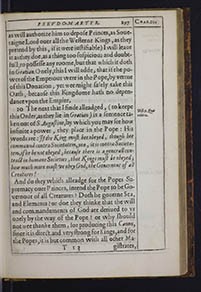 PSEVDO-MARTYR.
297
Chap. 10.
PSEVDO-MARTYR.
297
Chap. 10.
as will authorize him to depose Princes, as Soue-
raigne Lord ouer all the Westerne Kings, as they
pretend by this, if it were iustifiable) I will leaue
it as they doe, as a thing too suspicious and doubt-
full, to possesse any roome, but that which it doth
in Gratian. Onely, this I will adde, that if the po-
wer of the Emperour were in the Pope, by vertue
of this Donation, yet wee might safely take this
Oath, because this Kingdome hath no depen-
dance vpon the Empire. 20 The next that I finde alleadged, (to keepe
this Order, Dist. 9. Quæ
contra. as they lie in Gratian) is a sentence ta-
ken out of S. Augustine, by which you may see how
infinite a power, they place in the Pope: His
words are: If the King must bee obeyed, though hee
commaund contra Societatem, yea, it is contra Societa-
tem, if he be not obeyed, because there is a generall con-
tract in humane Societies, that Kings must be obeyed;
how much more must we obey God, the Gouernour of all
Creatures? And do they which alleadge for the Popes Su-
premacy ouer Princes, intend the Pope to be Go-
uernour of all Creatures? Doth he gouerne Sea,
and Elements? or doe they thinke that the will
and commandements of God are deriued to vs
onely by the way of the Pope? or why should
not wee thanke them, for producing this Canon,
since it is direct, and very strong for Kings, and for
the Popes, it is but common with all other Ma-
Tt3 gistrates, 298
 Chap. 10.
298
PSEVDO-MARTYR.
gistrates, who must be obeyed, when God speaks
Chap. 10.
298
PSEVDO-MARTYR.
gistrates, who must be obeyed, when God speaks
in them, or when they speake not against God? Dist. 10. lege. 21 In the tenth Distinction, one Pope by the
testimony of two other popes, saies, That the Ec-
clesiastique Constitutions must be preferred before the
Emperours lawes: And the cases mentioned there,
are, the constituting of a Metrapolitane, & the dis-
soluing of a Mariage, vpon entring into Religion;
to which, I say, that these cases, by consent of the
Emperours, were vnder their iurisdiction. And if
you gather a generall rule by this, of the force of
Canons aboue Ciuill lawes, you proceede indirect-
ly accepting the same persons, for Parties, Iudges,
and Witnesses: and besides it is not safe arguing
from the Emperour to another absolute Prince,
nor from the authority, which Canons haue in
his Dominions, to what they should haue in
all. 22 In the 21. Distinction, A Pope writing to a
Bishoppe of Milan, Dist. 21. Omnes. telles him, That the dignities
and preheminences of Churches, must be as the
Bishoppe of Rome shall ordaine, because Christ
committed to Peter, which hath the keyes of eter-
nall life, Iura terreni simul & Cælestis imperij But if
he meane by his Terrenum Imperium, the disposing
of the dignities and preheminencies of Churches
one aboue another in this world: Or if he meane
by it, That he hath this Terrenum Imperium, as he
hath the keyes of heauen, that is to binde and loose 299
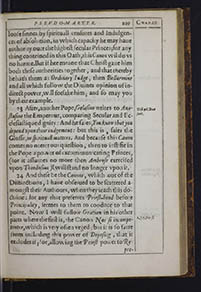 PSEVDO-MARTYR.
299
Chap. 10.
PSEVDO-MARTYR.
299
Chap. 10.
loose sinnes by spirituall censures and Indulgen-
ces of absolution, in which capacity he may haue
authority ouer the highest secular Princes; for any
thing conteined in this Oath, this Canon wil do vs
no harme. But if hee meane that Christ gaue him
both these authorities together, and that thereby
he hath them as Ordinary Iudge, then Bellarmine
and all which follow the Diuines opinion of in-
direct power, will forsake him; and so may you
by their example. 73 After, Dist. 96. Duo
sunt. another Pope, Gelasius writes to Ana-
stasius the Emperour, comparing Secular and Ec-
clesiastique dignity: And he saies, You know that you
depend vpon their iudgement: but this is, saies the
Glosse, in spirituall matters. And because this Canon
comes no neerer our question, then to iustifie in
the Pope a power of excommunicating Princes,
(for it assumes no more then Ambrose exercised
vpon Theodosius) I will stand no longer vpon it. 24 And these be the Canons, which out of the
Distinctions, I haue obserued to be scattered a-
mongst their Authours, when they teach this do-
ctrine: for any that preferres Priest-hood before
Principality, seemes to them to conduce to that
point. Now I will follow Gratian in his other
parts where the first is, 2. 1. 7. Nos si. the Canon Nos si incompe-
tenter, which is very often vrged, but it is so farre
from including this power of Deposing, that it
excludes it; for, allowing the Priest power to Re-
pre- 300
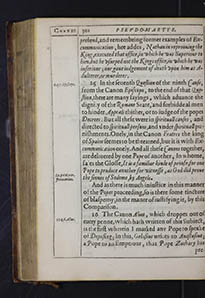 Chap. 10.
300
PSEVDO-MARTYR.
prehend, and remembring former examples of Ex-
Chap. 10.
300
PSEVDO-MARTYR.
prehend, and remembring former examples of Ex-communication, hee addes, Nathan in reproouing the
King, executed that office, in which he was Superiour to
him, but he vsurped not the Kings office, in which he was
inferiour; nor gaue iudgement of death vpon him as A-
dulterer, or murderer. 9. q. 7. Episcopo. 25 In the seuenth Question of the ninth Cause,
from the Canon Episcopo, to the end of that Que-
stion, there are many sayings, which aduance the
dignity of the Romane Seate, and forbidde al men
to hinder Appeals thither, or to iudge of the popes
Decrees: But all these were in spirituall causes, and
directed to spirituall persons, and vnder spirituall pu-
nishments. Onely, in the Canon Fratres the king
of Spaine seemes to be threatned, but it is with Ex-
communication onely. And all these Canons together,
are deliuered by one Pope of another, In whome,
saies the Glosse, It is a familiar kinde of proofe, for one
one Pope to produce another for witnesse, as God did proue
the sinnes of Sodome, Ca. patet. ver.
Innocentius. by Angels. And as there is much iniustice in this manner
of the Popes proceeding, so is there some tincture
of blaspemyblasphemy, in the maner of iustifying it, by this
Comparison. 26 The Canon Alius, which droppes out of
euery penne, 15. q. 6. Alius. which hath written of this Subiect,
is the first wherein I marked any Pope to speake
of Deposing; In this, Gelasius writes to Anastasius;
a Pope to an Emperour, that Pope Zachary his pre- 301
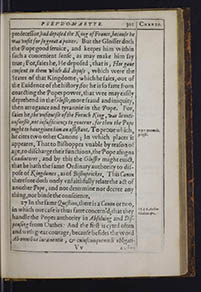 PSEVDO-MARTYR.
301
Chap. 10.
PSEVDO-MARTYR.
301
Chap. 10.
predecessor, had deposed the King of France, because he
was vnfit for so great a power. But the Glosser doth
the Pope good seruice, and keepes him within
such a conuenient sense, as may make him say
true; For, saies he, He deposed, that is, Hee gaue
consent to them which did depose, which were the
States of that Kingdome; which he saies, out of
the Euidence of the history; for he is so farre from
coarcting the Popes power, that wee may easily
deprehend in the Glosse, more fraud and iniquity,
then arrogance and tyrannie in the Pope. For,
saies he, the vnfitnesse of the French King, was licenti-
ousnesse, not infufficiency to gouerne, for then the Pope
ought to haue giuen him an assistant. 7. q. 1. quamuis.
petijsti. To proue which,
he cites two other Canons; In which places it
appeares, That to Bishoppes vnable by reason of
age, to discharge their functions, the Pope assigns
Coadiutores, and by this the Glosser might euict,
that he hath the same Ordinary authority to dis-
pose of Kingdomes, as of Bishoprickes. This Canon
therefore doth onely vnfaithfully relate the act of
another Pope, and not determine nor decree any
thing, nor binde the conscience. 27 In the same Question, there is a Canon or two,
in which our case is thus farre concern'd; 15. q. 6. Autho-
ritatem &c. that they
handle the Popes authority in Absoluing and Dis-
pensing from Oathes: And the first is cyted often
and with great courage; because besides the word
Ab omnibus Iuramentis, & cuiuscunquemodi obligati-
Vv onibus 302
 Chap. 10.
302
PSEVDO-MARTYR.
onibus absoluimus, there followes, parsue thĕ with the
Chap. 10.
302
PSEVDO-MARTYR.
onibus absoluimus, there followes, parsue thĕ with the
spirituall and materiall sword. But when we consider
the case and the History, this power will not ex-
tend to our cause. For the Pope thereby doth
giue liberty to some Bishops, to recouer by iust vi-
olence, such parts of the Church Patrimonie, as were
taken away from them, and doth dispence with
such oathes as they had beene forced to take, by
those which iniuriously infested the Church. Yet
I denie not but that the glosser vpon this Canon is
liberall enough to the Pope, for he sayes, hee hath
power to dispence against the law of Nature, & against
the Apostle. Ibid. 28 After this, followes that solemne and fa-
mous Canon of Gregory the seuenth, Nos sancto-
rum. Of whom, since he had made a new rent in
the body of the Church, (as Authors of his own
Religion (if he had any) professe,) it is no mar
uaile that he patched it, with a new ragge in the
body of the Canon law. Thus therefore he saies,
Insisting vpon the statutes of our predecessors, by our
Apostolique authority, wee absolue from their Oath of
Alleageance, all which are bound to persons excommu-
nicate; And we vtterly forbid them, to beare any Al-
leageance to such, till they come to satisfaction. But to
whom shall these men be subiect in the meane
time? To such a one as will be content to resigne,
when so euer the other will aske forgiuenesse?
Ambition is not an ague; it hath no fits, nor ac-
cesses, 303
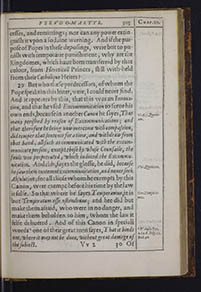 PSEVDO-MARTYR.
303
Chap. 10.
cesses, and remittings; nor can any power extin-
PSEVDO-MARTYR.
303
Chap. 10.
cesses, and remittings; nor can any power extin-guish it vpon a sodaine warning. And if the pur-
pose of Popes in these deposings, were but to pu-
nish with temporarie punishment, why are the
Kingdomes, which haue been transferred by that
colour, from Hereticall Princes, still with-held
from their Catholique Heires? 29 But who these predecessors, of whom the
Pope speaks in this letter, were, I could neuer find.
And it appeares by this, that this was an Innoua-
tion, and that he vsed Excommunication to serue his
own ends, because in another Canon he sayes, 11. q. 3. Quoni-
am. That
many perished by reason of Excommunications; and
that therefore he being now ouercome with compassion,
did temper that sentence for a time, and withdraw from
that band, all such as communicated with the excom-
municate person, except those by whose Counsaile, the
fault was perpetrated, which induced the Excommu-
nication. And this, sayes the glosse, he did, Ver. Quoniam. because
he saw them contemne excommunication, and neuer seek
Absolution; for all those whom he exempts by this
Canon, were exempt before his time by the law
it selfe. So that where he sayes Temperamus, Ver. Tempera-
mus. it is
but Temperatum esse ostendimus; and hee did but
make them afraid, who were in no danger, and
make them beholden to him, whom the law it
selfe deliuered. And of this Canon in speciall
words a a D'Auila Par.
2. Ca. 6. Disp. 11.
Dub. 90 one of their great men sayes, That it binds
not, where it may not be done, without great damage of
the subiect. Vv2 30 Of 304
 Chap. 10.
304
PSEVDO-MARTYR.
15. q. 6. Iuratis. 30 Of his Successor, almost immediate, (for
Chap. 10.
304
PSEVDO-MARTYR.
15. q. 6. Iuratis. 30 Of his Successor, almost immediate, (for
Victor the third lasted but a little) I finde another
Canon, almost to the same purpose; for he writes
to a Bishop, to forbid the Souldiers of an Earle,
who was excommunicate, to serue him, though
they were sworne to him. For, sayes he, They are
not tied by any authority to keepe that alleageance, which
they haue sworne to a Christian Prince, which resists
God and his Saints, and treads their precepts vnder his
feete. But in this man, as Gregories spirit wrought
in him, Binius. To. 3. par.
2. fo. 1293. whilst he liued, for he was his Messenger
to publish the Excommunication against the
Emperour in Germany, so Gregories ghost speakes
now; for all this was done to reuenge Gregories
quarrell; though in his owne particular hee had
some interest, and reason of bitternesse, for he had
beene taken and ill vsed by Henry in Germany. q. 1. Generali. 31 In the 25 Cause there is a Canon which tasts
of much boldnesse; What King so euer, or Bishop,
or great person, shall suffer the Decrees of Popes to be
violated, Execrandum Anathema sit. But these (for in
this Cause there are diuers Canons, for the obser-
uing of the Canons) are for the most part such im-
precations, as I noted before, Gregory the first to
haue made for preseruation of the priuiledges of
Medardus Monastery, and some other of the same
name (of which kinde also Villagut, De rebus Eccles.
restitu. par. 2. l. 3.
C. 5. N. 17. hath gathered
some other examples;) And at farthest, they ex-
tend but to excommunication; and are pronounced by 305
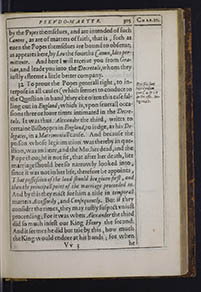 PSEVDO-MARTYR.
305
Chap. 10.
PSEVDO-MARTYR.
305
Chap. 10.
by the Popes themselues, and are intended of such
Canons, as are of matters of faith, that is, such as
euen the Popes themselues are bound to obserue;
as appeares here, by Leo the fourths Canon, Ideo per-
mittente. And here I will receiue you from Gra-
tian, and leade you into the Decretals, whom they
iustly esteeme a little better company. 32 To proue the Popes generall right, Qui filij sunt
legit. Causam
quæ. C. 4. & c. 7.
& De offic. De-
leg. ca. 17. to in-
terpose in all causes (which seemes to conduce to
the Question in hand) they cite often this case fal-
ling out in England; which is, vpon seuerall occa-
sions three or foure times intimated in the Decre-
tals. It was thus: Alexander the third, writes to
certaine Bishoppes in England, to iudge, as his De-
legates, in a Matrimoniall cause. And because the
person whose legitimation was thereby in que-
stion, was an heire, and the Mother dead, and the
Pope thought it not fit, that after her death, her
marriage should bee so narrowly looked into,
since it was not in her life, therefore he appoints,
That possession of the land should bee giuen first, and
then the principall point of the marriage proceeded in.
And by this they euict for him a title in temporall
matters Accessorily, and Consequently. But if they
consider the times, they may iustly suspect vniust
proceeding; For it was when Alexander the third
did so much infest our King Henry the second.
And it seemes he did but trie by this, how much
the King would endure at his hands; for when Vv3 he 306
 Chap. 10.
306
PSEVDO-MARTYR.
Chap. 10.
306
PSEVDO-MARTYR.
he vnderstood that the king tooke it ill, then came
another Letter, related also in the Canons, wherein
hee confesseth, that that matter appertaines to the
King, and not to the Church, And therefore com-
maundes them to proceede in the matter of the
marriage, without dealing with the possession of
the land. Tit. cod. per ve-
nerabilem. 33 Another Canon, not much vrged by the de-
fenders of direct Authoritie, but by the other fa-
ction, is a Letter of Innocent the third. In which
Letter, I beleeue the Pope meant to lay downe,
purposely and determinately, how farre his pow-
er in Temporall matters extended. For it is not like-
ly, that vpon a Petition of a priuate Gentleman,
for Legitimation of his Children, who doubted
not of his power to doe it, the Pope would des-
cend to a long discourse and proofe out of both
testaments, and reasons of conueniencie, that he
might doe it, and then in the end, tell him, hee
would not, except hee meant, that this Letter
should remaine as euidence to posteritie, what
the Popes power in Temporall causes was. Let vs
see therefore what that is which he claimes. 34 A Subiect of the King of France, who had
put away his Wife, desires the Pope to legitimate
certaine Children which he had by a second wife.
And, it seemes, he was encouraged thereunto, be-
cause the Pope had done that fauour to the King
of France before: The Pope answers thus, By this, it 307
 PSEVDO-MARTYR.
307
Chap. 10.
PSEVDO-MARTYR.
307
Chap. 10.
it seemes, that I may graunt your request, because I may
certainely Legitimate to all spirituall capacities, and
therefore it is Verisimilius, & probabilius, that I may
doe it in Temporall. And, sayes he, It seemes that this
may be prooued by a similitude, because hee which is as-
sumed to bee a Bishop, is exempted thereby from his fa-
thers iurisdiction; and a slaue deliuered from bondage,
by being made a Priest: And, hee addes, In the patri-
monie I may freely doe it, where I am supreme Prince:
But your case, is not the same as the Kings was, not on-
ly for spirituall considerations, which are, That he was
lawfully seperated, and pretended neerenesse of blood,
and was not forbid to marrie againe, and your procee-
ding hath beene without colour, and in contempt of the
Church. But the King, who had no Superiour in Tem-
porall matters, might without doing wrong to any other,
submit himselfe to our iurisdiction; But you are knowen
to be subiect to another. Thus farre hee proceeded,
waueringly, and comparatiuely, and with condi-
tions and limitations. 35 And least this should not stretch farre en-
ough, he addes; Out of the Patrimonie in certaine cau-
ses, wee doe exercise Temporall iurisdiction casually, Ver. Certis.
which the Glosse interprets thus, That is when wee
are requested: And the Pope hath said before, That
he which makes this request, must be one that hath no Su-
periour: And in this place he sayes, That this may not
be done, to preiudice anothers right. But after this, vp-
on a false foundation, that is, an errour in their Transla- 308
 Chap. 10.
308
PSEVDO-MARTYR.
Chap. 10.
308
PSEVDO-MARTYR.
Translation (where in Deuteronomie, 17. 12. Death being
threatned to the transgressour of the sentence, Of
the Priest and Iudge, they haue left out the Iudge)
he makes that state of the Iewes, so falsely vnder-
stood, to be a Type of Rome, and so Rome at this time
to be Iudge of all difficulties, because it is the
seate of the high Priest. But he must be thought
more constant, then to depart from his first groūd
and therefore must meane, When superiour Princes,
which haue no other Judges, are in such doubtes, as none
else can determine, Recurrendum est, ad sedem Apostoli-
cam; that is, they ought to do it, rather then to go to the
onely ordinary Arbitrator betweene Soueraigne
Princes, the sword. 36 And when such Princes doe submit their
causes to him, in such cases hee declares himselfe
by this Canon, to be a competent Iudge, though the
matter be a ciuill businesse, and he an Ecclesiasti-
call person: and though he seeme to goe some-
what farther, and stretch that typicall place in
Deuteron. to agree with Rome so farre, that as there,
so here, he which disobeyes, must die, yet hee ex-
planes this death thus, Let him as a dead man, be sepe-
rated from the Communion, by Excommunication. So
that this Canon purposely enacted to declare tempo-
rall authority, by a Pope, whom none exceeded in
a stiffe and earnest promouing the dignity of
that Sea, procedes onely by probabilities, and veri-
similitudes, and equiualencies, and endes at last with Excom- 309
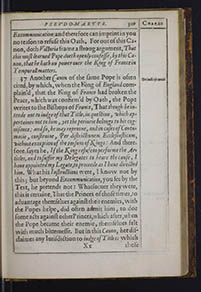 PSEVDO-MARTYR.
309
Chap. 10.
PSEVDO-MARTYR.
309
Chap. 10.
Excommunication; and therefore can imprint in you
no reason to refuse this Oath. For out of this Ca-
non, doth Victoria frame a strong argument, That
this most learned Pope doeth openly confesse, by this Ca-
non, that he hath no power ouer the King of France in
Temporall matters. 37 Another Canon of the same Pope is often
cited, De iudicijs nouit by which, when the King of England com-
plain'd, that the King of France had broken the
Peace, which was confirm'd by Oath, the Pope
writes to the Bishops of France, That though he in-
tende not to iudge of that Title, in question, which ap-
pertaines not to him, yet the periurie belongs to his cog-
nisance: and so, he may reprooue, and in cases of Contu-
macie, constraine, Per districtionem Ecclesiasticam,
without exception of the persons of Kings: And there-
fore, sayes he, If the King refuse to performe the Ar-
ticles, and to suffer my Delegates to heare the cause, I
haue appointed my Legate, to proceede as I haue directed
him. What his Instructions were, I know not by
this; but beyond Excommunication, you see by the
Text, he pretends not: Whatsoeuer they were,
this is certaine, That the Princes of those times, to
aduantage themselues against their enemies, with
the Popes helpe, did often admit him, to doe
some acts against other Princes, which after, when
the Pope became their enemie, themselues felt
with much bitternesse. But in this Canon, hee dis-
claimes any Iurisdiction to iudge of Titles; which Xx those 310
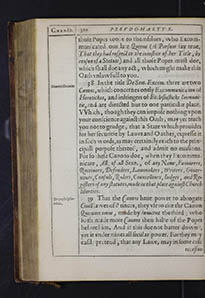 Chap. 10.
310
PSEVDO-MARTYR.
Chap. 10.
310
PSEVDO-MARTYR.
those Popes tooke to themselues, who Excom-
municated our late Queene (if Parsons say true,
That they had respect to the iniustice of her Title, by
reason of a Statute) and all those Popes must doe,
which shall doe any act, which might make this
Oath vnlawfull to you. Nonerit. Grauem 38 In the title De Sent. Excom. there are two
Canons, which concernes onely Excommunication of
Heretickes, and infringers of Ecclesiasticke Immuni-
tie, and are directed but to one particular place.
VVWhich, though they can impose nothing vpon
your conscience against this Oath, may yet teach
you not to grudge, that a State which prouides
for her securitie by Lawes and Oathes, expresse it
in such words, as may certainely reach to the prin-
cipall purpose thereof, and admit no euasions.
For so these Canons doe, when they Excommu-
nicate, All, of all Sexe,,, of any Name, Fauourers,
Receiuers, Defenders, Lawmakers, Writers, Gouer-
nours, Consuls, Rulers, Councellours, Iudges, and Re-
gisters of any statutes, made in that place against Church
liberties. De prescriptio-
nibus. 39 That the Canons haue power to abrogate
Ciuill lawes of Princes, they vse to cite the Canon
Quoniam omne, made by Innocent the third, who
hath made more Canons then halfe of the Popes
before him. And if this doe not batter downe,
yet it vndermines all secular power. For they may
easily pretend, that any Lawe, may in some case occasion 311
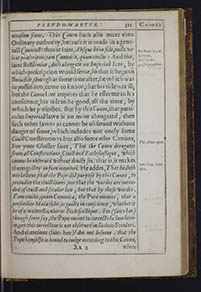 PSEVDO-MARTYR.
311
Chap. 10.
PSEVDO-MARTYR.
311
Chap. 10.
occasion sinne. This Canon hath also more then
Ordinary authority, because it is made in a gene-
rall Councell: thus it saies, Absque bona fide, nulla va-
leat præscriptio, De Pont. l. 5. c. 6.
§ Itaque.
Ex Cod. De
prescriptionibus. tam Canonica, quam ciuilis: And this,
saies Bellarmine, doth abrogate an Imperiall lawe, by
which prescription would serue, so that it begann
Bona fide, though at some time after, he which was
in possession, came to know, that his title was ill;
but the Canon law requires that he esteeme in his
conscience, his title to be good, all the time, by
which he prescribes. But by this Canon, that parti-
cular Imperiall lawe is no more abrogated, then
such other lawes as cannot be obserued without
danger of sinne, which includes not onely some
Ciuill Constitutions, but also some other Canons;
For your Glosser saies, Ver. Nota quod That the Canon derogates
from all Constitutions, Ciuill and Ecclesiastique, which
cannot be obserued without deadly sin: that is, it makes
them guilty in foro interiori. ver. Tam Cano
-
nica. He addes, That he doth
not beleeue, that the Pope did purpose by this Canon, to
preiudice the ciuill lawes, nor that the wordes are inten-
ded of ciuill and secular law, but that by those wordes,
Tam ciuilis, quam Canonica, the Pope meanes, that a
prescriber Malæ fidei, is guilty in conscience, whether it
be of a matter Secular or Ecclesiastique. For (saies bee)
though some say, the Pope meant to correct the law here-
in, yet this correction is not obserued in Iudicio Seculari.
And therefore (saies hee) I doe not beleeue, that the
Pope himselfe is bound to iudge according to this Canon, Xx2 where 312
 Chap. 10.
312
PSEVDO-MARTYR.
Chap. 10.
312
PSEVDO-MARTYR.
where he hath temporall iurisdiction, because hee hath
that Iurisdiction from the Emperour: therefore the
Imperiall law standes still, and is not abrogated
by this Canon, though of a generall Councell. Cap licetō 40 This Pope also by a Canon in the title de
Voto, hath gone the farthest of any, which haue
fallen within my obseruation: for a King of Hun-
gary, which had made a vowe to vndertake a
warre for Hierusalem, preuented by death, impo-
sed the execution thereof vpon his yonger sonne,
who binding himselfe to performe it, with the
armie which he leuied for that purpose, in pre-
tence, troubled his brother in his Kingdome: To
him therefore Innocentius writes, That except he doe
forthwith performe the vow, he shall be excommunicate
and depriued of all right to that Kingdome; and that
the kingdome, if his elder brother die without issue, shall
deuolue to his younger brother. But all these threat-
nings, except that one of Excommunication,
were not thundered by the Pope, as though hee
could inflict them, out of his authority, but he re-
members this ill-aduised Prince, that except he per-
forme the will of his father, he looses his inheritance by
the law: Verb. priuan-
dum. Which the Glosse in this place, endeuours
to proue, and to that purpose cytes, and disputes
some of the lawes in that point. De Maior. &
Obedient. 41 The Canon Solitæ, though it be euery
where alleadged, and therefore it importunes me
to mention it, reaches not to our question, for it is 313
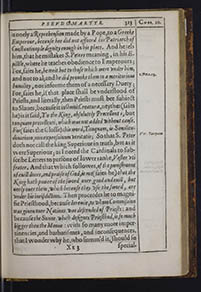 PSEVDO-MARTYR.
313
Chap. 10.
PSEVDO-MARTYR.
313
Chap. 10.
is onely a Reprehension made by a Pope, to a Greeke
Emperour, because hee did not affoord his Patriarch of
Constantinople dignity enough in his place. And he tels
him, that he mistakes S. Peters meaning, in his E-
pistle, where he teaches obedience to Emperours;
For, saies he, he writ but to those which were vnder him,
and not to al; 1. Pet. 2. 13. and he did prouoke them to a meritorious
humility, not informe them of a necessary Duety;
For, saies he, if that place shall be vnderstood of
Priests, and literally, then Priests must bee subiect
to Slaues, because it is Omni Creaturæ, neyther (saies
he) is it said, To the King, absolutely Precellenti, but
tanquam precellenti, which was not added without cause.
For (saies the Glosse) this word, Tanquam, is Similitu-
dinarium, Ver. Tanquam non expressiuum veritatis; So that S. Peter
doth not call the king Superiour in truth, but as it
were Superiour; as I noted the Cardinals to sub-
scribe Letters to persons of lower ranke, Vester vti
frater. And that which followes, of the punishment
of euill doers, and praise of God, is not (saies he) that the
King hath power of the sword ouer good and euill, but
onely ouer them, which because they vse the sword, are
vnder his iurisdiction. Then proceedes he to magni-
fie Priesthood, because Ieremie, to whom Commission
was giuen ouer Nations, was descended of Priests: and
because the Sunne which designes Priesthod, is so much
bigger then the Moone: with so many more imper-
tinencies, and barbarismes, and inconsequences,
that I wonder why he, who summ'd it, should so Xx3 special= 314
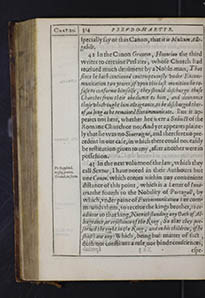 Chap. 10.
314
PSEVDO-MARTYR.
Chap. 10.
314
PSEVDO-MARTYR.
specially say of this Canon, that it is Multum Alle-
gabile. 42 In the Canon Grauem, Honorius the third
writes to certaine Prelates, whose Church had
receiued much detriment by a Noble-man, That
since he hath continued contemptuously vnder Excom-
munication two yeares, if vpon this last monition he re-
fuse to conforme himselfe, they should discharge those
Churches from their obedience to him, and denounce
those which ought him alleageance, to be discharged ther-
of, as long as be remained Excommunicate. But it ap-
peares not here, whether hee were a Subiect of the
Romane Church or no; And yet appeares plaine-
ly that he was no Soueraigne, and therefore no pre-
cedent in our case, in which there could not easily
be restitution giuen to any, after another were in
possession. 43 In the next volume of the law, which they
call Sextus, De Supplend.
neglig. prælat.
Grandi. in sexto. I haue noted in their Authours but
one Canon, which comes within any conuenient
distance of this point, which is a Letter of Inno-
cent the fourth to the Nobility of Portugall, by
which, vnder paine of Excommunication hee com-
maunds them, to receiue the kings brother, as co-
adiutor to that king, Notwithstanding any Oath of Al-
leageance, or resistance of the King; So that they pre-
serued the right in the King, and in his children, if he
shall haue any: Which, being but matter of fact,
doth not constitute a rule, nor binde consciences, espe- 315
 PSEVDO-MARTYR.
315
Chap. 10.
PSEVDO-MARTYR.
315
Chap. 10.
especially when for the fact it selfe, the note saies
in that place, Literâ, b. in
Margine. That the Pope ought not to haue interpo-
sed himselfe in that businesse. 44 In the Extrauagants of Pope Iohn the two
and twenteth, Si fratrum. there is one Canon which would
take great hold of consciences obliged to that Sea,
but that it proceedes from a Pope infam'd for he-
resie, and claimes that Iurisdiction, which it there
inculcates, in the right of being Emperour, at that
time, when the throne, by the death of Henrie
the seuenth, was vacant. Thus it sayes, Since it is
cleare in law, and constantly obserued of olde, that in a
vacancy of the Empire, because then there can be no re-
course to any Secular Iudge, the Iurisdiction, Gouern-
ment, and Disposition of the Empire deuolues to the
Pope, who is knowne to haue exercised all these therein
by himselfe, or others: whereas diuers continue the offi-
ces of the Empire, without our Confirmation, we admo-
nish all vnder Excommunication, euen Kings, to leaue
off those titles; and if they doe not so, within two mo-
neths (how could hee prophesie so long a vacan-
cie?) Wee will Excommunicate the persons, and inter-
dict the Dominions of them all, Etiam superiores et in-
feriores Reges, and proceede with them, spiritually and
temporally, as we shall farther see to be expedient. And
wee absolue all men, of all Oathes, by which they were
bound to them. But, as I said before, this right of
inflicting temporall punishment hee claimes as
Emperour; and the spirituall punishments are threat- 316
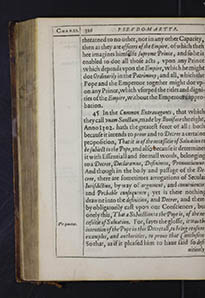 Chap. 10.
316
PSEVDO-MARTYR.
Chap. 10.
316
PSEVDO-MARTYR.
threatned to no other, nor in any other Capacity,
then as they are officers of the Empire, of which then
hee imagines himselfe supreme Prince, and so he is
enabled to doe all those acts, vpon any Prince
which depends vpon the Empire, which he might
doe Ordinarily in the Patrimony; and all, which the
Pope and the Emperour together might doe vp-
on any Prince, which vsurped the titles and digni-
ties of the Empire, without the Emperours appro-
bation. 45 In the Common Extrauagants, that which
they call vnam Sanctam, made by Boniface the eight,
Anno 1302. hath the greatest force of all: both
because it intends to proue and to Decree a certaine
proposition, That it is of the necessitie of Saluation to
be subiect to the Pope, and also because it determines
it with Essentiall and formall words, belonging
to a Decree, Declaramus, Definimus, Pronunciamus.
And though in the body and passage of the De-
cree, there are sometimes arrogations of Secular
Iurisdiction, by way of argument, and conueniencie,
and Probable consequence; yet is there nothing
drawne into the definition, and Decree, and there-
by obligatorily cast vpon our Consciences, but
onely this, That a Subiection to the Pope is, of the ne-
cessitie of Saluation. Ver. ponatur. For, sayes the glosse, it was the
intention of the Pope in this Decretall, to bring reasons,
examples, and authorities, to proue that Conclusion.
So that, as if it pleased him to haue said so defi-
nitively, 317
 PSEVDO-MARTYR.
317
Chap. 10.
nitively, without arguing the case, the Decretall had
PSEVDO-MARTYR.
317
Chap. 10.
nitively, without arguing the case, the Decretall had
beene as perfit and binding, as it is after all his rea-
sons, and argumentation: so doe not his Reasons
bind our reason, or our faith, being no part of the
Definition, but leaue to vs our liberty, for all but
the Definition it selfe. 46 And a Catholique which beleeues by force
of this Decretall, That he cannot be saued except
he obay the Pope, is not bound to beleeue there-
fore, that these words of S. Iohn,10. 16. There shall be one
sheepe-folde, and one sheepheard, are meant of a Sub-
iection of all Christian Princes to the Pope, as this
Decretall, by way of Argument, sayes; but he may
be bold, for all this, to beleeue an elder Pope, that
this is spoken of ioyning Iewes and Gentiles in one faith;
Grego. Homil.
14. or Theophilact, That this proues one God to be the sheep-
heard of the olde and new Testament, against the Ma-
niches. Citat. Ema. Sa. Nor is he bound, because this Decretall saies
it by the way, to beleeue that the words in Saint
Luke,22 . 38. Behold here are two swords, to which Christ did
not answere, It is too much, but it is enough, doe proue
the spirituall and temporall swords to bee in the di-
sposition of the Church; but he is at liberty for all
this, Sâ. to beleeue Chrysostome, That Christ by mentio-
ning two swords in that place, did not meane, that they
should possesse swords, (for what good (sayes he) could
two swords doe?) but he forwarned them of such perse-
cutions, as in humane iudgement would neede the de-
fence of swords. Or he may beleeue Ambrose, That Yy these 318
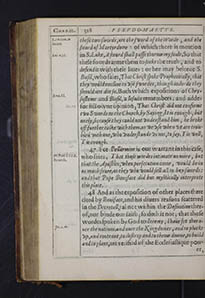 Chap. 10.
318
PSEVDO-MARTYR.
Chap. 10.
318
PSEVDO-MARTYR.
these two swords,L. 10. Com. in
lacam. are the sword of the Worde, and the
sword of Martyrdome: of which there is mention
in S. Luke, Luc 2.35. A sword shall passe thorow my soule. So that
these swords arme them to seeke the truth, and to
defend it with their liues: or hee may beleeue S.
Basil, who saies, That Christ spoke Prophetically, that
they would encline to vse swordes, though indeede they
should not doe so. Both which expositions of Chry-
sostome and Basil, Ema. Sâ. a Iesuite remembers, and addes
for his owne opinion; That Christ did not confirme
two Swords to the Church, by Saying, It is enough, but
onely, because they could not vnderstand him, he broke
off further talke with them, as we vse when we are trou-
bled with one, who vnderstands vs not, to say, Tis well,
Tis enough. 47 For Bellarmine is our warrant in this case,
who saies, De Pont. l. 5. c. 5.
Secundo. That those wordes intimate no more, but
that the Apostles, when persecution came, would be in
as much feare, as they who would sell all to buy swords:
and that Pope Boniface did but mystically interprete
this place. 48 And as the exposition of other places there
cited by Boniface, and his diuers reasons scattered
in the Decretall, al not within the Definition ther-
of, nor binde our faith; so doth it not, that those
wordes spoken by God to Ieremy, I haue set thee o-
uer the nations, Jer. 1. 10. and ouer the Kingdomes, and to plucke
vp, and roote out, to destroy and to throw downe, to build
and to plant, are verified of the Ecclesiastique pow-
er, 319
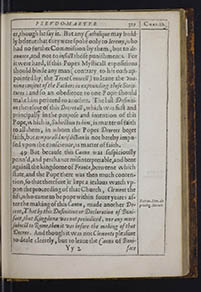 PSEVDO-MARTYR.
319
Chap. 10.
er, though he say it. But any Catholique may bold-
PSEVDO-MARTYR.
319
Chap. 10.
er, though he say it. But any Catholique may bold-ly beleeue that they were spokē only to Ieremy, who
had no further Commission by them, but to de-
nounce, and not to inflict those punishments. For
it were hard, if this Popes Mysticall expositions
should binde any man (contrary to his oath ap-
pointed by the Trent Councell) to leaue the vna-
nime consent of the Fathers in expounding these Scrip-
tures: and so an obedience to one Pope should
make him periured to another. The last Definiti-
on therefore of this Decretall, which was first and
principally in the purpose and intention of this
Pope, which is, Subiection to him, is matter of faith
to all them, in whom the Popes Decrees beget
faith, but temporall Iurisdiction is not hereby impo-
sed vpon the conscience, as matter of faith. 49 But because this Canon was suspiciously
penn'd, and perchance misinterpretable, and bent
against the kingdome of France, betweene which
state and the Pope there was then much conten-
tion, so that therefore it kept a iealous watch vp-
pon the proceeding of that Church, Clement the
fift, who came to be pope within foure yeares af-
ter the making of this Canon, Extrau. Com. de
priuileg. Meruit. made another De-
cree, That by this Definition or Declaration of Boni-
face, that Kingdome was not preiudiced, nor any more
subiect to Rome, then it was before the making of that
Decree. And though it was not Clements pleasure
to deale cleerely, but to leaue the Canon of Boni-
Yy2 face 320
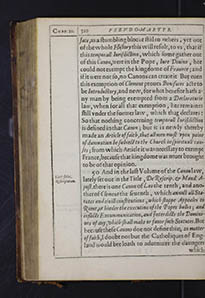 Chap. 10.
320
PSEVDO-MARTYR.
face, as a stumbling blocke still to others, yet out
Chap. 10.
320
PSEVDO-MARTYR.
face, as a stumbling blocke still to others, yet out
of the whole History this will result, to vs, that if
this temporall Iurisdiction, which some gather out
of this Canon, were in the Pope, Iure Diuino, hee
could not exempt the kingdome of Fraunce; and
if it were not so, no Canons can create it But euen
this exemption of Clement proues Bonifaces acte to
be Introductory, and new, for what benefite hath a-
ny man by being exempted from a Declaratorie
law, when for all that exemption, hee remaines
still vnder the former law, which that declares:
So that nothing concerning temporall Iurisdiction
is defined in that Canon; but it is newly thereby
made an Article of faith, that all men must vpon paine
of damnation be subiect to the Church in spirituall cau-
ses; from which Article it was necessary to exempt
France, because that kingdome was neuer brought
to be of that opinion. Licet fælici.
Rescriptorum. 50 And in the last Volume of the Canon law,
lately set out in the Title, De Rescrip. & Mand. A-
post. there is one Canon of Leo the tenth, and ano-
ther of Clement the seuenth, which annull all Sta-
tutes and ciuill constitutions, which stoppe Appeales to
Rome, or hinder the execution of the Popes bulles; and
inflicts Excommunication, and Interdicts the Domini-
ons of any, which shall make or fauor such Statutes. But
because these Canons doe not define this, as matter
of faith, I doubt not but the Catholiques of Eng-
land would bee loath to aduenture the daungers which 321
 PSEVDO-MARTYR.
321
Chap. 10.
PSEVDO-MARTYR.
321
Chap. 10.
which our Lawes inflict, vpon such as seeke Iu-
stice at Rome, which may be had here: And they
doe, though contrarie to these Canons, in continu-
all practise, bring all their causes into the Courtes
of Iustice here, which, if the Canons might pre-
uaile, belong'd to Rome. 51 And these be all the Canons, which I haue
mark'd either in mine owne reading of them, or
from other Authors which write of these questi-
ons; to bee cited to this purpose. Those which
concerne Ecclesiasticke immunitie, or the Popes spiri-
tuall power I omitted purposely: And of this kind
which I haue dealt withall, I doubt not but some
haue escaped me. But I may rather be ashamed
of hauing read so much of this learning, then not
to haue read all. 52 Heere therefore I will conclude, that
though to the whole body of the Canon Law, there
belong'd as much faith and reuerence, as to the
Canons of the old Councels, yet out of them, you
can finde nothing to assure your consciences, that
you may incurre these dangers for refusall of the
Oath. Nor may the Pope bee presum'd to ima-
gine, that he shal re-establish himself in any place,
which hath escaped, and deliuered it selfe from
his vsurpations, by any Canon Law, except he be a-
ble to vse that Droict du Canon, which Montmoren-
cie the French Constable, perswaded his King to
vse against a Towne which held out against him. Yy3 Chap. 322
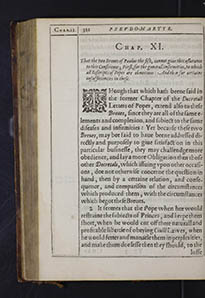 Chap. 11.
322
PSEVDO-MARTYR.
Chap. XI.
That the two Breues of Paulus the fift, cannot giue this assurance
Chap. 11.
322
PSEVDO-MARTYR.
Chap. XI.
That the two Breues of Paulus the fift, cannot giue this assurance
to this Conscience; First, for the generall infirmities, to which
all Rescripts of Popes are obnoxious: And then for certaine
insufficiencies in these.
THoughThough that which hath beene said in
the former Chapter of the Decretall
Letters of Popes, extend also to these
Breues, since they are all of the same e-
lements and complexion, and subiect to the same
diseases and infirmities: Yet because these two
Breues, may bee said to haue beene addressed di-
rectly and purposely to giue satisfaction in this
particular businesse, they may challendge more
obedience, and lay a more Obligation then those
other Decretals, which issuing vpon other occasi-
ons, doe not otherwise concerne the question in
hand, then by a certaine relation, and conse-
quence, and comparison of the circumstances
which produced them, with the circumstances
which begot these Breues. 2 It seemes that the Pope when hee would
restraine the subiects of Princes, and keepe them
short, when he would cut off there naturall and
profitable libertie of obeying Ciuill Lawes, when
he would fetter and manacle them in perplexities,
and make them doe lesse then they should, to the losse 323
 PSEVDO-MARTYR.
323
Chap. 11.
PSEVDO-MARTYR.
323
Chap. 11.
losse of life, and liberties, he is content to send his
Breues; But when he will swell and blow vp Sub-
iects with Rebellion, when he will fill them with
opinions, that they may resist the entrances, or
interrupt the possessions of Princes, when hee
will haue them doe more then they should doe,
then come forth his Buls. Anto. August. de
Emend. Grat. l. 2
Dial. 2. For they say their Buls
are so called out of the tumor, and swelling of the
Seale; And the other, because they are dispatch'd
vnder a lesse Seale, Tholoza. Syntag.
l. 15. c. 4. n. 10. Sub Annulo piscatoris, are there-
fore called Breues; For, in temporall businesses of
forraigne Princes, his Letters are euer defectiue,
or abundant; they command too much, or too
little. 3 And as the Popes haue euer beene absti-
nent in declaring and expressing in certaine and
euident tearmes, how they haue this temporall Iurisdi-
ction, least hauing once ioynde issue vpon some
one way, all men should bende their proofes a-
gainst that, and being once defeated, they could
be admitted to no other plea, then themselues had
chosen to adhere to, and relie vpon: So haue they
abstained as much from giuing any binding re-
solution, in the question, how farre the ciuill lawes
of Princes doe binde the subiects conscience. Manual. c. 23.
Nu. 48. For Na-
uarrus testifies of himselfe, and of Caietane, and o-
thers, that it was much desired of the Councell of
Trent; that it would haue defined something certainely
in that point: for the want of this definition brought him 324
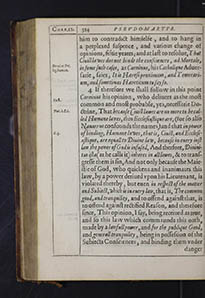 Chap. 11.
324
PSEVDO-MARTYR.
Chap. 11.
324
PSEVDO-MARTYR.
him to contradict himselfe, and to hang in
a perplexed suspence, and various change of
opinions, fiftie yeares; and at last to resolue, That
Ciuill lawes do not binde the consciences, ad Mortale,
in some such cases,De vi et Pot.
leg. human. as Carninus, his Catholique Aduer-
sarie, saies, It is Hæresi proximum, and Temerari-
um, and sometimes Hæreticum to say so. 4 If therefore we shall follow in this point
Carninus his opinion, Ca. 8. who deliuers as the most
common and most probable, yea, necessarie Do-
ctrine, That because Ciuill lawes are no more to be cal-
led Humane lawes,Par. 1. C. 1. then Ecclesiastique are, (for so also
Nauarrus confounds the names) and that in power
of binding, C. 3. Humane lawes, that is, Ciuill, and Ecclesi-
astique, are equall to Diuine law, because in euery iust
law the power of God is infused, And therfore, Diuini-
tas ista (as he calls it) inheres in all lawes, & to trans-
gresse them is sin, And not only because the Maie-
stie of God, who quickens and inanimates this
law, by a power deriued vpon his Lieutenant, is
violated thereby, but euen in respect of the matter
and Subiect, which is in euery law, that is, The common
good, and tranquility, and to offend against that, is
to offend against rectified Reason, and therefore
since, This opinion, I say, being receiued as true,
and so this law which commaunds this oath,
made by a lawfull power, and for the publique Good,
and generall tranquility, being in possession of the
Subiects Consciences, and binding them vnder danger 325
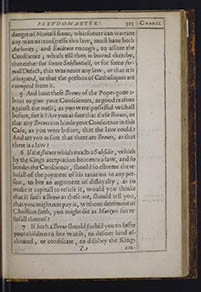 PSEVDO-MARTYR.
325
Chap. 11.
PSEVDO-MARTYR.
325
Chap. 11.
danger of Mortall sinne, whatsoeuer can warrant
any man to transgresse this law, must haue both
Authority, and Euidence enough, to assure the
Conscience, which till then is bound thereby,
that either for some Substantiall, or for some for-
mall Defect, this was neuer any law, or that it is
Abrogated, or that the persons of Catholiques are
exempted from it. 5 And haue these Breues of the Popes gone a-
bout to giue your Consciences, as good reasons
against the oath, as you were possessed withall
before, for it? Are you as sure that these Breues, or
that any Breues can binde your Conscience in this
Case, as you were before, that the law could?
And are you as sure that there are Breues, as that
there is a law? 6 If the statute which enacts a Subsidie, which
by the Kings acceptation becomes a law, and so
bindes the Conscience, should so esteeme the re-
fusall of the payment of his taxation in any per-
son, to bee an argument of disloyalty, as to
make it capitall to refuse it, would you thinke
that it such a Breue as these are, should tell you,
that you might not pay it, without detriment of
Christian faith, you might die as Martyrs for re-
fusall thereof? 7 If such a Breue should forbid you to suffer
your children to bee wards, to deliuer land es-
cheated, or confiscate, to disobey the Kings Zz em- 326
 Chap. 11.
326
PSEVDO-MARTYR.
Chap. 11.
326
PSEVDO-MARTYR.
emprest when hee leuies an Armie, or any such
act due by conscience to his lawes, should this
worke so vpon you, as to make you incurre the
penalties of lawes, or suspicion of ill affected
subiects? Nor can you say, that these are meere
temporall matters, and therefore remoued from
his Iurisdiction; for all sinne is spirituall, and hee is
Iudge what is sinne. 8 How weake a ground for Martyredome, and
how vnsufficient to deuest a conscience of an o-
bedience, imposed in generall by nature, and
fastned with a new knot by an expresse law, are
such sickly and fraile Breues, as the smallest and
most vndiscernable errour, euen in matter of
forme doth annihilate? for first, in the Title of
Constitutions and Rescripts of Popes (which is al-
waies the next Title to that of the Trinity and Ca-
tholique Faith, in all the bookes of the Canon law, ex-
cept those bookes which haue no Title of the
Trinity & Catholique faith) there appeares very ma-
ny Reasons by which a Breue may bee of no
force. Extra. de Re-
script. ex parto. 9 Alexander the third, writing to an Arch-
bishop of Canturbury, giues a rule of large extent;
That in these kinde of letters (that is, such as pro-
ceede vpon information, as our case is) this conditi-
on; If the request be vpon true grounds, is euer vnder-
stood, though it be not expressed. And writing to the
Archbishoppe of Rauenna, Ibid. Si quando. he saies, If at any time we write 327
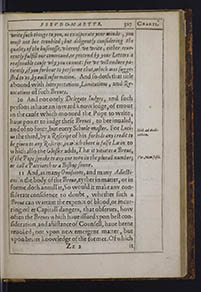 PSEVDO-MARTYR.
327
Chap. 11.
PSEVDO-MARTYR.
327
Chap. 11.
write such things to you, as exasperate your minde, you
must not bee troubled; but diligently considering the
quality of the businesse, whereof we write, either reue-
rently fulfill our command, or pretend by your Letters a
reasonable cause why you cannot: for we will endure pa-
tiently, if you forbear to performe that, which was sugge-
sted to vs by euill information. And so doth that title
abound with Interpretations, Limitations, and Re-
uocations of such Breues. 10 And not onely Delegate Iudges, and such
persons as have an inward knowledge, of errour
in the cause which mooued the Pope to write,
haue power to iudge these Breues, to bee inualid,
and of no force, Ibid. ad Audi-
entiam. but euery Schoole-master. For Luci-
us the third, by a Rescript of his forbids any credit to
be giuen to any Rescript, in which there is false Latin: to
which also the Glosser adds, That it vitiates a Breue,
if the Pope speake to any one man in the plurall number;
Ver. Manifestū. or call a Patriarch or a Bishop sonne. 11 And, as many Omissions, and many Adiecti-
ons in the body of the Breue, eyther in matter, or in
forme doth annull it, So would it make any con-
siderate conscience to doubt, whether such a
Breue can warrant the expence of blood, or incur-
ring other Capitall dangers, that obserues, how
often the Breues which haue issued vpon best con-
sideration and assistance of Counsell, haue beene
reuoked; not vpon new emergent matter, but
vpon better knowledge of the former. Of which Zz2 it 328
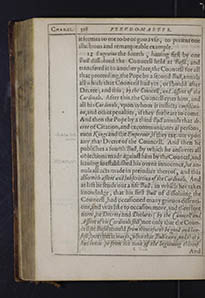 Chap. 11.
328
PSEVDO-MARTYR.
Chap. 11.
328
PSEVDO-MARTYR.
it seemes to me to be of good vse, to present one
illustrous and remarqueable example. 12 Eugenius the fourth, hauing first by one
Bull dissolued the Councell held at Basil, and
transfered it to another place, the Councell for all
that proceeding, the Pope by a second Bull, annuls
all which that Councell had yet, or should after
Decree; and this, by the Councell, and Assent of the
Cardinals. After this the Councell cytes him, and
all his Cardinals, vpon whom it inflicts confiscati-
on, and other penalties, if they forbeare to come.
And then the Pope by a third Bull annuls that de-
cree of Citation, and excommunicates al persons,
euen Kings and the Emperour, if they execute vpon
any, that Decree of the Councell. And then he
publishes a fourth Bull, by which he answeres all
obiections made against him by the Councel, and
hauing so established his owne innocence, he an-
nuls all acts made in preiudice thereof, and this
also with assent and subscription of the Cardinals. And
at last he sends out a fift Bull, in which hee takes
knowledge, that his first Bull of dissoluing the
Councell, had occasioned many grieuos dissenti-
ons, and was like to occasion more, and therefore
now, he Decrees and Declares (by the Councell and
Assent of his Cardinals still) not only that the Coun-
cell of Basil should from thenceforth be good and law-
full, but that it was so, when that Bull came, and that it
had beene so from the time of the beginning thereof. And 329
 PSEVDO-MARTYR.
329
Chap. 11.
PSEVDO-MARTYR.
329
Chap. 11.
And so in expresse wordes, hee annuls his annul-
ling of it: and he reuokes two former Buls, and
pronounces them Irritas, Annullatas, Cassatas; by
the first whereof he had disabled the Councell,
and by the second had excommunicated Princes,
which should execute that, which he pronoun-
ces now to be iust: and of the other Bull he saies,
It proceeded not from him, nor by his knowledge, though
it were testified by the Cardinals, and endorsed for-
mally by his Secretary. And euen this last Bull of
so many Reuocations, Annihilations, and Tergiuersati-
ons was not thought strong, nor out of the dan-
ger of being reuoked againe, till the Councell ac-
cepted it, and ratified it by applying the BVLL
and Seale of the Councell to it. 13 So is it familiar in the Popes, not for the
variety of iust occasion, but for personall hate to
their predecessors, to annull the acts of one ano-
ther. So Stephen the sixth or seuenth, Caranza. fo. 414. abrogated Om-
nes ordinationes, of Pope Formosus, and digged him vp,
and cut of some of his fingers, Binius. To. 3. par.
2. fo. 1047. and cast him into Tyber,
and made all to whom he had giuen Orders, take new
Orders againe. Carran. Ibid. And next yeare Pope Romanus abro-
gated all Stephens Acts; and within seuen yeare af-
ter, came Sergius, who refreshed the hate against
Formosus, Id. fo. 415. and beheaded his body; which I wonder
how he found, since Pope Stephen had so long be-
fore cast it into Tyber. 14 And in a matter so mainly concerning Zz3 faith 330
 Chap. 11.
330
PSEVDO-MARTYR.
Chap. 11.
330
PSEVDO-MARTYR.
faith, as amongst them, an Autentique translati-
on of the Bible, is, betweene the Edition of Six-
tus the fift, and the Edition of Clement the eight,
there is so much difference, euen in absolute and
direct Contradictions, as he which reades the seue-
rall Breues, by which those two Editions are au-
thorised; both hauing equall iustifications of the
present Editions, equal absolutions from oathes
for admitting any other, equall imprecations and
curses, for omitting these, may well thinke that
that is a weake and litigious title to Martyrdome,
which is grounded vpon the Popes Breues, which
he himselfe, when he sends them, knowes not
whether they be iust or no. 15 For, as they haue forbidden many lawfull
things, and offered to destroy the lawes them-
selues, so haue they allowed and authorized ma-
nie things, which our owne Reason, and dis-
course, and Experience, can conuince of fal-
shood. 16 It is the common opinion that Eugenius
the third, confirmed Gratian. Of whom, we may
be bolde, out of that learned Bishop which hath
made animaduersions vpon him, to say, That he
knew neither things nor words, mistooke matters
and names, erred in places, and times, and had nei-
ther seene Fathers, Councels, nor Rolls. And
though this Bishop seeme not to beleeue that Eu-
genius did confirme him, Dialo. 3. yet hee confesses, That hee 331
 PSEVDO-MARTYR.
331
Chap. 11.
PSEVDO-MARTYR.
331
Chap. 11.
hee which doth beleeue such a confirmation, is bound
thereby to beleeue as many errours, as are in Gratian
For, it seemes we haue no longer liberty to doubt,
after such a confirmation: as it will follow eui-
dently out of Bellarmines fashion of arguing,
De purg. l. 1. C. 9.
Altera. when he sayes, We are bound to obay the Pope, when
hee institutes a festiuall of a Saint; yet wee are neuer
bound to doe against our conscience; and therefore we
may no longer doubt it; but wee must make his
Decree our conscience. So that if either Eugenius
confirmed it before, or Gregory the thirteenth
since, our liberty is precluded, and we must cre-
dulously, and faithfully swallow, not onely all
the vnwholsome, and insipid negligences, igno-
rances, and barbarismes of Gratian, but all the
bitter and venomous mixtures to Christs merit,
and all the blasphemies and diminutions of his
Maiestie, which Boniface the ninth, and Martin
the fift, haue obtruded to vs, by approuing and
confirming by their Bulls, Histor. de Sacr.
Sindone. Par. 1.
Epist. lector. the Reuelations of Saint
Brigid; for so sayes Paleotus they haue done. 17 These heauie inconueniencies, and dan-
gerous precipitations into errours, being fore-
seene by some of the ancient Schoolemen, out of
their Christian libertie, and prudent estimation
of the Popes Authoritie, they haue pronounced
this infallibilitie of iudgement, to bee onely then
in the Pope, When he doeth applie all Morall meanes to
come to the knowledge of the trueth; As, hearing both parties, 332
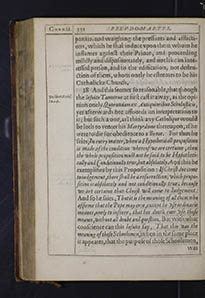 Chap. 11.
332
PSEVDO-MARTYR.
Chap. 11.
332
PSEVDO-MARTYR.
parties, aud waighing the pressures and afflicti-
ons, which he shal induce vpon them whom he
inflames against their Prince, and proceeding
mildly and dispassionately, and not like an inte-
ressed person, and to the edification, not destru-
ction of them, whom onely he esteemes to be his
Catholicke Church. 18 And this seemes so reasonable, that though
the Iesuite Tannerus at first cast it away, De libert. Eccles.
l. 2. c. 9. as the opi-
nion onely, Quorundam ex Antiquioribus Scholasticis,
yet afterwards hee affoords an interpretation to
it; but such a one, as I think any Catholique would
be loth to venter his Martyrdome thereupon, if he
were to die for obedience to a Breue. For thus he
saies, In euery matter, when a Hypotheticall proposition
is made, of the condition whereof we are certaine, then
the whole proposition must not be said to be Hypotheti-
cally and Conditionally true, but absolutely. And this he
exemplifies by this Proposition: If Christ doe come
to iudgement, there shall be a resurrection, which propo-
sition is absolutely and not conditionally true, because
we are certaine that Christ will come to Iudgement:
And so he saies, That it is the meaning of all them who
affirme that the Pope may erre, except he vse ordinarie
meanes, onely to inferre, that hee dooth euer vse those
meanes, without all doubt and question. But with what
conscience can this Iesuite say, That this was the
meaning of these Schoolemen, when in the same place
it appeares, that the purpose of those Schoolemen, was 333
 PSEVDO-MARTYR.
333
Chap. 11.
PSEVDO-MARTYR.
333
Chap. 11.
was to bring the Pope to a custome of calling
Councels, in determining waighty causes; for
when they say, He may erre except hee vse Ordinarie
meanes, and they intended generall Councels for
this ordinary meanes, can they bee intended in
saying so, to meane that the Pope did euer in such
cases vse Generall Councels, when they reprehended
his neglecting that ordinary meanes, and labou-
red to reduce him to the practise thereof? 19 And though most of these infirmities inci-
dent to Breues in generall, doe so reflect vppon
these two Breues in question, that any man may
apply them, yet it may doe some good to come to
a neerer exagitation and trial, of the necessary ob-
ligation which they are imagined to impose. It is
good Doctrine which one of your men teaches;
That euen in lawes, Carnino de vi et
pot. leg Huma.
C. 10. euery particular man hath power to
interprete the same to his aduantage, and to dispence
with himselfe therein, if there occurre a sudden case of
necessity, and there be no open way and recourse to the
Superiour. The first part of which Rule would
haue iustified them, who tooke the oath before
the Breues (though they had had some scruples in
their conscience) by reason of the great scandall
to the cause, and personall detriment, which the
refusall was likely to draw on. 20 Nor can the Catholiques be said, to haue had
as yet recourse to their Superiour, when neither their
reasons haue beene aunswered or heard, which Aaa thinke 334
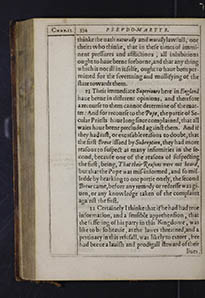 Chap. 11.
334
PSEVDO-MARTYR.
Chap. 11.
334
PSEVDO-MARTYR.
thinke the oath naturally and morally lawfull, nor
theirs who thinke, that in these times of immi-
nent pressures and afflictions, all inhibitions
ought to haue beene forborne, and that any thing
which is not ill in it selfe, ought to haue been per-
mitted for the sweetning and mollifying of the
state towards them. 21 Their immediate Superiours here in England
haue beene in different opinions, and therefore
a recourse to them cannot determine of the mat-
ter: And for recourse to the Pope, the partie of Se-
cular Priests haue long since complained, that all
waies haue beene precluded against them. And if
they had iust, or excusable reasons to doubt, that
the first Breue issued by Subreption, they had more
reasons to suspect as many infirmities in the se-
cond, because one of the reasons of suspecting
the first, being, That their Reasons were not heard,
but that the Pope was mis-informed, and so mis-
ledde by hearking to one partie onely, the second
Breue came, before any remedy or redresse was gi-
uen, or any knowledge taken of the complaint
against the first. 22 Certainely I thinke that if he had had true
information, and a sensible apprehension, that
the suffering of his party in this Kingdome, was
like to be so heauie, as the lawes threatned, and a
pertinacy in this refusall, was likely to extort, hee
had beene a lauish and prodigall steward of their lives, 335
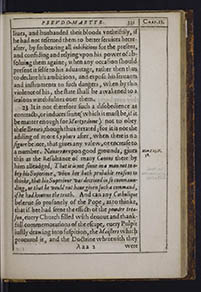 PSEVDO-MARTYR.
335
Chap. 11.
PSEVDO-MARTYR.
335
Chap. 11.
liues, and husbanded their bloods vnthriftily, if
he had not reserued them to better seruices heere-
after, by forbearing all inhibitions for the present,
and confiding and relying vpon his power of ab-
soluing them againe; when any occasion should
present it selfe to his aduantage, rather then thus
to declare his ambitions, and expose his seruants
and instruments to such dangers, when by this
violence of his, the state shall be awakened to a
iealous watchfulnes ouer them. 23 It is not therefore such a disobedience as
contracts, or induces sinne (which it must be, if it
be matter enough for Martyrdome) not to obey
these Breues, though thus iterated; for it is not the
adding of more Cyphars after, when there is no
figure before, that giues any valew, or encrease to
a number. Man. C. 23. N.
38. Nauarrus vpon good grounds, giues
this as the Resultance of many Canons there by
him alleadge, That it is not sinne in a man not to o-
bey his Superiour, when hee hath probable reasons to
thinke, that his Superiour was deceiued in so commaun-
ding, or that he would not haue giuen such a command,
if he had knowne the truth. And can any Catholique
beleeue so profanely of the Pope, as to thinke,
that if hee had seene the effects of the powder trea-
son, euery Church filled with deuout and thank-
full commemorations of the escape, euery Pulpit
iustly drawing into suspition, the Maisters which
procured it, and the Doctrine wherewith they Aaa2 were 336
 Chap. 11.
336
PSEVDO-MARTYR.
Chap. 11.
336
PSEVDO-MARTYR.
were imbued, euery vulgar mouth extended with
execrations of the fact, and imprecations vppon
such as had like intentions, euery member of the
Parliament studying, what clauses might be inser-
ted for the Kings security, into new lawes, and
the King himselfe to haue so much moderated
this common iust distemper, by taking out all
the bitternesse and sting of the law, and conten-
ting himselfe, with an oath or such obedience as
they were borne vnder, which if they should re-
fuse, there could be no hope of farther easinesse,
or of such as his Maiestie had euer shewed to
them before, Might any Catholique, I say, beleeue,
that the Pope if he had seene this, would haue ac-
celerated these afflictions vpon them, by forbid-
ding an Act, which was no more but an attesta-
tion of a morall truth, that is, ciuill obedience,
and a profession, that no man had power to ab-
solue them, Citat. Theod.
Niem. Nem. vnio.
Tract. 4. Ca. 9. against that which they iustly auer-
red to be such a Morall & indelible truth? Might
he not reasonably and iustly haue applied to the
Pope, that which Anselmus is said to haue pronoū-
ced of God himselfe, Minimum inconueniens est Deo
impossible, and concluded thereupon, that it was
impossible for the Pope to be Author of so great
inconueniences? 24 And if the Popes Breues were not natural-
ly conditioned so, that in cases of enormous detri-
ment and inconuenience, to the cause and persons, the 337
 PSEVDO-MARTYR.
337
Chap. 11.
PSEVDO-MARTYR.
337
Chap. 11.
the rigour thereof might be remitted, since in such
occurrences, the reason of those Breues doth eui-
dently cease, which is euer, vnderstood to be the
aduancement of the Romane Church; And if
in all cases, all Breues must haue their full executi-
on vnder the paines and penalties inflicted there-
in, the Catholiques of England are in worse conditi-
on by some former Breues of the Popes, then the
offending and violating these two later, can draw
them into. For (to omit many of like, and worse
danger) That generall Rescript of Clement the se-
uenth, which I mentioned before, pronounces,
That not onely by the Bulla Cænæ, all such are excom-
municated though they be Princes, as hinder the execu-
tion of the Apostolique letters, or such as giue such hin-
derers any Counsaile, helpe, or fauours directly, or in-
directly, publiquely, or secretly, or by any colour or pre-
tence, (which words will reach to all those, who
haue refused, or doubted and disputed these
Breues) but also that the Kingdomes and places, where
those offenders are remaining, are interdicted; And
then in the rigour of this Breue, how can the
Priests exercise their functions heere in England,
if the Bulla Cænæ, and a locall interdict oppresse
it. 25 And by such seruile obedience to Breues, as
this is all such Catholickes as haue relieu'd & suc-
cor'd themselues, with that weake distinction of
the Court of Rome, and the Church of Rome, shall Aaa3 loose 338
 Chap. 11.
338
PSEVDO-MARTYR.
Chap. 11.
338
PSEVDO-MARTYR.
loose and forfeit all the aduantage which that
affoorded them; For, when they shall bee pressed
with numbers of Veniall Indulgences, and of am-
bitious Buls, and vsurpations vpon the right of o-
ther Princes, they shall not bee able to finde this
ease, to dischardge all vpon the Court of Rome, if
the Church of Rome make it matter of Faith to obey
the Rescripts of the Court of Rome, which produce
these enormities. For since the Pope is the Church,
how can you diuide the Church from the Court?
Since, either as the Court is Aula or Curia, the Pope
is the Prince, and as it is Forum, he is the Iudge, and
the Ordinarie. And since all those Buls, which
are loaded with censures, or with Indulgences
proceede from him as he is the Church, (for those
powers are onely in the Church) how can you im-
pute to his act any errour of the Court? 26 It was whilst Nero continued within the
limits of a good and a iust Prince, that Tacitus said
of him, Annal. 13. Discreta fuit domus a Repub. but when hee
stray'd into Tyrannie, it was not so. Nor is the
Court of Rome, any longer distinguished from the
Church of Rome, if the Church iustifie the errours of
the Court, and pronounce, that hee which obeyes
not that Court, is not in that Church, as it doeth in
Excommunicating all them, which obey not the
Rescripts and Breues of Popes. Append. ad lib.
de Pont. 27 So that when Bellarmine vndertooke
to aunswere all, which had beene obiected out of 339
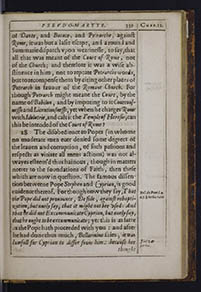 PSEVDO-MARTYR.
339
Chap. 11.
PSEVDO-MARTYR.
339
Chap. 11.
of Dante, and Bocace, and Petrarche, against
Rome, it was but a lasie escape, and around and
Summarie dispatch vpon wearinesse, to say, that
all that was meant of the Court of Rome, not
of the Church; and therefore it was a wise ab-
stinence in him, not to repeate Petrarchs words,
but to recompense them by citing other places of
Petrarch in fauour of the Romane Church. For
though Petrarch might meane the Court, by the
name of Babilon, and by imputing to it Couetous-
nesse and Licentiousnesse, yet when he charges Rome
with Idolatrie, and cals it the Temple of Heresie, can
this be intended of the Court of Rome? 28 The disobedience to Popes (in whome
no moderate men euer denied some degrees of
the leauen and corruption, of such passions and
respects as vitiate all mens actions) was not al-
wayes esteem'd thus hainous, though in matters
neerer to the foundations of Faith, then these
which are now in question. The famous dissen-
tion betweene Pope Stephen and Cyprian, is good
euidence thereof. For though now they say, Bell. de Pont. l. 4.
c. 7. § tertia ratio That
the Pope did not pronounce, De fide, against rebapti-
zation, but onely say, that it might not bee vsed: And
that he did not Excommunicate Cyprian, but onely say,
that he ought to be excommunicate; yet this is as farre
as the Pope hath proceeded with you: and after
he had done thus much, Bellarmine saies, it was
lawfull for Cyprian to differ from him: Jvid § &
per hos. because hee thought 340
 Chap. 11.
340
PSEVDO-MARTYR.
Chap. 11.
340
PSEVDO-MARTYR.
thought that the Pope was in a pernitious errour. And
though Cyprian is neuer found to haue retracted
either his Doctrine of rebaptization, or his behaui-
our to the Pope, yet the seuerest Idolaters of that
Sea, haue neuer denied him a roome amongst
the blessed Saints of the purest times. 29 And though they are for their aduantage
content to say now, To. 10 Anno
878. N. 41. that Cyprian was neuer excom-
municated, yet it is not denied by Baronius, but that
Ignatius the Patriarch of Constantinople was, and
that he died excommunicate; and resisted to the
end of his life, the Popes Rescripts, by which hee
was commaunded to leaue all the Countrie of
Bulgaria to the iurisdiction of the Church of
Rome. But this (saies Baronius) he did not out of any
displeasure to the Pope, but to defend the iurisdiction
of his Church, as he was bound by oath, vnder the dan-
ger of damnation: for his purpose was not to take away
anothers right but to keepe his owne. 30 And was not this your case, before the
Breues came? Is not ciuill obedience either really
or by intention and implication sworne by euery
subiect to the King in his birth, and after? and do
you not by this last oath defend, not onely the
Kings right, as you are bound, vnder danger of
damnation, but your owne libertie who other-
wise must bee vnder the obedience of two Ma-
sters? and haue these two Breues made your case
to differ so much from his, that that which was law- 341
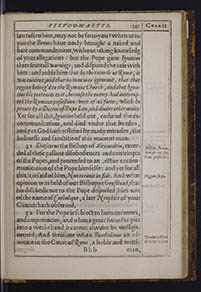 PSEVDO-MARTYR.
341
Chap. 11.
PSEVDO-MARTYR.
341
Chap. 11.
lawfull to him, may not be so to you? when as to
you the Breues haue onely brought a naked and
bare commandement, without taking knowledg
of your allegations: but the Pope gaue Ignatius
three seuerall warnings; and disputed the case with
him: and tolde him that by the records at Rome, it
was euident, and that no man was ignorant, that that
region belong'd to the Romane Church, and that Igna-
tius his pretences to it, because the enemy had interrup-
ted the Romane possession were of no force; which he
proues by a Decree of Pope Leo, and diuers other waies:
Yet for all this, Ignatius held out, endured the ex-
communication, and died vnder that burden,
and yet God hath testified by many miracles, the
holinesse and sanctitie of this reuerent man. 31 Dioscorus the Bishop of Alexandria, Dist. 22. In tan-
tum. & 24. q. 2.
Sane profertur. excee-
ded al these passiue disobediences and contempts
of the Popes, and proceeded to an Actiue excom-
munication of the Pope himselfe: and yet for all
this, it is said of him, Higgons. fo. 32. Non errauit in fide. And what
opinion was held of our Bishoppe Grosthead, that
his disobedience to the Pope despoiled him not
of the name of Catholique, a late Neophite of your
Church hath obserued. 32 For the Pope is subiect to humane errors,
and impotencies; and when a great sword is put
into a weake hand, it cannot alwaies be well go-
uerned; And therefore when Bartholinus an ad-
uocate in the Court of Rome, Theodor. a Niem
de Scrip. l. 1. c. 42 a bolde and wittie Bbb man, 342
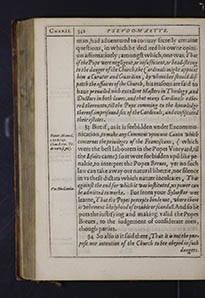 Chap. 11.
342
PSEVDO-MARTYR.
Chap. 11.
342
PSEVDO-MARTYR.
man, had aduentured to conuay secretly certaine
questions, in which he declared his owne opini-
on affirmatiuely; amongst which, one was, That
if the Pope were negligent, or insufficient, or head-strong
to the danger of the Church, the Cardinals might appoint
him a Curator and Guardian, by whom hee should dis-
patch the affaires of the Church, his reasons are said to
haue preuailed with excellent Masters in Theology, and
Doctors in both lawes, and that many Cardinals adhe-
red thereunto, till the Pope comming to the knowledge
thereof, imprisoned six of the Cardinals, and confiscated
their estates. 33 But if, as it is forbidden vnder Excommu-
nication, to make any Comment vpon one Canon which
concernes the priuileges of the Franciscans, Nauar. Manual.
c. 27. n. 147.
Clem. Exiui. Tit.
de verb. signif. (which
were the best labourers in the Popes Vineyard, til
the Iesuits came) so it were forbidden vpoō like pe-
naltie, to interpret the Popes Breues, yet no such law
can take away our natural libertie, nor silence
in vs these dictats which nature inculcates, That
against the end for which it was instituted, no power can
be admitted to worke. Ver. Obedientia. For from your Syluester wee
learne, That the Popes precepts binde not, where there
is vehement likelyhood of trouble or scandall. And so he
puts the iustifying and making valid the Popes
Breues, to the iudgement of considerate men,
though parties. 34 So also is it said there, That it is not the pur-
pose nor intention of the Church to bee obeyed in such dangers. 343
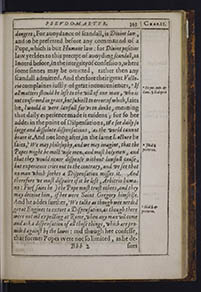 PSEVDO-MARTYR.
343
Chap. 11.
PSEVDO-MARTYR.
343
Chap. 11.
dangers; For auoydance of scandall, is Diuine law,
and to be preferred before any commaund of a
Pope, which is but Humane law: for Diuine positiue
law yeeldes to this precept of auoyding scandall, as
I noted before, in the integrity of confession, where
some sinnes may be omitted, rather then any
scandall admitted. And therfore their great Victo-
ria complaines iustly of great inconueniences, a a De pot. pay. &
Conc. § Sed quia If
all matters should be left to the will of one man, who is
not confirmed in grace, but subiect to error: or which, saies
he, I would it were lawfull for vs to doubt, meaning
that daily experience made it euident; for so hee
addes in the point of Dispensations, We see daily so
large and dissolute dispensations, as the world cannot
beare it. And not long after, in the same Lecture he
saies, bb Ibid. §
preterea. We may philosophy, and we may imagine, that the
Popes might be most wise men, and most holymen, and
that they would neuer dispense without lawfull cause,
but experience cries out to the contrary, and we see that
no man which seekes a Dispensation misses it. And
therefore we must dispaire if it be left, Arbitrio huma-
no: For (saies he) the Pope must trust others, and they
may deceiue him, if hee were Saint Gregory himselfe.
And he addes further, cc Ibid. § &
preterea. We talke as though wee needed
great Engines to extort a Dispensation, as though there
were not me expecting at Rome, when any man wil come
and ask a dispensation of all those things, which are pro-
uided against by the lawes: and though hee confesse,
that former Popes were not so limited, as he de-
Bbb2 sires 344
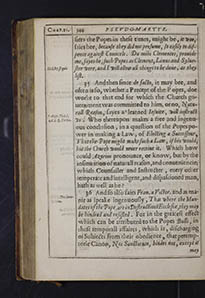 Chap. 11.
344
PSEVDO-MARTYR.
siers the Popes in these times, might be, it was,
Chap. 11.
344
PSEVDO-MARTYR.
siers the Popes in these times, might be, it was,
saies hee, because they did not presume, so easily to dis-
pence against Councels. Da mihi Clementes, prouide
me, sayes he, such Popes as Clement, Linus and Sylue-
ster were, Ibid. 87. si quis and I will allow all things to be done, as they
list. 35 And then since de facto, it may bee, and
often is so, whether a Precept of the Popes, doe
worke to that end for which the Church go-
uernment was committed to him, or no, Natu-
rall Reason, sayes a ee Azor. To. 2. l.
4. C. 5. §. Tertio. learned Iesuite, will instruct
vs. Who thereupon makes a free and ingenu-
ous conclusion, in a question of the Popes po-
wer in making a Law, of Electing a Successour,
That the Pope might make such a Law, if hee would,
but the Church would neuer receiue it. Which how
could Azorius pronounce, or know, but by the
insinuation of naturall reason, and conueniencie;
which Counsailer and Instructer, euery other
temperate and intelligent, and dispassioned man,
hath as well as he? Ibid. §. Decima-
ma. 36 And so also saies Fran. a Victor. and as ma-
nie as speake ingenuously, That where the Man-
dates of the Pope, are in Destructione Ecclesiæ, they may
be hindred and resisted. For in the greatest effect
which can be attributed to the Popes Bulls, in
these temporall affaires, which is, discharging
of Subiects from their obedience, that peremp-
torie Canon, Nos Sanctorum, bindes not, except it may 345
 PSEVDO-MARTYR.
345
Chap. 11.
PSEVDO-MARTYR.
345
Chap. 11.
may bee done without grieuous damage to the Subiect,
D'Auila de cen-
suris. par. 2. C. 6.
disp. 11. Dub. 9. and though by the vertue of that Canon, they
may forbeare their obedience if they will, yet
they are not bound thereby to doe it. Yea, it were vn-
lawfull, to denie that obedience, in cases of scan-
dall or tumult. Alf. Castr. de po-
test. leg. l. 1. C. 5.
Docum. For so also, sayes another of your
great men, It is often expedient to obey euen an vniust
law, to auoid scandall. a And the late vn-entangler
of perplexities, a Comitolus.
Resp. Moral.
li. 1. Q. 47. Comitolus the Iesuite, who vnder-
takes to cleare so many cases, which Nauarrus and
many others left in suspence, when he comes to
handle the question, whether a Professor of the Ro-
mane faith, being sent into those parts where the Greeke
Church obserues other rites, may goe to their seruice;
in such cases as he allowes it, he builds vpon this
Reason, That by the law of God, and of Nature, it is
lawfull, and the Precepts of the Church, (which for-
bid this) doe not binde Christians, in cases of great
detriment to the life, or soule, or honor, or fame, or out-
ward things. 37 Since therefore a ciuill constitution, which in
power of binding, and all validities, except im-
mutablenesse, is by your owne Authors equall to
Diuine, had possessed your conscience, and so re-
freshed by a new solicitation your naturall & na-
tiue Alleageances, so that no Breue could create in
you a new conscience, in this case, no more then
if it had forbidden Obedience to the common
law, or any other statute, because it belongs not Bbb3 to 346
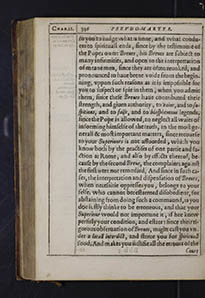 Chap. 11.
346
PSEVDO-MARTYR.
Chap. 11.
346
PSEVDO-MARTYR.
to you to iudge what is sinne, and what condu-
ces to spirituall ends, since by the testimonie of
the Popes owne Breues, his Breues are subiect to
many infirmities, and open to the interpretation
of meane men, since they are often reuoked, and
pronounced to haue beene voide from the begin-
ning, vppon such reasons as it is impossible for
you to suspect or spie in them, when you admit
them, since these Breues haue contributed their
strength, and giuen authority, to vaine, and to su-
spitious, and to false, and to blasphemous legends,
since the Pope is allowed, to neglect all waies of
informing himselfe of the truth, in the most ge-
nerall & most important matters, since recourse
to your Superiours is not affoorded, which you
know both by the practises of one partie and fa-
ction at Rome, and also by effects thereof, be-
cause by the second Breue, the complaints against
the first were not remedied, And since in such ca-
ses, the interpretation and dispensation of Breues,
when necessitie oppresses you, belongs to your
selfe, who cannot bee esteemed disobedient, for
abstaining from doing such a commaund, as you
doe iustly thinke to be erroneous, and that your
Superiour would not importune it, if hee knew
perfitly your condition, and estate: since their ri-
gorous obseruation of Breues, might cast you vn-
der a locall interdict, and sterue you for spirituall
food, And makes you iustifie all the errours of the Court 347
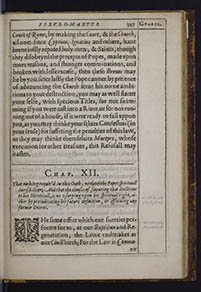 PSEVDO-MARTYR.
347
Chap. 12.
PSEVDO-MARTYR.
347
Chap. 12.
Court of Rome, by making the Court, & the Church,
all one: since Cyprian, Ignatius and others, haue
beene iustly reputed holy men, & Saints, though
they disobeyed the precepts of Popes, made vpon
more reasons, and stronger comminations, and
broken with lesse excuse, then these Breues may
be by you: since lastly the Pope cannot by pretence
of aduauncing the Church serue his owne ambi-
tions to your destruction, you may as well flatter
your selfe, with specious Titles, for not swim-
ming if you were cast into a Riuer, or for not run-
ning out of a house, if it were ready to fall vppon
you, as you may thinke your selues Confessors (in
your sense) for suffering the penalties of this law,
or they may thinke themselues Martyrs, whose
execution for other treasons, this Refusall may
hasten. Chap. XII. That nothing requir'd in this Oath, violates the Popes spirituall
Iurisdiction; And that the clauses of swearing that Doctrine
to bee Hereticall, is no vsurping vpon his spirituall right, ei-
ther by preiudicating his future definition, or offending any
former Decree.
THeThe same office which our suerties per-
forme for vs, at our Baptisme and Re-
generation, the Lawe vndertakes at
our Cinuill birth; For the Law is Commu-
nis 348
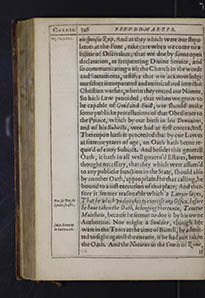 Chap. 12.
348
PSEVDO-MARTYR.
nis sponsio Reip.
Dig. Tit. 5. Le. 1.
And as they which were our stipu-
Chap. 12.
348
PSEVDO-MARTYR.
nis sponsio Reip.
Dig. Tit. 5. Le. 1.
And as they which were our stipu-lators at the Font, take care when we come to a-
bilitie of Discretion, that we doe by some open
declaration, as frequenting Diuine Seruice, and
so communicating with the Church in the worde
and Sacraments, testifye that wee acknowledge
our selues incorporated and matriculated into that
Christian warfare, wherin they entred our Names,
So hath Law prouided, that when we grow to
be capable of Good and Euill, wee should make
some publicke protestations of that Obedience to
the Prince, which by our birth in his Dominions,
and of his Subiects, wee had at first contracted.
Thereupon hath it proceeded that by our Lawes
at sixteene yeares of age, an Oath hath beene re-
quir'd of euery Subiect. And besides this generall
Oath, it hath in all well gouern'd Estates, beene
thought necessary, that they which were assum'd
to any publicke function in the State, should also
by another Oath, appropriated to that calling, be
bound to a iust execution of that place; And ther-
fore it seemes reasonable which a Lawyer sayes,
That he which vndertakes to exercise any Office,Par. de Pnut. de
Syndic. fo. 481. before
he haue taken the Oath, belonging thereunto, Tenetur
Maiestatis, because he seemes to doe it by his owne
Authoritie. Nor might a Souldier, Mar.
Donatus
in Sueto. c. 16. though hee
were in the Tents at the time of Battell, be admit-
ted to fight against the enemie, if he had not taken
the Oath. And the Notaries in the Courts of Rome, if 349
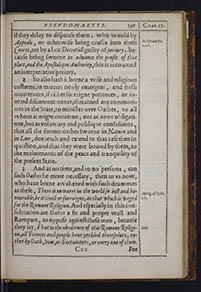 PSEVDO-MARTYR.
349
Chap. 12.
if they delay to dispatch them, who would by
PSEVDO-MARTYR.
349
Chap. 12.
if they delay to dispatch them, who would by
Appeale, In septimo Tit.
2. c. 1. or otherwise bring causes into those
Courts, are by a late Decretall guilty of periury, be-
cause being sworne to aduance the profit of that
place, and the Apostolique Authority, this is accounted
an interpretatiue periury.
2 So also hath it beene a wise and religious
custome, in matters newly emergent, and fresh
occurrences, if either forraigne pretences, or in-
ward discontentments, threatned any commoti-
ons in the State, to minister new Oathes, to all
whom it might concerne; not as newe obligati-
ons, but as voluntary and publique confessions,
that all the former oathes sworne in Nature and
in Law, doe reach and extend to that case then in
question, and that they were bound by them, to
the maintenance of the peace and tranquility of
the present State.
3 And at no time, and to no persons, can
such Oathes be more necessary, then to vs now,
who haue beene awakened with such drummes
as these, Apolog. of Iesuit,
c. 5. There is no warre in the world so iust and ho-
nourable, be it ciuill or forraigne, as that which is waged
for the Romane Religion. And especially in this con-
sideration are Oathes a fit and proper wall and
Rampart, to oppose against these men, because
they say, Ibid. That to the obedience of this Romane Religi-
on, all Princes and people haue yeelded themselues, ey-
ther by Oath, vow, or Sacraments, or euery one of them. Ccc For 350
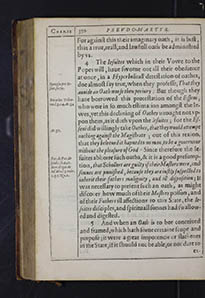 Chap. 12.
350
PSEVDO-MARTYR.
Chap. 12.
350
PSEVDO-MARTYR.
For against this their imaginary oath, it is best,
that a true, reall, and lawfull oath be administred
by vs. 4 The Iesuites which in their Vowe to the
Popes will, haue sworne out all their obedience
at once, in a Hyperbolicall detestation of oathes,
doe almost say true, Spongia pro Ie-
suit. fo. 79. when they professe, That they
auoide an Oath worse then periury: But though they
haue borrowed this protestation of the Esseni, Serarius Trihæ-
res. l. 3. c. 4. Ar. 34
who were in so much estimation amongst the Ie-
wes, yet this declining of Oathes wrought not vp-
pon them, as it doth vpon the Iesuites; for the Es-
seni did willingly take Oathes, Ar. 37. that they would attempt
nothing against the Magistrate; out of this reason,
that they beleeued it hapned to no man, to be a gouernour
without the pleasure of God. Since therefore the Ie-
suites abhorre such oaths, Par. de Put. de
syndic. fo. 990.
Hier. Gigas de
læs. Ma. l. 3. rubr.
1. q. 5. Nu. 2. & it is a good presump-
tion, that Schollers are guilty if their Masters were, and
sonnes are punished, because they are iustly suspected to
inherit their fathers malignity, and ill disposition; It
was necessary to present such an oath, as might
discouer how much of their Masters poison, and
of their Fathers ill affections to this State, the Ie-
suites disciples, and spirituall sonnes had swallow-
ed and digested. 5 And when an Oath is to bee conceiued
and framed, which hath some certaine scope and
purpose; it were a great impotencie or slackenes
in the State, if it should not be able, or not dare to ex- 351
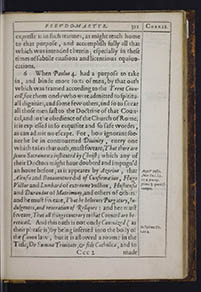 PSEVDO-MARTYR.
351
Chap. 12.
PSEVDO-MARTYR.
351
Chap. 12.
expresse it in such tearmes, as might reach home
to that purpose, and accomplish fully all that
which was intended therein; especially in these
times of subtile euasions and licentious equiuo-
cations. 6 When Paulus 4. had a purpose to take
in, and binde more sorts of men, by that oath
which was framed according to the Trent Coun-
cell, for them onely who were admitted to spiritu-
all dignities, and some few others, and so to swear
all those men fast to the Doctrine of that Coun-
cel, and to the obedience of the Church of Rome,
it is exprressed in so exquisite and so safe wordes,
as can admit no escape. For, how ignorant soe-
uer he be in controuerted Diuinity, euery one
which takes that oath, must sweare, That there are
seuen Sacraments instituted by Christ; which any of
their Doctors might haue doubted and impugn'd
an houre before; as it appeares by Azorius, that Azori{us} Instit.
Mor. To. 1. l. 2.
ca. 9 præcep.
prima § quoties-
cunque.
Alensis and Bonauenture did of Confirmation, Hugo
Victor and Lombard of extreame vnction, Hostiensis
and Durandus of Matrimony, and others of others:
and he must sweare, That he beleeues Purgatory, In-
dulgences, and veneration of Reliques: and hee must
sweare, That all things contrary to that Conuncell are he-
reticall. And this oath is not onely Canonized (as
their phrase is) by being inserted into the body of
the Canon law, In septimo Tit.
1. ca 4. but it is allowed a roome in the
Title, De Summa Trinitate, & fide Catholica, and so Ccc2 made 352
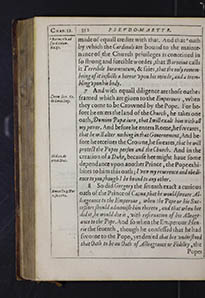 Chap. 12.
352
PSEVDO-MARTYR.
Chap. 12.
352
PSEVDO-MARTYR.
made of equall credite with that. And that a Baron. resp. ad
Card. Colum.
Nu. 31. oath
by which the Cardinals are bound to the mainten-
ance of the Church priuileges is conceiued in
so strong and forcible wordes, that Baronius calls
it Terribile Iuramentum, & saies, that the only remem-
bring of it inflicts a horror vpon his minde, and a trem-
bling vpon his body. 7 And with equall diligence are those oathes
framed which are giuen to the Emperours, Cerem sacr. Ca. de
Coron Imp. when
they come to be Crowned by the Pope. For be-
fore he enters the land of the Church, he takes one
oath, Domino Papæ iuro, that I will exalt him with all
my power. And before he enters Rome, he sweares,
that he will alter nothing in that Gouernement, And be-
fore he receiues the Crowne, he sweares, that he will
protect the Popes person and the Church. And in the
creation of a Duke, Ibid. ca. de
creat. Duc. because hee might haue some
dependance vpon another Prince, the Pope exhi-
bites to him this oath; I vow my reuerence and obedi-
ence to you, though I be bound to any other. 8 So did Gregory the seuenth exact a curious
oath of the Prince of Capua,Binius To. 3. Par.
2. fo. 1161. that he would sweare Al-
leageance to the Emperour, when the Pope or his Suc-
cessors should admonish him thereto, and that when hee
did it, he would doe it, with reseruation of his Alleage-
ance to the Pope. And so when the Emperour Hen-
rie the seuenth, though he confessed that he had
sworne to the Pope, yet denied that hee vnderstood
that Oath to be an Oath of Alleageance or Fidelity, the Popes 353
 PSEVDO-MARTYR.
353
Chap. 12.
PSEVDO-MARTYR.
353
Chap. 12.
Popes haue tooken order, not onely to insert
the oath into the body of the Canon Lawe, Clem. de Iure
iurand. but to
enact thereby, That whosoeuer tooke that Oath af-
ter, should account and esteeme it to bee an Oath of Al-
leageance. 9 With how much curiositie and vnescapa-
blenesse their formes of Abiuration vnder oath are
exhibited? They thought they had not giuen
words enow to Berengarius, De Consecrat.
Dist. 2. Ego. till they made him
sweare, That the body in the Sacrament, was sensibly
handled, broken, and ground with the teeth; which he
was bound to sweare, Per Homousion trinitatem.
And they dressed and prepard Hierome of Prage,
Sess. 19. an oath, in the Councell of Constance, by which
he must sweare, freely, voluntarily, (or else bee bur-
ned) and simplie, and without condition, To assent to
that Church, in all things, but especially in the Doctrines
of the Keyes, and Ecclesiastick immunities and reliques,
and all the ceremonies, which were the most obnoxi-
ous matters. 10 But yet this seem'd not enough; De iusta Hæreti.
Punitio. l. 1. c. 111 And there-
fore, though Castrensis say, That there is no Law, by
which he which abiures, should bee bound to abiure any
other Heresie, then that of which he was infamed, yet
hee sayes that it stands with reason, that he should ab-
iure all. And accordingly the Inquisition giue an
oath, in which, sayes hee, Nulla manet rimula ela-
bendi; For he must sweare, That he abiures all Here-
sies, and will alwayes keepe the faith of Rome; And that Ccc3 hee 354
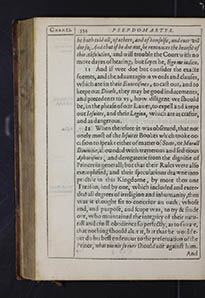 Chap. 12.
354
PSEVDO-MARTYR.
Chap. 12.
354
PSEVDO-MARTYR.
he hath told all, of others, and of himselfe, and euer will
doe so; And that if he doe not, he renounces the benefit of
this Absolution, and will trouble the Court with no
more dayes of hearing; but sayes he, Ego me iudico. 11 And if wee doe but consider the exacte
formes, and the aduantagious words and clauses,
which are in their Exorcismes, to cast out, and to
keepe out Diuels, they may be good inducements,
and precedents to vs, how diligent we should
be, in the phrase of our Lawes, to expell and keepe
out Iesuites, and their Legion, which are as craftie,
and as dangerous. 12 When therefore it was obserued, that not
onely most of the Iesuites Bookes which tooke oc-
casion to speake either of matter of State, or Morall
Diuinitie, abounded with trayterous and seditious
Aphorismes, and derogatorie from the dignitie of
Princes in generall; but that their Rules were also
exemplified, and their speculations drawne into
practise in this Kingdome, by more then one
Treason; and by one, which included and excee-
ded all degrees of irreligion and inhumanity, then
was it thought fit to conceiue an oath, whose
end, and purpose, and scope was, to try & finde
out, who maintained the integrity of their natu-
rall and ciuill obedience so perfectly, as to sweare,
that nothing should alter it, but that he would e-
uer do his best endeuour to the preseruation of the
Prince, what enemie so euer should rise against him. And 355
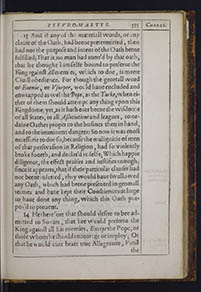 PSEVDO-MARTYR.
355
Chap. 12.
13 And if any of the materiall words, or any
PSEVDO-MARTYR.
355
Chap. 12.
13 And if any of the materiall words, or any
clause of the Oath, had beene pretermitted, then
had not the purpose and intent of the Oath beene
fulfilled; That is, no man had auerr'd by that oath,
that he thought himselfe bound to preserue the
King against All enemies, which to doe, is meere
Ciuill obedience. For though the generall word
of Enemie, or Vsurper, would haue encluded and
enwrapped as wel the Pope, as the Turke, when ei-
ther of them should attempt any thing vpon this
Kingdome; yet, as it hath euer beene the wisdome
of all States, in all Associations and leagues, to or-
daine Oathes proper to the busines then in hand,
and to the imminent dangers: So now it was most
necessarie to doe so, because the malignitie of men
of that perswasion in Religion, had so violently
broke foorth, and declar'd it-selfe; Which happie
diligence, the effect praises and iustifies enough,
since it appeares, that if these particular clauses had
not beene inserted, they would haue swallowed
any Oath, which had beene presented in generall
termes and haue kept their Consciences at large
to haue done any thing, which this Oath pur-
pos'd to preuent. 14 He therefore that should desire to bee ad-
mitted to Sweare, that hee would preserue the
King against all his enemies, Except the Pope, or
those whom he should encourage or imploy; Or
that he would euer beare true Allegeance, Vntill the 356
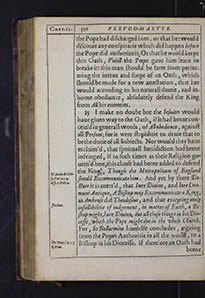 Chap. 12.
356
PSEVDO-MARTYR.
Chap. 12.
356
PSEVDO-MARTYR.
the Pope had discharged him, or that hee would
discouer any conspiracie which did happen before
the Pope did authorize it; Or that he would keepe
this Oath, Vntill the Pope gaue him leaue to
breake it: this man should be farre from perfor-
ming the intent and scope of an Oath, which
should be made for a new attestation, that hee
would according to his naturall duetie, and in-
borne obedience, absolutely defend the King
from All his enemies. 15 I make no doubt but the Iesuites would
haue giuen way to the Oath, if it had beene con-
ceiu'd in generall words, of All obedience, against
all Persons; for it were stupiditie to denie that to
be the dutie of all Subiects. Nor would they haue
exclaim'd, that spirituall Iurisdiction had beene
infringed, if in such times as their Religion go-
uern'd here, this clause had beene added to defend
the King, D'Auila de Cens-
sa. Par. 2. c. 4.
disp. 1. Dub. 4. Though the Metropolitane of England
should Excommunicate him. And yet by there Do-
ctors it is auerr'd, that Iure Diuino, and Iure Com-
muni Antiquo, A Bishop may Excommunicate a King,
as Ambrose did Theodosius, and that excepting onely
infallibilitie of iudgement, Ibidem. in matter of Faith, a Bi-
shop might, Iure Diuino, doe all those things in his Dio-
cesse, which the Pope might doe in the whole Church.
For, so Bellarmine himselfe concludes, arguing
from the Popes Authoritie in all the world, to a
Bishop in his Diocesse. D Pont. l. 5. c. 3
§ Hem. If therefore an Oath had beene 357
 PSEVDO-MARTYR.
357
Chap. 12.
PSEVDO-MARTYR.
357
Chap. 12.
beene lawfull, for defending the King against All
enemies, though a Bishop Excommunicate him,
And the Pope haue onely by positiue lawes, with-
drawne from the Bishops some of the exercise of
their iurisdiction, and reserued to himselfe the
power of excommunicating Princes, it is as law-
full to defend him after a Popes excommunicati-
on now, as it was after a Bishops, when a Bishop
might excommunicate: and no man euer said,
that a Bishop might haue deposed a King. 16 All which they quarrell at in the oath, is,
that any thing should be pronounced, or any li-
mits set, to which the Popes power might not ex-
tend: but they might as well say that his spirituall
power were limited or shortned, and so the Ca-
tholique faith impugned, if one should denie
him to haue power ouer the winde and sea; since
to tame and commaund these, in ordine ad spiritu-
alia, would aduance the conuersion of the Indies,
and impaire the Turks greatnesse, and haue fur-
thered his fatherly & spirituall care of this King-
dome in 88. 17 All the substance of the oath is virtually
comprehended in the first proposition, That king
Iames is lawfull King of all these Dominions; The rest
are but declarations, and branches naturally and
necessarily proceeding from that roote. And as
that Catholique which hath sworne, or assented,
that Paul the fift, is Pope canonically elected, hath Ddd im- 358
 Chap. 12.
358
PSEVDO-MARTYR.
Chap. 12.
358
PSEVDO-MARTYR.
implicitely confessed, that no man can deuest or
despoile him of that spirituall iurisdiction, which
God hath deposed in him, nor of those temporall estates,
which by iust title his predecessours pos-
sessed or pretended too: so that Subiect which
sweares king Iames to bee his true and lawfull
King, obliges himselfe therein to all obedience,
by which hee may still preserue him in that state;
which is to resist all which shall vpon any occasi-
on be his enemies. 18 For if a king be a king vpon this conditi-
on, that the Pope may vpon such cause as seemes
iust to him, depose him, the king is no more a So-
ueraigne, then if his people might depose him, or
if a Neighbour king might depose him: For
though it may seeme more reasonable and con-
uenient, that the Pope, who may bee presumed
more equall, and dispassioned then the people,
and more disinteressed then the neighbour Prin-
ces, should be the Iudge and Magistrate to depose
a Prince enormously transgressing the wayes, in
which his duety bounde him to walke, though,
I say, the king might hope for better Iustice at his
hand, then anothers, yet he is no Soueraigne, if any
person whatsoeuer may make him none. For it
is as much against the nature of Soueraignty, that
it may at any time be iustly taken away, as that it
shall certainly bee taken away. And therefore a
King whom the Pope may depose, is but a De-
positarie, Ccc3 359
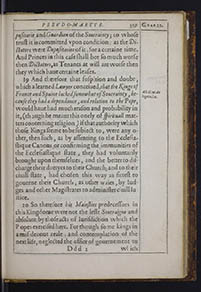 PSEVDO-MARTYR.
359
Chap. 12.
PSEVDO-MARTYR.
359
Chap. 12.
positarie and Guardian of the Souerainty; to whose
trust it is committed vpon condition: as the Di-
ctators were Depositaries of it, for a certaine time.
And Princes in this case shall bee so much worse
then Dictators, as Tenants at will are worse then
they which haue certaine leases. 19 And therefore that suspition and doubt,
which a learned Lawyer conceiued, that the Kings of
France and Spaine lacked somewhat of Souerainty, Alb. Gent. de
legatio. l. 4. be-
cause they had a dependance, and relation to the Pope,
would haue had much reason and probability in
it, (though he meant this onely of spirituall mat-
ters concerning religion) if that authority which
those Kings seeme to be subiect to, were any o-
ther, then such, as by assenting to the Ecclesia-
stique Canons, or confirming the immunities of
the Ecclesiastique state, they had voluntarily
brought upon themselues, and the better to dis-
charge their duetyes to their Church; and to their
ciuill state, had chosen this way as fittest to
gouerne their Church, as other waies, by Iud-
ges and other Magistrates to administer ciuill Iu-
stice. 20 So therefore his Maiesties predecessors in
this Kingdome were not the lesse Soueraigne and
absolute by those acts of Iurisdiction which the
Popes exercised here. For though some kings in
a mis-deuout zeale, and contemplation of the
next life, neglected the office of gouernement to Ddd2 which 360
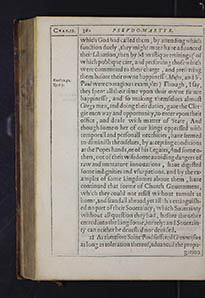 Chap. 12.
360
PSEVDO-MARTYR.
Chap. 12.
360
PSEVDO-MARTYR.
which God had called them, by attending which
function duely, they might more haue aduanced
their saluation, then by Monastique retirings (of
which publique care, and preseruing those which
were committed to their charge, and preferring
them before their owne happinesse, Moses, and St.
Paul were couragious examples) Though, Exod. 32. 32. I say,
they spent all their time vpon their owne Ro. 9.3. future
happinesse, and so making themselues almost
Clergy men, and doing their duties, gaue the Cler-
gie men way and opportunity, to enter vpon their
office, and deale with matter of State; And
though some other of our kings oppressed with
temporall and personall necessities, haue seemed
to diminish themselues, by accepting conditions
at the Popes hands, or of his Legates, And some o-
thers, out of their wisedome auoiding dangers of
raw and immature innouations, haue digested
some indignities and vsurpations, and by the ex-
amples of some kingdomes about them, haue
continued that forme of Church Gouernment,
which they could not resist without tumult at
home, and scandall abroad; yet all this extinguish-
ed no part of their Souerainty; which Souerainty
without all question they had, before the other
entred into the kingdome, intirely: and Souerain-
ty can neither be deuested nor deuided. 21 As therefore Saint Paul suffered Circumcision
as long as toleration thereof, aduanced the propa-
gation 361
 PSEVDO-MARTYR.
361
Chap. 12.
gation and growth of the Church, when a seuere
PSEVDO-MARTYR.
361
Chap. 12.
gation and growth of the Church, when a seuere
and rigid inhibition thereof would haue auerted
many tender and scrupulous consciences, which
could not so instantly passe from a commande-
ment of a necessity in taking Circumcision, to a
necessity in leauing it; But when as certaine men
came downe and taught, Act. 15. that circumcision was necess-
ary to saluation, and so ouerthrewe the whole Gos-
pell, because the necessity of both could not con-
sist together, then Circumcision was vtterly abo-
lished: So, as long as the Romane Religion, though
it were corrupted with many sicknesses, was not
in this point become so infectious and contagi-
ous, as that it would vtterly destroy and abolish
the Souerainty of Princes, the kings of England suc-
courd, relieued, and cherished it, and attended an
opportunity, when God would enable them to
medecine and recouer her; but to be so indulgent
to her now, is impossible to them, because as eue-
ry thing is iealous of his owne being, so are kings
most of any: and kings can haue no assurance
of being so, if they admit professors of that Reli-
gion, which teachee, that the Pope may at any
time Depose them. 22 We doe not therefore by this oath exempt
the King from any spirituall Iurisdiction; Neither
from often incitations to continue in all his due-
ties, by Preaching the word; nor from confirm-
ing him in grace, by the blessed Sacrament; Ddd3 Nor 362
 Chap. 12.
362
PSEVDO-MARTYR.
Chap. 12.
362
PSEVDO-MARTYR.
Nor from discreet reprehension if hee should
transgresse. We doe neither, by this oath, priui-
ledge him from the Censures of the Church, nor
denie, by this oath, that the Pope hath iustly in-
grossed and reserued to himselfe the power to in-
flict those censures vpon Princes. We pronounce
therein against no power which pretendes to
make Kings better Kings, but onely against that,
which threatens to make them no kings. 23 For if such a power as this, of deposing
and annihilating Kings, bee necessarie, and cer-
taine in the Church, and the Hierarchie thereof
be not well established, nor our saluation well
prouided for, without this power, as they teach,
why was the Primitiue Church destitute there-
of? For if you allow the answere of Bellarmine,
That the Church did not depose Kings then because it
lacked strength, De Pont. l. 5. c. 7.
§ Quod si. you returne to the beginning a-
gaine, and goe round in a circle. For the wise-
dome of our Sauiour is as much impeached, and
the frame of the Church is as lame, and impotent,
and our saluation as ill prouided for, if Christ doe
not alwayes giue strength and abilitie to extirpate
wicked kings, if that be necessarie to saluation, as
he were if he did not giue them Title and Autho-
ritie to doe it. Yea, all these defect would still
remaine in the Church, though Christ had giuen
Authoritie enough, and Strength enough, if he did
not alwayes infuse in the Pope, a Will to doe it. 24 And 363
 PSEVDO-MARTYR.
363
Chap. 12.
24 And where this power of deposing Prin-
PSEVDO-MARTYR.
363
Chap. 12.
24 And where this power of deposing Prin-ces may be lawfully exercised, as in States where
Princes are Conditionall, and not absolute and So-
ueraigne, as if at Venice the State should depose
the Duke, for attempting to alter that Religion,
and induce Greeke errours, or Turcisme, or if other
States, which might lawfully doe so, should de-
part from the obedience, and resist the force of
their Princes, which should offer to bring into
that State, the Inquisition, or any other violence to
their Conscience, if the people in these States
should depose the Prince, did they doe this by a-
ny Spirituall Authoritie, or Iurisdiction? Or were
this done by such a Temporall Authoritie, as were
indirect, or casuall, or incident, or springing out of
the spirituall authoritie, as the Popes ridler makes
his authoritie to bee? Or must they stay, to aske
and obtaine leaue of their Clergie, to depose such
a transgressor? If therefore such a particular state,
in whom the Soueraignty resides, haue a direct tem-
porall power, which enables it sufficiently to
maintaine, and conserue it selfe; such a supreme
spirituall power, as they talk of in the Pope, is not
necessarie for our saluation, nor for the perfection
of the Church gouernment. 25 Nor is there any thing more monstrous,
and vnnaturall and disproportioned, then that spi-
rituall power should conceiue or beget temporall:
or to rise downwards, as the more degrees of heigth, 364
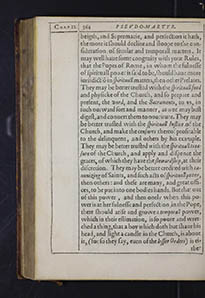 Chap. 12.
364
PSEVDO-MARTYR.
Chap. 12.
364
PSEVDO-MARTYR.
heigth, and Supremacie, and perfection it hath,
the more it should decline and stoope to the con-
sideration of secular and temporall matters. It
may well haue some congruity with your Rules,
that the Popes of Rome, in whom the fulnesse
of spirituall power is said to be, should haue more
iurisdictiō in spirituall matters, then other Prelates.
They may be better trusted with the spirituall food
and physicke of the Church, and so prepare and
present, the word, and the Sacraments, to vs, in
such outward sort and manner, as wee may best
digest, and conuert them to nouriture. They may
be better trusted with the spirituall Iustice of the
Church, and make the censures thereof profitable
to the delinquent, and others by his example.
They may be better trusted with the spirituall trea-
sure of the Church, and apply and dispence the
graces, of which they haue the stewardship, at their
discretion. They may be better credited with ca-
nonizing of Saints, and such acts of spirituall power,
then others: and these are many, and great offi-
ces, to be put into one bodies hands. But that out
of this power, and then onely when this po-
wer is at her fulnesse and perfection in the Pope,
there should arise and growe a temporall power,
which in their estimation, is so poore and wret-
ched a thing, that a boy which doth but shaue his
head, and light a candle in the Church, is aboue
it, (for so they say, euen of the lesser Orders) is ei-
ther 365
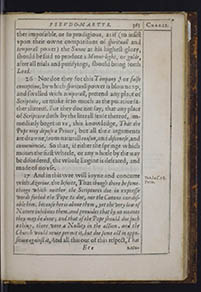 PSEVDO-MARTYR.
365
Chap. 12.
ther impossible, or so prodigious, as if (to insist
PSEVDO-MARTYR.
365
Chap. 12.
ther impossible, or so prodigious, as if (to insist
vpon their owne comparisons of spirituall and
temporall power) the Sunne at his highest glory,
should be said to produce a Moone-light, or golde,
after all trials and purifyings, should bring forth
Lead. 26 Nor doe they for this Timpany, or false
conception, by which spirituall power is blowne vp,
and swelled with temporall, pretend any place of
Scripture, or make it so much as the putatiue fa-
ther thereof. For they doe not say, that any place
of Scripture doth by the literall sense thereof, im-
mediatly beget in vs, this knowledge, That the
Pope may depose a Prince; but all their arguments
are drawne, from naturall reason, and discourse, and
conueniencie. So that, if either the springe which
moues the first wheele, or any wheele by the way
be disordered, the whole Engine is defeated, and
made of no vse. 27 And in this wee will ioyne and concurre
with Azorius, the Iesuite, To. 2. l. 4. C. 5. §.
Tertio. That though there be some-
things which neither the Scriptures doe in expresse
words forbid the Pope to doe, nor the Canons can dis-
able him, because hee is aboue them, yet the very law of
Nature inhibites them, and prouides that by no meanes
they may be done; and that if the Pope should doe such
a thing, there were a Nullity in the action, and the
Church would neuer permit it, but doe some act in oppo-
sition against it, And all this out of this respect, That Eee natu= 366
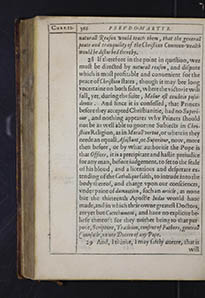 Chap. 12.
366
PSEVDO-MARTYR.
Chap. 12.
366
PSEVDO-MARTYR.
naturall Reason would teach them, that the generall
peace and tranquility of the Christian Common-wealth
would be disturbed thereby. 28 If therefore in the point in question, wee
must be directed by naturall reason, and dispute
which is most profitable and conuenient for the
peace of Christian states, though it may bee long
vncertaine on both sides, where the victorie will
fall, yet, during the suite, Melior est conditio possi-
dentis. And since it is confessed, that Princes
before they accepted Christianitie, had no Superi-
our, and nothing appeares why Princes should
not be as well able to gouerne Subiects in Chri-
stian Religion, as in Morall vertue, or wherein they
neede an equall Assistant, or Superiour, now, more
then before, or by what authoritie the Pope is
that Officer, it is a precipitate and hastie preiudice
for any man, before iudgement, to set to the seale
of his bloud, and a licentious and desperate ex-
tending of the Catholique faith, to intrude into the
body thereof, and charge vpon our consciences,
vnder paine of damnation, such an article, as none
but the thirteenth Apostle Iudas would haue
made, and in which their owne greatest Doctors,
are yet but Catechumeni, and haue no explicite be-
liefe thereof: for they neither bring to that pur-
pose, Scripture, Tradition, consent of Fathers, generall
Counsaile, no nor Decree of any Pope. 29 And, I thinke, I may safely auerre, that it will 367
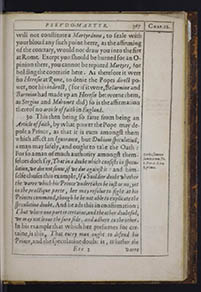 PSEVDO-MARTYR.
367
Chap. 12.
PSEVDO-MARTYR.
367
Chap. 12.
will not constitute a Martyrdome, to seale with
your bloud any such point heere, as the affirming
of the contrary, would not draw you into the fire
at Rome. Except you should be burned for an O-
pinion there, you cannot be reputed Martyrs, for
holding the contrarie here. As therefore it were
no Heresie at Rome, to denie the Popes direct po-
wer, nor his indirect, (for if it were, Bellarmine and
Baronius had made vp an Heresie betweene them,
as Sergius and Mahomet did) so is the affirmation
thereof no article of faith in England. 30 This then being so farre from being an
Article of faith, by what power the Pope may de-
pose a Prince, as that it is euen amongst them
which affect an Ignorance, but Dubium speculatiuū,
a man may safely, and ought to take the Oath:
For so a man of much authority amongst them-
selues doth say, Carbo. summa
summarum. To.
1. Par. 1. C. 14.
§. prima. That in a doubt which consists in specu-
lation, we doe not sinne, if we doe against it: and him-
selfe chuses this example, If a Souldier doubt whether
the warre which his Prince vndertakes be iust or no, yet
in the practique parte, hee may resolue to fight at his
Princes command, though he be not able to explicate the
speculatiue doubt. And he ads this in confirmation;
That where one part is certaine, and the other doubtful,
we may not leaue the sure side, and adhere to the other.
In his example that which hee presumes for cer-
taine, is this, That euery man ought to defend his
Prince, and the speculatiue doubt is, Whether the Eee2 warre 368
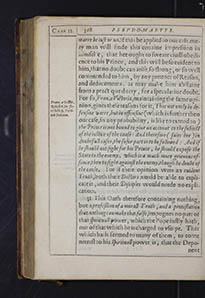 Chap. 12.
368
PSEVDO-MARTYR.
Chap. 12.
368
PSEVDO-MARTYR.
warre be iust or no. If this be applied to our case, eue-
ry man will finde this certaine impression in
himselfe, that hee ought to sweare ciuill obedi-
ence to his Prince, and this will be so euident to
him, that no doubt can arise, so strong, or so well
commended to him, by any pretence of Reason,
and deducements, as may make him abstaine
from a practique duety, for a speculatiue doubt.
For so, Fran. a Victoria, maintaining the same opi-
nion, giues the e reasons or it, Franc. a Victor.
Relect. 6. De Iu-
re belli. §. Terti-
um Dubium. That not onely in de-
fensiue warre, but in offensiue (which is further then
our case, in any probability, is like to extend to)
the Prince is not bound to giue an account to the subiect
of the iustice of the cause: And therefore (saies hee) in
doubtfull cases, the safer part is to be followed: And if
he should not fight for his Prince, he should expose the
State to the enemy, which is a much more grieuous of-
fence, then to fight against the enemy, though he doubt of
the cause. For if their opinion were an euident
Truth, both their Doctors would be able to expli-
cate it, and their Disciples would neede no expli-
cation. 31 This Oath therefore containing nothing,
but a profession of a morall Truth, and a protestation
that nothing can make that false, impugnes no part of
that spirituall power, which the Pope iustly hath,
not of that which he is charged to vsurpe. That
which hath seemed to many of them, to come
neerest to his spirituall power is, that the Depo-
nent 369
 PSEVDO-MARTYR.
369
Chap. 12.
nent doth sweare, That the Pope hath no power to ab-
PSEVDO-MARTYR.
369
Chap. 12.
nent doth sweare, That the Pope hath no power to ab-solue him of this Oath. But besides, that it hath
beene strongly and vncontroulably prooued al-
ready by diuers, that no absolution of the Popes
can worke vpon the matter of this Oath, because
it is a morall Truth, I doe not perceiue, that to ab-
solue a man from an Oath, belongs to spirituall Iurisdi-
ction. 32 For Dispensations against a law, and abs-
olutions from Oathes and Vowes worke onely
as Declarations, not as Introductions. And that po-
wer which giues me a priuiledge, with a Non ob-
stante vpon a law, or an absolution from an oath,
doth not enable mee to breake that lawe, or that
Oath, but onely declares, That that law and Oath,
shall not extend to me in that case, and that if this par-
ticular case could haue beene foreseene, at the ma-
king of the law, or the Oath, neither the Oath, nor
the law ought to haue beene so generall. 33 So therefore these Absolutions, are but in-
terpretations, and it belongs to him who made the
law, to interpret it. For without any vse of spiritu-
all Iurisdiction, the Emperour Henry the seuenth,
absolued all the Subiects of Robert king of Sicily
of their oathes of Alleageance, when he rebelled
against the Empire, of which hee was a feudatarie
Prince. Clem. de Sen. et
re. iud. Pasto-
ralis. And though the Pope annulled this sen-
tence, it was not because the Emperour might not
doe this, but because the king of Sicily held also of Eee3 the 370
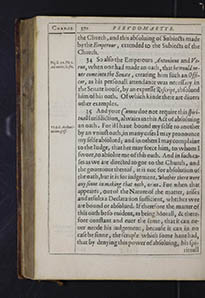 Chap. 12.
370
PSEVDO-MARTYR.
Chap. 12.
370
PSEVDO-MARTYR.
the Church, and this absoluing of Subiects made
by the Emperour, extended to the Subiects of the
Church. 34 So also the Emperours Antoninus and Ve-
rus, when one had made an oath, Dig. li. 50. Tit. 1.
Ad munic. le. fin. that he would ne-
uer come into the Senate, creating him such an Offi-
cer, as his personall attendance was necessary in
the Senate house, by an expresse Rescript, absolued
him of his oath. Of which kinde there are diuers
other examples. 35 And your Canons doe not require this spiri-
tuall Iurisdiction, alwaies in this Act of absoluing
an oath. 15. q. 6. Authori-
tatem. gloss. For if I haue bound my selfe to another
by an vniust oath, in many cases I may pronounce
my selfe absolued; and in others I may complaine
to the Iudge, that hee may force him, to whom I
swore, to absolue me of this oath. And in such ca-
ses as we are directed to goe to the Church, and
the gouernour thereof, it is not for absolution
of the oath, but it is for iudgement, whether there were
any sinne in making that oath, or no. For when that
appeares, out of the Nature of the matter, arises
and results a Declaration sufficient, whether wee
are bound or absolued. If therefore the matter of
this oath be so euident, as being Morall, & there-
fore constant and euer the same, that it can ne-
uer neede his iudgement, because it can in no
case be sinne, the scruple which some haue had,
that by denying this power of absoluing, his spi-
rituall 371
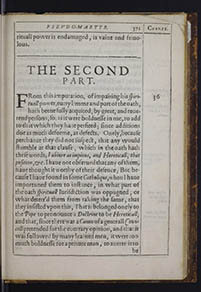 PSEVDO-MARTYR.
371
Chap. 12.
rituall power is endamaged, is vaine and friuo-
PSEVDO-MARTYR.
371
Chap. 12.
rituall power is endamaged, is vaine and friuo-lous. THE SECOND
PART. FRomFrom this imputation, of impairing his spiri-
tuall 36 power, euery limme and part of the oath,
hath beene fully acquited, by great, and reue-
trend persons, so, as it were boldnesse in me, to add
to that which they haue perfited; since additions
doe as much deforme, as defects. Onely, because
perchance they did not suspect, that any would
stumble at that clause, which in the oath hath
these words, I abiure as impious, and Hereticall, that
position, &c., I haue not obserued that any of them,
haue thought it worthy of their defence; But be-
cause I haue found in some Catholiqus, when I haue
importuned them to instance, in what part of
the oath spirituall Iurisdiction was oppugned, or
what deterr'd them from taking the same, that
they insisted vpon this, That it belonged onely to
the Pope to pronounce a Doctrine to be Hereticall,
and that, since there was a Canon of a generall Coun-
cell pretended for the contrary opinion, and that it
was followed by many learned men, it were too
much boldnesse for a priuate man, to auerre it to be 372
 Chap. 12.
372
PSEVDO-MARTYR.
Chap. 12.
372
PSEVDO-MARTYR.
be Hereticall, I am willing to deliuer them of that
scruple. 37 It is no strange nor insolent thing with
their Authors, to lay the Note of Heresie vpon Ar-
ticles, which can neither be condemned out of the
word of God, nor are repugnant to any Article of
faith; for Castrensis, that he might thereby make
roome for traditions, Aduer. Hære. l. 1.
C 5. in princ. liberally confesses, That there
are many Doctrines of the Heretiques, which cannot be
refelled by the testimonie of the Scriptures. De liber Eccles.
l. 2. C 9. §. Se-
cundus. And the Ie-
suite Tannerus is not squeamish in this, when hee
allowes thus much, That in the communion vnder
one kinde, and in fasts, and in feasts, and in other De-
crees of Popes, there is nothing established properly con-
cerning faith. So that with you, a man may be sub-
iect to the penalties, & so to the infamie, & so to the
damnation belonging to an Heretique, though hee
hold nothing against the Christian faith. 38 But wee lay not the Name of Heresie (in
that bitter sense which the Canons accept it) vp-
pon any opinion which is not against the Ca-
tholique faith. Ad Leo. Aug.
Epist. 97. in
princi. Which faith wee beleeue Leo to
haue described well, when hee saies, That it is sin-
gular, and true, to which nothing can be added, nor de-
tracted: and we accept S. Augustines signification of
the word Catholique; Epist. 48. Cont.
Rogat. et Donat. wee interpret the name Catho-
lique, by the Communion with the whole world; which
is so Essentiall & so truly deduced out of the Scriptures,
that a man which will speake of another Church, then the 373
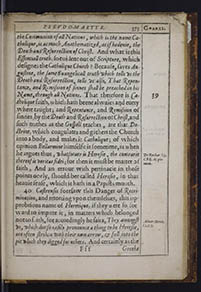 PSEVDO-MARTYR.
373
Chap. 12.
PSEVDO-MARTYR.
373
Chap. 12.
the Communion of all Nations, which is the name Ca-
tholique, is as much Anathematized, as if he denie, the
Death and Resurrection of Christ. And what is this
Essentiall truth so euident out of Scripture, which
designes the Catholique Church? Because, sayes Au
gustine, the same Euangelicall truth which tells vs the
Death and Resurrection, tells vs also, That Repen-
tance, and Remission of sinnes shall be preached in his
Name, through all Nations. That therefore is Ca-
tholique 39 faith, which hath beene alwaies and euery
where taught; and Repentance, and Remission of
sinnes, by the Death and Resurrection of Christ, and
such truthes as the Gospell teaches, are that Do-
ctrine, which coagulates and gathers the Church
into a body, and makes it Catholique; of which
opinion Bellarmine himselfe is sometime, as when
he argues thus, De Euchar: l. 3.
C. 8. §. Ac pri-
mum. whatsoeuer is Heresie, the contrarie
thereof is veritas fidei; for then it must be matter of
faith, And an errour with pertinacie in those
points onely, should bee called Heresie, in that
heauie sense, which it hath in a Papists mouth. 40 Castrensis foresaw this Danger of Recri-
mination, and retorting vpon themselues, this op
probrious name of Heretique, if they were so for
ward to impute it, in matters which belonged
not to faith, Aduer. Heres.
l. 1. C. 7. for accordingly he saies, They amongst
vs, which doe so easily pronounce a thing to be Heresie,
are often striken with their own arrow, & fall into the
pit which they digged for others. And certainly as the Fff Greeke 374
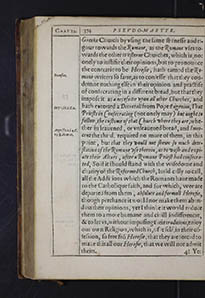 Chap. 12.
374
PSEVDO-MARTYR.
Chap. 12.
374
PSEVDO-MARTYR.
Greeke Church by vsing the same stiffnesse and ri-
gour towards the Romane, as the Romane vses to-
wards the other Westerne Churches, which is, not
onely to iustifie their opinions, but to pronounce
the contrarie to be Heresie, hath tamed the Ro-
mane writers so farre, Bouosius. as to confesse that they con-
demne nothing else in their opinion and practise
of consecrating in a different bread, but that they
impose it, as a necessitie vpon all other Churches, and
hath extorted a Decretall from Pope Eugenius, In 7o. tit. 1. C. 2. That
Priests in Consecrating (not onely may) but ought to
follow the custome of that Church where they are, whe-
ther in leauened, Azor. To. 2. l. 4. C.
15. §. Item eo. or vnleauened bread, and Inno-
cent the third, required no more of them, in this
point, but that they would not shewe so much dete-
station of the Romane vse therein, as to wash and expi-
ate their Altars, after a Romane Priest had consecra-
ted, So if it should stand with the wisedome and
charity of the Reformed Church, Iuridically to call,
all the Additions which the Romanes haue made
to the Catholique faith, and for which, wee are
departed from them, absolute and formall Heresie,
though perchance it would not make them aban-
don their opinions, yet I thinke it would reduce
them to a more humane and ciuill indifferencie,
& to let vs, without imposing their traditions, enioy
our own Religion, which is, of it self, in their cō-
fession, so free frō Heresie, that they are forced to
make this all our Heresie, that we will not admit
theirs. 41 Yet 375
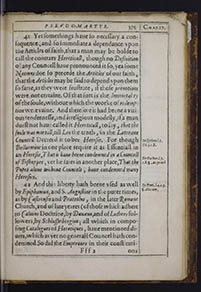 PSEVDO-MARTYR.
375
Chap. 12.
41 Yet somethingssome things haue so necessary a con-
PSEVDO-MARTYR.
375
Chap. 12.
41 Yet somethingssome things haue so necessary a con-sequence, and so immediate a dependance vpon
the Articles of faith, that a man may be bolde to
call the contrary Hereticall, though no Definition
of any Councell haue pronounced it so; yea some
Notions doe so precede the Articles of our faith,
that the Articles may be said to depend vpon them
so farre, as they were frustrate, if those prenotions
were not certaine. Of that sort is the immortality
of the soule, without which the worke of redemp-
tion were vaine. And therefore it had beene a viti-
ous tendernesse, and irreligious modesty, if a man
durst not haue called it Hereticall, to say, that the
soule was mortall, till Leo the tenth, in the Laterane
Councell Decreed it to bee Heresie. In septimo l. 5.
Tit. 3. c. 8. For though
Bellarmine in one place require it as Essentiall in
an Heresie, That it haue beene condemned in a Councell
of Bishoppes, De Euchar. l. 3.
c. 8. § Ac primū yet he saies in another place, That the
Popes alone without Councels, haue condemned many
Heresies. 42 And this liberty hath beene vsed as well
by Epiphanius, De Pont. l. 4. c. 3.
§ Alterum. and S. Augustine in the purer times,
as by Castrensis and Prateolus, in the later Romane
Church, and of late yeares (of those which adhere
to Caluins Doctrine, by Danæus, and of Luthers fol-
lowers, by Schlussetbergius; all which in compo-
sing Catalogues of Heretiques, haue mentioned di-
uers, which as yet no generall Councel hath con-
demned. So did the Emperours in their constituti-
Fff2 ons 376
 Chap. 12.
376
PSEVDO-MARTYR.
ons pronounce against some Heresies of which
Chap. 12.
376
PSEVDO-MARTYR.
ons pronounce against some Heresies of which
no Councell had determined. So did the Parlia
ment of Paris in their sentence against Chastell for
the assassinate vppon the person of this King of
France, pronounce certaine words, which he had
sucked from the Iesuits, and vttered in derogation
of Kings, to bee Seditious, Scandalous, and Here-
ticall. 42 And if the Oath framed by order of the
Councell of Trent, and ratified and enioyned by
the Popes Bull, be to be giuen to all persons, then
must many men sweare somethingssome things to be of the
Catholique faith, and some other things to be Here-
ticall, in which he is so farre remooued from the
knowledge of the things, that he doth not onely
not vnderstand the signification of the wordes,
but is not able to sound, nor vtter, nor spell
them. 43 And hee must sweare many things deter-
minately, and precisely, which euen after that
Councell some learned men still doubt, D'Aluin. de pot.
Epis. c. 23. n. 5. ox
Suares As, that a
license to heare confessions, in euery Priest not beneficed,
is so necessarie, necessitate Sacramenti, that except hee
haue such a license, the penitent, though neuer so contrite
and particular in enumeration of his sinnes, and exact in
satisfactions, and performing all penances, is vtterly
frustrate of any benefite by vertue of this Sacrament
So therefore a certaine and naturall euidence of a
morall truth, such as arises to euery man, That to a King 377
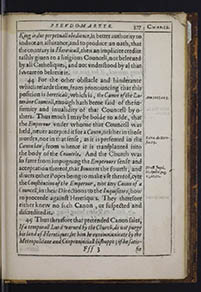 PSEVDO-MARTYR.
377
Chap. 12.
PSEVDO-MARTYR.
377
Chap. 12.
King is due perpetuall obedience, is better authority to
induce an assurance, and to produce an oath, that
the contrary is Hereticall, then an implicite credite
rashly giuen to a litigious Councell, not beleeued
by all Catholiques, and not vnderstood by al that
sweare to beleeue it. 44 For the other obstacle and hinderance
which retards them, from pronouncing that this
position is hereticall, Ann. 1215. ca. 3. which is, the Canon of the La-
terane Councell, enough hath beene said of the in-
firmity and inualidity of that Councell by o-
thers. Thus much I may be bolde to adde, that
the Emperour vnder whome that Councell was
held, neuer accepted it for a Canon, neither in those
wordes, Extra. de Here-
si. c. 13. nor in that sense, as it is presented in the
Canon law; from whence it is transplanted into
the body of the Councels. And the Church was
so farre from impugning the Emperours sense and
acceptation thereof, Direct Inqui.
lit. Apostol. pag.
13, 27, 51. that Innocent the fourth, and
diuers other Popes being to make vse thereof, cyte
the Constitution of the Emperour, not any Canon of a
Councell, in their Directions to the Inquisitors, how
to proceede against Heretiques. They therefore
either knew no such Canon, or suspected and
discredited it. 45 Thus therefore that pretended Canon saies,
If a temporall Lord warned by the Church, do not purge
his land of Heretiques, let him be excommunicate by the
Metropolitane and Conprouinciall bishopps; if he satis-
Fff3 fie 378
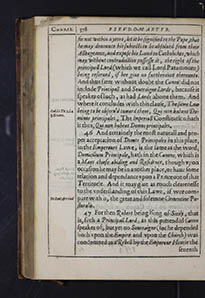 Chap. 12.
378
PSEVDO-MARTYR.
fie not within a yeere, let it be signified to the Pope, that
Chap. 12.
378
PSEVDO-MARTYR.
fie not within a yeere, let it be signified to the Pope, that
he may denounce his subiects to be absolued from their
Alleageance, and expose his Land to Catholickes, which
may without contradiction possesse it, the right of the
principall Lord (which we call Lord Paramount)
being reserued, if hee giue no furtherance thereunto.
And thus farre without doubt the Canon did not
include Principall and Soueraigne Lords, because it
speakes of such, as had Lords aboue them. And
where it concludes with this clause, The same Law
being to be obseru'd toward them, Cod. l. 1. Tit. 5. l. 4
§ Si vero. Qui non habent Do-
minos principales, The Imperiall Constitution hath
it thus, Qui non habent Domos principales. 46 And certainely the most naturall and pro-
per acceptation of Domos Principales in this place,
in the Emperours Lawe, is the same as the word,
Domicilium Principale, hath in the Canons; which is
a Mans chiefe abiding and Residence, though vpon
occasion he may be in another place, or haue some
relation and dependance vpon a Prince out of that
Territorie. And it may giue as much clearenesse
to the vnderstanding of this Lawe, if wee com-
pare with it, De Sent. & reiud the great and solemne Clementine Pa-
storalis. 47 For then Robert being King of Sicily, that
is, such a Principall Lord, as this pretended Canon
speakes of, but yet no Soueraigne (for he depended
both vpon the Empire and vpon the Church) was
condemned as a Rebell by the Emperour Henrie the seuenth 379
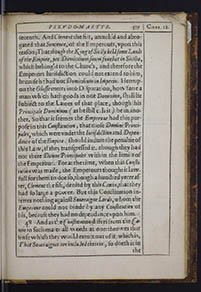 PSEVDO-MARTYR.
379
Chap. 12.
PSEVDO-MARTYR.
379
Chap. 12.
seuenth. And Clement the first, annull'd and abro-
gated that Sentence, of the Emperours, vpon this
reason; That though the King of Sicily held some Lands
of the Empire, yet Domicilium suum fouebat in Sicilia,
which belong'd to the Church, and therefore the
Emperors Iurisdiction could not extend to him,
because he had not Domicilium in Imperio. Hereup-
on the Glosse enters into Disputation, how farre a
man which hath goods in one Dominion, shall be
subiect to the Lawes of that place, though his
Principale Domicilium (as he still cals it) be in ano-
ther. So that it seemes the Emperour had this pur-
pose in this Constitution, that those Domini Princi-
pales, which were vnder the Iurisdiction and Depen-
dance of the Empire, should indure the penaltie of
this Law, if they transgressed it, though they had
not there Domos Principales within the limits of
the Emperour. For at the time, when this Consti-
tution was made, the Emperours thought it law-
full for them to doe so, though a hundred yeere af-
ter, Clement the fift, denied by this Canon, that they
had so large a power. But this Constitution in-
ferres nothing against Soueraigne Lords, whom the
Emperour could not binde by any Constitution of
his, because they had no dependance vpon him. 48 And as the Constitution differs from the Ca-
non in such materiall words as ouerthrowes that
sense which they would extort out of it, which is,
That Soueraignes are included therein, so doeth it in the 380
 Chap. 12.
380
PSEVDO-MARTYR.
Chap. 12.
380
PSEVDO-MARTYR.
the sense, and in the appointing of the Officer, who
shall expel these fauourers of heretiques. For where
the Canon saies, Let it be tolde to the Pope, who may
absolue the Subiects, and expose the land the Emperour
speakes of himselfe, we do expose the land. So that he
takes the authority out of the Popes hand; which
he would not haue done, nor the Pope haue cyted
as to his aduantage, that lawe by which it was
done, if either Iure Diuino such a power had resi-
ded in him, or a Canon of a generall Councell had
so freshly inuested him therewith. 49 And as it is neither likely that the Empe-
rour would include himselfe in this Law, nor pos-
sible that he should include others as Soueraine as
himselfe, at least: so doth it appeare, by the Ordina-
ry Glosse vpon that constitution (which hath more
authority, then all other Expositors) that that law
is made against such Lords and Subiects, as haue
relation to one another by feudall law; for so it
interpretes Dominum temporalem, and Dominum prin-
cipalem, to be, when some Earle holdes something of a
King; which King also must haue a dependency vpon the
Empire, because otherwise the Imperiall law could
not extend to him. And yet euen against those
principal Lords, the law seemes so seuere, that the
Glosse saies, Non legitur in Scholis. So that so many
proofes hauing beene formerly produced, That
this Councell made no Canons, but that those which
are vsually offered now, are but ragges torne out of 381
 PSEVDO-MARTYR.
381
Chap. 12.
PSEVDO-MARTYR.
381
Chap. 12.
of one booke, and put into another, out of the
Extrauagants into the Councels, and this Imperiall
constitution, which to the Pope himselfe seemed
of more force, then his Predecessors Decretall, nei-
ther concerning Soueraine Lords, nor acknowledg-
ing this power of absoluing Subiects, to be in the
Pope, but in himselfe, no sufficient reason arises
out of this imaginary Canon, which should make
a man affraid to call that Hereticall, which is a-
gainst his naturall reason, and against that maine
part of Religion, which is, ciuill obedience. 50 For the Romans dealing more seuerely, Azor par. 2. l. 4
c. 15. § Item eo. and
more iniuriously with vs, then the Greeke Church
did with them, when they presented to the Empe-
rour, vpon a commission to make an Inquisition
to that purpose, 99.errours and deuiations in matter
of faith, in the Romane Church: of which some were
Orthodoxall truths, some, no matter of faith, but
circumstantiall indifferencies, though they called
them all errours in faith; the Romane Church, I
say, traducing our doctrine, with as much intem-
perance and sower language, giues vs example to
call all their errours Hereticall. And so, when
Drusius in his owne defence against a Iesuite who
had called him Heretique, Serar. Trihæ. l. 3.
c. 20. saies, That Heresie must
be in fundamentis fidei; the Iesuite replies, that euen
that assertion of Drusius is Heresie. 51 And this doctrine and position, which this
Oath condemnes, will lacke nothing of formall Ggg and 382
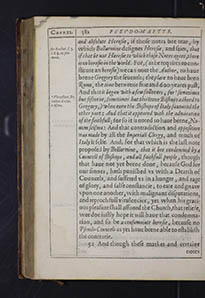 Chap. 12.
382
PSEVDO-MARTYR.
Chap. 12.
382
PSEVDO-MARTYR.
and absolute Heresie, if those notes bee true, by
which Bellarmine designes Heresie, De Euchar. l. 3.
C. 8. §. Ac pri-
mum. and saies, that
if that be not Heresie to which those Notes agree, there
is no heresie in the world. For, (as he requires to con-
stitute an heresie) we can note the Author, to haue
beene Gregory the seuenth; the place to haue
been Rome, the time betweene fiue and 600 yeares past,
And that it began with a few followers, for a a Vercelleus. De
vnitat Eccles.
conseru. sometimes
but fifteene, sometimes but thirteene Bishops adherd to
Gregory,) when euen the Bishops of Italy fauoured the
other part: And that it appeared with the admiration
of the faithfull; for so it is noted to haue beene, No-
uum scisma: And that contradiction and opposition
was made by all the Imperiall Clergy, and much of
Italy it selfe. And, for that which is the last note
proposed by Bellarmine, that it bee condemned by a
Councell of Bishops, and all faithfull people, though
that haue not yet beene done, because God for
our sinnes, hath punished vs with a Dearth of
Councels, and suffered vs in a hunger, and rage
of glory, and false constancie, to eate and gnaw
vpon one another, with malignant disputations,
and reprochfull virulencies, yet when his graci-
ous pleasure shall affoord the Church, that reliefe,
wee doe iustly hope it will haue that condemna-
tion, and so be a consummate heresie, because no
Pseudo=Councels as yet haue beene able to establish
the contrarie. 52 And though these markes and certaine notes 383
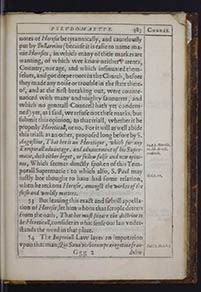 PSEVDO-MARTYR.
383
Chap. 12.
PSEVDO-MARTYR.
383
Chap. 12.
notes of Heresie be tyrannically, and cautelously
put by Bellarmine (because it is easie to name ma-
nie Heresies, in which many of these markes are
wanting, of which wee know neither Parents,
Country, nor age, and which insinuated them-
selues, and got deepe roote in the Church, before
they made any noise or trouble in the state there-
of, and at the first breaking out, were counte-
nanced with many and mighty fauourers, and
which no generall Councell hath yet condem-
ned) yet, as I said, we refuse not these marks, but
submit this opinion, to that triall, whether it be
properly Hereticall, or no. For it will as well abide this
triall, as an other, proposed long before by S.
Augustine, That hee is an Heretique, which for any
Temporall aduantage, 24. q. 3. Hœetic.
ex. lib. de vtil.
credendi. and aduancement of his Supre-
macie, doth either beget, or follow false and new opini-
ons, Which seemes directly spoken of this Tem-
porall Supremacie: to which also, S. Paul may
iustly bee thought to haue had some relation, Gal. 5. 20.
when he reckons Heresie, amongst the workes of the
flesh and worldly matters. 53 But leauing this exact and subtill appella-
tion of Heresie, let him whom that scruple deterrs
from the oath, That hee must sweare the doctrine to
be Hereticall, consider in what sense our law vnder-
stands the word in that place. 54 The Imperiall Law layes an imputation
vpon that man, Cod. l. 1. tit. 1. e. 5Qui Sæua verborum prærogatiua frau-
Ggg2 dulen- 384
 Chap. 12.
384
PSEVDO-MARTYR.
dulenter contra Iuris sententiam abutitur; that he is as
Chap. 12.
384
PSEVDO-MARTYR.
dulenter contra Iuris sententiam abutitur; that he is as
guilty as he, which breakes the law. For hee which
picks a quarrell with a law, by pretence of an am-
biguous word, declares that hee would faine e-
scape the obligation thereof. But, saith the same
law, Ibid. A Law maker hath done enough, when he hath for-
bidden that which he would not haue to be done; the rest
must bee gathered out of the purpose of the law, as if it
had beene exprest. And no man can doubt, but
that the law-maker in this law, hath forbidden
Defection from the Prince; and the purpose of the
law, was to prouide onely against that. Out of
which purpose no man can iustly collect, that the
Deponent should pronounce the contrarie Do-
ctrine, so Hereticall, as that he which held it, or
relapsed into it, might be burnt; but that it was
apparantly erroneus, and impious, and fit to bee abiu-
red; And how little erroneous lackes of Hereticall, Enchird. Ind.
Tit. 24. n. 20.
and wherein they differ, Diuines are not agreed,
saies your Simancha, and it is yet vndetermined. 55 Nor is there required in this Deponent, such
an assurance in Faith, as belongs to the making of
an Article, Formall Heresie, but such an assurance
in Morall reason, and Humane discourse, as Bar-
tholus requires in him which takes and Oath, In Dig. l. 39. de
Dam. infe. le. 13.
Nu 18. when
he sayes, He which sweares the trueth of any thing, vn-
derstands not his Oath to be of such a trueth, as is subiect
to sense, Sed iurat de vehementi opinione. 56 And the word Hereticall in this Oath, hath so 385
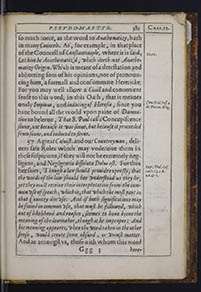 PSEVDO-MARTYR.
385
Chap. 12.
PSEVDO-MARTYR.
385
Chap. 12.
so much force, as the word to Anathematize, hath
in many Councels. As, for example, in that place
of the Councell of Constantinople, Ca. 11. where it is said,
Let him be Anathematiz'd, which doeth not Anathe-
matize Origen. Which is meant of a detestation and
abhorring som of his opinions, not of pronoun-
cing him, a formall and consummate Hereticke.
For you may well allow a Ciuill and conuenient
sense to this word, in this Oath, that it meanes
onely Impious, Conc. Trid. Sess. 4
de Peccat. Orig. and inducing of Heresie, since you
haue bound all the world vpon paine of Damna-
tion to beleeue, That S. Paul call'd Concupiscence
sinne, not because it was sinne, but because it proceeded
from sinne, and induced to sinne. 57 A great Casuist, and our Countreyman, deli-
uers safe Rules which may vndeceiue them in
these suspicions, if they will not be extremely neg-
ligent; and Negligentia dissoluta Dolus est. For thus
hee saies, Sayr. Thes. Cas.
consc. l. 3. c. 8.
n. 6. & 7. Though a law should prouide expresly, that
the words of the law should bee vnderstood as they lie,
yet they must receiue their interpretation from the com-
mon vse of speach; which is, that which the most part in
that Country doe vse. And if both significations may
be found in common vse, that must be followed, which
out of likelihood and reason, seemes to haue beene the
meaning of the lawmaker, though it be improper: And
his meaning appeares, when the word taken in the other
sense, would create some absurd, or vniust matter.
And as amongst vs, those with whom this word Ggg3 here=- 386
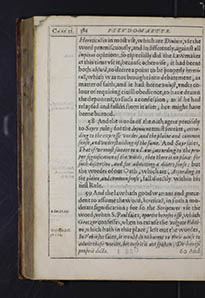 Chap. 12.
386
PSEVDO-MARTYR.
Chap. 12.
386
PSEVDO-MARTYR.
Hereticall is in most vse, which are Diuines, vse the
word promiscuously, and indifferently, against all
impious opinions: so especially did the Lawmaker
at this time vse it, because otherwise, it had beene
both absurd, to decree a point to be properly hereti-
call, which was not brought into debatement, as
matter of faith, and it had beene vniust, vnder co-
lour of requiring ciuill obedience, to haue drawn
the deponent, to such a confession, as if he had
relapsed and fallen from it after, hee might haue
beene burned. 58 And the words of the oath agree precisely
to Sayrs rule; for the deponent must sweare, accord-
ing to the expresse wordes, and the plaine and common
sense, and vnderstanding of the same. And Sayr saies,
That if we must sweare to a Law, according to the pro-
per signification of the words, then there is no place for
such discretion, and for admitting a diuers sense: but
the wordes of our Oath, which are, According to
the plaine, and common sense, fall directly within his
first Rule. 59 And the law hath good warrant and prece-
dent to assume the word, hereticall, in such a mo-
derate signification; for so the Scriptures vse the
word, 1. Cor. 11. 19. when S. Paul saies, oportet hereses esse, which
Gretzer confesses, when to excuse the vulgate Editi-
on, which hath in that place, Desensio. Bell.
l. 2. c. 14. left out the wordes,
In Vobis; he saies, It would do no harme to their cause to
admit those wordes, because it is not spoken, De hæresi
propriè dicta. 60 And 387
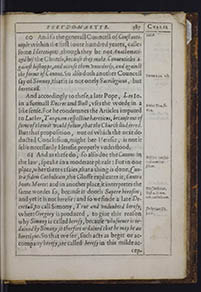 PSEVDO-MARTYR.
387
Chap. 12.
60 And so the generall Councell of Constanti-
PSEVDO-MARTYR.
387
Chap. 12.
60 And so the generall Councell of Constanti-nople within the first foure hundred yeares, can. 6. calles
some Heretiques, though they be not Anathemati-
zed by the Church, because they make Conuenticles a-
gainst bishopps, and accuse them vnorderly, and against
the forme of Canons. So also doth another Councell
say of Simony, Turon. 2. ca. ult. that it is not onely Sacrilegious, but
hereticall. And accordingly to these, a late Pope, Leo 10.
in a formall Decree and Bull, vses the worde in a
like sense. Binius To. 4. fo.
654. For he condemnes the Articles imputed
to Luther, Tanquam respectiue hæreticos, because out of
some of them it would follow, that the Church had erred.
But that proposition, out of which the next de-
ducted Conclusion, might bee Heresie, is not it
selfe necessarily Heresie, properly vnderstood. 61 And as these do, so also doe the Canons in
the law, Dist. 11. consue-
tudinem. ver.
fidem. speake in a moderate phrase: For in one
place, wherwhere the text saies, that a thing is done, Con-
tra fidem Catholicam, the Glosse explicates it, Contra
bonos Mores: and in another place, it interpretes the
same wordes so, De Consecrat.
Dist. 4. Si non.
ver. catholicum. because it dooth Sapere heresim;
and yet it is not heresie: and so we finde a late De-
cretall, to call Simony, True and vndoubted heresy;
where Gregory is produced, In septimo Tit.
3. c. 1. to giue this reason
why Simony is called heresy, because whosoeuer is or-
dained by Simony, is therfore ordained that he may be an
heretique. So that we see, such acts as beget or ac-
company heresy, are called heresy in this milde ac-
cep=- 388
 Chap. 12.
388
PSEVDO-MARTYR.
ceptation, which our law giues it.
62 From which sense the L. 2 aduer.
Chap. 12.
388
PSEVDO-MARTYR.
ceptation, which our law giues it.
62 From which sense the L. 2 aduer.
marci c. 2. Fathers did not ab-
staine in vsing that worde; for Tertullian saies,
That no man will doubt to call Adams transgression he-
resie, since by his owne election, he adhered rather to his
owne will, then to Gods. And in another booke he
saies, Develand.
virg. c. 1. Not so much newnes, as truth doth conuict things
to be heresies, for whatsoeuer tastes against truth, is an
heresie, though it be an ancient custome. And so saies
S. August. (if their owne men cite him truely) That
Schisme is called Heresie, not that it is heresie, but
that it disposes to heresie. Alf. castr. adu.
Ham. l. 1. c. 9. 63 And the Iesuits themselues, who are the pre-
cisest and seuerest accepters of this word, come
thus neere, That some things tolerated by the Church,
though they be not propriè hæretica, yet they are hæresi
proxima. De pont. l. 4. c. 5.
§ Ex his. For so saies Bellarmine; and hee might
iustly make this position which wee speake of,
his example. And his defender Gretzer saies, that
some opinions are so framed, that though no Decree of
the Church haue yet condemned them, Append. ad lib.
1. Bell. § Interin. yet they are enor-
mous, Scandalous, and hæresi proximæ. 64 And thus also do the Schoolemen somtimes
take it; For so, saies Aquinas out of S. Ierome, that
he which expounds the Scriptures against the sense of
the holy Ghost may be called an heretique, 22 æ. q. 11.
Ar. 2. ad 2. though he de-
part not from the Church. And so haue diuers com-
pilers of the Ecclesiastique history done; De Hære sib. for Epi-
phanius reckons diuers sects of the Iewes and Gen-
tiles 389
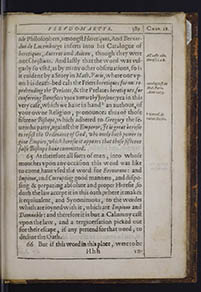 PSEVDO-MARTYR.
389
Chap. 12.
tile Philosophers, amongst Heretiqes. And Bernar-
PSEVDO-MARTYR.
389
Chap. 12.
tile Philosophers, amongst Heretiqes. And Bernar-dus de Lucemburgo inserts into his Catalogue of
heretiques, Alf. castr adu.
Heres. l. 1. c. 9. Auerros and Auicen, though they were
not Christians. And lastly that the word was vul-
garly so vsed, as by many other obseruations, so is
it euident by a Story in Matb. Paris, where one vp-
on his death-bed cals the Friers heretiques for not re-
prehending the Prelates, catalog. test. ex
Mat. Paris.
Anno 1253. & the Prelates heretiques, for
conferring Benefices vpon vnworthy persons: yea in this
very case, which we haue in hand b an authour, of
your owne Religion, pronounces thus of those b Vercell. de
vnitat. Eccles.
fifteene Bishops, which adhered to Gregory the se-
uenths party, against the Emperor, It is great heresie
to resist the Ordinance of God, who onely hath power to
giue Empire, which heresie it appears that those fifteene
false Bishops haue committed. 65 As therefore all sorts of men, into whose
mouthes vpon any occasion this word was like
to come, haue vsed the word for Erroneous: and
Impious, and Corrupting good manners, and dispo-
sing & preparing absolute and proper Heresie, so
doth the law accept it in this oath, where it makes
it equiualent, and Synonimous, to the wordes
which are ioyned with it, which are Impious and
Damnable: and therefore it is but a Calumny cast
vpon the law, and a tergiuersation picked out
for their escape, if any pretend for that word, to
decline the Oath. 66 But if this word in this place, were to be Hhh vn- 390
 Chap. 12.
390
PSEVDO-MARTYR.
Chap. 12.
390
PSEVDO-MARTYR.
vnderstood in the strictest and seuerest sense, that
a Iesuite could vse it against vs, yet hee that shall
take the Oath, doth not thereby pronounce, that
any Position, which attributes any power to the Pope,
is hereticall. Not, that hee may excommunicate a
King; no, nor that he may depriue him: but it is
thus conceiued, That this position is hereticall, That
Princes which be excommunicate, or depriued by the
Pope, may be deposed or murdred by their subiects or a-
ny other. So that it casts no Manicles vpon the
Popes hands; if he will excommunicate, let him; if
he will depriue, let him. Onely them, who by his
act, (of the goodnes or badnes whereof this Pro-
position pronounces nothing) may be mis-led to
an vnchristian & vndutifull desperatenes, it fore-
warnes, and aduises, to a due and iust considera-
tion of such proceedings. For, as when men were
content to heare heresies, Epist. 39. Tu-
ribio. in fine. Leo said wisely, in repre-
hension of that easinesse, They which can hearken to
such things, can beleeue them, So since it is too late
to forbid hearing of this heresie, of deposing
Princes, since out of Iesuites bookes, which speak
of state=-learning, scarce any thing is to be sucked,
but it, or such preparatiues, as worke and con-
duce to it, it was necessary to begin a step higher -
then Leo did, and pronounce it hereticall, that so
none might beleeue it, since hee that can beleeue
it, can be content to affoord his helpe to the do-
ing thereof. 67 And 391
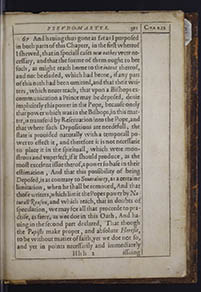 PSEVDO-MARTYR.
391
Chap. 4.
67 And hauing thus gone as far as I purposed
PSEVDO-MARTYR.
391
Chap. 4.
67 And hauing thus gone as far as I purposed
in both parts of this Chapter, in the first whereof
I shewed, that in speciall cases new oathes were ne-
cessary, and that the forme of them ought to bee
such, as might reach home to the intent thereof,
and not be eluded, which had beene, if any part
of this oath had been omitted, and that their wri-
ters, which neuer teach, that vpon a Bishops ex-
communication a Prince may be deposed, denie
implicitely this power in the Pope, because onely
that power which was in the Bishops, in this mat-
ter, is transferd by Reseruation into the Pope, and
that where such Depositions are needefull, the
state is prouided naturally with a temporall po-
wer to effect it, and therefore it is not necessarie
to place it in the spirituall, which were mon-
strous and vnperfect, if it should produce, as the
most excelent issue therof, a power so base in their
estimation, And that this possibility of being
Deposed, is as contrary to Souerainety, as a certaine
limitation, when he shall be remoued, And that
those writers, which limit the Popes power by Na-
turall Reason, and which teach, that in doubts of
speculation, we may for all that proceede to pra-
ctise, as farre, as wee doe in this Oath, And ha-
uing in the second part declared, That though
the Papists make proper, and absolute Heresie,
to be without matter of faith, yet we doe not so,
and yet in points necessarily and immediately Hhh2 issuing 392
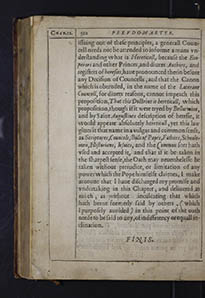 Chap. 12.
392
PSEVDO-MARTYR.
Chap. 12.
392
PSEVDO-MARTYR.
issuing out of these principles, a generall Coun-
cell needs not be attended to informe a mans vn-
derstanding what is Hereticall, because the Em-
perors and other Princes, and diuers Authors, and
registers of heresies, haue pronounced therin before
any Decision of Councells, and that the Canon
which is obtruded, in the name of the Laterane
Councell, for diuers reasons, cannot impeach this
proposition, That this Doctrine is hereticall, which
proposition, though if it were tryed by Bellarmine,
and by Saint Augustines description of heresie, it
would appeare absolutely hereticall, yet this law
giues it that name in a vulgar and common sense,
as Scriptures, Councels, Buls of Popes, Fathers, Schoole
men, Historians, Iesuits, and the Common sort hath
vsed and accepted it, and that if it be taken in
the sharpest sense, the Oath may neuerthelesse be
taken without preiudice, or limitation of any
power which the Pope himselfe claimes, I make
account that I haue discharged my promise and
vndertaking in this Chapter, and deliuered as
much, as without inculcating that which
hath beene formerly said by others, (which
I purposely auoided) in this point of the oath
neede to be said to any, of indifferency or equall in-
clination. FINIS. 393
 394
394 395
395 396
396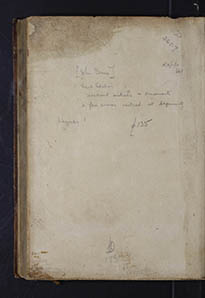 397
397 398
398